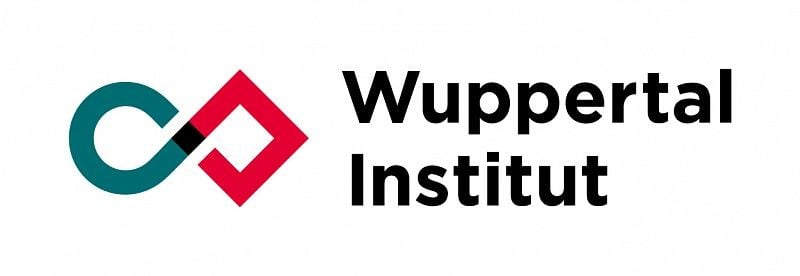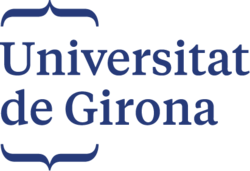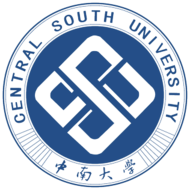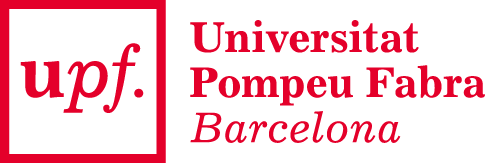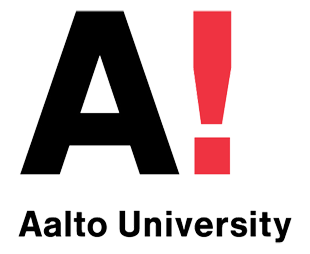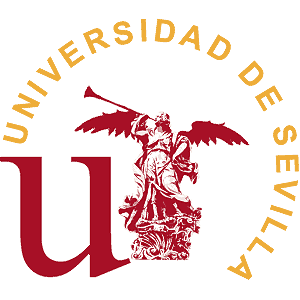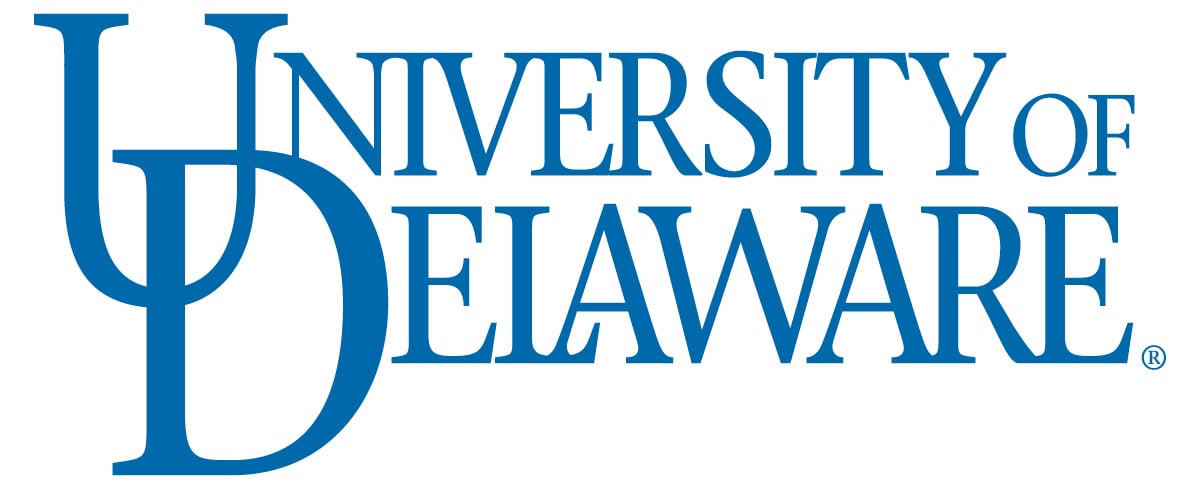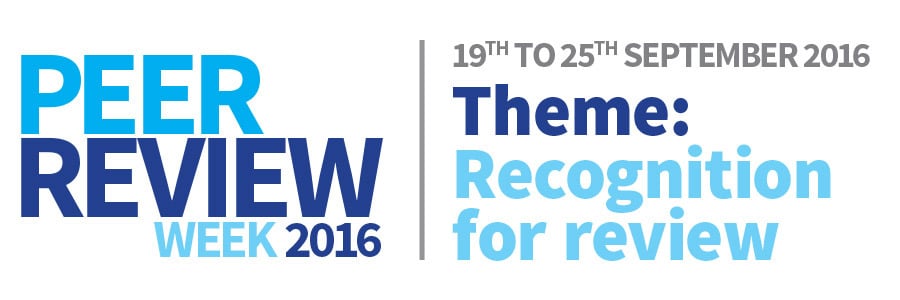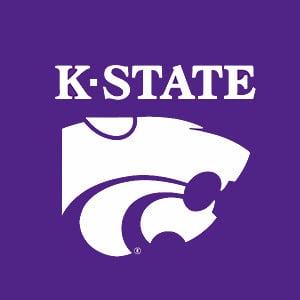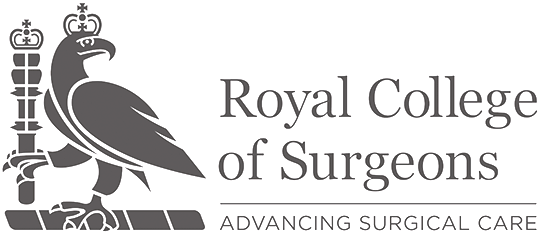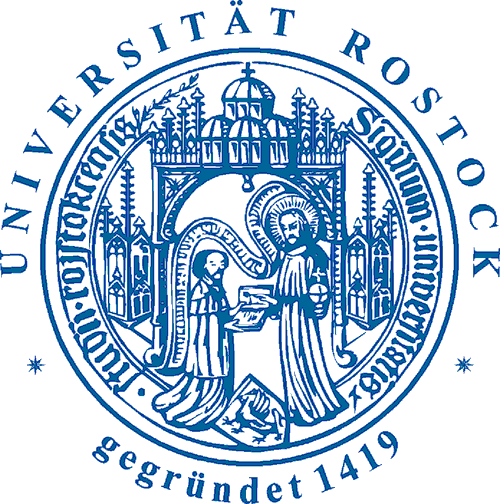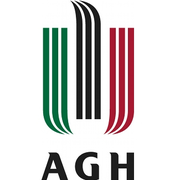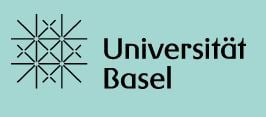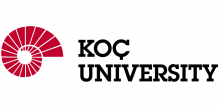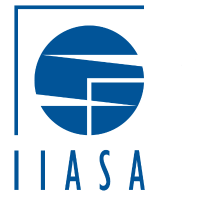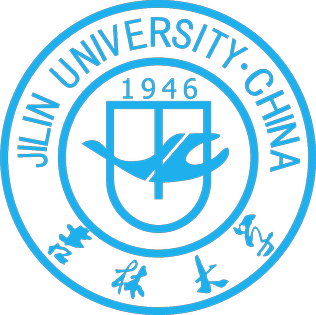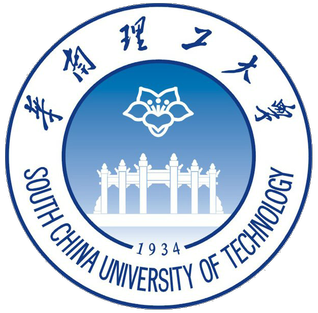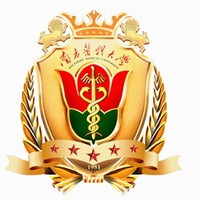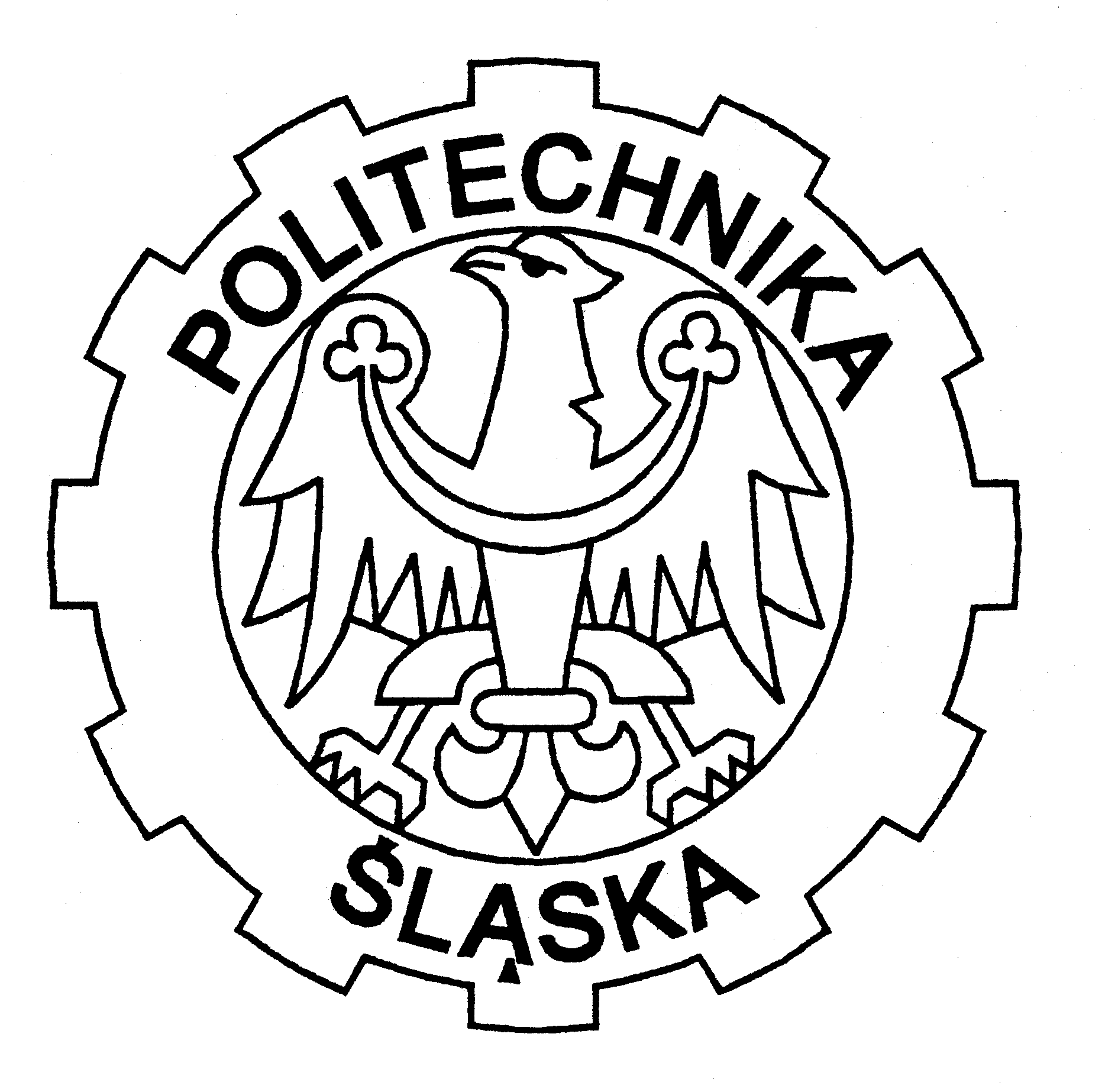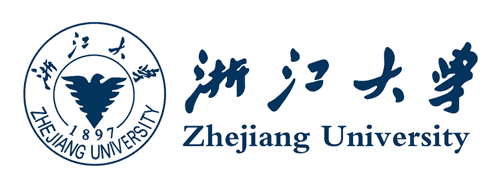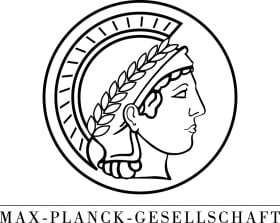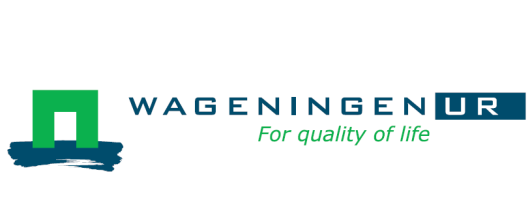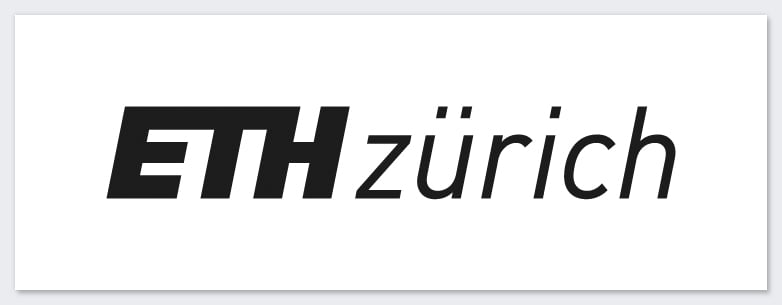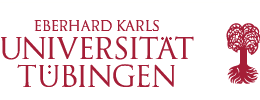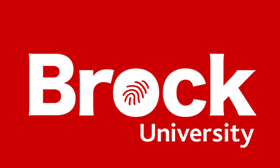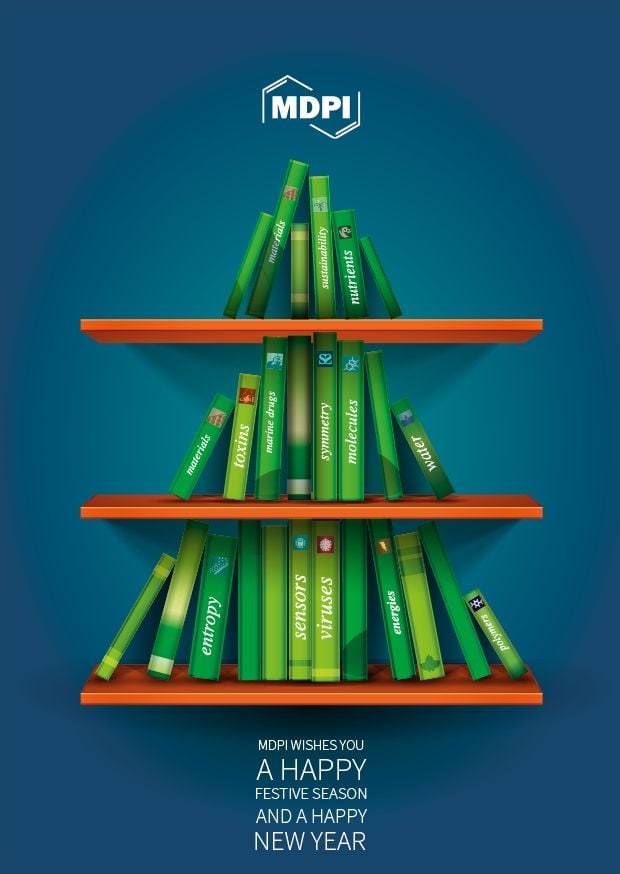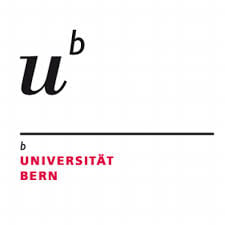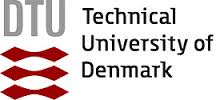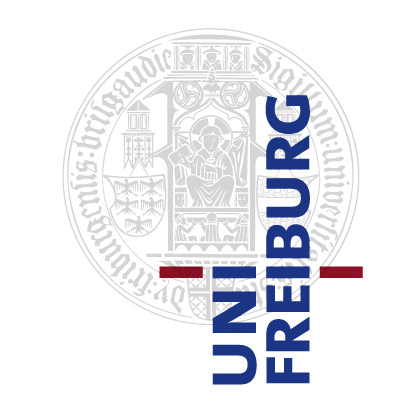
Journal Menu
► ▼ Journal Menu-
- Mathematics Home
- Aims & Scope
- Editorial Board
- Reviewer Board
- Topical Advisory Panel
- Instructions for Authors
- Special Issues
- Topics
- Sections & Collections
- Article Processing Charge
- Indexing & Archiving
- Editor’s Choice Articles
- Most Cited & Viewed
- Journal Statistics
- Journal History
- Journal Awards
- Society Collaborations
- Conferences
- Editorial Office
Journal Browser
► ▼ Journal BrowserNeed Help?
Announcements
10 April 2024
Mathematics | Special Issue Mentor Program
We are pleased to announce the launch of a new initiative—the Mathematics Special Issue Mentor Program.
This program will enable early career researchers (who must hold a Ph.D. in a related field) to experience editing a Special Issue in Mathematics (ISSN: 2227-7390), under the mentorship of our experienced Editorial Board Members or other experienced scientists. The mentor program will provide an excellent opportunity for early career scientists to gain editorial experience and to cultivate their ability to edit scientific research.
The mentee’s responsibilities include:
- Proposing a Special Issue title and assisting the mentor in preparing a summary (around 200–400 words) and 3–10 keywords describing the background, importance, and goal of the Issue;
- Writing a brief promotion plan for the Special Issue;
- Preparing a list of scholars who may be interested in the Issue and personally e-mailing invitations on behalf of Guest Editors;
- Writing an editorial for the online Special Issue together with the mentor.
The mentor’s responsibilities include:
- Conducting a final check before the Special Issue is published online;
- Performing editorial control of the Special Issue and quality control of the publications, both of which must be carried out in a timely manner;
- Providing suggestions to younger scholars if they have any doubts or concerns regarding submissions;
- Organizing video calls with young scholars and the Editorial Office regularly to discuss problems and improvement suggestions for the Special Issue;
- Making and submitting decisions regarding submissions with the assistance of mentees.
Certificates:
After the Special Issue closes, the Editorial Office will provide official certificates for all the mentors and mentees.
If you are interested in this opportunity, please submit your Special Issue proposal here or send it directly to the Mathematics Editorial Office, and we will discuss the process (i.e., mentor collaboration, Special Issue topic feasibility analysis, etc.) in further detail. In addition to the new Special Issue Mentor Program, we will continue to welcome all Special Issue proposals focusing on hot research topics.
2 April 2024
MDPI Insights: The CEO's Letter #10 - South Korea, IWD, U2A, Japan

Welcome to the MDPI Insights: The CEO's Letter.
In these monthly letters, I will showcase two key aspects of our work at MDPI: our commitment to empowering researchers and our determination to facilitating open scientific exchange.
Opening Thoughts

Left to right: Dr. Jisuk Kang (Scientific Officer, MDPI), Stefan Tochev (CEO, MDPI), and Dr. Giulia Stefenelli (Chair of Scientific Office Board, MDPI), during media meetings at Prain Agency office in Seoul, South Korea.
Visit to Seoul, South Korea
During my recent visit to South Korea, I had the privilege of meeting various stakeholders, including representatives of government, research institutions, and academia, to understand their needs and communicate MDPI’s commitment to accessible science. Accompanied by my colleagues Dr. Giulia Stefenelli and Dr. Jisuk Kang, I engaged with the Korean scientific community, which is increasingly embracing open access (OA).
As the leading OA publisher in South Korea, MDPI is trusted by local authors and in 2023 enjoyed an approximately 30% share of the OA market. South Korea ranks sixth globally for MDPI in terms of research papers submitted and published.
MDPI and South Korea by Numbers
As at 30 March, over 76,000 MDPI articles have been authored by individuals affiliated with Korean institutions. We have over 1,800 active editorial board members (EBMs) from South Korea, with more than 880 EBMs having an H-index between 26 and 50, including 10 serving as Chief Editors.
“South Korea is the sixth-largest contributor to our total publications”
Over the past five years (2019–2023), nearly 120,000 authors affiliated with South Korean institutes have published with MDPI. Specifically in 2023, we received approximately 25,000 submissions from South Korean authors, publishing close to 13,000 articles, resulting in a rejection rate of 47.4%, which is not far below MDPI’s overall rejection rate of 56.4% in 2023.
Institutional Partnerships with South Korea
I am pleased to share that MDPI has more than 825 institutional partnerships worldwide, with 12 in South Korea, including Kyunghee University, Chung-Ang University, and Inha University, among others.

Left to right: Dr. Jisuk Kang (Scientific Officer, MDPI), Dr. Giulia Stefenelli (Chair of Scientific Office Board, MDPI), and Stefan Tochev (CEO, MDPI) fielding media questions at Prain PR Agency office in Seoul, South Korea.
Over the past three years (2021–2023), we have had some of the most prestigious academic universities ranked among the top 10 Korean institutions publishing with MDPI. Seoul National University had the highest number of publications with MDPI during those three years, publishing nearly 6,000 papers. Universities such as Korea University and Yonsei University also rank among the top 10 Korean institutions publishing with MDPI.
MDPI Hosts Seminar for Academia and Media
As the world’s leading OA publisher, MDPI is actively democratizing science. This is reflected in the seminars we hosted on 21 March to address questions about our editorial processes and ethical standards. The visit garnered media coverage, reflecting our mission to providing high-quality services and fostering open dialogue in the community.
“MDPI is actively democratizing science”
MDPI in the News

Stefan Tochev (CEO, MDPI) leading a seminar on OA and MDPI at Prain PR Agency office in Seoul, South Korea.
Media coverage generated by our visit to Seoul included the following stories:
“Open access is an unstoppable trend…it will lead the development of the knowledge ecosystem.”
I greatly appreciate the contributions of everyone who took the time to meet with us, share their stories, and hold us accountable for continuing to provide high-quality publishing services while identifying areas for improvement. I am also excited to announce that we have opened an MDPI office in Seoul and will release a press release on MDPI.com, with details, by the end April 2024. The purpose of the office is to establish a local presence to connect with and support the South Korean academic community through institutional partnerships, conferences, author workshops, stakeholder communications, and more.
Impactful Research

Featured Articles on Women’s Leadership and Healthcare
In celebration of International Women’s Day (8 March 2024), MDPI curated a collection of research articles on various topics, including women’s leadership, reproductive health, preventive healthcare, and a selection of articles from our journal Women.
Women’s Leadership
- Women Entrepreneurship and Sustainable Development: Bibliometric Analysis and Emerging Research Trends
Sustainability 2022, 14, 9160. https://doi.org/10.3390/su14159160 - Refugee Women Business Mentors: New Evidence for Women’s Empowerment
Sustainability 2022, 14, 9154. https://doi.org/10.3390/su14159154 - Women and Leadership in Higher Education: A Systematic Review
Soc. Sci. 2023, 12, 555. https://doi.org/10.3390/socsci12100555 - Understanding Needs and Potentials for Gender-Balanced Empowerment and Leadership in Climate Change Adaptation and Mitigation in Africa
Sustainability 2022, 14, 9410. https://doi.org/10.3390/su14159410 - Challenges Women Experience in Leadership Careers: An Integrative Review
Merits 2023, 3, 366-389. https://doi.org/10.3390/merits3020021
Women’s Reproductive Health
- Recreational Female Athletes’ Understanding of and Perceived Impact of the Menstrual Cycle on Physical Performance, Mood, and Sleeping Behaviour
Women 2023, 3, 445-456. https://doi.org/10.3390/women3030034 - Difficulties in Adaptation of the Mother and Newborn via Cesarean Section versus Natural Birth—A Narrative Review
Life 2023, 13, 300. https://doi.org/10.3390/life13020300 - The Main Theories on the Pathogenesis of Endometriosis
Int. J. Mol. Sci. 2023, 24, 4254. https://doi.org/10.3390/ijms24054254
Women’s Preventive Healthcare
- Insulin Metabolism in Polycystic Ovary Syndrome: Secretion, Signaling, and Clearance
Int. J. Mol. Sci. 2023, 24, 3140. https://doi.org/10.3390/ijms24043140 - Assessing Barriers Encountered by Women in Cervical Cancer Screening and Follow-Up Care in Urban Bolivia, Cochabamba
Healthcare 2022, 10, 1604. https://doi.org/10.3390/healthcare10091604 - Updates on HPV Vaccination
Diagnostics 2023, 13, 243. https://doi.org/10.3390/diagnostics13020243
Featured Articles in MDPI Journal Women
Below are a few articles from Women, our journal focused on women’s health, the social determinants of health, and the healthcare system that serves women. The aim of Women is to encourage academics to publish their experimental and theoretical results in detail, to aid reproducibility, and in an engaging style, to aid comprehensibility.
- Premenstrual Syndrome and Exercise: A Narrative Review
Women 2023, 3, 348-364. https://doi.org/10.3390/women3020026 - Increasing Awareness of the Human Papillomavirus (HPV) Vaccine for Women 18–45 Years of Age
Women 2023, 3, 365-373. https://doi.org/10.3390/women3030027 - Addressing Women’s Needs with Human Immunodeficiency Virus (HIV) and Enhancing the Visibility of Pharmacists in the Public Health Arena
Women 2022, 2, 346-352. https://doi.org/10.3390/women2040032
Inside MDPI

Championing Women’s Healthcare and Access to Healthcare Information
MDPI colleagues from our offices joined in celebrating #IWD2024. In doing so, we emphasized key missions that encompass:
- Empowering women to assume leadership and decision-making roles in both business and science.
- Helping women and girls make informed decisions about their health.
- Recruiting and developing female talent and fostering inclusive workplace environments.
“We are thrilled to recognize the accomplishments of women scientists”
I am proud to see our colleagues enthusiastically supporting the International Women’s Day call to ‘Inspire Inclusion!’ The heart-hands in the collage below symbolize our appreciation of the achievements of women researchers and the recognition of the trailblazers who have courageously made a mark on societies past and present.

We are thrilled to recognize the accomplishments of women scientists through our many MDPI awards and by highlighting success stories. As inspirational figures, female scientists are paving the way for the next generation of women aspiring to pursue careers in engineering, life sciences, computing, and various other STEM fields.
“I consider myself lucky because I work with incredibly talented women who inspire me every day.”
– Dr. Alessandra Pasut, Winner of MDPI's ‘Biology 2023 Young Investigator Award’
“It’s really important to find a supportive and enabling environment in which to do your science; it would have a big impact on you as a person and on your scientific outputs.”
– Dr. Rhea Longley, Winner of the ‘Pathogens 2023 Young Investigator Award’
Open-access publishing, in particular, allows early-career women researchers to share their work more widely, potentially attracting mentorship opportunities and collaborations. This support is crucial for career development and advancement.
Coming Together for Science

MDPI Joins United2Act in Collective Fight to Stop Paper Mills
In my February 2024 CEO Letter, I highlighted some of our recent initiatives aimed at bolstering our commitment to research integrity, including joining the STM Integrity Hub and expanding our Research Integrity and Publication Ethics team (RIPE). Continuing our efforts in coming together for science, I am pleased to share our participation in the United2Act initiative.
The text below is taken from our official announcement:
United2Act represents an international group of stakeholders in the publishing industry committed to addressing the collective challenge posed to research integrity by paper mills.
Scientists and academic publishers have increasingly noted the alarming proliferation of paper mills, recognized as fraudulent entities seeking to manipulate the publication process for financial profit. These entities engage in fraudulent practices such as falsifying or fabricating data, selling co-authorship of fake papers, manipulating peer review, and including inappropriate citations. These actions pose a significant threat to the integrity of the scholarly record, prompting widespread concern among those involved in the academic community.
MDPI has been actively contributing to combat the undermining of the scientific record. Our editors employ a set of tools to detect potential ethical breaches within a manuscript and to tackle the issue of fake papers.
United2Act’s consensus statement is the outcome of a virtual summit held in May 2023. It involved the participation of research bodies, publishers, researchers/sleuths, universities, and publishing infrastructure from 15 countries and resulted in a Consensus Statement outlining five key areas of action for all stakeholders:
- Education and awareness
- Improve post-publication corrections
- Facilitate and organise research on paper mills
- Enable the development of trust markers
- Facilitate dialogue between stakeholders
MDPI is committed to promoting transparency and integrity in scholarly publishing and is continuing to work closely with the scientific community toward this goal.
Closing Thoughts

Left to right: Ryo Hirayama (Marketing Specialist, MDPI), Takashi Sasabe (Marketing Specialist, MDPI), Dr. Giulia Stefenelli (Chair of Scientific Office Board, MDPI), Dr. Izumi Yamamoto (Marketing Manager, MDPI), and Stefan Tochev (CEO, MDPI), at MDPI’s office in Tokyo, Japan.
Visit to Tokyo and Kyoto, Japan
In March, I had the opportunity to visit our Tokyo office and engage with stakeholders in Tokyo and Kyoto. During the visit, I also recorded a video message to welcome Japanese scholars working with MDPI and to highlight our operations in Japan.
We held meetings with Editors-in-Chief, librarians, scholars, and external consultants to gather feedback on our efforts to enhance our reputation and explore additional steps we can take in that direction. Japan's rich cultural heritage, characterized by tradition, respect, and formality, provided valuable insights into meeting the publishing needs specific to Japan.
Japan’s Open Access statistics
Over the years, we have seen a shift from subscription-only to gold OA publishing in Japan, despite the lack of an official mandate. Here are some statistics:
- 2012: 68% of articles were subscription-only, 6% were green Open Access, and 8% were gold Open Access.
- 2016: 55% of articles were subscription-only, 6% were green Open Access, and 20% were gold Open Access.
- 2022: 43% of articles were subscription-only, 7% were green Open Access, and 39% were gold Open Access.
To learn more about the history of OA in Japan as well as about future trends, please read this blog post.
“Japan is the ninth-largest contributor to our total publications”

Left to right: Stefan Tochev (CEO, MDPI), Dr. Izumi Yamamoto (Marketing Manager, MDPI), and Dr. Giulia Stefenelli (Chair of Scientific Office Board, MDPI) visiting Kyoto University in Kyoto, Japan.
MDPI and Japan by Numbers
As at 1 April, over 50,000 MDPI articles have been authored by scholars affiliated with Japanese institutions, making the country the ninth-largest contributor to our total publications. Over the past three years (2020–2023), nearly 90,000 authors affiliated with Japanese institutes have published with MDPI, and we have collaborated with over 4,600 Guest Editors from Japan.
In 2023, we published over 8,200 papers from authors associated with Japanese institutions. MDPI collaborates with 41 institutional partnerships in Japan, including the University of Tokyo, Hokkaido University, and Nagoya University. We have over 2,100 active EBMs from Japan, more than 1,050 EBMs having an H-index between 26 and 50, including 13 serving as Editors-in-Chief.
General Feedback – a side note
A general takeaway from our discussions with stakeholders from around the world is that negative perceptions of MDPI often stem from misinformation, misconceptions, or misunderstandings about MDPI and our practices. While we acknowledge our mistakes and work diligently to address them, maintaining a strong editorial procedure and robust peer-review process, I find that educating stakeholders about our how we do what we do and our ongoing improvements tends to help shift opinions.
That said, we recognize the importance of addressing individual concerns. We take feedback seriously and are continuously working to get better while not compromising the core principles that millions of authors appreciate about MDPI.
Chief Executive Officer
MDPI AG
12 March 2024
Meet Us at the MDPI International Day of Mathematics Webinar 2024, 14 March 2024

MDPI would like to invite all experts recognized in their fields to attend the MDPI International Day of Mathematics Webinar 2024. The aim of this webinar is to encourage researchers to join together, take action, and raise awareness as to how the exchange of findings facilitates efforts to explain the essential role that mathematics plays in breakthroughs in all areas.
We are looking forward to seeing you at the MDPI International Day of Mathematics Webinar 2024.
Title: MDPI International Day of Mathematics Webinar 2024
Date: 14 March 2024
Time: 10:00-11:00 (CET) | 5:00-6:00 (CST Asia)
More information: https://sciforum.net/event/MIDoMW2024
This is a free webinar. After registering, you will receive a confirmation email containing information on how to join the webinar. Registrations with academic institutional email addresses will be prioritized.
Unable to attend? Register anyway and we will let you know when the recording is available to watch.
Register for free:
Program:
|
Speaker/Presentation |
Start Time | CET (GMT+1) |
|
Introduction |
10:00–10:05 a.m. |
|
Professor Tomasz Brzezinski |
10:05–10:45 a.m. |
|
Q&A |
10:45–10:55 a.m. |
|
Closing of Webinar |
10:55–11:00 a.m. |
Relevant Special Issues:
Mathematics
“New Advances in Algebra, Ring Theory and Homological Algebra, 2nd Edition”
Guest Editor: Prof. Dr. Juan Ramón García Rozas, Prof. Dr. Luis Oyonarte Alcalá and Prof. Dr. Driss Bennis
Deadline: 30 April 2024
“Mathematical Structures and Their Applications”
Guest Editors: Prof. Dr. Nelson Martins Ferreira
Deadline: 31 July 2024
5 March 2024
Meet Us at the British Applied Mathematics Colloquium (BAMC), 9–11 April 2024, Newcastle upon Tyne, UK

MDPI will be attending the British Applied Mathematics Colloquium (BAMC), which will be held from 9 to 11 April 2024, in Newcastle upon Tyne, UK.
The conference is the largest applied mathematics conference in the UK, attracting students, academics, and industry professionals to explore recent advancements in the field. The public lecture by Julia Gog from the University of Cambridge, UK will focus on “From maths to policy: a COVID-19 story”. Other plenary lectures will cover topics such as “The mathematics and physics of wound healing” and “Revisiting the link between turbulence and sound generation 70 years after Lighthill”.
The following MDPI journals will be represented:
If you are planning to attend this conference, we invite you to visit our booth and engage in conversation with our delegates. We are excited to meet you in person and address any questions you may have. For further details about the conference, please visit the following website: https://conferences.ncl.ac.uk/bamc2024/.
4 March 2024
MDPI Insights: The CEO's Letter #9 - Romania, Research Integrity, Viruses

Welcome to the MDPI Insights: The CEO's Letter.
In these monthly letters, I will showcase two key aspects of our work at MDPI: our commitment to empowering researchers and our determination to facilitating open scientific exchange.
Opening Thoughts

Reka Kovacs (Deputy Office Manager, MDPI), Stefan Tochev (CEO, MDPI), and Sandra Ana Spatariu (Office Manager, MDPI) at the MDPI office in Cluj, Romania.
MDPI’s Impact on Romania
In February, I visited our office in Cluj, Romania. I worked closely with our senior office managers and various teams, including the departments of training, marketing and conferences, as well as our journal relationship specialists, reviewing our service to the local scholarly community. During the visit, I also met with representatives from Babes-Bolyai University and the Technical University of Cluj-Napoca. Our multifunctional Romanian office plays an important role in supporting our collaborations with the local market as well as helping to meet MDPI’s overall business needs.

Feedback and strategy meeting with a group of MDPI’s Journal Relationship Specialists at the MDPI office in Cluj, Romania.
With 22,436 articles, Romania ranks as a top 20 contributing country to MDPI’s total number of papers published as at 28 February 2024. This highlights the importance of our collaboration with Romanian-affiliated authors and the growing opportunity to support their publishing needs. MDPI is one of the few academic publishers with a significant presence in Romania, boasting over 360 colleagues across our offices in Bucharest and Cluj. We are also proud to hire colleagues from local institutions to launch their careers within publishing.
Romania ranks as a top 20 contributing country.
The Numbers: 2019–2023
MDPI has seen a healthy increase in submissions from Romanian authors over the past three years, from 8,439 in 2021 to 11,866 by end of 2023, with most submissions going to journals such as Sustainability, Medicina, Diagnostics, IJMS, Applied Sciences, and JCM. From 2019 to 2023, MDPI published articles from 32,145 authors affiliated with Romanian institutions. Over those years, we have worked with Romanian Guest Editors on nearly 3,000 occasions to support their Special Issue and Topical collections.
With more than 300 Editorial Board Members from Romania, 34 appear on the board of Mathematics, 27 on Materials, 19 on Polymers, 18 on Coatings, and 16 on Molecules, while three serve as Section Editors-in-Chief (SEiC) on our journals Coatings (3.4 IF, 4.6 Citescore), Magnetochemistry (2.7 IF, 3.5 Citescore), and Chemosensors (4.2 IF, 3.9 Citescore).
Institutional Open Access Programs
Our commitment to working with institutions is evident in Romania, where we have established eight Institutional Open Access Programs (IOAP) with esteemed institutions such as the University of Bucharest, the University of Medicine and Pharmacy Cluj-Napoca, and most recently the National Institute for Laser, Plasma and Radiation Physics.
Our growth and presence in Romania are a true testament.
We also have IOAP agreements with Babes-Bolyai University and the Technical University of Cluj-Napoca, where I had the opportunity to meet senior stakeholders during my visit. Below are a few photos capturing our meeting with Prof. Radu Silaghi-Dumitrescu (Head of Faculty of Chemistry, Babes-Bolyai University) at the MDPI office in Cluj, Romania, along with a photo from our meeting with Vice Deans Nicoleta Cobarzan, Nicoleta Ilies, and Hoda Gavril, from the faculty of Civil Engineering at the Technical University of Cluj, Romania.


Our growth and presence in Romania are a true testament to the service we provide to the scholarly community and the relationships we foster in that region. We look forward to continuing to support Romanian scholars and institutions by providing a valuable and trusted experience with MDPI, the leader in open access publishing.
Impactful Research

MDPI Joins the STM Integrity Hub
MDPI has long been a supporter and partner of STM, with our involvement ranging from sponsoring and attending events to helping organize event programs. By joining the STM Integrity Hub, we aim to further our commitment to STM initiatives aimed at safeguarding the integrity of science.
“We are pleased to welcome MDPI as the 35th organisation participating in the Hub. This expansion is critical, as every new member enhances our capacity to prevent fraudulent submissions from entering the academic record.”
Joris van Rossum, Director of Research Integrity, STM
MDPI operates in full alignment with STM Integrity Hub's values of shared data and experiences. We strongly believe in collaboration and open exchange for the purposes of creating a holistic approach to support research integrity at MDPI itself and across the entire academic publishing industry. The Integrity Hub is an excellent example of how publishers can come together to jointly address industry-wide challenges related to research integrity, such as manuscripts that breach research integrity standards and paper-mills.
I look forward to our Research Integrity and Publication Ethics Team (RIPE) team immersing themselves in this initiative, exchanging information, best practices, and tools for the benefit of the entire scholarly ecosystem. We believe that ethical publishing standards should be implemented across the board, and we aim to be rigorous in our approach, addressing research integrity issues and improving the impact of published research.
Inside MDPI

MDPI Expands Research Integrity and Publication Ethics Team (RIPE)
In addition to external collaborations and joint initiatives aimed at further strengthening our commitment to research integrity, we are also enhancing our internal efforts. This includes improving our processes and guidelines and expanding our teams and departments to ensure quality assurance throughout our publishing process.
We are pleased to announce the expansion of our Research Integrity and Publication Ethics Team (RIPE) at MDPI. The RIPE team has recently welcomed new colleagues, each bringing unique skills and a personal commitment to prioritize ethical considerations in all our work.
The demand for research integrity and high ethical standards in academic publishing is steadily rising across our industry. Our expanded RIPE team will work to enhance and align our practices with industry best practices, ensuring excellence in research integrity and publication ethics.

Stefan Tochev (CEO, MDPI) introduces Dr. Tim Tait-Jamieson (Research Integrity Lead, MDPI) for his presentation on MDPI’s Retraction and Approval Process to a group of Journal Relationship Specialists at the MDPI office in Cluj, Romania: “The demand for research integrity and publication ethics is steadily rising across our industry.”
Introducing our Research Integrity and Publication Ethics Team
Led by Dr. Tim Tait-Jamieson (Research Integrity Lead), the RIPE team comprises Dr. Ivana Resanovic (Research Integrity Manager), Dr. Lavinia Rogojina (Research Integrity Manager), Ms. Diana Apodaritei (Research Integrity Specialist), Dr. Zoltan Mihaly (Research Integrity Specialist), Mr. Aleksandar Đukić (Research Integrity Specialist), Ms. Ana Stankovic (Research Integrity Specialist), and Ms. Anna Pena (Publication Ethics Assistant).
Please click here to access everything that you need to know about MDPI’s Research and Publication Ethics.
With this span of complementary roles, the RIPE team collaborates directly with journal editorial teams and works closely with various departments, including our Scientific Office Board and our Journal Relationship Specialists. The team’s primary objectives are to help prevent issues regarding research integrity and publication ethics during peer review, uphold MDPI’s ethics policies, adhere to industry standards, and resolve publication ethics and research integrity issues and complaints.
Quality Updates to Special Issues Oversight
At MDPI, we are committed to reviewing policies pertaining to the quality of research. In this blog post, Shaheena Patel (Communications Associate, MDPI), outlines two recent updates to MDPI journal processes. These updates pertain to Special Issue (SI) quality guidelines, in line with criteria provided by COPE and DOAJ. Alongside the SI updates, details regarding the new minor corrections policy introduced in 2024 are provided in the blog.
The two updates we implemented include greater oversight and the verification of Guest Editor credentials. These guidelines require that Editors-in-Chief (EiCs) and Editorial Board Members (EBMs) take responsibility for overseeing SIs.
PS. Thank you, James Butcher, for featuring this up in your 67th issue of the Journalogy newsletter.
Read more:
Coming Together for Science

Viruses 2024 – A World of Viruses
I am pleased to share the success of our MDPI conference Viruses 2024 – A World of Viruses, held 14-16 February, in Barcelona. With 240 registrations, this event brought together top scientists, researchers, and industry experts from 40 countries to share their findings on the latest developments in viral pathogenesis and immune responses.
Attendees gathered for the 5th edition of the Viruses’ conference, where we hosted influential keynote speeches from Nobel Prize laureate Dr. Charles M. Rice and ‘Distinguished Senior Virologist’ Prof. Luis Enjuanes, along with 14 invited speakers, 47 selected speakers, and nine flash poster presenters, to discuss the most significant issues in virology today.
Recap on the #Viruses2024 Conference
Take a look at the key moments from MDPI’s Viruses event and please join us in commemorating a gathering for global knowledge and cooperation. A heartfelt thank-you to all attendees; their passion and engagement played a crucial role in making this event an engaging success!
Below are calls to action from the keynote speakers encouraging collaboration and communication:
“There’s never been a better time than now to really take the power that we have both in terms of basic research and also in biotech and pharma to develop antiviral agents.” - Dr. Charles M. Rice, The Rockefeller University, New York, USA
“The collaboration between labs is absolutely essential. Improving initial detection and improving communication is a must for all of us working in science.” - Prof. Dr. Luis Enjuanes, National Center of Biotechnology (CNB-CSIC), Madrid, Spain

Our thanks go to our sponsors and partnering societies, our Viruses journal and editorial team, our Barcelona colleagues, and the social media, conference and other MDPI teams for making this event a memorable occasion. View the event gallery here.
Upcoming In-Person Event

24–26 April, 2024
4th MMCS – Harnessing the Power of New Drug Modalities
Location: Barcelona, Spain
Esteemed speakers at MMCS 2024 include Prof. Arun K. Ghosh, the mind behind the Darunavir molecule, and Prof. Paul Brennan, CSO of Alzheimer's Research UK Oxford Drug Discovery Institute.
Find more upcoming MDPI events here.
Organize Your Event with MDPI’s Sciforum
Sciforum is MDPI’s platform dedicated to the organization of scientific events. In line with our mission to promote science, Sciforum supports scholars, societies, research networks, and universities at all stages of organizing in-person events, virtual events and webinars. Our platforms are efficient, user-friendly, and cost-effective. We handle all steps related to event management. Contact us for details.
Closing Thoughts

Researcher to Reader (R2R) Conference
From 20–21 February 2024, I had the pleasure of attending the Researcher to Reader (R2R) conference in London, which MDPI has proudly sponsored over the years. The conference programme offered a variety of session formats, including workshops, panel discussions, debates, interviews, presentations, and lightning talks, with opportunities to discuss relevant topics.
We take pride in supporting the scientific community, bringing researchers across the world together to network, exchange ideas and share the latest in science and publishing. In 2023, MDPI invested close to 2 million CHF in sponsoring over 2,000 scientific and publishing-related conferences worldwide.
R2R Peer Review Innovations Workshop
I found the R2R conference to be engaging, with the workshops being particularly enjoyable. My colleague Giulia Stefenelli (Chair of Scientific Office Board) and I participated in the “Peer Review Innovations” workshop, which spanned four sessions over the two days. These sessions explored the future of peer review and how we can improve the peer review process for everyone involved. Notably, the large majority of attendees expressed their opinion that peer review, as currently practiced, requires significant improvement. Together, we collaborated on potential immediate and long-term improvements and innovative processes, aiming to create an ecosystem beneficial to all stakeholders by strengthening submission systems with the aim of reducing threats and making authors more responsible for their work. We also discussed the opportunity for academic institutions to better scrutinize the quality of the work produced and submitted to journals.
Our group comprised publishers, software providers, librarians, and more, bringing diverse perspectives to the discussions. These interactions were relevant to MDPI’s ongoing conversations, providing insights to our efforts. The session also made me appreciate that MDPI is doing well, as the group discussions included the subject of various quality checks that we have already embedded in our processes, ensuring that we keep abreast of industry standards.
The need for an optimized system to incentivize the activities of editors and reviewers was also a focus of discussion, as well as the support that reviewers need from publishers via the provision of strong reports through fixed forms, questionnaires and training.
At MDPI, we are currently auditing our reviewer program to improve reviewer recognition, guidelines, and methods for identifying suitable reviewers, while maintaining our commitment to quality and timeliness.
Congratulations to Mark Carden, Conference Director, and the R2R team for organizing a productive and successful event. PS: The break times were greatly appreciated as well!
Chief Executive Officer
MDPI AG
9 February 2024
The 2024 Mathematics Editorial Board Online Meetings for 12 Sections Held Successfully between 29 January and 7 February 2024
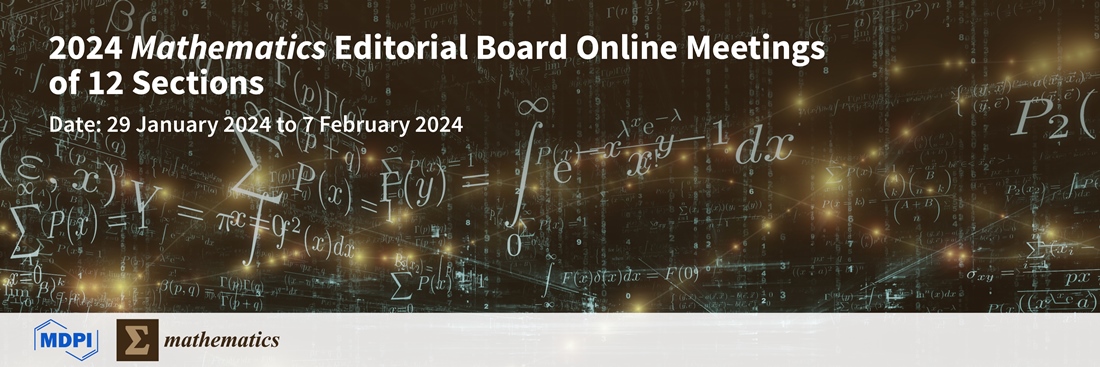
We are delighted to share the news that the 2024 Mathematics Editorial Board online meetings for 12 Sections were successfully held between 29 January and 7 February 2024. Individual meetings were held for each Section as follows:
- “Dynamical Systems”;
- “Computational and Applied Mathematics”;
- “Mathematics and Computer Science”;
- “Fuzzy Sets, Systems and Decision Making”;
- “Probability and Statistics”;
- “Financial Mathematics”;
- “Network Science”;
- “Mathematical Physics”;
- “Difference and Differential Equations”;
- “Engineering Mathematics”;
- “Algebra, Geometry and Topology”;
- “Mathematical Biology”.
We are delighted that a total of 111 Editorial Board Members participated in the meetings. Every Section meeting began with a presentation about the journal and the relevant Section and detailed the following:
- Journal history, publication statistics, Editorial Board Member distribution, manuscript editorial process, journal activities (conferences, webinars, collaborations with conferences, journal awards, etc.);
- Aims and scope of the Section, Editorial Board Member distribution across the Section, Section statistics and main topics of current Special Issues.
The topics discussed during the meetings included keywords and hot topics for the Sections, suggestions to improve the editorial process (review process, decision process, layout process, etc.), Special Issue management, journal collaborations with societies and conferences, feature paper invitations, and different ways to generally improve the journal. We would like to express our gratitude for the support of each participant and will strive to incorporate these suggestions into our future practices.
The Editorial Board online meetings were a great step forward in the development of Mathematics (ISSN: 2227-7390), therefore, we would also like to share that the Editorial Board online meeting of the Section “Functional Interpolation” will be held on a suitable date in the future.
The aim of the meetings was to strengthen communication with Editorial Board Members and encourage effective discussions and suggestions from the editors. We would like to thank every Editorial Board Member and the academic staff involved for their support of the Sections and the journal. We look forward to future Editorial Board Meetings and to making more progress.
To access more information on each Section, please visit the following link: https://www.mdpi.com/journal/mathematics/sections.
31 January 2024
MDPI Insights: The CEO's Letter #8 - Altmetric and Flat Fee Agreement

Welcome to the MDPI Insights: The CEO's Letter.
In these monthly letters, I will showcase two key aspects of our work at MDPI: our commitment to empowering researchers and our determination to facilitating open scientific exchange.
Opening Thoughts

MDPI and Digital Science Meeting
At MDPI, we are committed to providing our authors with the essential tools to publish, promote, and track their research. In line with this commitment, we have established a longstanding collaboration with Digital Science, a company specializing in research data and analytical insights for the research community. Our collaboration integrates their Altmetric tool, offering us and our authors the ability to track a variety of sources that monitor and report attention surrounding publications.
As part of our collaboration, we recently hosted Cathy Holland, Director of Global Publisher Business Development, and Helen Cooke, Managing Director of Publisher Sales, from Digital Science, at our MDPI headquarters in Basel, Switzerland.
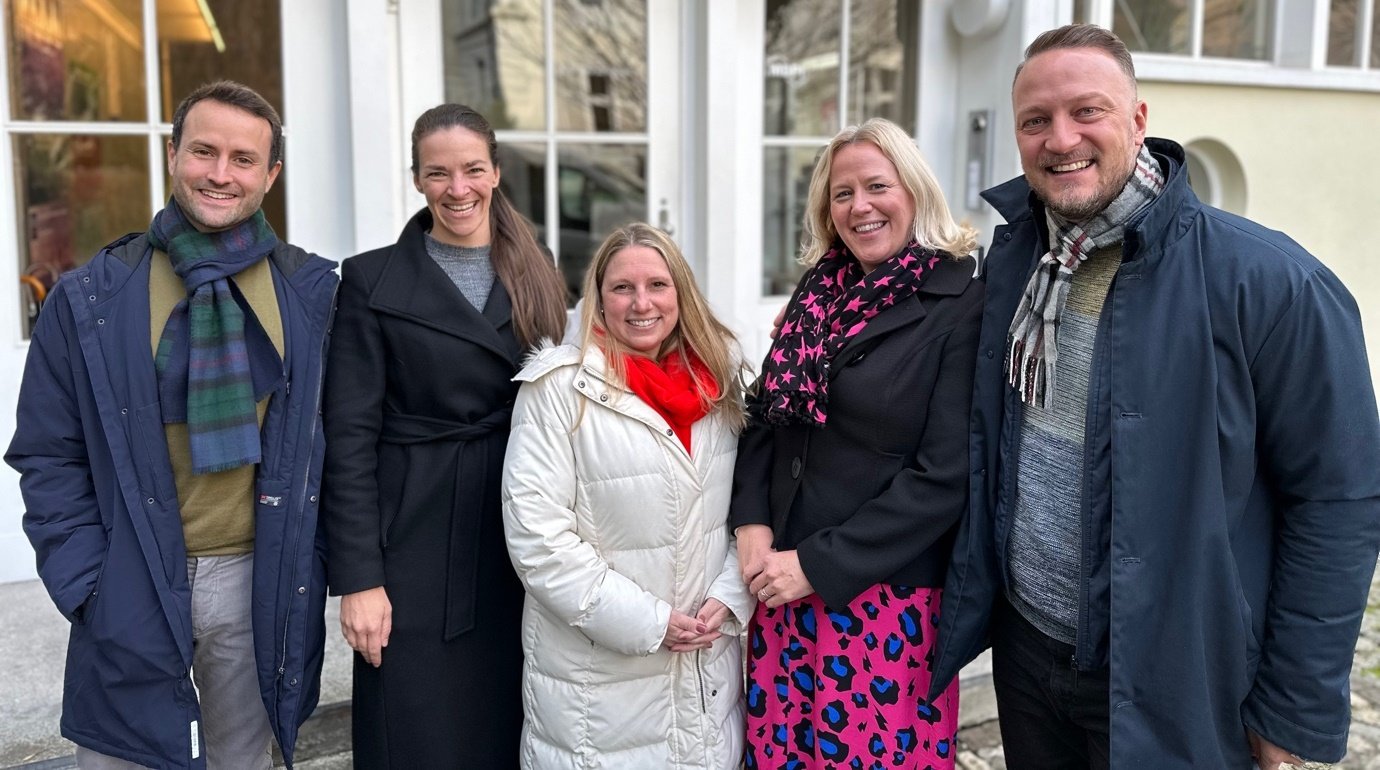
Left to right: Facundo Santomé (Senior Marketing Manager, MDPI), Constanze Shelhorn (Indexing Manager, MDPI), Cathy Holland (Director of Global Publisher Business Development, Digital Science), Helen Cooke (Managing Director of Publisher Sales, Digital Science), and Stefan Tochev (CEO, MDPI) in front of MDPI headquarters in Basel, Switzerland.
During our meeting, we discussed MDPI’s publishing philosophy and explored further avenues for collaboration. We look forward to continuing our partnership with Digital Science, aiming to improve our services yet further and meet the needs of our authors more closely than ever.
What is Altmetric?
You will notice that MDPI articles feature an Altmetric score, a colourful doughnut capturing the score in the upper right corner of the article page. This score represents ‘alternative metrics,’ as distinct from traditional metrics such as Impact Factor, CiteScore, and Scimago Journal Rank.
Altmetrics complement traditional citation-based metrics by capturing online discussions related to a specific research topic. By analyzing both sets of data, we can obtain a comprehensive understanding of the attention a particular research output receives and the sources in which it is mentioned.
“Almetric provides visual insights into where research is being discussed”
Sources Tracked by Altmetric
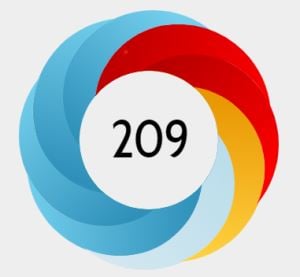
Altmetric badge showing the Altmetric score and colour-coded mention sources.
Altmetric monitors various sources, categorizing them into segments such as policy documents, peer reviews, Wikipedia, news and blogs, and social media, among other sources. Each category is identifiable by a specific colour.
The Altmetric badge provides visual insights into where the research is being discussed. A more colourful badge indicates broader mentions across multiple platforms. Such tracking enables us to gauge the extent of an article’s online dissemination, noting that increased visibility may correlate with higher citation rates.
Read more:
Impactful Research

Ten High-Altmetric Articles Published by MDPI
As at 30 January 2024, Altmetric has tracked 670,500 MDPI research outputs from MDPI, resulting in over 4.3 million mentions. This includes over 71,894 mentions in policy and patents and 294,714 mentions in news and blogs, with some achieving an Altmetric score as high as 28,754.
So, what is a good Altmetric score? There are various ways to put this score into context. You can find out more about the score in context and how to evaluate your work by this means.
Here are ten MDPI papers ranking in the top 5% of all research outputs scored by Altmetric.
|
|
“Accuracy in Wrist-Worn, Sensor-Based Measurements of Heart Rate and Energy Expenditure in a Diverse Cohort” J. Pers. Med. 2017, 7(2), 3; https://doi.org/10.3390/jpm7020003 Altmetric page: https://mdpi.altmetric.com/details/20477344 Altmetric shows that this article appeared in 253 news stories from 209 outlets including Forbes, BBC, and Fox News. |
|
|
“Daylight Saving Time and Acute Myocardial Infarction: A Meta-Analysis” J. Clin. Med. 2019, 8(3), 404; https://doi.org/10.3390/jcm8030404 Altmetric page: https://mdpi.altmetric.com/details/57654628 Altmetric shows that this article appeared in 295 news stories from 207 outlets including Forbes, The Atlantic, and New York Times. |
|
|
“The Preliminary Analysis of Cave Lion Cubs Panthera spelaea (Goldfuss, 1810) from the Permafrost of Siberia” Quaternary 2021, 4(3), 24; https://doi.org/10.3390/quat4030024 Altmetric page: https://mdpi.altmetric.com/details/111086701 Altmetric shows that this article appeared in 182 news stories from 134 outlets including CBC News, CNN, and National Geographic. |
|
|
“Not the Cat’s Meow? The Impact of Posing with Cats on Female Perceptions of Male Dateability” Animals 2020, 10(6), 1007; https://doi.org/10.3390/ani10061007 Altmetric page: https://mdpi.altmetric.com/details/83796184 Altmetric shows that this article appeared in 124 news stories from 98 outlets including VICE, CNN and The Guardian. |
|
|
“Behaviour and Welfare Impacts of Releasing Elephants from Overnight Tethers: A Zimbabwean Case Study” Animals 2022, 12(15), 1933; https://doi.org/10.3390/ani12151933 Altmetric page: https://mdpi.altmetric.com/details/133463915 Altmetric shows that this article appeared in 192 news stories from 186 outlets. |
How do I use altmetrics?
Altmetric Explorer provides a detailed step-by-step guide and instruction video for first-time users of the tool. The guide includes useful diagrams that make it easy to get started.
Sharing Research Online
For research to be tracked across different sources, Altmetric needs a research output with a persistent identifier: a DOI, ISBN, PubMed ID, handle ID, etc. When sharing research, it is important to include a link to the original research output.
|
|
“An Update on Eukaryotic Viruses Revived from Ancient Permafrost” Viruses 2023, 15(2), 564; https://doi.org/10.3390/v15020564 Altmetric page: https://mdpi.altmetric.com/details/142929875 Altmetric shows that this article appeared in 250 news stories from 180 outlets including CTV, Fox News, and CNN. |
|
|
“The Global Problem of Insufficient Sleep and Its Serious Public Health Implications” Healthcare 2019, 7(1), 1; https://doi.org/10.3390/healthcare7010001 Altmetric page: https://mdpi.altmetric.com/details/53406248 Altmetric shows that this article appeared in 252 news stories from 168 outlets including BBC, Harvard Business Review, and Forbes. |
|
|
“A Detailed Review Study on Potential Effects of Microplastics and Additives of Concern on Human Health” Int. J. Environ. Res. Public Health 2020, 17(4), 1212; https://doi.org/10.3390/ijerph17041212 Altmetric page: https://mdpi.altmetric.com/details/86529137 Altmetric shows that this article appeared in 197 news stories from 150 outlets including BBC, The Tribune, and World Economic Forum. |
|
|
“An Empirical Study of Chronic Diseases in the United States: A Visual Analytics Approach to Public Health” Int. J. Environ. Res. Public Health 2018, 15(3), 431; https://doi.org/10.3390/ijerph15030431 Altmetric page: https://mdpi.altmetric.com/details/34714141 Altmetric shows that this article appeared in 232 news stories from 149 outlets including Forbes, New York Times, and Harvard Business Review. |
|
|
“Garden Scraps: Agonistic Interactions between Hedgehogs and Sympatric Mammals in Urban Gardens” Animals 2023, 13(4), 590; https://doi.org/10.3390/ani13040590 Altmetric page: https://mdpi.altmetric.com/details/142934305 Altmetric shows that this article appeared in 172 news stories from 168 outlets including BBC. |
Inside MDPI

MDPI Annual Meeting Celebrations in China
On Thursday 25 January, over 1,300 MDPI colleagues from our two offices in Beijing gathered to kick off MDPI’s traditional ‘Annual Meetings.’ These celebrations take place in MDPI’s offices across China, including Dalian, Tianjin, Wuhan, and Nanjing.
The evenings include performances, informative talks and presentations, awards, and entertainment, providing an ideal platform to recognize our colleagues, celebrate their achievements, and set our sights on the future.
“It is essential that we stay connected and share best practices”

I sent a video congratulating everyone on their work and sharing our vision of building MDPI into the most trusted OA publisher, highlighting the roles each of us has to play in achieving that goal.
Unfortunately I could not join in person, but you may recall my recent trip, when I visited our offices in Beijing and Wuhan, which I look forward to visiting again this year.
Although our headquarters are in Basel, Switzerland, and we are expanding throughout Europe and North America, the majority of MDPI’s workforce is in China and throughout the Asia-Pacific region, including offices in Singapore, Thailand, Japan, and newly opened office in South Korea. It is essential that as a global organization, we stay connected and share best practices in order to grow collectively and continue providing the exceptional service to our authors.
The Annual Meeting is a moment to reflect and enjoy the year’s hard work and dedication.
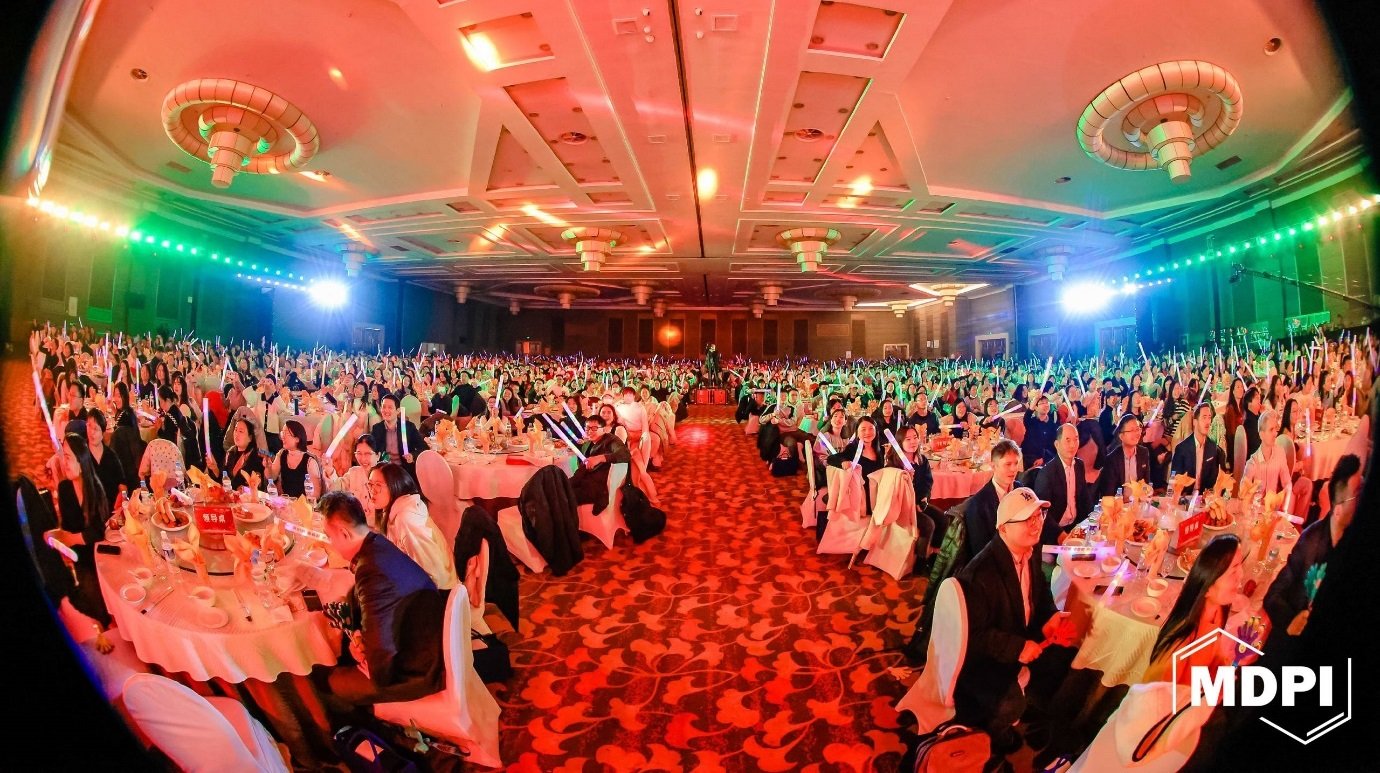
I extend our best wishes to all for the Chinese New Year (Xīnnián kuàilè)!
Coming Together for Science
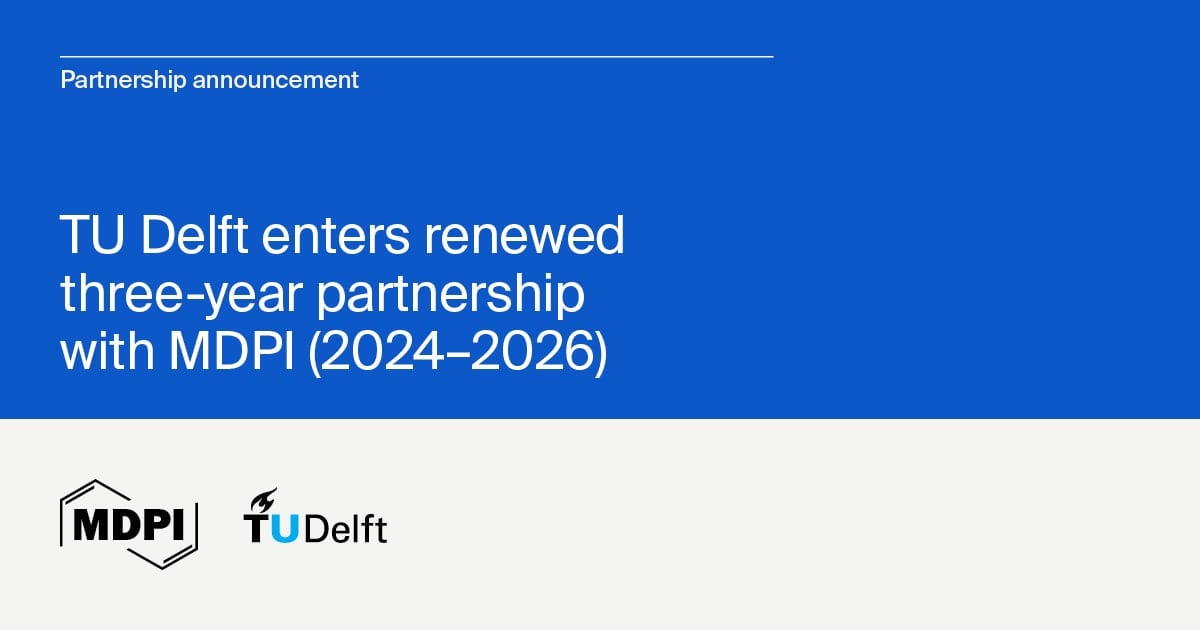
MDPI and TU Delft Adopt Flat Fee Model in Extended Partnership
We are excited to announce a renewed three-year partnership with Delft University of Technology (TU Delft) in the Netherlands. This collaboration introduces a fixed lump-sum fee, covering publishing costs from 2024 to 2026.
“This initiative reflects our dedication to transparent and inclusive publishing”
TU Delft-affiliated authors will enjoy cost-free publishing in any MDPI journal during this period, aligning with our commitment to removing barriers for open access publishing. The agreement supports Plan S compliance and facilitates a seamless publishing process for TU Delft corresponding authors. This initiative reflects our dedication to transparent and inclusive publishing, providing stability and predictability both for authors and for institutions.
For further details on our Institutional Open Access Program (IOAP), please contact us.
Benefits to MDPI’s IOAP
At MDPI we have a long tradition of partnerships, including our Institutional Open Access Program (IOAP). IOAP supports institutions through simplification, access, transparency, APC discounts, and institutional repository deposits. The program simplifies administrative processes, offers central payment, and allows easy opting in and out. Participants gain free access to Susy, MDPI’s online submission system, with extensive article metadata and exportable data. APC discounts and Book Processing Charge discounts are available for affiliated authors. Automated deposits to institutional repositories and streamlined matching of papers to IOAP participants enhance the overall experience.
For further information, see our IOAP FAQ.
Closing Thoughts

Reflections on the 2024 APE Conference
MDPI was proud to co-sponsor the Academic Publishing in Europe (APE) 2024 Conference that took place in Berlin, Germany, from 9–10 January 2024.
The conference theme, ‘Keep the Conversation Going!’, explored the evolving landscape of scholarly communication. APE is one of the key conferences I make a point to attend each year. January offers a valuable opportunity to engage with new contacts, reconnect with familiar faces, and participate in impactful discussions and presentations among professionals, scholars, and practitioners in the field.
“It's fascinating to see how other publishers are leveraging AI”
Highlights
Some of the standout panels for me include: the role of the UN Sustainable Development Goals (SDGs) within the publishing industry. It was encouraging to hear the current status quo, though I was eager also to learn about the exciting projects planned for 2024 and beyond. These will allow us to track progress in subsequent years. At MDPI, we remain committed to promoting Open–Access (OA) content on SDGs through scientific articles and books. Furthermore, we extend our commitment to sustainability by financially supporting researchers through initiatives such as the World Sustainability Award and the Emerging Sustainability Leader Award, as well as waiving the APC for feature papers on each SDG.
In recent years, discussions on AI have become increasingly prominent at such conferences. It’s fascinating to see how other publishers are leveraging AI to meet the evolving needs of their audiences while at the same time using it to safeguard the scientific process. Other engaging panels that I enjoyed included updates on transformation beyond transformative agreements, the principles of lean change, incentive structures related to research integrity, and the panel on reviewer incentives.
“We can share best practices and lessons learned”
Incorporating MDPI’s Insights into Conferences
I must confess that I sometimes feel overlooked when MDPI is not invited to participate in crucial industry discussions. As the leading open access publisher and the third-largest publisher overall, we possess extensive experience in many of these areas and can offer valuable contributions to these discussions. We can share best practices, lessons learned, and our thinking about future trajectories. For instance, in panels discussing reviewer incentives, at MDPI we offer a discount voucher to reviewers for future submissions, reflecting our commitment to fostering a robust peer review process. In 2022 alone, MDPI collected over 1.4 million peer review reports, informing the decision-making processes of our editors. Given our expertise in these areas, it would be natural to include MDPI in such discussions. I therefore extend an invitation to future conference organizers to consider MDPI for speaking engagements and collaborative opportunities.
Chief Executive Officer
MDPI AG
27 January 2024
Acknowledgment of the Reviewers of Mathematics in 2023
In recognizing the exceptional efforts of our reviewers in 2023, we express our sincere gratitude for upholding the high standards of Mathematics. Their commitment ensured the rigorous peer review that is integral to quality academic publishing.
In 2023, Mathematics received 19,373 review reports, from 10,105 reviewers. This past year, we worked with reviewers from 126 countries and regions, reflecting the diversity in our collaboration with research communities. Their dedication shapes scholarly discourse and advances global research. The editorial team expresses gratitude for the vital role played by each reviewer in the Mathematics family throughout 2023, and we look forward to their continued support in 2024.
The following are the reviewers who have consented to show their names:
| A. Anitha | Leonardo Santos |
| A. Raja Annamalai | Leonardo Trujillo |
| A. V. Galatentko | Leonardo Vásquez-Ibarra |
| Aamir Muhammad | Leoneed Kirilov |
| Aashish Kumar Bohre | Leonid Bogdanov |
| Aatif Ali | Leonid Shaikhet |
| Abbas Kareem Wanas | Lev Kazakovtsev |
| Abbas Mahdavi | Lev Kuzmin |
| Abbas Rezaei | Lev Matveev |
| Abbas Rohani | Lev Spevak |
| Abbott Po Shun Chen | Levan Chotorlishvili |
| Abboubakar Hamadjam | Li Ma |
| Abd Al Karim Haj Ismail | Liang Wang |
| Abdalhossein Rezai | Liaqat Ali |
| Abdelaziz Mennouni | Libo Feng |
| Abdelaziz Timesli | Libor Pekař |
| Abdelfettah Benchrif | Lidong Zhang |
| Abdelghani Dahou | Lihao Ge |
| Abdelhadi Belfadel | Lili Chen |
| Abdelkrim Salim | Liliana Caldeira |
| Abdellatif Boureghda | Liliana Ionescu-Feleaga |
| Abdelmadjid Recioui | Liliana Mata |
| Abdelmajid Belafhal | Linchen He |
| Abdelouahed Alla Hamou | Lingfa Lu |
| Abdelouahed Hamdi | Ling-Ling Ma |
| Abdelsalam Hamid | Liu Peishun |
| Abderrahim Wakif | Liu Shengda |
| Abdisalam Muse | Liudmila Zhilyakova |
| Abdul Aziz Abdul Rahman | Liwei Deng |
| Abdulaziz Garba Ahmad | Ljubiša Kočinac |
| Abdulghani Muhyi | Llorenç Cerdà-Alabern |
| Abdulrazak Otaru | Loredana Iambor |
| Abdur Rasool | Lorena Caridad |
| Abdur Raziq | Lorena Parra |
| Abdussalam Elhanashi | Luai Al-Labadi |
| Abhijeet R. Patil | Luca Desiderio |
| Abhijit Datta Banik | Luca Di Persio |
| Abhishek Singh | Luca Gemignani |
| Abiodun Oladipo | Luca Nanni |
| Abiodun Opanuga | Lucas Frizera Encarnação |
| Abiola Adepoju | Lucian Lupu |
| Abraham Amole | Luciano Coutinho |
| Abraham Arenas Tawil | Luigi Mascolo |
| Abu Bakkar Siddik | Luigi Pilo |
| Abul Doulah | Luis Adrián Lizama-Perez |
| Adam Sulich | Luis Alberto Morales Rosales |
| Adan Ramirez-Lopez | Luis Alberto Rodríguez-Picón |
| Adebowale Obalalu | Luis Carlos Méndez González |
| Adel Alti | Luis Jesús Fernández Suárez |
| Adela Mihai | Luís Miguel Matos |
| Adela-Eliza Dumitrascu | Luis N. Coria |
| Adeolu Taiwo | Luis Palomero |
| Adimoolam Malaiyalathan | Luis Prola |
| Adinel Gavrus | Luisa D'Amore |
| Adirak Kanchanaharuthai | Luísa Lucchese |
| Adis Puška | Luiz Antonio Alcântara Pereira |
| Aditya Kashi | Luiz Paulo Fávero |
| Aditya Singh | Luiz Pinto |
| Adnan Khan | Lukai Song |
| Adnane Boukhouima | Lu-Kai Song |
| Adnene Arbi | Lukasz Bohdal |
| Adrian Amor-Martin | Lulu Wang |
| Adrian Ciobanu | Luminita Nicolescu |
| Adrian Gligor | Luminita Scripcariu |
| Adrian Kapczynski | M. L. Rudakov |
| Adrian M.P. Braşoveanu | M. Meenamathi Karthiga |
| Afeez Abidemi | M. Mohan Raja |
| Afis Saliu | M. Premkumar |
| Agassi Melikov | M. Roozbeh |
| Agata Szłapa-Kula | M.L. Gamiz |
| Agbotiname Imoize | M.M.M. Jaradat |
| Agnieszka Choroszucho | M.R. Hematiyan |
| Agoritsa Polyzou | M.T. Darvishi |
| Agus Wibowo | Maasoomah Sadaf |
| Agustín Herrera-May | Maciej Kruszyna |
| Agustín Moreno Cañadas | Maciej Romaniuk |
| Ahmad Abu-Shareha | Madduma Wellalage Pasan Maduranga |
| Ahmad Al-Daraiseh | Made Windu Antara Kesiman |
| Ahmad Ali | Magno Machado |
| Ahmad Al-Omari | Maha Shehadeh |
| Ahmad Alshorman | Mahdi Hasanlou |
| Ahmad H. Sabry | Mahdi Kalantari |
| Ahmad Hassanat | Mahdi Karami |
| Ahmad Mohammad | Mahdi Salehi |
| Ahmad Qazza | Maher Salloom |
| Ahmadjan Muhammadhaji | Mahesh Goyani |
| Ahmed A. Zaid | Mahmood Parsamanesh |
| Ahmed Aberqi | Mahmoud A. Ibrahim |
| Ahmed Al Mansur | Mahmoud Elbattah |
| Ahmed Al-Manea | Mahmoud H. Darassi |
| Ahmed Faeq Hussein | Mahyar Kamali Saraji |
| Ahmed Hamoud | Maisa Kely De Melo |
| Ahmed Imran | Maja Andrić |
| Ahmed J. Obaid | Maja Cavic |
| Ahmed Nawsher Alam | Majeed Ahmed Al-Jawary |
| Aijun Zhu | Majeed Yousif |
| Aili Wang | Majid Erfanian |
| Aissa Abderrahmane | Majid Forghani-Elahabad |
| Aivaz Kamer-Ainur | Majid Hosseinpour |
| Akihito Hiromori | Majid Moazzami |
| Alain Vande Wouwer | Majid Pouraminian |
| Alberto Molgado | Majid Tavassoli Kajani |
| Alberto Olivares | Majlinda Fetaji |
| Alberto Turón | Makhmud Sadybekov |
| Alejandro Aceves | Maksim Shirobokov |
| Alejandro Zunino | Maksim Vlasov |
| Aleksandar Cuculić | Maksims Feofilovs |
| Aleksandar Miladinovic | Malaya Nath |
| Aleksandar Milićević | Małgorzata Grzelak |
| Aleksander Jakimowicz | Malgorzata Pankowska |
| Aleksander Mendyk | Malinda Vania |
| Aleksandr Alekseev | Malinka Ivanova |
| Aleksandr Kutukov | Mamoun Abu Helou |
| Aleksandr Rakhmangulov | Mancho Manev |
| Aleksandr Romanov | Manikandan Kannan |
| Aleksandr Sinitca | Manish Bansal |
| Aleksandr Tynda | Manpreet Singh |
| Aleksandra Knapińska | Manuel Alberto M. Ferreira |
| Aleksandra Werner | Manuel De La Sen |
| Aleksey Antipov | Manuel F. M. Costa |
| Aleksey Dorofeev | Manuel Francisco Coelho |
| Aleksey Gvozdarev | Manuel Lis |
| Alena Buchalcevova | Manuel Ortigueira |
| Alessandro Di Pretoro | Manuel Saldaña |
| Alex De Oliveira | Manuela Panoiu |
| Alexander Arguchintsev | Maodong Pan |
| Alexander Buldaev | Maowei Chen |
| Alexander Dudin | Marcela Malindzakova |
| Alexander Hübl | Marcello Delitala |
| Alexander Kazakov | Marcelo G. Kovalsky |
| Alexander Kocian | Marcelo Greco |
| Alexander Lyapin | Marcelo Lenzi |
| Alexander Moiseev | Marcelo V. Flamarion |
| Alexander Pchelintsev | Marcin Kicinski |
| Alexander Perez-Pons | Marcin Kolakowski |
| Alexander Pigazzini | Marcin Lawnik |
| Alexander Pisarchik | Marcio Basilio |
| Alexander Robitzsch | Marcio Laurini |
| Alexander Shapovalov | Marco Bonopera |
| Alexander Skundin | Marco Cinelli |
| Alexander Šostak | Marco Favretti |
| Alexander Tarasyev | Marco Gallo |
| Alexander Trounev | Marco Lombardi |
| Alexander Uzhinskiy | Marco Lorenzini |
| Alexandr Kuznetsov | Marco Menale |
| Alexandr Petukhov | Marco Tulio Ramírez Torres |
| Alexandra M.S.F. Galhano | Marco Zamora Antuñano |
| Alexandre Almeida Del Savio | Marek Błasik |
| Alexandre Hudon | Marek Cała |
| Alexandre Landry | Marek Krawczuk |
| Alexandre Nassif | Marek Lampart |
| Alexandru Pirjan | Marek Liška |
| Alexei Semenov | Marek Miskowicz |
| Alexey Beskopylny | Marek Ogryzek |
| Alexey Bosov | Marek Sawerwain |
| Alexey Bykovsky | María Carmen Carnero |
| Alexey I. Shinkevich | Maria Cieśla |
| Alexey Melnikov | Maria Cristina Porcu |
| Alexey Porubov | Maria Datcheva |
| Alexey Troshin | Maria Dobritoiu |
| Alexis Lopez | Mária Kúdelčíková |
| Alfio Giarlotta | Maria Lapina |
| Alfonso Gómez-Espinosa | Maria Stepanova |
| Ali Abboud | Maria Teresa Bixirao Neto |
| Ali Abdulhameed | Maria Teresa Gonzalez-Aparicio |
| Ali Ala | Maria Vasileva |
| Ali Al-Juboori | Maria Viorela Muntean |
| Ali Almisreb | Mariam Ibrahim |
| Ali Asghar Talebi | Maria-Magdalena Boureanu |
| Ali Asghari | Marian Ioan Munteanu |
| Ali Dehghan Firoozabadi | Marian Ion |
| Ali Dolati | Marian Pompiliu Cristescu |
| Ali Ebrahimi-Mamaghani | Mariana Dumitrescu |
| Ali El-Rifaie | Mariana Durcheva |
| Ali Fahad Fahem | Marianthi Bouzouni |
| Ali Ghalavand | Marichelvam Mariappan Kadarkarainadar |
| Ali Haji-Badali | Marie Graff |
| Ali Hakem | Marien Graham |
| Ali Hasan Ali | Marija Najdanović |
| Ali Hussein Hasan Alrikabi | Marilaine Colnago |
| Ali Lakirouhani | Marilena Jianu |
| Ali Mohammad Alqudah | Marina A. P. Andrade |
| Ali Mohammad-Djafari | Marina Bardamova |
| Ali Shukur | Marina Barulina |
| Ali Sorourkhah | Marina Resta |
| Ali Talimian | Mário Antunes |
| Ali Tarkashvand | Mario Di Bacco |
| Ali Zolfagharian | Mario Lucido |
| Alicja Jokiel-Rokita | Mario Pezzella |
| Alina Bianca Pop | Mario Rivero-Angeles |
| Alina Calin | Mario Rosario Chiarelli |
| Alina Iuliana Tabirca | Mario Rosolino Abundo |
| Alina Momot | Mariusz Ciesielski |
| Alina-Mihaela Patriciu | Marjan Mernik |
| Alireza Abbasimoshaei | Mark Edelman |
| Alireza Alfi | Mark Kelbert |
| Alireza Rashidi Komijan | Mark Mccormick |
| Alisson Silva | Marko Gulić |
| Allan G. S. Sánchez | Marko Orošnjak |
| Aloisi Somer | Markus Puchinger |
| Alok Dhaundiyal | Marshal Raj |
| Alon Davidy | Marta Kiraga |
| Alvaro Figueira | Martin Aleksandrov |
| Alvaro Manuel Rodriguez-Rodriguez | Martin Beer |
| Alvaro Salas | Marwan Al-Momani |
| Alwin Poulose | Marwan Al-Raeei |
| Amalendu Mahapatra | Maryam Arabameri |
| Amar Debbouche | Marzena Iwaniszyn |
| Amar Nath Chatterjee | Masaaki Tamagawa |
| Ameer Hamza Khan | Masoud Babaei |
| Ameer Kwekha Rashid | Massimo Di Gangi |
| Amer Al-Omari | Massimo Pacella |
| Americo Correia | Massoud Amini |
| Amílcar Oliveira | Matej Mencinger |
| Amin Mansoori | Mathiyalagan Kalidass |
| Aminat Uzdenova | Matt Spick |
| Amine Dahane | Matteo Bruno Lodi |
| Amir A. Ghavifekr | Matteo Farnè |
| Amir Aghsami | Matthew Craven |
| Amir Benzaoui | Matthew Oluwayemi |
| Amir Golroo | Matúš Bilčík |
| Amir Hosein Oveis | Mauro Passacantando |
| Amir Karbassi Yazdi | Maxim Bakaev |
| Amir M. Fathollahi-Fard | Maxim Sakharov |
| Amir R. Masoodi | Maxim Tereshonok |
| Amirmasoud Ahmadi | Maxim Yurkin |
| Amirtharajan Rengarajan | Md Humayun Kabir |
| Amit Awasthi | Md. Asaduzzaman |
| Amit Chattopadhyay | Mehdi Asadi |
| Amit Chhabra | Mehdi Gheisari |
| Amit Ganatra | Mehdi Rafie-Rad |
| Amit Kumar | Mehmet Akbay |
| Ammar Kadi | Meili Liu |
| Ammar Odeh | Meisam Abdollahi |
| Amroune Salah | Menachem Domb |
| Ana Azevedo | Meng Wang |
| Ana Moita | Mengchu Zhou |
| Anand Rajawat | Mengyao Liu |
| Anantachai Padcharoen | Merugu Suresh |
| Ananya Tripathy | Messaoud Berkal |
| Anas Al-Masarwah | Meysam Akbari |
| Anas Alsobeh | Meysam Atashafrooz |
| Anass Barodi | Micah Brush |
| Anastasia Atabekova | Michael Mangold |
| Anatoliy Kazak | Michael Mcguire |
| Anatoliy Swishchuk | Michael Voskoglou |
| Anatoly Dryga | Michail Tsangas |
| Anatoly Filippov | Michał Batsch |
| Anatoly Zakharov | Michal Borecki |
| Anbesh Jamwal | Michał Grodecki |
| Anca Elena Afloarei Nucu | Michał Stosiak |
| Anca Mehedintu | Michel Duval |
| Anca Miron | Michel Planat |
| An-Chi Huang | Michele Bellingeri |
| Andang Sunarto | Michele Pagano |
| Andrada Pica | Mieczysław Cichoń |
| Andra-Elena Diaconescu | Miglena Koleva |
| Andranik Akopov | Miguel Amado |
| André Longaray | Miguel Angel Latorre Guillem |
| André Luiz Carvalho Ottoni | Miguel Ángel Millán Muñoz |
| Andrea Boghi | Miguel Angel Murillo-Escobar |
| Andrea Palumbo | Miguel Arjona Ramírez |
| Andrea Rey | Miguel Lorenzo-Fernandez |
| Andrea Tigrini | Miguel Pereira |
| Andreas Arvanitoyeorgos | Miguel Sellitto |
| Andreas Kalogeropoulos | Miguel Uribe-Opazo |
| Andreas Makrides | Miha Moškon |
| Andreas Nikiforiadis | Mihaela Tudose |
| Andreea Puiu | Mihai Daniel Roman |
| Andrei Karatkevich | Mihai Gavrilas |
| Andrei Mihaela | Mihai Marciu |
| Andrei Panteleev | Mihai Oproescu |
| Andrei Vladyko | Mihai Tiberiu Lates |
| Andrés Barrios-Rubio | Mijanur Rahaman Seikh |
| Andres Hirigoyen | Mikhail Artemov |
| Andrew Omame | Mikhail Basov |
| Andrey Afanasiev | Mikhail E. Semenov |
| Andrey Gorshenin | Mikhail Kuptsov |
| Andrey Ivantsov | Mikhail Lytaev |
| Andrey Kurkin | Mikhail Shleymovich |
| Andrey Lychev | Mikhail Volkov |
| Andrey Mityakov | Miklhail Alekseevich Basarab |
| Andrey Orekhov | Milan Matejdes |
| Andrey Stepnov | Milan Zlatanovic |
| Andrey Teplykh | Miled El Hajji |
| Andrey Zahariev | Milena Petkova |
| Andrii Shydlich | Milos Antonijevic |
| Andrius Katkevičius | Miloš Gligorić |
| Andrzej Kasperski | Miloš Milosavljević |
| Aneesh Chand | Milos Seda |
| Aneta Ptak-Chmielewska | Min Ye |
| Ángel Giménez | Min Zhang |
| Ángel Javier Aguirre De Juana | Mina Norouzirad |
| Angel Morales Ramírez | Ming Xie |
| Ángel Sánchez García | Ming-Fu Hsu |
| Angelo Leopardi | Ming-Hung Hsu |
| Angelo Marcelo Tusset | Mingliang Suo |
| Angshuman Khan | Minhyeok Lee |
| Anh Nguyen | Minjong Cheon |
| Anibal Azevedo | Mintodê Nicodème Atchadé |
| Anibal Coronel | Minvydas Ragulskis |
| Aniruddha Rajendra Rao | Miodrag Zivkovic |
| Anirudh Pradhan | Mir Sajjad Hashemi |
| Anisha Rodrigues | Mircea Crasmareanu |
| Anita Agárdi | Mircea Fulea |
| Anja Terzic | Mircea Șcheau |
| Ankan Bhaumik | Mircea Viorel Drăgoi |
| Ankush Kansal | Mirela Cătălina Türkeș |
| Anna Borucka | Mirjana Platiša |
| Anna Fiori | Mirko Karakašić |
| Anna Glazkova | Miroslava Antić |
| Anna Knitter-Piątkowska | Miroslavas Pavlovskis |
| Anna Lempert | Mishall Al-Zubaidie |
| Anna Łyczkowska-Hanćkowiak | Mithra Venkatesan |
| Anna Manowska | Mladen Krstić |
| Anna Sączewska-Piotrowska | Mlamuli Dhlamini |
| Anna Stankiewicz | Mochammad Fahlevi |
| Annibal Sant’Anna | Mohamad Awad |
| Anton Gryzlov | Mohamad Azizipour |
| Anton Iliev | Mohamad Roshanzamir |
| Anton Romanov | Mohamadreza Zarastvand |
| Antonella Falini | Mohamed Charhbili |
| António Caleiro | Mohamed Hanine |
| Antonio Cardone | Mohammad Abobala |
| Antonio Concilio | Mohammad Afikuzzaman |
| Antonio Di Bari | Mohammad Almseidin |
| Antonio Gilson Barbosa De Lima | Mohammad Alqudah |
| António Lopes | Mohammad Al-Rawi |
| Antonio Maria Scarfone | Mohammad Aslefallah |
| Antonio Polimeni | Mohammad Hamed |
| Antonio Quintero Rincón | Mohammad Hashemi-Tabatabaei |
| Antonio Seijas-Macias | Mohammad Hossein Moattar |
| Antonios Charalambopoulos | Mohammad Izadi |
| Anuchit Jitpattanakul | Mohammad Javad Ebadi |
| Anurag Thantharate | Mohammad Javad Rahimdel |
| Anwar Shahid | Mohammad Khan |
| Aparajita Jaiswal | Mohammad Meraj Mirza |
| Apoorva Nisal | Mohammad Mobashir |
| Arangarajan Vinayagam | Mohammad Moradi |
| Arash Ghorbanalizadeh | Mohammad Muntasir Rahman |
| Arash Heidari | Mohammad Navaz Rasoulizadeh |
| Arbnor Pajaziti | Mohammad Radad |
| Arcot Usha | Mohammad Reza Gharib |
| Aref Shirazi | Mohammad Rezapour |
| Arioua Yacine | Mohammad Saber Fallah Nezhad |
| Arjan Gijsenij | Mohammad Safi Ullah |
| Arkadiusz Bednarz | Mohammad Yazdi |
| Arkamitra Kar | Mohammadali Kiehbadroudinezhad |
| Arman Goudarzi | Mohammadmehdi Shahzamanian |
| Armando Gallegos | Mohammed A M Abdullah |
| Armin Dadras Eslamlou | Mohammed Abdo |
| Arno Schindlmayr | Mohammed Aldlemy |
| Arnulfo Alanis | Mohammed Ali |
| Artem Artyukhov | Mohammed Amer |
| Artem Lopatin | Mohammed Baki |
| Artem Obukhov | Mohammed Hajjaj |
| Arthi Murugadass | Mohammed Shakhatreh |
| Arthur Melani | Mohannad Mnati |
| Artion Kashuri | Mohanraj Thangamuthu |
| Artur Piękosz | Mohd Aquib |
| Artur Warchoł | Mohsen Reihanian |
| Arturo Leccadito | Mohsen Saffari Pour |
| Arturo Silva-Campillo | Mohsen Soltanifar |
| Arun Kumar Tripathi | Mojtaba Fardi |
| Arun Pandian J | Mojtaba Lezgy-Nazargah |
| Arvind Singh | Momčilo Dobrodolac |
| Arwin Sumari | Monica La Mura |
| Asad Elmgerbi | Mónica Rodrigues |
| Asdrúbal López-Chau | Monika Rybczak |
| Ashish Patel | Mosè Gallo |
| Ashwani Aggarwal | Moshe Averbukh |
| Asit Saha | Mostafa Behtouei |
| Asma Abdulrahman | Mostafa Ghobaei-Arani |
| Assef Zare | Mo'Tassem Al-Arydah |
| Asya Stoyanova-Doycheva | Moysés Nascimento |
| Athanasios Kiourtis | Mrudul Jani |
| Athanasios Rakitzis | Muaadh Almahalebi |
| Atif Mughees | Muath Obaidat |
| Atif Siddiqui | Much Aziz Muslim |
| Atik Kulakli | Mudasir Younis |
| Atthaphon Ariyarit | Muguras Mocofan |
| Attila Fazekas | Muhammad Ahsan |
| Attila Hilt | Muhammad Ashar Naveed |
| Attila Simo | Muhammad Awais |
| Atul Kumar | Muhammad Fasih Khalid |
| Augusto Cannone Falchetto | Muhammad Gulistan (Hazara University Mansehra) |
| Augustyn Lorenc | Muhammad Gulistan (University of Alberta) |
| Aura Popescu | Muhammad Idrees Afridi |
| Ayad Al-Dujaili | Muhammad Irfan |
| Aybeyan Selim | Muhammad Mohsin Kabir |
| Aydin Eresen | Muhammed Syam |
| Ayman Diyab | Muharman Lubis |
| Ayush Dogra | Mujahid Iqbal |
| Azam Abdollahi | Mukesh Awasthi |
| Azizollah Khormali | Mukti Subedi |
| Azizul Hoque | Muntadher Alsabah |
| Azmi Altintas | Murali Cheepu |
| B. C. Chanyal | Murat Çağlar |
| Babak Azarnavid | Murilo Eduardo Casteroba Bento |
| Babatunde Ojetunde | Murong Xu |
| Babu Dawadi | Murugan Senthil Mani Rajan |
| Baclayon Sundo | Murugaperumal Krishnamoorthy |
| Badr Mochizuki | Murugesan K. |
| Badreddine Ayadi | Musaddiq Al Ali |
| Badreddine Babes | Mustafa Avci |
| Balaram Khatri Ghimire | My Abdelouahed Sabri |
| Balázs Villányi | Mykola Kushnir |
| Balint Varga | N. Chandra |
| Balu Bhasuran | Nabih Pico |
| Bangtang Yin | Nabil El Akkad |
| Baravan Asaad | Nadesh Rk |
| Barbara Probierz | Nadia Al-Saidi |
| Bartłomiej Hadasik | Nadir Djeddi |
| Bartosz Fikus | Naga Raghuveer Modala |
| Basel Mahafzah | Nan Gao |
| Basheera Mahmmod | Nan-Jing Wu |
| Basil H. Jasim | Napat Harnpornchai |
| Basit Ali | Naresh Kumar |
| Bathrinath Sankaranarayanan | Nasrin Mohabbati Kalejahi |
| Batyr Orazbayev | Natalia Bondarenko |
| Batyrkhan Omarov | Natalia Karlsson |
| Bayda Atiya Kalaf | Natalia Levashova |
| Beata Bieszk-Stolorz | Nataliia Kholiavko |
| Behbod Ghalamkari | Nataliia Letunovska |
| Behrokh Beiranvand | Natalya Kondratyeva |
| Behrouz Parsa Moghaddam | Natalya Sedova |
| Behzad Farahani | Natarajan Prabaharan |
| Behzad Nemati Saray | Nataša Kovač |
| Behzad Pirouz | Natividad Duro |
| Belmiro Pereira Duarte | Navid Nadimi |
| Benaissa Chidmi | Neal Wagner |
| Benjamin Wacker | Nebojsa Dedovic |
| Beri Venkatachalapathy Senthil Kumar | Neelamadhab Padhy |
| Bernard Piette | Neeraj Misra |
| Bertrand Hassani | Nenad Cvetković |
| Bibhakar Kodamasingh | Nenad O. Vesić |
| Bikash Koli Dey | Nenad Petrovic |
| Bikramaditya Ghosh | Nevena Radovic |
| Bilal Khan | Nevena Rankovic |
| Biljana Lončar | Nguyen Luong Vuong |
| Bin Wei | Niaz Shahani |
| Binaya Bishi | Nicholas Sarlis |
| Binbin Yang | Nick Wintz |
| Bing-Zhao Li | Nicolae Adrian Secelean |
| Birojit Das | Nicolae Herisanu |
| Bishwajit Dey | Nicolae Pop |
| Bo Du | Nicolás Muñoz-Galeano |
| Bo Qiu | Nicole Christoff |
| Bo Wang | Nicoleta Sirghi |
| Bo Zhou | Nikita Osintsev |
| Boby John | Nikita Ratanov |
| Bogdan Gherman | Nikola Koceić-Bilan |
| Bogdan Oancea | Nikola Obrenović |
| Bogdan Tiganoaia | Nikola Simić |
| Bohdan Kopchak | Nikola Vladimir |
| Boikanyo Makubate | Nikolaj Goranin |
| Boris Bardin | Nikolaos Athanasios Anagnostopoulos |
| Borko Bulajic | Nikolaos Fountas |
| Bowei Li | Nikolaos Theodorakatos |
| Boyu Kuang | Nikolaos Tsakiridis |
| Božidar Potočnik | Nikolay D. Dimitrov |
| Bradley Roth | Nikolay Hinov |
| Bram Vanroy | Nikolay Kyurkchiev |
| Branimir Kalaš | Nilamadhab Mishra |
| Branislav Randjelovic | Nima Ahmadi |
| Brian Sloboda | Niranjanamurthy M |
| Brigitte Servatius | Nirmalendu Biswas |
| Bruno Felice Filippo Flora | Nitin Goyal |
| Buddhika Madurapperuma | Nitish Katal |
| Byoung Koo Lee | Nizar Faisal Alkayem |
| Bystrík Dolník | Norbert Oláh |
| Caius Panoiu | Nour Aburaed |
| California State Sacramento | Nuno Bastos |
| Calogero Vetro | Nuno Carlos Leitão |
| Camelia Cerbu | Nuno Miguel Barateiro Gonçalves Silva |
| Camelia Delcea | Nuno Miguel Marques De Sousa |
| Camila Saporetti | Nur Hasan Mahmud Shahen |
| Carla Faraci | Nuriye Sancar |
| Carlos Aguirre-Nuñez | Nwabueze Emekwuru |
| Carlos Contreras-Bolton | Oana Ticleanu |
| Carlos Couder-Castañeda | Oded Margalit |
| Carlos Eric Galván-Tejada | Odysseas Bouzos |
| Carlos Hall | Ohud Almutairi |
| Carlos Hernández Castellanos | Okokpujie Kennedy |
| Carlos López-De-Celis | Oksana Zhdanova |
| Carlos Maureira | Oktay Erten |
| Carlos Pascal | Okto Dinaryanto |
| Carlos Ramos-Paja | Olaf Ueberschär |
| Carlos Torres-Torres | Oleg Shestakov |
| Carmelo Scuro | Oleg Sychev |
| Carmen Alicia Carabali Carabali | Oleksandr Vrublevskyi |
| Carmen Gallardo-Montes | Olesia Makhnytkina |
| Carolina Machado | Olexander Barmak |
| Casey Watters | Olexandr Yemelyanov |
| Catalin Popescu | Olga Andrianova |
| Catalin Pruncu | Olga Druzhina |
| Catalina Lucia Cocianu | Olga Kudryashova |
| Catalin-Iosif Ciontea | Olga Vasilieva |
| Catana Cristina | Olimpia Neagu |
| Catarina Silva | Oliva Martins |
| Ce Yang | Oliver Cuate |
| Cecília Castro | Oliver Toskovic |
| Cédric Stéphane Tekouabou Koumetio | Olivier Feron |
| Celestino González-Niciceza | Olivier Rukundo |
| Célio Fernandes | Olumuyiwa Peter |
| Cesar Ceballos | Olutosin Otekunrin |
| César De Santos-Berbel | Olympia Roeva |
| Cesar Isaza | Om Prakash |
| Cesar Maldonado | Omar Bazighifan |
| Cezary Szczepański | Omar Boubker |
| Cezary Szwed | Omar Mohamed |
| Ch Naga Sai Kalyan | Omar Naifar |
| Chaido Dritsaki | Ondrej Stopka |
| Chaker Abdelaziz Kerrache | Osama Khashan |
| Chandan Shiva | Oscar Gomez-Cardenes |
| Chandima Tilakaratne | Oscar Valero |
| Chandrakanta Mahanty | Oskar Sultanov |
| Changjin Xu | Otoniel López Granado |
| Chao Chen | Oussama Hamid |
| Chao Ma | Ovidiu Ivanov |
| Chao Ren | Ovidiu-Iulian Bunea |
| Chao Zhang | Oyeyemi Olayode |
| Chao Zou | P. Ashok |
| Chaofan Sun | P. Muthukumar |
| Chara Vavoura | P.M.Durai Raj Vincent |
| Charitha Dias | Pablo Palacios Játiva |
| Chayu Yang | Páll-Szabó Ágnes-Orsolya |
| Chenbo Yin | Pampa Sadhukhan |
| Cheng Shi | Panagiotis Michailidis |
| Cheng Wang | Pankaj Singh |
| Cheng Zeng | Pantea Nadimi Goki |
| Chengbin Yu | Paolo Candeloro |
| Chengcai Leng | Paramate Horkaew |
| Cheng-Hua Gao | Parameshachari B D |
| Chengning Wang | Paranthaman Mohanraj |
| Chengwei Dong | Parth Shah |
| Chen-Hua Fu | Parvathy Ayalur Krishnamoorthy |
| Chenming Jiang | Pascual Montes Dorantes |
| Cheol Han | Pasquale Legato |
| Cheonshik Kim | Patrick Mcdaniel |
| Chew Kuewwai | Paul Didier Kamdem Kuate |
| Chi Xu | Paul Mendez Monroy |
| Chia Hung Kao | Paul Slade |
| Chia-Yang Lin | Paul Valle |
| Chi-Chun Pan | Paulina Kostrzewa-Demczuk |
| Chidentree Treesatayapun | Paulo Coelho |
| Chih-Cheng Yang | Paulo Ferreira |
| Chih-Yu Liu | Paulo Infante |
| Ching-Lung Fan | Paulo Lodi |
| Chinmay Sahu | Paulo Tasinaffo |
| Chinnaiah M C | Pavan Hiremath |
| Chiranjeev Yadav | Pavan Kumar |
| Cho Nilar Phyo | Pavel Dubovski |
| Christian Fernández-Campusano | Pavel Fiala |
| Christian Harito | Pavel Golovinski |
| Christian Tamantini | Pavel Kic |
| Christina Papenfuss | Pavel Lafata |
| Christoph Frei | Pavle Milosevic |
| Christophe Sauvey | Paweł Drąg |
| Christos Drosos | Pawel Dworak |
| Christos Massouros | Paweł Jabłoński |
| Christos Orovas | Paweł Kliber |
| Christos Spandonidis | Paweł Kossakowski |
| Chrysanthos Maraveas | Paweł Łabędzki |
| Chuan Wang | Paweł Lonkwic |
| Chuancun Yin | Paweł Powroźnik |
| Chuan-Min Lee | Pawel Tadeusz Kazibudzki |
| Chun Bao Li | Payam Shojaei |
| Chung-Chuan Chen | Pedro Arce |
| Chunjiong Zhang | Pedro Espadinha-Cruz |
| Chunlei Shao | Pedro Marques |
| Chun-Ta Li | Pedro Ramos |
| Chunyang Wang | Pedro Roig |
| Chutisant Kerdvibulvech | Pei Hu |
| Cihui Yang | Pei-Cheng Song |
| Claudimar Veiga | Pei-Chun Lin |
| Claudio Amovilli | Peiluan Li |
| Claudio Sartori | Peiyu Zhang |
| Cong Qi | Pejman Ebrahimi |
| Constantin Ilie | Pembe Sabancigil |
| Constantine Kotropoulos | Pentti Nieminen |
| Cordelia Omodero | Petar Georgiev |
| Corey James | Peter Grabusts |
| Corina Vasile | Peter Josef Stauvermann |
| Cornelia Gyorodi | Peter Koleda |
| Cosmas Ifeanyi Nwakanma | Peter Lerner |
| Costantino Agnesi | Péter Salvi |
| Costas Vassilakis | Peter Vadasz |
| Crina Bejan | Peter Woodfield |
| Cristhian Duran Acvedo | Petko Petkov |
| Cristian Alionte | Petr Jizba |
| Cristian Boldisor | Petra Grošelj |
| Cristina Lopes | Petra Marková |
| Cristina Meinhardt | Petras Rupšys |
| Cristina Raluca Gh. Popescu | Petre Brezeanu |
| Cuauhtémoc Sanchez Ramírez | Petro Pukach |
| Cuiping Shi | Phakdi Charoensawan |
| Cunyi Yang | Philip Broadbridge |
| Cuong Pham-Quoc | Pi-Chung Wang |
| Cynthia Miramontes Ortega | Pier Francesco Giordano |
| Czesław Mesjasz | Pier Luigi Gentili |
| D.J.E.M. Roekaerts | Pier Nicola Sergi |
| D.L. Suthar | Pierpaolo Angelini |
| Dachang Zhu | Pierre Carlotti |
| Dajana Bartulović | Pietro Bongini |
| Dalibor L. Sekulic | Pilch Robert |
| Damian Slota | Pingfan Hu |
| Damijan Novak | Piotr Bolibok |
| Dan-Cristian Popa | Piotr Gierlak |
| Danica Rosinova | Piotr Nowak |
| Daniel Condurache | Piotr Pruski |
| Daniel Ferreira | Piotr Sokolski |
| Daniel Homocianu | Plácido Moreno Beltrán |
| Daniel Kostrzewa | Ponmana Selvan Arumugam |
| Daniel Velinov | Popescu Paul Stefan |
| Daniela Boneva | Potula Sree Brahmanandam |
| Daniela Enciu | Pourya Pourhejazy |
| Daniela Marian | Pouyan Ghabezi |
| Daniela Rodrigues Recchia | Po-Wen Chi |
| Daniele Ludovico | Prabhu Savari |
| Daniele Ritelli | Prabir Panja |
| Danijela Barić | Pradeep Kumar |
| Danilo Capecchi | Pradip Debnath |
| Dan-Marius Dobrea | Prakasam Periasamy |
| Dariush Heidari | Pramod Kumar |
| Dariusz Jamróz | Pramod Sreedharan |
| Dariusz Milewski | Pranab Mondal |
| Darjan Karabasevic | Pranav Chandramouli |
| Darko Božanić | Pranay Goswami |
| Darshit Upadhyay | Prashant Kumar Shukla |
| David Bernstein | Prashant Pranav |
| David Fernando Novella Rodriguez | Prashant R. Nair |
| David Greiner | Pratibha Rani |
| David Ištoković | Pravin Singh |
| David Muñoz | Predrag Stanimirovic |
| David Oaknin | Premkumar Chithaluru |
| David Safadinho | Prince Jain |
| Davide Marsano | Przemyslaw Falkowski-Gilski |
| Davide Settembre-Blundo | Qasem Abu Al-Haija |
| Dawei Zhang | Qi Liu |
| Dawood Hassanzadeh-Lelekaami | Qi Zou |
| Daynier Rolando Delgado Sobrino | Qiang Xu |
| De Rosal Ignatius Moses Setiadi | Qibin Lin |
| Dean Sumic | Qichun Zhang |
| Debiao Meng | Qidi Peng |
| Debnarayan Khatua | Qing Tian |
| De-Chih Lee | Qingchang Liu |
| Deepak Mishra | Qingyang Zhang |
| Dejan Miljenović | Qiuyun Xu |
| Deli Zhang | Que Huang |
| Delia Deliu | Quoc Viet Luong |
| Denis Pankratov | R. Maheswar |
| Denis Sidorov | Raaid Alubady |
| Denivaldo Lopes | Rabindra Jena |
| Dequan Zhang | Rabindra K. Barik |
| Desire Rasolomampionona | Rachele Lamioni |
| Devender Kumar Saini | Rachmadian Wulandana |
| Dewen Kong | Radhey Shyam Jangid |
| Deyu Li | Radhwan Abdullah |
| Dharmendra Kumar | Radmila Krkošková |
| Dhaval Shah | Radosław Jasiński |
| Dhiaa Muhsen | Radoslaw Wolniak |
| Dhivya Ravi | Radu Bucea-Manea-Țoniș |
| Diana Maimut | Radu Hanzu-Pazara |
| Diana Savin | Rafael Bernardo Carmona-Benítez |
| Didier G Leibovici | Rafael Escarela-Perez |
| Diego Renza | Rafael Rivera-Lopez |
| Diego Tibaduiza | Raheam Al-Saphory |
| Diego Villa | Rahimberdi Annamoradnejad |
| Dilovan Zebari | Rahul Priyadarshi |
| Dimitrios Dimitriou | Raid Naji |
| Dimitrios Konstantinides | Rajadurai Pakkirisamy |
| Dimitrios Liarokapis | Rajakumar Ramalingam |
| Dimitrios Rakopoulos | Rajan Kadel |
| Dimitrios Ι. Doukas | Rajeev Kumar |
| Dimosthenis Kotsopoulos | Rajeev Ranjan |
| Dinesh Kumar Mathew | Rajesh Kandala |
| Dingding Yang | Rajiv Ganguly |
| Dinh-Chuong Pham | Rajkumar Sarma |
| Dinh-Dung Nguyen | Rajkumar Verma |
| Dipanwita Thakur | Raju Anand |
| Diptojit Datta | Rakesh Chandra Joshi |
| Diwakar K C | Rakshit Shah |
| Djati Wibowo Djamari | Ram Dubey |
| Dmitrii Tverdyi | Ram N. Mohapatra |
| Dmitriy Ivanov | Ramadhan Mstafa |
| Dmitry Korzun | Ramakant Meher |
| Dmitry Lukyanenko | Ramani Selvanambi |
| Dmitry Pavlyuk | Ramasamy Kavikumar |
| Dmitry Pritykin | Ramesh Das |
| Dmitry Prokudin | Ramón Esteban-Romero |
| Dmitry Roldugin | Ramon Fabregat |
| Dmitry Ruban | Ramon García Hernández |
| Dmitry Ryumin | Ramzi Mahmoudi |
| Dmitry Tarkhov | Ran Zhang |
| Dmytro Chumachenko | Ranganathan Rani Hemamalini |
| Dmytro Zherlitsyn | Ranjan Mishra |
| Dobrin Cosmin | Ranjit Paul |
| Domenico Rossi | Raphaël Oger |
| Domenico Ursino | Raquel Gaspar |
| Dominic P. Clemence | Rasmieh Hamid |
| Domonkos Varga | Rasul Kochkarov |
| Donato Fontanarosa | Ratchagaraja Dhairiyasamy |
| Dong Liu | Raul Curto |
| Dongdong Qin | Raul Matsushita |
| Donglin Zhu | Ravi Agarwal |
| Dongping Zhu | Ravi Kiran Varma Penmatsa |
| Dongran Song | Ravilla Dilli |
| Dora Almeida | Ravshan Radjabovich Ashurov |
| Dora Luz Almanza Ojeda | Raymond Hintz |
| Dorota Latek | Raza Hasan |
| Douglas K.S. Ng | Razvan Bocu |
| Douglas Lightstone | Razvan Mocanu |
| Douglas R. Anderson | Razvan Nistor |
| Dra. Áurea Martins Gabriel | Redrowthu Vijaya Saraswathi |
| Dragana Bajic | Regina Negri Pagani |
| Dragoljub Bajic | Regragui Taki |
| Duc-Duy Ho | Rehan Siddiqui |
| Dulani Meedeniya | Rekha Guchhait |
| Dumitru Toader | Renat Sibatov |
| Dunja Srpak | Renato Maaliw |
| Dusan Maga | Rendao Ye |
| Dušan Nikezić | Renjith V. Ravi |
| Dušan Ramljak | Renming Yang |
| Dushyant Tanna | Reza Alebrahim |
| E. Fantin Irudaya Raj | Reza Karami Mohammadi |
| E. I. Abdul Sathar | Reza Mirzaie |
| Eben Maré | Reza Parvaz |
| Ebrahim Amini | Reza Rostamzadeh |
| Ebrahim Najafzadeh | Reza Sharafdini |
| Edgar Antonio Barragan-Escandón | Riadul Islam |
| Edoardo Ballico | Riasat Khan |
| Edoardo Fadda | Riaz Muhammad |
| Edson Ursini | Riaz Ullah Khan |
| Eduardo Nakano | Ricardo Balcazar Montes De Oca |
| Edward Jones | Ricardo Páez-Hernández |
| Edwin Villagran | Ricardo Santos |
| Ehsan Aminian | Riccardo De Benedictis |
| Ehsan Arshid | Rihab Lamouchi |
| Ehsan Jabbari | Rita Lima |
| Ehsan Roohi | Rita Tracina |
| Ekaterina Fedorova | Riyadh Mansoor |
| Ekaterina Kadochnikova | Robbi Rahim |
| Ekaterina Kopets | Robert Fullér |
| Ekaterina Madamlieva | Robert Mingesz |
| Ekaterina Maro | Robert Ojstersek |
| Ekaterina Tolstaya | Robert Vrabel |
| El Hajji Mohamed | Robert Župan |
| El Mehdi Cherrat | Roberto Ramírez-Chavarría |
| Eleftherios Sdoukopoulos | Roberto S. Costas-Santos |
| Elena Niculina Dragoi | Roberto Ventura |
| Eleonora Santos | Robin Bhadoria |
| Elias Dritsas | Robin Haunschild |
| Elías Neftalí Escobar-Gómez | Rodica Luca |
| Elie Elbouri | Rodica-Cristina Voicu |
| Eligiusz Postek | Rodrigo Colnago Contreras |
| Elisabete Maria Da Correia | Rodrigo Perez Fernandez |
| Elmer Rolando Llanos Villarreal | Rodrigo Santos |
| Elmira Yu. Kalimulina | Rogelio De Jesus Portillo-Velez |
| Elnaz Pashaei | Rogerio Diogne De Souza E Silva |
| Elochukwu Ukwandu | Rogério Serôdio |
| Elvin James Moore | Roland Bouffanais |
| Elżbieta Jasińska | Roma Kačinskaitė |
| Emanuele Munarini | Roman Dmytryshyn |
| Emerson Félix | Roman Fedorenko |
| Emil Dumic | Roman Ivanov |
| Emil Faure | Roman Klyuev |
| Emil Saucan | Roman Kolpakov |
| Emil Smyk | Roman Parovik |
| Emilia Sipos | Roman Vavrek |
| Emiliano Sironi | Romeo Dorin Bica |
| Emilio Matricciani | Ronaldo Bastos |
| Emmanuele Battista | Ronaldo Thibes |
| Endre Kovács | Roohollah Talebitooti |
| Endri Endri | Roseline Ogundokun |
| Engin Özkan | Roshan Fernandes |
| Enkhsaikhan Boldsaikhan | Ross Gore |
| Enrico Babilio | Ruber Hernández-García |
| Enrico Capobianco | Rui Dai |
| Enrique Miranda | Rui Santos |
| Enrique Peacock-Lopez | Ruifan Li |
| Epaminondas Sidiropoulos | Ruihua Liu |
| Ercan Celik | Run Zhou Ye |
| Erfan Tirkolaee | Rung-Hung Su |
| Eric Chappel | Ruobin Wang |
| Eric Florentin | Ruoxun Fan |
| Eric Lui | Rupesh Kumar Chikara |
| Erick Ogam | Ruslan Fedorov |
| Ernesto Leon-Castro | Ryan Randy Suryono |
| Ernesto Zambrano-Serrano | Ryszard Dindorf |
| Esmaeil Dehdashti | Ryszard Wyczółkowski |
| Essam Ahmed Mohammed | Sa-Aat Niwitpong |
| Estaner Claro Romão | Saad Al- Azzawi |
| Esther Ocola | Saber Arabi Nowdeh |
| Etienne E. Kerre | Sabina Necula |
| Eugene Loos | Sabina Szymoniak |
| Eugene Postnikov | Sabine Upnere |
| Eva L. Sanjuán | Sabri Thabet |
| Eva Ocvirk | Sachindra Rout |
| Evangelos Bakalis | Sadaqat Ur Rehman |
| Evgenia Kirillova | Sadataka Furui |
| Evgenii Kaptsov | Sadegh Fadaei |
| Evgenii S. Baranovskii | Sadegh Ghavami |
| Evgeniia Markova | Sadeq D. Al-Majidi |
| Evgeniy Kislov | Sadhan Gope |
| Evgeniy Pavlyuchenko | Sadiq Abdulhussain |
| Evgeniy Titov | Sadra Rafatnia |
| Evgeny Mirkes | Saeed Dinarvand |
| Evgeny Nikulchev | Saeed Ghaffarpour Jahromi |
| Evgeny Sherman | Saeed Haddadi |
| Ewelina Sendek-Matysiak | Saeed Hashemi Sababe |
| Fabian Andres Lara-Molina | Saeed Khankalantary |
| Fabiano Ferrari | Saeed Mojtabazadeh-Hasanlouei |
| Fabien Emprin | Saeed Roshani |
| Fabio Caldarola | Saeid Amini |
| Fabricio Carvalho | Saeid Niazmardi |
| Fadekemi Osaye | Saeid Parvandeh |
| Fahad Ali | Saeid Tahmasebi |
| Fahim Sufi | Safanah Raafat |
| Fajie Wang | Sagarmoy Mandal |
| Fanel Dorel Scheaua | Sagit Valeev |
| Fang Wang | Sahaj Saxena |
| Fangfang Zhang | Sahbi Boubaker |
| Fangsen Cui | Saheb Pal |
| Farah Hamandi | Sai Pushpak Nandanoori |
| Faraidun Hamasalh | Saibal Majumder |
| Fares Abu-Abed | Sajad Jafari |
| Farhad Behnamfar | Sajad Rather |
| Farid Garcia-Lamont | Sakda Somkun |
| Farida Parvez Barbhuiya | Sake Wang |
| Farkhondeh Asadi | Salabat Khan |
| Farouq Zitouni | Saleh Aminyavari |
| Farrukh Mukhamedov | Salem Mohammed |
| Farzad Pourfattah | Salim Bouamama |
| Fateh Mebarek Oudina | Salvatore Sessa |
| Fatemeh Hajibabaie | Samajh Thakur |
| Fayçal Hamdaoui | Samaneh Soradi-Zeid |
| Fayez Tarsha Kurdi | Samer Al Ghour |
| Fazlollah Soleymani | Samineni Peddakrishna |
| Fedor Lisetskii | Samir Bandyopadhyay |
| Fedor Nepsha | Samuel Chukwu |
| Fei Zhao | Samuel Filgueira Da Silva |
| Felipe Sorcia-Vázquez | Samuel Montejo Sánchez |
| Feng Gao | Sandip Dutta |
| Feng Li | Sandra-Luz Gómez-Coronel |
| Feng-Cheng Chang | Sangchul Han |
| Fenggang Sun | Sangman Moh |
| Fengwei Li | Sani Saminu |
| Fengying Wei | Sanjay Kumar Singh |
| Feras Alasali | Sanjiban Roy |
| Feras Yousef | Sanjiv Jain |
| Ferenc Szodrai | Sankar Mani |
| Fernanda Correa | Sankar Prasad Mondal |
| Fernando Almeida | Santhosh George |
| Fernando Diaz-Del-Rio | Santi Koonkarnkhai |
| Fernando Gaxiola | Santiago Lain |
| Fernando Luiz Oliveira | Sara Ramezanian |
| Fernando Sanchez Lasheras | Sarah Rennie |
| Fernando Serrano | Saranya Shekar |
| Fikret Alic | Sarat Mohapatra |
| Fleming Gudagunti | Saravanan Krishnan |
| Florian Munteanu | Saroj Koul |
| Florin Dumiter | Saroj Panigrahy |
| Florin Leon | Sasa Horvat |
| Florin Nichita | Sasan Harifi |
| Florin Popister | Sasan Tavakkol |
| Florin Rusca | Sasikumar Asaithambi |
| Florin Stoica | Satish Shukla |
| Francesco Di Nocera | Satoshi Horiuchi |
| Francesco Facchini | Satvik Vats |
| Francesco Marchione | Sawan Rawat |
| Francesco Marotti De Sciarra | Sayani Sarkar |
| Francesco Montana | Sayantan Mukherjee |
| Francesco Perono Cacciafoco | Sayooj Aby Jose |
| Francesco Saverio Tortoriello | Sayyed Mohammad Reza Davoodi |
| Francisco A. Ortega | Sebastián Espoz-Lazo |
| Francisco Banha | Sebastian Terence J. |
| Francisco Bulnes | Sebastien Jacques |
| Francisco Castellanos | Sedelnikov Andry |
| Francisco Domínguez-Mota | Séjir Khojet El Khil |
| Francisco Epelde | Sen Xiao |
| Francisco Garcia-Lagos | Seong-Eun Kim |
| Francisco Garcia-Pacheco | Seongwoo Woo |
| Francisco J. Navarro-Gonzalez | Seppo Karrila |
| Francisco J. Perez-Reche | Serena Doria |
| Francisco Jurado | Sergei Abramovich |
| Francisco Maria Calisto | Sergej Gricar |
| Francisco R. Castillo-Soria | Sergey Chernogorskiy |
| Francisco Rossomando | Sergey Frolov |
| Francisco Sevilla | Sergey Gladkov |
| Francisco W. De Sousa Lima | Sergey Kivalov |
| František Koblasa | Sergey Lashin |
| Franyelit Suarez-Carreño | Sergey Lytaev |
| Freddy Gabbay | Sergey Muravyov |
| Freddy Hernández-Barajas | Sergey Sazhenkov |
| Frederic Harb | Sergey Shevtsov |
| Frederico Santos | Sergey Stasenko |
| Frits Van Merode | Sergii Babichev |
| Fuat Usta | Sergii Kushch |
| Fu-Gui Shi | Sergio David |
| Fukang Zhu | Sergio Ribeiro |
| Fuqiang Lu | Serhii Khoroshylov |
| G.P Ramesh | Serhii Lupenko |
| G.Ramachandra Reddy | Serhii Stepenko |
| Gabriel Danciu | Seweryn Lipiński |
| Gabriel De Oliveira | Seyed Amin Bagherzadeh |
| Gabriel Frumusanu | Seyed Mahdi Homayouni |
| Gabriela Reghina Petruşel | Seyed Mohammad Hossein Mousakazemi |
| Gabriele Grifò | Seyed Peyman Shariatpanahi |
| Gaetano Falcone | Seyedeh Yasaman Hosseini Mirmahaleh |
| Galia Marinova | Seyyed Ahmad Edalatpanah |
| Galia Nakova | Sh. M Al-Issa |
| Galina Chebotareva | Shadi Altahat |
| Galina Kopylova | Shahid Wani |
| Ganesh Ghorai | Shahriar Shirvani Moghaddam |
| Ganesh Reddy Karri | Shahzad Ashraf |
| Gang Wang | Shailendra Singh |
| Gaofeng Wei | Shakeel Ahmad |
| Gary Reyes | Shanmuk Srinivas Amiripalli |
| Gaspare Giovinco | Shantanu Gupta |
| Gatot Yudoko | Shantanu Shahane |
| Gaye-Del Lo | Shaobo Chai |
| Gennady Kolesnikov | Shaobo He |
| George E. Tsekouras | Shaoguang Huang |
| George Maria Selvam | Shao-Yi Hsia |
| George Mavridoglou | Sharifu Ura |
| George Petrea | Shelly Arora |
| George Teseleanu | Shen Qu |
| Georgeta Soava | Shen Yan |
| Georgi Georgiev | Sheng Zhang |
| Georgios Pappas | Shenggen Zheng |
| Gerardo Francisco Torres Del Castillo | Sheng-Lung Peng |
| Gerardo Méndez | Sheng-Wei Chi |
| Gerardo Sierra | Shervan Fekri-Ershad |
| Gervais Dolvis Leutcho | Sheryl A. Oliver |
| Ghadir Pourhashem | Shi Qiang Liu |
| Ghaith Khalil | Shiek Ahmed |
| Ghasem Soleimani Rad | Shigeo Shioda |
| Ghazanfar Anwar | Shigeru Kanemitsu |
| Ghazi Abed Meften | Shijie Xie |
| Ghazi Magableh | Shilpa Suresh |
| Gheorghe Grigoras | Shinya Inazumi |
| Ghizlane Orhanou | Shiquan Zhao |
| Gholamhossein Sodeifian | Shiva Shankar Reddy |
| Gholamreza Nasiri | Shlomo Dubnov |
| Giacomo Bergami | Sho Maruyama |
| Giampiero Lovat | Shree Krishna Acharya |
| Gianfranco D’Atri | Shreyas Kamath |
| Gianluca Mattarocci | Shrideh Al-Omari |
| Gil Cohen | Shuang Xu |
| Gilberto Gonzalez Avalos | Shuangqing Chen |
| Gilson N Silva | Shuangxi Liu |
| Ginés Morales Méndez | Shunyao Wu |
| Ginno Millán | Shuolin Xiao |
| Gioacchino Alotta | Shuvodeep De |
| Giorgio Nordo | Shweta Vincent |
| Giovana Goretti Almeida | Shyamal Mondal |
| Giovani Telli | Shynu Padinjappurathu Gopalan |
| Giovanni Angiulli | Siamak Pedrammehr |
| Giovanni Cicceri | Siavash Fathollahi Dehkordi |
| Giovanni Falsone | Siddhartha Bhattacharya |
| Giovanni Garraffa | Sidheswar Behera |
| Giovanni Guzmán-Lugo | Silin Zhang |
| Giovanni Maria Sardi | Silvia Marconi |
| Giovanni Masala | Silvia Parusheva |
| Gisela Pujol | Silvio Nocera |
| Giuliano Vitali | Simon Brezovnik |
| Giulio Mariniello | Simona Bibic |
| Giuseppe Fusco | Simona Petrakieva |
| Giuseppe Oliveto | Simut Ramona |
| Giuseppe Petrillo | Siqi Liang |
| Giuseppina Albano | Sirote Khunkitti |
| Glaucia Bressan | Siva Kumar Mahalingam |
| Gloria Cerasela Crisan | Siva Rama Krishnan Somayaji |
| Golnaz Shahtahmassebi | Siva Sivasubramanian |
| Goran Janackovic | Sivakavi Naga Venkata Bramareswara Rao |
| Goran Kvaščev | Sivakumar Palaniswamy |
| Goran Markovic | Sivaprakasam Palani |
| Gradimir Milovanovic | Sivaraman Rethinam |
| Gregory Chechkin | Sivkumar Mishra |
| Grigorios Kyriakopoulos | Siyuan Xing |
| Grzegorz Filcek | Slav I. Cholakov |
| Grzegorz Holdynski | Sławomir Pietrowicz |
| Grzegorz Michalski | Slobodanka Mitrovic |
| Guang Yih Sheu | Snezhana Gocheva-Ilieva |
| Guanxi Yan | Snezhana Sulova |
| Guennady Ougolnitsky | Sobhan Esmaeili |
| Guenter Baerwolff | Sobhan Roshani |
| Guglielmo D'Amico | Socrates Basbas |
| Guillermo Huerta Cuellar | Sofia Dias |
| Guillermo Martínez-Flórez | Sofiane Haddad |
| Guillermo Ronquillo-Lomeli | Sofiane Kharbech |
| Guillermo Valencia-Palomo | Sojung Kim |
| Gunther Jäger | Somenath Chakraborty |
| Guocheng Li | Sonain Jamil |
| Guoqiang Wang | Song Guo |
| Gustavo Platt | Song-Kyoo Kim |
| Gustavo Vicente | Songsong Dai |
| György Jóna | Sonia Aroni |
| H. Thameem Basha | Sonia De Lucas-Santos |
| Hadi Mohammadi Firouzjaei | Soon-Tae Hong |
| Hafeezur Rehman | Sotirios (Abbrv Sotos) Generalis |
| Haichuan Yang | Sotiris Ntouyas |
| Haijin Lin | Soufiana Mekouar |
| Hairong Lin | Souhail Dhouib |
| Haitham Hassan Mahmoud | Soumen Das |
| Halil Murat Enginsoy | Soumik Roy |
| Halim Zeghdoudi | Soumitra Poulik |
| Halina Kobalava | Sourabh Sahu |
| Hamdy Mahmoud | Soutik Ghosal |
| Hamed Hashemi-Dezaki | Spyridon Mourtas |
| Hamed Sabahno | Srikant Gupta |
| Hamid Ghasemi | Srikanth Prabhu |
| Hamid Khodaei | Srilena Kundu |
| Hamid M. Sedighi | Sriman Pankaj Boindala |
| Hamid Reza Niazkar | Stanislav Lukashchuk |
| Hammed Fatoyinbo | Stanislav Papkov |
| Hanieh Panahi | Stanislaw Migorski |
| Hanif Heidari | Ştefan Cristian Gherghina |
| Hans Nina | Stefan Hillmich |
| Hanwen Kang | Stefan Tabacu |
| Hao Chen | Stefania Loredana Nita |
| Hao Dong | Stefania-Cristina Curea |
| Hao Sun | Stefano Bonduà |
| Hao Wu (Anhui University of Technology) | Stefano Bonnini |
| Hao Wu (Zhejiang University of Science and Technology) | Stefano Cirillo |
| Hao Xu | Stefano Di Matteo |
| Hao Zhang | Stelios Psarakis |
| Hao-Qing Yang | Stelios Zimeras |
| Haowei Zhang | Stella Hrehova |
| Hapnes Toba | Stepan Shakhno |
| Hardik Joshi | Stephan Schlüter |
| Haresh Kumar Sharma | Stoil Ivanov |
| Hari M. Srivastava | Stojan Radenovic |
| Harikumar Rajaguru | Stylianos Papazis |
| Harish Rajan | Sudarshan Singh |
| Hariwan Z. Ibrahim | Sudhakara Pandian Ranjitha Ramasamy |
| Haroldo V. Ribeiro | Sudheer Mangalampalli |
| Harry Septanto | Suganthi S.T |
| Hasan Panigoro | Sugn-Ju Park |
| Hasan Zulfiqar | Suha Shihab |
| Hashem Jahangir | Suharjito Suharjito |
| Hassan Al-Zoubi | Suiyao Chen |
| Hassan Attarchi | Suja Palaniswamy |
| Hassan Ghanem | Sulaiman Sani |
| Hassan Harb | Sulaymon Eshkabilov |
| Hassan Ranjbar | Suman Kalyan Sardar |
| Hayder Hashim | Suman Pandey |
| Hayman Thabet | Sumit Kushwaha |
| Hazim Jamali | Sun Myung Won |
| Hazrat Ali | Sungjin Cho |
| He Yang | Sungwook Paek |
| Hector Eduardo Roman | Sunny Kumar Sharma |
| Hector Vargas Rodriguez | Sunny Raj |
| Hedongliang Liu | Suparshya Babu Sukhavasi |
| Helbert Espitia | Surajit Basak |
| Helder Oliveira | Surapati Pramanik |
| Helder Sebastião | Suriya Murugan |
| Helio Simonetti | Sushank Chaudhary |
| Hendrik Richter | Sushil Shakyawar |
| Heng Chang | Suvo Chatterjee |
| Heng-Chang Chen | Svajone Bekesiene |
| Hengzhen Huang | Svetlana A. Gerasimova |
| Henk Koppelaar | Svetlana Illarionova |
| Henrietta Lengyel | Svetlana Malinovskaya |
| Henry Inegbedion | Svetlana Ratner |
| Herbert Kimura | Svetlana Sytova |
| Heris Hendriana | Swarnalatha P. |
| Herman Yuliansyah | Syed Furqan Qadri |
| Hernan Peraza-Vazquez | Syed Md. Minhaz Hossain |
| Hiam Alquran | Syed Muhammad Abrar Akber |
| Hien Ta | Sylwester Kłysz |
| Hiep Duc | Sylwia Werbińska-Wojciechowska |
| Hilal Ahmad | Szabolcs Fischer |
| Himanshu Buckchash | Szymon Piotr Harabasz |
| Hing Yan Tong | Tadesse Gemeda Wakjira |
| Hisaichi Shibata | Taher Deemyad |
| Hoda Sarparast | Tahmineh Azizi |
| Ho-Hsuan Chang | Tairan Liu |
| Holman Ospina-Mateus | Takeshi Emura |
| Hongbiao Zhou | Talat Nazir |
| Hong-Bin Fang | Tamás Kristóf |
| Hongbo Li | Tanmaya Sahu |
| Hongchao Zhuang | Tao Liu |
| Hong-Dar Lin | Tao Sun |
| Honggui Li | Tao Wang |
| Hong-Jian Wang | Tapan Kumar Das |
| Hong-Kun Xu | Taras Goy |
| Hongxia Zhu | Taras Lukashiv |
| Horacio Legal Ayala | Tarek Berghout |
| Horacio Paggi | Tareq Al-Shami |
| Hossain Nemati | Tarik Rashid |
| Hossein Ghaffarnejad | Tariq Qawasmeh |
| Hossein Karimi | Tatiana Filatova |
| Hossein Lotfi | Tatiana Tchemisova |
| Hossein Rashmanlou | Tatjana Petek |
| Hou-Cheng Yang | Tawanda Zvarivadza |
| Hovik Matevossian / Matevosyan | Teddy Lazebnik |
| Hrvoje Cajner | Teng Zhou |
| Hrvoje Karna | Tengfei Tang |
| Hsin-Lin Chiu | Teodor Atanackovic |
| Hu Li | Teodor Bulboaca |
| Hua Zhong | Tetsuya Kojima |
| Huaiguang Chen | Thanh Tu |
| Huajun Tang | Thanh-Long Le |
| Huan Huo | Thanh-Phong Pham |
| Huanhe Dong | Theocharis Kosmas |
| Huawei Xu | Theodore Andronikos |
| Huda Aldweby | Thiago Bazzo |
| Hugo Wai Leung Mak | Thiago Murari |
| Hugo Yañez-Badillo | Thippa Reddy Gadekallu |
| Hui Li (Beijing University of Chemical Technology) | Thomas Hanson |
| Hui Li (Harbin Institute of Technologydisabled) | Thomas Heston |
| Huibing Gan | Thomas Michelitsch |
| Hui-Chin Tang | Tiago Ribeiro |
| Huiyuan Shi | Tianhua Jiang |
| Huizhen Yang | Tianhua Niu |
| Husam Mohammed | Tianwei Zhang |
| Huseyin Budak | Tiberiu Letia |
| Hussain Alazki | Tibor Krenicky |
| Hussein Rappel | Tien Anh Tran |
| Hyeuknam Kwon | Tien Nguyen |
| Hyun Soo Chung | Timilehin Shaba |
| I Kadek Suartama | Tin-Chun Lin |
| I. De Zarzà | Tinggang Zhao |
| I. G. Burova | Tingwei Zhang |
| Ibrahim Alnafrah | Ting-Yu Cheng |
| Ievgen Zaitsev | Todor Stoilov |
| Iftikhar Abbasov | Todor Zhelyazov |
| Igor Andrianov | Tofael Ahmed |
| Igor Furtat | Tomas Recio |
| Igor Gritsuk | Tomas Ruzgas |
| Igor Gruic | Tomaso Vairo |
| Igor Kabashkin | Tomasz Bartkowiak |
| Igor Kalmykov | Tomasz Górecki |
| Igor Kondrashuk | Tomasz Janusz Teleszewski |
| Igor Litvinchev | Tomasz Jastrząb |
| Igor Nesteruk | Tomasz Krukowicz |
| Igor Shevchuk | Tomasz Rokicki |
| Igor Smolin | Tomasz Sobierajski |
| Igor Ya Subbotin | Tongsong Jiang |
| Ihab Sawalha | Tongtong Lu |
| Ihor Oleksiv | Toni Lassila |
| Ihsan Hasan | Topcu Ahmet |
| Ihsan Jamil | Tran Trung Duy |
| Ilia Kashchenko | Tristan Lim |
| Ilias Elmouki | Trojnacki Maciej |
| Ilias Giannakopoulos | Truong Mn Bui |
| Ilija Stojanović | Trushit Upadhyaya |
| Ilinca Cornel | Trushitkumar Patel |
| Iman Tavassoly | Tse-Chuan Hsu |
| Imran Ali | Tsvetelin S. Zaevski |
| Inderdeep Singh | Tsvetelin Zaevski |
| Indra Kharisma Raharjana | Tuan Phung-Duc |
| Indrajeet Kumar | Tulio L. Campos |
| Inger Fabris-Rotelli | Tuswan Tuswan |
| Inmaculada López García | Uday Kashid |
| Ioan-Bogdan Robu | Udhayakumar Ramalingam |
| Ioannis (Yannis) Karamitsos | Udochukwu Akuru |
| Ioannis Diamantis | Ulyana Lyakhova |
| Ioannis Triantafyllou | Umadevi Venkatappa |
| Ion Mihai | Umamaheswari K |
| Ionela Munteanu | Umar Yusuf |
| Ionut Nica | Uranchimeg Tudevdagva |
| Ionut Schiopu | Usama Perwez |
| Ionuț Viorel Herghiligiu | Usman Safder |
| Iosif Vasile Nemoianu | Utkal Mehta |
| Iren Kuznetsova | Vadim Agafonov |
| Irina Arhipova | Vadim Monakhov |
| Irina Cristea | Vadim Moshkin |
| Irina Deeva | Vagheesan Senthilkumar |
| Irina Georgescu | Vahid Mohammadi |
| Irina Novikova | Vairavel Parimelazhagan |
| Irina Peshkova | Valentin Marian Antohi |
| Irina Petreska | Valentin Radu |
| Irving D. Hernández | Valentina De Simone |
| Irving Paputungan | Valentina Valentina |
| Iryna Ivasenko | Valerio Giustino |
| Isabella Gagliardi | Valerio Salomon |
| Isain Zapata | Valerio Scordamaglia |
| Isidro Arce | Valery G. Romanovski |
| Ismael Baierle | Valery Karachik |
| Ismael Benito-Altamirano | Vali Masih |
| Ismail Fidan | Van Thanh Tien Nguyen |
| Ismail Nikoufar | Vanessa Prajova |
| Ismi Rajiani | Vani Vasudevan |
| Issa Atoum | Van-Van Huynh |
| Iurii Krak | Varameth Vichiensan |
| Iustina Boitan | Varun Dogra |
| Ivan Arraut | Vasile Cioata |
| Ivan Dimov | Vasile Pais |
| Iván Juan Carlos Pérez Olguín | Vasile Sima |
| Ivan Kozitsin | Vasile-Daniel Pavaloaia |
| Ivan Luković | Vasileios Karyotis |
| Ivan Malakhov | Vasileios P. Papadopoulos |
| Ivan Matveev | Vasilis Dimitriou |
| Ivan Pavlenko | Vasily Kozhevnikov |
| Ivan Rogovskii | Vasily Tarasov |
| Ivan Rozhnov | Vassili Kolokoltsov |
| Ivan Sakhno | Vassilios Fragos |
| Ivan Tarkhanov | Vasyl Lozynskyi |
| Ivana Atanasovska | Vedran Mrzljak |
| Ivanna Dronyuk | Vedrana Jerković Štil |
| Ivaylo Ivanov | Velusamy Vijayakumar |
| Ivelina Stoyanova | Venkatakrishnan Yanamandram |
| Ivona Brajević | Vera Ivanyuk |
| Iwan Setyawan | Veselina Bureva |
| Izabela Dembińska | Viacheslav Kovtun |
| Izzat Al-Darraji | Viacheslav Osadchyi |
| Izzat Qaralleh | Viacheslav Voronin |
| J R K Kumar Dabbakuti | Vicente León-Martínez |
| J. Andrew Onesimu | Victor De Carvalho |
| J. Jumadi | Victor Flores |
| Jabir Alshehabi Al-Ani | Víctor Manuel Darriba Bilbao |
| Jacek Adamek | Victor Monzon Baeza |
| Jacek Caban | Victor Tcherdyntsev |
| Jacek Pietraszek | Victoria Muerza |
| Jacek Stankiewicz | Victoria V. Solovieva |
| Jaesun Lee | Vignesh Suresh |
| Jaganathan Logeshwaran | Vijay Muniyandi |
| Jai Jaiswal | Vikram Dalal |
| Jaime González-Sierra | Viktor Reshniak |
| Jaime Rohten | Viktor V. Brygadyrenko |
| Jair De Jesus Arrieta Baldovino | Vincent Adeyemi |
| Jakub Keller | Vincent Lee |
| Jalil Manafian | Vincent Nyangaresi |
| Jamal Rezaei Roshan | Vincenzo Tibullo |
| James Chung-Wai Cheung | Vincenzo Varriale |
| James Waterman | Vinoth Kumaravelu |
| Jamila Shuara | Vira Shendryk |
| Jamolbek Mattiev | Virupakshappa Patil |
| Jamshid Piri | Vishal Satpute |
| Jan Chocholac | Vishnu Suresh |
| Jan Cieśliński | Vitali Alexeev |
| Jan Hauke | Vitali Vougalter |
| Jan Korbel | Vitaliy Yakovyna |
| Jan Lansky | Vito Napolitano |
| Janak Sharma | Vitrice Ruben Folifack Signing |
| Jangpyo Bae | Vittorio Solina |
| Janusz Brzdek | Viviana Mariani |
| Janusz Majewski | Vlad Muresan |
| Janusz Papliński | Vladica Stojanović |
| Jaouhar Fattahi | Vladimir A. Grishagin |
| Jaroslav Hricko | Vladimir Barakhnin |
| Jarosław Woźniak | Vladimir Cheverda |
| Jarosław Zubrzycki | Vladimir Kanovei |
| Javad Hassannataj Joloudari | Vladimir Katić |
| Javad Mohammadpour | Vladimir Laslo Tadic |
| Javier García Maimó | Vladimir Rykov |
| Javier Gomez-Avila | Vladimir Seroshtanov |
| Javier Sosa | Vladimir Sudakov |
| Jay Jahangiri | Vladimir Tsurkov |
| Jean Vaillant | Vladimir Vishnevsky |
| Jeffrey Bakken | Vlad-Ionut Nechita |
| Jelena Minović | Vladislav Kuchanskyy |
| Jelena Stojanov | Vladislav Nezevak |
| Jeno Szep | Voica Catalin |
| Jesús García Díaz | Voichita Adriana Radu |
| Jesus Gonzalez-Trejo | Voicu Dragomir |
| Jesus Miguel Bairan | Volodymyr Ponomaryov |
| Jhony Alexander Villa-Ochoa | Volodymyr Rusyn |
| Jia Mao | Volodymyr Sushch |
| Jiabin Zuo | Voula Georgopoulos |
| Jiaju Miao | Vsevolod Bohaienko |
| Jian Zhang | Vuk Stojiljkovic |
| Jiancong Xu | Vyacheslav Burlayenko |
| Jianfeng Lin | Wacław Kuś |
| Jiangli Yin | Waddah Saeed |
| Jianguo Sun | Wadei Al-Omeri |
| Jiangyuan Li | Wael Hemrit |
| Jianhua Wu | Wagner Tenfen |
| Jianhua Zhu | Waheeb Abu-Ulbeh |
| Jiankang Liu | Waheed Ur Rehman |
| Jianping Zhou | Waldemar Tarczyński |
| Jianqiang Xie | Walid Hassen |
| Jianwen Huo | Walter Satyro |
| Jiaoxin Jia | Warley Ribeiro |
| Jiapeng Liu | Waseem Lone |
| Jidong Yang | Wei Feng (Hubei University of Technology) |
| Jie Zhang | Wei Feng (Panzhihua University) |
| Jienyu Ding | Wei Gao |
| Jihad Asad | Wei Luo |
| Jihoon Moon | Wei Nai |
| Jiju Gillariose | Wei Wang |
| Jing Zhang | Weifeng Shan |
| Jingcao Cai | Weihua Huang |
| Jinghang Gu | Weilin Luo |
| Jingjing Yang | Wei-Lung Huang |
| Jinglei Tan | Wei-Min Liu |
| Jinhu Xu | Weiwei Jiang |
| Jinjie Zhu | Weiyuan Ma |
| Jinkun Geng | Weizhong Tian |
| Jin-Li Hu | Wen Chen |
| Jin-Oh Lee | Wenan Yuan |
| Jinrong He | Wenchen Ma |
| Jin-Xi Zhang | Wenchuan Jia |
| Jinzhou Tang | Wenjie Wang |
| Jiří Ajgl | Wensheng Wang |
| Jiri Vala | Wentao Cheng |
| Jitraj Saha | Wentao Dong |
| Joan Vila-Francés | Wenxue Lin |
| João Henriques | Wilson González Vanegas |
| Joao Ramos | Winita Sulandari |
| João Renato Sebastião | Wirawan Adikusuma |
| João S. Pereira | Włodzimierz Fechner |
| Jochen Merker | Wojciech Kempa |
| Joe Llerena-Izquierdo | Wojciech Sumelka |
| Johan Anderson | Wookjae Heo |
| Johan Padding | Wujun Si |
| John Ayeelyan | Xavi Barber |
| John Baptist Gauci | Xavier Emery |
| John D. Clayton | Xian Wu |
| Jonathan Blackledge | Xiang Chen |
| Jong Kyu Kim | Xiang Gao |
| Jonhatan Magno Silva | Xiangjie Kong |
| Jorge Bernardino | Xiangxiong Kong |
| Jorge Blanes | Xiangyu Deng |
| Jorge Calero-Sanz | Xianhua Song |
| Jorge Cerqueiro Pequeño | Xianhui Zhao |
| Jorge Cervantes-Cota | Xian-Ming Gu |
| Jorge Cruz-Duarte | Xiao Meng |
| Jorge De Andrés-Sánchez | Xiao Zhang |
| Jorge El Mariachet Carreño | Xiaochen Zhang |
| Jorge Hernández-Gómez | Xiaodong Yang |
| Jorge Herrera-Tapia | Xiaofan Zhang |
| Jorge Luis Zambrano-Martinez | Xiaofei Chen |
| José Alberto Rodrigues | Xiaoke Li |
| Jose Alejandro Galaviz-Aguilar | Xiaolin Li |
| José Antonio Fernández Plaza | Xiaonan Zhu |
| José Antonio Moraño | Xiaopeng Li |
| José Carlos Alcantud | Xiaoping Shi |
| Jose Daniel Lopez-Barrientos | Xiaoqiang Zhang |
| José Fontanari | Xiaorong Xue |
| Jose Guardiola | Xiaoyu Zhang |
| José Leonel Rocha | Xiaoyue Cao |
| José López Castro | Xihui Chen |
| Jose Manuel Almeida | Xing Su |
| José Manuel Matos | Xinguang Zhang |
| José Manuel Mesa Fernández | Xingwei Li |
| José María Martínez-Otzeta | Xingyu Wang |
| Jose Martins | Xinjian Wang |
| José Niño-Mora | Xinping Wang |
| José Paulo Lousado | Xinru Qiu |
| José Porfírio | Xinwei Yu |
| José Renato De Sousa | Xinxiang Zhang |
| Jose Ruiz-Pinales | Xinyu Jia |
| José Sanabria | Xuechao Li |
| Jose Vergara | Xuefeng Zhang |
| José Vieira Lemos | Xuejun Wang |
| Joseph Lakey | Xueming Du |
| Joseph Malinzi | Yadulla Hasanli |
| Josip Arneric | Yajie Bao |
| Joško Šoda | Yan Yu |
| Jože Guna | Yanfeng Zhao |
| Jozef Krajnak | Yang Liu |
| Juan Carlos Fernandez-Lopez | Yangquan Chen |
| Juan Crespo Mariño | Yangyang Liu |
| Juan De Dios Pérez Jiménez | Yanjun Wang |
| Juan Francisco Sánchez-Pérez | Yanlei Li |
| Juan Ignacio Guerrero Alonso | Yanpeng Hu |
| Juan Infante | Yanyong Wang |
| Juan Laborda | Yanzhe Xu |
| Juan Nápoles Valdes | Yaobing Zhao |
| Juan Olivares-Galvan | Yaoxiang Li |
| Juan Ramon Lama Ruiz | Yaqeen Sabah Mezaal |
| Juan Seck Tuoh Mora | Yaroslav Mashtakov |
| Juan Terven | Yaser Kiani |
| Juan-José González-De-La-Rosa | Yashbir Singh |
| Jude Okolie | Yasir Ahmed Solangi |
| Jueming Hu | Yasser Khalili |
| Jules Clement Mba | Ya-Tian Li |
| Julia Chirkova | Yaur Zarmi |
| Julia Varlamova | Yawei Li |
| Julian Antonio Pucheta | Yaxing Ren |
| Julian Vasilev | Yeliz Karaca |
| Julien Chevallier | Yeming Zhang |
| Julio César Pérez-Sansalvador | Yen-Hsun Chuang |
| Julio Julio Rojas-Mora | Yeoun-Jae Kim |
| Jun Shen | Yerkin Abdildin |
| Junaidi Junaidi (University of Jambi) | Yi Han |
| Junaidi Junaidi (University of Muhammadiyah Palopo) | Yi Liu |
| Juncheng Li | Yi Xue |
| Junfei Weng | Yi Yang |
| Jung Woo Sohn | Yichuan Zhao |
| Junhao Zhang | Yide Zhang |
| Junke Wang | Yifu Li |
| Junran Zhang | Yige Zhao |
| Junting Ren | Yincai Tang |
| Jurgita Antucheviciene | Yinghao Chen |
| Jus Kocijan | Yiqiang Fan |
| Justyna Stańczyk | Yirui Wang |
| Juvenal Rodriguez | Yiwang Wang |
| K. K. Viswanathan | Yixiu Kong |
| K. S. Sendhil Kumar | Yixuan Feng |
| K. Sakkaravarthi | Yiyang Chen |
| K.V. Santhosh | Yogendra Rajoria |
| Kadhavoor Karthikeyan | Yolanda Gómez |
| Kai-Cheng Wang | Yong Wan |
| Kaihong Zhao | Yongbao Wu |
| Kalamullah Ramli | Yong-Chao Liu |
| Kalpana Gajendran | Yonggang Kim |
| Kamal Kayed | Yong-Xin Liu |
| Kambiz Tehrani | Yonit Barron |
| Kamran Asemi | Yosef Daryanto |
| Kamyar Hosseini | Yoshio Josue Rubio Higuera |
| Kanad Ray | Yosi Kristian |
| Kandhasamy Tamilvanan | Younes Talaei |
| Kang Liu | Youngju Kim |
| Kanwarpreet Kaur | Yousef El Hasadi |
| Karime Chahuán-Jiménez | Youssef Es-Saady |
| Karthik Reddy Lyathakula | Yu Qihui |
| Karthikeyan Subbarayan | Yu Wang |
| Karun Verma | Yu Zhang |
| Kashish Dhal | Yu Zhou |
| Katarína Čunderlíková | Yuan Liu |
| Katarzyna Gdowska | Yuan Sun |
| Katarzyna Pentoś | Yuanbo Qiao |
| Katerina Polyakova | Yuan-Wei Tseng |
| Kateryna Molodetska | Yuanxing Xia |
| Kaviarasan Boomipalagan | Yubin Yan |
| Kawsar Ahmed | Yuchao Chen |
| Keiko Uohashi | Yuchuan Fan |
| Keith Andrew | Yue Wang |
| Keke Wang | Yuegang Song |
| Kelmara Vieira | Yufei Gao |
| Kenneth Zhou | Yufei Xia |
| Kevin Matthe Caramancion | Yugang He |
| Kexuan Li | Yu-Jie Huang |
| Keyvan Rahimizadeh | Yuke Wang |
| Khashayar Hosseinzadeh | Yuliya Gaidamaka |
| Khizar Hameed | Yunchao Tang |
| Khoa Nguyen | Yung Hsiang Chen |
| Kilani Ghoudi | Yunzhou Sun |
| Kirill Krinkin | Yupin Wang |
| Kirill Zhichkin | Yuqian Hu |
| Kishore Balasubramanian | Yuri A. Iriarte |
| Kishore Bingi | Yuri Sotskov |
| Kittisak Jermsittiparsert | Yuri V. Tyutyunov |
| Kle Belgaum | Yuri Yakubovich |
| Konrad Lewczuk | Yuriy Shablya |
| Konrad Zajkowski | Yuriy Syerov |
| Konstantin Kozlov | Yusif Gasimov |
| Konstantin Rybakov | Yutaka Iino |
| Konstantin Samouylov | Yuxing Li |
| Konstantin Suslov | Yuzhe Zhao |
| Konstantin Volkov | Yves Berviller |
| Konstantinos Karampidis | Zahir Abdul Haddi Hassan |
| Konstantinos Oureilidis | Zahoor Ahmad |
| Konstantinos Syriopoulos | Zahra Alijani |
| Krassimira Vlachkova | Zahra Almaspoor |
| Krisanarach Nitisiri | Zainab Ahmed Alkaissi |
| Krishna Mohbey | Zain-Aldeen A. Rahman |
| Kristina Rudžionienė | Zakaria El Allali |
| Kristina Sutiene | Zakariya Algamal |
| Krystyna Kazimierowicz-Frankowska | Zanyar Ameen |
| Krzysztof Dmytrów | Zbigniew Gomolka |
| Krzysztof Foit | Zbigniew Krzemianowski |
| Krzysztof Kukielka | Zbigniew Leonowicz |
| Krzysztof Lewandowski | Zbigniew Lesniak |
| Krzysztof Stankiewicz | Zbigniew Olczykowski |
| Krzysztof Szwajka | Zbigniew Pozorski |
| Kulvinder Singh | Zdenka Bulková |
| Kumar Harendra | Zdzisław Pawlak |
| Kun Qian | Željko Špoljarić |
| Kun Zhang | Željko Stević |
| Kuncheng Song | Zenggui Wang |
| Kwangmin Yu | Zepeng Ning |
| Kwanho You | Zerouali Bilel |
| Kyeongjun Lee | Zhan-Peng Yang |
| L.B. Krithika | Zhao Li |
| Ladislav Rozenský | Zhe Sun |
| Lakshmi Narayan Mishra | Zhen Liu |
| Lan Lin | Zhen Zhang |
| Lanyong Zhang | Zhendong Wang |
| Larysa Globa | Zheng-Ming Gao |
| Larysa Neduzha | Zhengyu Xia |
| Laszlo Barna Iantovics | Zhenquan Li |
| Laszlo Csirmaz | Zhi Pei |
| László Szabó | Zhibao Wang |
| Laura Jones | Zhichao Weng |
| Laurent Dewasme | Zhigang Wang |
| Laurent Donzé | Zhihao Shang |
| Laurentiu Milici | Zhiheng Liu |
| Laurentiu-Mihai Ionescu | Zhihua Zhang |
| Laurian-Ioan Piscoran | Zhijun Zhen |
| Laxminarayan Sahoo | Zhi-Min Li |
| Layla H.Abood | Zhi-Ping Liu |
| Lazaros Moysis | Zhonghua Li |
| Lazhar Kassa-Baghdouche | Zhongzheng Fang |
| Le Bin Ho | Zhou Gu |
| Leandro Pardo | Zhuhuang Zhou |
| Lehel Csató | Zhuofu Liu |
| Lei Shi | Zia Muhammad |
| Lei Sun | Zia Ullah |
| Lei Wu | Zihao Ou |
| Leila Allahqoli | Ziheng Shangguan |
| Leilei Ji | Zlatin Zlatev |
| Leilei Wei | Zohreh Moghaddas |
| Leimin Wang | Zoltán Virág |
| Leon Chan | Zoran S. Pucanović |
| Leonardo Ermann | Zoriana Novosad |
| Leonardo Ranaldi | Zubair Ahmad (University of Campania Luigi Vanvitelli) |
| Leonardo Rodrigues | Zubair Ahmad (Yazd University) |
2 January 2024
MDPI Insights: The CEO’s Letter #7 - Nobel Laureates Entrust MDPI with Their Research

Welcome to the MDPI Insights: The CEO's Letter.
In these monthly letters, I will showcase two key aspects of our work at MDPI: our commitment to empowering researchers and our determination to facilitating open scientific exchange.
Opening Thoughts

Nobel Prize Laureates Entrust MDPI with Their Research
The Nobel Prize stands as a hallmark of distinction, honouring ground-breaking research across disciplines. Annually, the Nobel Prizes are awarded in six categories: Physics, Chemistry, Medicine or Physiology, Literature, Peace, and Economic Sciences.
Through the years, renowned scholars have entrusted MDPI with their work. As at December 2023, 26 Nobel laureates have contributed to more than 75 articles across 25 MDPI journals, including: Antibiotics, Applied Sciences, Biology, Biomedicines, Cancers, Catalysts, Cells, Crystals, Entropy, Games, IJMS, Life, Materials, Micromachines, Molecules, Pharmaceuticals, Pharmaceutics, Photonics, Quantum Beam Science, Remote Sensing, Sensors, Solids, Universe, Vaccines, and Viruses.
The best of the best trust us with their work.
Nobel Prize Laureates Who Have Published with MDPI
We are proud to list the names of Pierre Agostini, Hiroshi Amano, Werner Arber, Aaron Ciechanover, Robert H. Grubbs, Oliver Hart, Gerard ‘t Hooft, Michael Houghton, Harald zur Hausen, Katalin Karikó, Jean-Marie Lehn, Gérard Mourou, Ferid Murad, Shuji Nakamura, William Nordhaus, Kostya S. Novoselov, Giorgio Parisi, Charles M. Rice, Alvin E. Roth, Donna Strickland, K. Barry Sharpless, George F. Smoot, Anne L’Huillier, Drew Weissman, Kurt Wüthrich, Ada Yonath.
The privilege of hosting such contributors resonates deeply with our editorial teams. For instance, in this interview, the Editor-in-Chief (EiC) of Universe speaks on the significance of publishing a paper by Nobel laureate Gerard ’t Hooft within the journal.
2023 Nobel Prize Winners Published by MDPI

Nobel Prize Winners, 2023: Katalin Karikó, Drew Weissman, Anne L’Huillier (Ill. Niklas Elmehed © Nobel Prize Outreach)
Three laureates from the 2023 Nobel Prize cohort have trusted MDPI as their publishing platform. Notably, in a 2022 Pharmaceutics paper, molecular biologist Katalin Karikó and her team presented a methodology for evaluating mRNA capping efficiency, pivotal for therapeutic applications. Pharmaceutics had previously dedicated a Special Issue to “mRNA Therapeutics: A Themed Issue in Honor of Professor Katalin Karikó”, spotlighting ten articles from August 2021 to February 2022.
In the journal Vaccines, Professor Drew Weissman, collaborating with scholars from Pennsylvania University and George Mason University, contributed an influential review titled “Nanomaterial Delivery Systems for mRNA Vaccines”. His collaborative efforts spanned five papers across MDPI journals between 2021 and 2023.
Furthermore, Anne L'Huillier of Lund University, only the fifth female recipient of the Physics Prize, co-authored an article in Applied Sciences focusing on "Advanced EUV and X-Ray Optics". Similarly, Pierre Agostini, an Emeritus Professor from Ohio State University, co-authored an article featured in the special issue "Attosecond Science and Technology: Principles and Applications".
We extend heartfelt congratulations to all Nobel Prize laureates and express sincere gratitude for their confidence in MDPI as a platform for their scholarly contributions.
Read more:
Impactful Research

MDPI Journals Newly Indexed in 2023
The aim of indexing is to enhance the quality and credibility of published research, ensuring that researchers access the most credible resources available. While the principle behind citation indexing is straightforward, it remains one of the most dependable methods for tracking an idea's evolution across various scientific disciplines.
Throughout the year, MDPI works to expand the reach of our publications across premier multidisciplinary databases like Web of Science, Scopus, EBSCO, and ProQuest. This initiative is spearheaded by MDPI's Indexing team, under the leadership of Dr. Constanze Schelhorn.
In 2023, MDPI achieved 54 new acceptances in Scopus, 29 in Web of Science, 52 in EBSCO, and 83 in DOAJ: Directory of Open Access Journals.
The team prioritizes ensuring that our journals feature in numerous specialized databases, including PMC, PubMed, MEDLINE, Inspec, CAS, and FSTA, among others. Currently, MDPI collaborates with over 65 renowned international databases, consistently enhancing our database affiliations annually.
MDPI’s journals are indexed in all major global databases.
Furthermore, we collaborate with universities and government organizations to list our journals in country-specific ranking lists and relevant institutional repositories. This ensures compliance with requirements often set by funders or institutions for authors to publish in specific journals.
Web of Science Adds 24 MDPI Journals to Emerging Sources Citation Index (ESCI)
Clarivate recently analysed MDPI’s new journals, resulting in 24 journals, mainly established in 2020, being added to the ESCI in November and December 2023. Additionally, five journals passed this assessment earlier in the year. For a complete list of our journals in Web of Science, refer here. Journals in the ESCI meet 24 quality criteria, ensuring editorial rigor. They may be considered for inclusion in broader indices like the Science Citation Index Expanded (SCIE), the Social Sciences Citation Index (SSCI), or the Arts and Humanities Citation Index (AHCI), based on four impact criteria.
Read more:
Inside MDPI

MDPI Appoints New Chief Operating Officer (COO)

Alistair Freeland returned to MDPI and assumed the role of Chief Operating Officer in November 2023, a position he previously held from 2013 to 2019. He succeeds Dr. Yu Lin, who will remain a member of MDPI’s Board of Directors, overseeing significant financial decisions for the company. I would like to express my sincere thanks to Dr. Yu Lin for his service as COO.
Alistair brings extensive experience not only in scholarly publishing but also in technology and business management. Prior to rejoining MDPI, he was associated with SIX Group, the entity responsible for Switzerland's financial market infrastructure. There, he played a pivotal role in developing the blockchain-based platform SDX (SIX Digital Exchange), which has gained traction among major Swiss banks and the Swiss National Bank.
As COO, Alistair will collaborate with the MDPI management team to improve the practices and services we offer to scholarly communities. I am pleased to welcome Alistair back to MDPI and look forward to his contributions going forward.
Coming Together for Science

MDPI’s 2024 In-Person Academic Events Schedule
MDPI's Conference Team is dedicated to organizing and hosting in-person academic events across Europe, Asia-Pacific, and North America. We recognize conferences as invaluable platforms for scientific collaboration, scholarly exchange, discussions on contemporary topics, networking, and forging collaborations.
Here's a glimpse of the notable events we currently have scheduled for 2024:
|
|
14–16 February, 2024 |
|
|
24–26 April, 2024 |
|
|
28–31 May, 2024 |
|
|
1–4 August, 2024 |
Upcoming events with details to be announced:
- September 2024, Materials 2024 – Basel, Switzerland
- 19–21 September 2024, International Conference on Nanomaterials Sciences 2024 – Beijing, China
- October 2024, ncRNA 2024 – Basel, Switzerland
- November 2024, Pharmaceuticals 2024 – Barcelona, Spain
- 22–26 November 2024, International Conference on Science of Electronics – Wuhan, China
- Stay tuned for more details on the Sustainable Publishing Forum 2024.
Click here for all upcoming MDPI events.
Organize Your Event with MDPI’s Sciforum
Sciforum is MDPI’s platform dedicated to the organization of scientific events. In line with our mission to promote science, Sciforum supports scholars, societies, research networks, and universities at all stages of organizing in-person events, virtual events and webinars. Our platforms are efficient, user-friendly, and cost-effective. We handle all steps related to event management. Contact us for details.
Closing Thoughts

Reflecting on 2023 and Looking Ahead to 2024
As we approach 2024, I reflect on the incredible journey we’ve had together at MDPI this year. The past 12 months have been marked by ambitious projects and initiatives to improve our internal processes, and a commitment to continue delivering top-notch services to our stakeholders. I’d like to thank each and every one of our staff members for contributing to the positive experiences our stakeholders have reported in our surveys. Your dedication to speed, efficiency, and effective communication with our stakeholders is very much recognized and appreciated.
Becoming a stronger organisation
While we have encountered challenges in 2023, it’s important to understand that these are a part of our growth process. Difficulties provide us with opportunities to reflect, address problems at their roots, and ultimately evolve into a stronger organization. Our stakeholders expect us to overcome tough times, and it’s an expectation that we have for ourselves.
I extend my sincere appreciation to every MDPI employee, from our editorial office and IT department to marketing, indexing, IOAP, societies, Scientific Office board, products, production, conferences, finance, operations, admin, and beyond. To our newest team members, a warm welcome; to our longstanding colleagues, your dedication is invaluable.
“I am committed to taking MDPI to a new level of excellence.”
Interacting with many of you during my visits to our offices and representing MDPI at external events has been a personal highlight. I am deeply grateful to Dr. Lin for entrusting me with the role of CEO of MDPI. Looking forward, I am committed to working closely with our management team to lead MDPI and take it to a new level of excellence, aiming to establish it as the most trusted publisher in open access worldwide. This is a collective endeavour, with each of us shaping MDPI’s reputation. I therefore encourage us to take pride in our work, as it represents not only our craft but also MDPI as a whole.
Accountability and communication
As we look forward to 2024, there’s a lot to be excited about. Together, we’ll navigate challenges, seize growth opportunities, and refine our practices. To solidify MDPI’s position as the premier open access publisher globally, we must bolster accountability, improve stakeholder communication, share MDPI’s best practices, champion the open access philosophy, and educate stakeholders about our mission, methodologies, and motivations.
Thank you for engaging with the CEO Letter over the past six months of 2023. I will continue to release this newsletter as a method of sharing the great work being done at MDPI. Please feel free to connect directly with any insights or questions.
Here’s to a joyous and prosperous 2024!
Chief Executive Officer
MDPI AG
18 December 2023
Meet Us at the 2024 Joint Mathematics Meetings (JMM 2024), 3–6 January 2024, San Francisco, USA
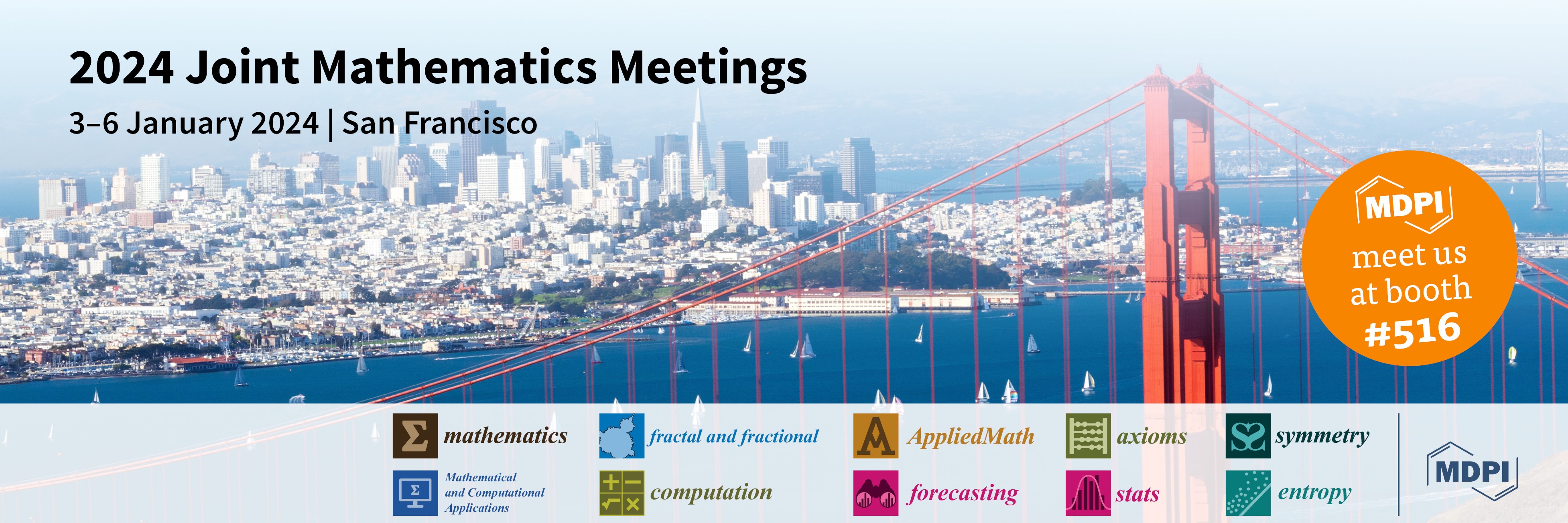
MDPI will attend the 2024 Joint Mathematics Meetings (JMM 2024) as an exhibitor. This meeting will be held in San Francisco, USA, from 3 to 6 January 2024.
The Joint Mathematics Meeting has been held annually in early January since 1989. The meeting is the largest gathering of mathematicians in the United States and the largest annual meeting of mathematicians in the world. It provides a comprehensive and rich scientific platform and honors the achievements of outstanding mathematicians.
The following MDPI journals will be represented:
- Mathematics;
- Fractal Fract;
- AppliedMath;
- Axioms;
- Symmetry;
- MCA;
- Computation;
- Forecasting;
- Stats;
- Entropy.
If you are attending this conference, please feel free to start a conversation with us at our booth (#516). Our delegates look forward to meeting you in person and answering any questions that you may have. For more information about the conference, please visit the following link: https://www.jointmathematicsmeetings.org/meetings/national/jmm2024/2300_intro.
30 November 2023
MDPI Insights: The CEO’s Letter #6 - MDPI Spain Summit and ResearchGate

Welcome to the MDPI Insights: The CEO's Letter.
In these monthly letters, I will showcase two key aspects of our work at MDPI: our commitment to empowering researchers and our determination to facilitating open scientific exchange.
Opening Thoughts

MDPI Spain Summit

Stefan Tochev (CEO, MDPI) gives the opening speech at the MDPI Spain Summit.
On Friday 10 November 2023 I was in Barcelona, Spain, to deliver the opening presentation and participate in a panel at MDPI’s Spain Summit, a two-day event, inspired by our salon events in China.
With 16 Editors-in-Chief (EiCs) and 20 Editorial Board Members (EBMs) in attendance, the event, organized by our conference team and Barcelona office, featured presentations on open access (OA), MDPI, and publishing market trends in Spain.
The event provided a great opportunity to engage with stakeholders from various MDPI journals, including Nutrients, Vaccines, Buildings, IJMS, and others. We were able to gather feedback and have open conversations around manuscript quality, the peer-review process, and journal development, as well as accreditation agencies.
The main objective of this Summit was to bring together Editors representing MDPI journals across various disciplines within Spanish universities and research centers, primarily from the Barcelona area. The aim was to facilitate an open and fruitful discussion regarding the development of their journals, the future of OA in Spain, and to provide meaningful interactions and networking opportunities.
Connecting with Editorial Board Members

Stefan Tochev in conversation with Summit participants: "Our EBMs are passionate about the journals they serve."
Interacting with our EBMs in person provides a valuable opportunity to show how important it is to us to connect with them, hear their perspectives on their journals and learn more about their own experience collaborating with MDPI.
From my conversations, it was clear that our EBMs are passionate about the journals they serve. I know the advice they provide may sometimes involve just small tweaks, but these can lead to important improvements. As the saying goes, small hinges swing open big doors.
As at November 2023, MDPI has over 6,300 EBMs affiliated with Spanish institutions, with more than 30 of them serving as EiCs or section EiCs. Furthermore, over 68,000 Spanish scholars have contributed as reviewers in MDPI journals.
Open Access in Spain
In 2023, Spain implemented legislation mandating immediate OA for all publicly funded research, aligning with the EU’s Plan S initiative to expedite the transition to OA. The Spanish government also approved a four-year, €23.8 million annual budget for the first national OA strategy, aiming to make publicly funded research freely accessible upon publication. This strategy aims to strengthen the quality and transparency of research in Spain, and to help promote movement towards a digital, low-carbon economy.
For further details of Spain's OA policy and the history of government mandates, click here.
Spain has already seen a notable decline in subscription-only articles, decreasing by 62% over a 10-year period, while gold OA increased by 42%. Green OA slightly decreased, suggesting a shift towards publishing in gold OA journals rather than traditional subscription-based ones. Here are some statistics from Scopus.
A big thank-you to the various MDPI teams, including our conference team and the Barcelona office, for organizing this very successful event!

MDPI colleagues from various offices gathered to host and support the first MDPI Spain Summit, in Barcelona, Spain.
I think this type of gathering has the potential to become an annual event in various locations. For example, Manchester could be an option, as we have over 30 EiCs and over 3,000 EBMs in the UK, a top market for MDPI that publishes high-quality research.
Impactful Research

769 Editorial Board Members of MDPI Journals Recognized as Highly Cited Researchers in 2023
Congratulations to our 769 Editorial Board Members from 40 countries/territories who have been awarded Highly Cited Researcher status for 2023 by Clarivate. This recognition is based on their outstanding scientific research contributions and significant influence in various fields, as evidenced by Web of Science data.
Click here to view the full list of 769 Editorial Board Members.
Clarivate's Highly Cited ResearchersTM list identifies individuals with exceptional impact in scientific and social science domains over the past decade. Their papers rank in the top 1% of citations in 21 fields analysed in ‘Essential Science Indicators,’ showcasing their substantial influence.
This year, 7,125 Highly Cited Researcher 2023 designations were issued to 6,849 individuals from 67 countries, representing just 1 in 1,000 researchers worldwide.
These researchers demonstrate exceptional influence, representing a small fraction of contributors pushing the boundaries of knowledge, contributing to global well-being, sustainability, and security.
Congratulations to these scholars for their remarkable achievement: we are honoured to have them on board with our journals!
Inside MDPI

Corporate Marketing and Communications Strategy Session

Members of MDPI’s Corporate Marketing & Communications team.
For the past few years, I have led the Corporate Marketing & Communications department in our annual strategy session.
This typically involves 2–3 days of focused sessions covering key topics including budgeting, hiring targets, campaign reviews, and planning for the upcoming year, department strategy, and structure.
We are constantly exploring ways to optimize the Corporate Marketing & Communications department to support MDPI’s primary objectives and better convey the MDPI story while serving the scholarly community.
The strategy session also serves as a team-building activity, during which the team voted on bowling!
Strategy Session
In this strategy session, we looked at how to align our teams in order to better streamline our content with our campaigns, build a dedicated marketing team to strategically support our core MDPI products, expand our communications teams and functionalities to focus on company-critical campaigns and press releases, align our new brand design system with our marketing initiatives, set up a community and engagement team to support various teams with their outreach and communication efforts, and increase our use of data in the evaluation of campaign performance.
To grow in these areas, we will be hiring for various positions, including those of Public Relations Manager, Communications Manager, Internal Communications Manager, Campaign Manager, Marketing Associate, and Editorial Engagement Manager.
I am grateful for the way our Corporate Marketing & Communications department has grown and gelled over the years, and I look forward to supporting the department teams and their ideas for the future.
Coming Together for Science

ResearchGate and MDPI Partner to Boost the Visibility of Open Access Content through Journal Home

Stefan Tochev (CEO, MDPI) and Sören Hofmayer (Co-Founder and Chief Strategy Officer, ResearchGate) meet in Berlin, Germany to take their ongoing discussion further.
When I assumed the role of CEO at MDPI, my primary focus was to initiate the building of essential partnerships and collaborations within our industry. After all, I am a firm believer in achieving our goals by helping others achieve theirs and focusing on co-opetition wherever there is an opportunity. I first touched on the notion of co-opetition in MDPI Insights: The CEO's Letter #3, particularly when discussing collaborations with Elsevier.
In light of this, Sören Hofmayer (Co-Founder and Chief Strategy Officer at ResearchGate) and I connected recently to continue a discussion that had been ongoing for months. I was quickly brought up to speed and felt there was an opportunity for MDPI journals to pilot the Journal Home service that ResearchGate had launched. This would provide a new way for MDPI to engage with authors and readers and amplify the visibility of our journals.
While I receive many offers and opportunities for discussions with vendors, I am a firm believer that timing is everything, and in this case, the time for us is now. Sören and I met in person during my recent visit to Berlin and decided to proceed with piloting ten MDPI journals with the Journal Home service.
The press release below provides further details.
Press Release: Berlin (Germany) and Basel (Switzerland), 15 November 2023
ResearchGate, the professional network for researchers, and MDPI, the largest open access publisher in the world and a pioneer in open access publishing, today announced a partnership that will see ten of MDPI’s open access journals benefit from an enhanced presence on ResearchGate through its innovative Journal Home offering.
This new partnership will expand the reach and visibility of MDPI’s participating flagship journals with ResearchGate’s highly relevant community of more than 25 million researchers globally.
Around 210,000 version-of-record articles from these 10 titles will be readily available on ResearchGate, including the full archive material and all new articles as they are published. These journals also benefit from enhanced brand visibility, with dedicated journal profiles, prominent representation on all associated article pages and all relevant touchpoints across the ResearchGate network – keeping the journals top-of-mind with their reader and author audiences. All articles covered by the new partnership will automatically be added to the authors’ publication records in ResearchGate. This not only reduces MDPI authors’ needs for direct management but also offers them valuable insights into the impact of their work, including data about readership and citations.
Closing Thoughts

November is Men’s Health Awareness Month

Stefan Tochev (CEO, MDPI) listening to music as he writes at a coffee shop in Basel, Switzerland.
November is dedicated to raising awareness of various men’s health issues. I have been fortunate to have positive male role models in my life, and I strive to share my experiences with others.
I used to take part in Movember, growing my moustache throughout November to raise awareness and funds and to help “change the face of men’s health.” With male family and friends impacted by physical and mental health issues, I have recently become more interested in men’s overall well-being.
Men often face stigma involving the perceived need always to be strong and have things figured out. Recently, I’ve had meaningful conversations with male friends and colleagues about issues we rarely discuss, and it was a positive experience.
Various factors impact men’s health and well-being, all too easily leading to risky health behaviours including a lack of health awareness, poor health education, and negative, culturally induced, behaviour patterns in our work and personal lives. I hope we can break down these barriers in our work environment.
Healthy men help build healthy families and a healthy society
Men are less likely than women to seek help with their physical and mental health struggles. This is a reminder to prioritize your overall well-being. I hope that as men, we will continue to open up to one another, becoming vulnerable in order to share what we are going through. By sharing and by supporting each other, we can learn and grow together. You are not alone, and when you fall, you can still get up and stand tall.
From one broski to another, you are loved and appreciated. I hope this mindset carries into December and beyond.
Mindfulness
Our content team recently released a handful of articles on mindfulness, a practice that I believe provides a good opportunity for stress release and self-reflection:
Chief Executive Officer
MDPI AG
23 November 2023
Mathematics 2023 Best Ph.D. Thesis Award Application—Deadline Approaching
We are pleased to share with you that the application deadline (31 January 2024) for the Mathematics 2023 Best Ph.D. Thesis Award is approaching.
This prize will be awarded to two Ph.D. students or recently qualified Ph.D. fellows who have produced a highly anticipated thesis with great academic potential. The applications will be assessed by an evaluation committee led by the Editor-in-Chief, Prof. Dr. Francisco Chiclana.
Eligibility and Requirements:
- The candidate must be a Ph.D. student or recently qualified Ph.D. fellow who has produced a highly anticipated thesis with great academic potential;
- The Ph.D. thesis must be their original work;
- The Ph.D. thesis must be defended in 2023.
Required Application Documents:
- An executive summary of the Ph.D. thesis in English of around 3000 words;
- A letter from the Ph.D. supervisor recommending the candidate for consideration for this award;
- The candidate’s CV, including a list of publications connected with the thesis;
- An electronic copy of the Ph.D. thesis;
- A scanned copy of the Ph.D. diploma (or certificate of studying at a school or research institute as a Ph.D. student going to graduate or participate in graduation thesis defenses).
Selection Criteria:
- Quality of resume and publications;
- Relevance of the candidate and research description;
- Novelty of the candidate’s Ph.D. thesis;
- Strength of the recommendation letter;
- Anticipated academic potential;
- Originality and impact of the research.
Prizes:
- Bonus (CHF 500);
- Certificate;
- Offer to publish one paper free of charge in Mathematics after peer review before the end of 2024.
The application deadline is 31 January 2024. The winner will be announced on the Mathematics website by the end of April 2024.
To find more details and apply for the award please visit the following link: https://www.mdpi.com/journal/mathematics/awards/2359.
Mathematics Editorial Office
21 November 2023
769 Editorial Board Members of MDPI Journals Achieve Highly Cited Researcher Recognition in 2023

We extend our sincere congratulations to the 769 Editorial Board Members of our journals – from 40 different countries/territories – who have been recognized as Highly Cited Researchers for the year 2023 by Clarivate. They are being recognized for their high-quality scientific research achievements and outstanding contributions to their professional fields, as indicated by Web of Science data.
Clarivate's annual list of Highly Cited ResearchersTM identifies the most highly cited scientists for the past decade who stand out for their significant and broad influence in various scientific and social science domains. Their impactful papers are among the top 1 per cent in the citation distribution of one or more of 21 fields analyzed in the "Essential Science Indicators", distinguishing them as hugely influential among their peers.
This year, 7,125 Highly Cited Researcher 2023 designations were issued to 6,849 individuals from 67 countries, representing just 1 in 1,000 researchers worldwide.
This means that these researchers have demonstrated an incredible level of significant and broad influence in their chosen field or fields over the last decade. They represent a small fraction of the researcher population whose contributions disproportionately push the boundaries of knowledge, enhancing global well-being, sustainability, and security.
Congratulations to the scholars for their noteworthy achievement – we are honored to have them on board with our journals!
|
Abate, Antonio |
Jaiswal, Amit K. |
Shen, Zexiang |
1 November 2023
MDPI Insights: The CEO’s Letter #5 - OA Week, UK, and Strategy

Welcome to the MDPI Insights: The CEO's Letter.
In these monthly letters, I will showcase two key aspects of our work at MDPI: our commitment to empowering researchers and our determination to facilitating open scientific exchange.
Opening Thoughts

Open Access Week 2023 – the Global Drive to Open Continues
As the world's largest open-access (OA) publisher, we believe that unrestricted access to research findings is the cornerstone of transparency, efficiency, and quality control across scientific disciplines. At MDPI, we provide free, immediate access to scientific papers, empowering scientists to examine, validate, replicate, and build upon existing results. This minimizes redundancy, optimizes resources, and fosters innovative approaches.
International OA Week, held from 23 to 29 October 2023, provided a unique opportunity to link the global movement toward open sharing and open science with the progress of policy changes at the local level. Our mission, during OA Week and all the year round, is to offer educational resources highlighting the benefits of open-access publishing. The MDPI Blog is a valuable resource for information on open access and open science.
Core principles of OA publishing
Accessibility, transparency, and collaboration are core principles of OA publishing. OA aims to break down barriers that have traditionally restricted research access, ensuring that knowledge is available to all, regardless of financial situation or institutional affiliations. Our commitment to diverse pathways for OA publishing worldwide includes discounts for researchers. You can learn more about how MDPI supports scientific communities here.
One of the key strengths of OA publishing is its ability to facilitate interdisciplinary research. By removing paywalls and promoting knowledge-sharing across disciplines, OA encourages collaboration and innovation. Researchers from various fields can access and build upon each others’ work, fostering a holistic approach to addressing complex global challenges.
OA holds the potential to democratize knowledge, advance science, and drive positive societal change.
Policy driving change
Governments, institutions, and funding agencies have recognized the transformative potential of OA and have implemented policies to promote it. These policies often require publicly funded research to be made openly accessible, accelerating the growth of OA repositories and journals. Check out our spotlights on OA policies in the US, EU and China.
OA publishing is continuously evolving, with community-driven models and technologies shaping its future. Initiatives such as “Plan S” and “cOAlition S” promote OA publishing from the perspective of national funders, requiring grantees to publish their research openly. A new policy announced by the US administration last year mandates that, with effect from January 2026, all US federally funded research should be freely and immediately available after publication.
Additionally, preprint servers such as MDPI's Preprints.org, which allow researchers to share their findings before formal peer review, have gained popularity, enhancing the speed at which new knowledge is disseminated. The rise of blockchain technology is also being explored to ensure transparency and authenticity in scholarly publishing.
For more than two decades, OA publishing has been revolutionizing academic publishing by promoting accessibility, transparency, and collaboration. Its support for interdisciplinary research, evolving policies, and innovative practices all contribute to its growing influence in the global research community. As OA continues to expand, it holds the potential to democratize knowledge, advance science, and drive positive societal change.
MDPI is proud to lead the transition to open access.
Read more:
Impactful Research

Spotlight on Smart Cities
Smart cities will serve as a cornerstone for future human development. Their implementation will help us tackle many of the significant challenges we are facing – climate change, ageing populations, waste management, public safety, travel, and so on. Recognising the importance of this multifaceted field, MDPI launched the inaugural issue of Smart Cities in 2018 to provide an advanced forum for research into smart technology and society. Here we take a look at how this journal has developed, and its impact in this exciting field.
As at 30 October, 2023, Smart Cities has published 421 papers and has an Impact Factor of 6.4. It also has a CiteScore of 8.5, and more than one quarter of its published papers – 124 – have been cited 10 times or more.
Highly cited papers in Smart Cities
Below are several highly cited papers recently published in Smart Cities. Citation metrics are current as at 31 October 2023.
1. “Introducing the “15-Minute City”: Sustainability, Resilience and Place Identity in Future Post-Pandemic Cities”
Authors: Carlos Moreno, Zaheer Allam, Didier Chabaud, Catherine Gall and Florent Pratlong
Smart Cities 2021, 4(1), 93-111; https://doi.org/10.3390/smartcities4010006
Citations: Crossref (338), Scopus (366), Web of Science (270), Google Scholar (710)
The paper discusses the socio-economic impacts of the COVID-19 on cities, including increasing inequalities and rising unemployment. It introduces the concept of the "15-Minute City," a form of "chrono-urbanism," as a response to the challenges posed by the pandemic.
2. “A Review on Electric Vehicles: Technologies and Challenges”
Authors: Julio A. Sanguesa, Vicente Torres-Sanz, Piedad Garrido, Francisco J. Martinez and Johann M. Marquez-Barja
Smart Cities 2021, 4(1), 372-404; https://doi.org/10.3390/smartcities4010022
Citations: Crossref (359), Scopus (363), Web of Science (268), Google Scholar (558)
This paper provides an overview of the progress in Electric Vehicles (EVs), focusing on battery technology, charging methods, and emerging research challenges. It also analyzes the global EV market and its future outlook.
3. “IoT in Smart Cities: A Survey of Technologies, Practices and Challenges”
Authors: Abbas Shah Syed, Daniel Sierra-Sosa, Anup Kumar and Adel Elmaghraby
Smart Cities 2021, 4(2), 429-475; https://doi.org/10.3390/smartcities4020024
Citations: Crossref (121), Scopus (151), Web of Science (91), Google Scholar (215)
This paper gives an overview of the Internet of Things (IoT) in the context of Smart Cities, discussing the fundamental components, technologies, architectures, networking technologies, and artificial algorithms that underpin IoT-based Smart City systems.
4. “Artificial Intelligence Techniques in Smart Grid: A Survey”
Authors: Olufemi A. Omitaomu and Haoran Niu
Smart Cities 2021, 4(2), 548-568; https://doi.org/10.3390/smartcities4020029
Citations: Crossref (76), Scopus (94), Web of Science (57), Google Scholar (120)
This survey paper reviews the utilization of artificial intelligence (AI) techniques in the context of the smart grid. It covers various applications of AI in load forecasting, power grid stability assessment, fault detection, and security issues in the smart grid and power systems.
5. “The Metaverse as a Virtual Form of Smart Cities: Opportunities and Challenges for Environmental, Economic, and Social Sustainability in Urban Futures”
Authors: Zaheer Allam, Ayyoob Sharifi, Simon Elias Bibri, David Sydney Jones and John Krogstie
Smart Cities 2022, 5(3), 771-801; https://doi.org/10.3390/smartcities5030040
Citations: Crossref (72), Scopus (75), Web of Science (43), Google Scholar (176)
This paper discusses the concept of the Metaverse, a virtual world introduced by Meta (formerly Facebook), and its potential impact on urban life. It explores how emerging technologies such as AI, Big Data, IoT, and Digital Twins could reshape urban design and services in the context of the Metaverse.
Testimonial
“It was indeed a great and pleasant experience with MDPI regarding our recent publication. The submission process was very straightforward and less time-consuming than the norm. The review process was very fast compared to many other open access journals, which is praiseworthy. The support from the Editorial Office during the revision process was highly useful as well. We look forward to publishing with MDPI in the future, and I will most definitely recommend MDPI to my colleagues and collaborators.” – Dr. Luís Rosa, University of Minho
Article in Smart Cities: Mobile Networks and Internet of Things Infrastructures to Characterize Smart Human Mobility
Inside MDPI

MDPI Manchester office, UK Visit

Allie Shi (Editorial Director, MDPI), Stefan Tochev (CEO, MDPI), Jamie Anderson (Manchester Office Manager, MDPI), Michael O’Sullivan (Senior Scientific Officer, MDPI), Hushneara Akhtar, and Becky Castellon (IOAP Team Lead, MDPI), dining out in Manchester, UK.
In October, I visited MDPI’s new office in Manchester. During the visit, I connected with our English Editing (EE) managers, Scientific Officer, members of the Editorial team, the Marketing team, and IOAP Team Lead.
Our Manchester office focuses primarily on EE services and provides local support for the UK market. Additionally, we regularly visit Editorial Board members and participate in local conferences.
I would like to thank Jamie Anderson, Manchester Office Manager, and her team, for their deep commitment to our Manchester staff and to MDPI’s impact on the UK market.
The UK by numbers
The UK is a hub for the world’s top universities, making it a key market for MDPI and the publishing world in general. It is home to two of the top-five-ranked universities globally, 11 in the top 100, and 15 in the top 200.
As a result, the UK plays a key role in MDPI’s global market. As at October 2023, it ranks as the seventh-largest contributor to the total number of papers published by MDPI. We have 3,500 Editorial Board members affiliated with UK institutions, including 34 serving as Editors-in-Chief (EiCs). Our commitment to collaboration with institutions is evident in the UK, where we have successfully established some 60 Institutional Open Access Program (IOAP) agreements with esteemed institutions, such as the University of Oxford, the University of Cambridge, Imperial College London, the University of Edinburgh, and more.
According to InCites Dataset + ESCI for the period 2018–2022, as at October 2023, nearly 65% of UK papers are now published as OA. Just over 10% of total OA publications are by UK authors. UK papers are known for their high quality, with an average of 11 citations per paper. Furthermore, 2.16% of UK papers are in the top 1% of cited papers, and 14.61% are in the top 10% of cited papers, showcasing their impact.
We are currently hiring EEs in various locations worldwide.
English Editing at MDPI
Our English Editing (EE) department consists of two main branches, Quality Control and Learning and Development, reflecting our priorities. We are continuously enhancing the quality of our English Editing services and have raised the relevant standards, which now extend to company-wide communications. English editors participate in international interviews, conduct English assessments, and provide colleagues with presentations on ways to improve their use of written and spoken English.
While expanding, the EE department has proactively refocused its efforts on the quality of our work and how the English Editing department can benefit the company more broadly. We currently have approximately 140 full-time English Editors based across five offices worldwide, supplemented by over 700 freelance English editors.
Our Manchester office serves as the hub for the EE Department, with EE Managers situated there, except for Kurtis Jackson, who serves as the Head of EE and is located in our Basel office. Manchester EEs play a critical role in establishing and developing EE teams in our other offices, overseeing management and recruitment. The EE department plays a vital role in MDPI’s operations, as it is the department that touches every published paper. If this work interests you, I encourage you to explore our available EE positions, whether you are seeking full-time or freelance opportunities.
Testimonials
“MDPI provides an excellent service compared to any other previously used services. It delivers fast and high-quality results but at an affordable price.” – Ardha Apriyanto, University of Potsdam
“In my role as a professor, I consider that MDPI Author Services offer an excellent quality in the editing of Western academic writing while maintaining the required standards of clarity, precision and rigor. Additionally, delivery times are fast compared to other available services.” – Jesus Insuasti, University of Nariño
Read more:
Coming Together for Science

STM and Frankfurt Book Fair
Attending STM
MDPI has been a proud sponsor of the STM Conference for several years. The STM Conference is a dynamic event featuring interactive sessions, expert panellists, idea-sharing, and ample networking opportunities. On 16 October, the event kicked off with arrival drinks, sponsored by MDPI, followed by a welcoming dinner, providing a great chance to connect and network with industry professionals. The following day was filled with speakers, sessions, and further opportunities to connect. STM exemplifies the collaborative spirit of the scientific community, with session topics including achieving open, visible, and impactful research at scale; maintaining research integrity in a rapidly changing world; and exploring the impact of ever-evolving technology in the scholarly community.
Meeting with Web of Science
On a personal note, one of the highlights of STM was a candid and productive conversation with Nandita Quaderi, Editor-in-Chief and SVP at Web of Science. During our discussion, we talked about MDPI, Web of Science, the IJERPH delisting, and ways of moving forward. This open conversation aimed at fostering better collaboration for the future.
“We discussed ways to improve our communication and collaboration.”
I appreciated our frank discussion and felt that Nandita wholeheartedly supports open access. She also expressed her appreciation for the monthly CEO Letter, which she sees as a way to add personality to the MDPI brand and provide insight into the great work we do at MDPI. While we highlighted the positives, we also discussed ways to improve our communication and collaboration moving forward. This meeting alone made the trip worthwhile, and I hope Nandita doesn’t mind my sharing that she found our chat to be “the most honest and constructive discussion” she’s had with someone from MDPI in recent years.
75th Frankfurt Book Fair

Jelena Milojevic (Book Editor, MDPI), Jovana Dubajic (Book Editor, MDPI), Evan Escamilla (Project Manager, MDPI), Laura Wagner (Head of Books, MDPI), and Jenny Knowles (Commissioning Editor, MDPI), at the Frankfurt Book Fair in Frankfurt am Main, Germany.
For the 75th time, the Frankfurter Buchmesse opened its doors in October to celebrate exciting stories and their authors. If you haven’t yet had the chance to visit the Frankfurt Book Fair, I highly recommend it. It’s the largest book fair in the world, attracting thousands of visitors from around the globe. This is the place to gain valuable industry insights from top-class publishing professionals, connect with publishers directly, and learn about the latest trends in publishing.
MDPI Books
Our Books team was also present at the Frankfurt Book Fair, networking and learning from various panels. Did you know that our MDPI Books department publishes OA Books?
The book publishing program includes monographs, book series, edited books and reprints of special issues and topical collections, among other book types.
If you have a book proposal you would like to discuss, please feel free to contact our Books team to understand the benefits and methods of publishing your next book with the OA model.
Closing Thoughts

MDPI Strategy Meeting
As the newly appointed CEO, this is my first year leading the MDPI Senior Management Strategy session. I saw it as an opportunity to explore what MDPI has the potential to become in the next five years. Guided by the vision of its founder and President, Dr. Shu-kun Lin, the company has accomplished remarkable feats over the past 27 years and currently holds the position as the world’s third-largest academic publisher, following Springer Nature and Elsevier.
Our primary objective is to build upon the milestones of the past decades and consolidate MDPI’s position as well-established publishing brand. The two-day meeting emphasized the importance of communicating MDPI’s values more actively via its brand and adopting a straightforward yet impactful approach to managing MDPI as a mature academic publisher.
“Our primary objective is to consolidate MDPI’s position as well-established publishing brand”
As the world’s number one open-access publisher, MDPI has long been a game-changer in the scholarly community, serving millions of authors. The challenge in being a trailblazer is the need to continuously improve and at the same time explore the next blue-ocean strategy, while also maintaining the smooth operation of the business. Our collection model, featuring guest-curated thematic topics in the form of Special Issues, has disrupted the industry. Other publishers closely study us and attempt to replicate our models. The future of this collection model is something we are actively addressing – while, of course, looking ahead to what comes next!
Chief Executive Officer
MDPI AG
19 October 2023
Open Access Week 2023 – the Global Drive to Open Continues

MDPI has been a strong proponent of the open access publishing model right from the beginning. As one of the pioneering fully open access publishers, we firmly believe that unrestricted access to research findings forms the foundation for better transparency, efficiency, and quality control across all scientific disciplines.
In December 2022, we reached a significant milestone by surpassing one million articles published. That is one million articles freely available to all, to circulate and build upon!
Offering free and immediate access to scientific papers empowers scientists to examine, validate, replicate, and expand upon existing results. This not only helps prevent redundancy and optimizes how resources are used but also paves the way for innovative new approaches.
The International Open Access Week takes place from 23 to 29 October 2023, providing a unique opportunity to connect the global movement towards open sharing and open science with the progress of policy transformations at the local level.
Our goal, during Open Access Week as well as throughout the year, is to offer resources for educating people about the benefits of open access publishing. The MDPI Blog offers a wealth of information around open access and open science.
Promoting the values of accessibility, transparency, and collaboration
Open access publishing embodies the fundamental values of democratizing knowledge and fostering global accessibility. It aims to break down barriers that have traditionally limited access to scholarly work, ensuring that knowledge is available to all, regardless of their financial or institutional affiliations.
Discounts are part of our commitment to ensuring there are diverse pathways to Open Access publishing for researchers worldwide. MDPI supports scientific communities in several different ways.
One of the key strengths of open access publishing lies in its ability to facilitate interdisciplinary research. By removing paywalls and promoting the sharing of knowledge across disciplines, OA encourages collaboration and innovation. Researchers from diverse fields can access and build upon each other's work, fostering a holistic approach to addressing complex global challenges.
Funders' policies are getting aligned with open science
Governments, institutions, and funding agencies have recognized the transformative potential of open access and have implemented policies to promote it. These policies often mandate that publicly funded research should be made openly accessible. Such initiatives have accelerated the growth of open access repositories and journals, reinforcing the commitment to open access principles. Check our spotlights on OA policies in the US, EU and China.
Open access publishing is continually evolving, with innovative and community-driven models and technologies shaping its future. Initiatives like "Plan S" and "cOAlition S" promote the adoption of OA publishing from the national funders’ perspective by requiring grantees to publish their research openly. A new policy announced by the US administration last year requires that, as of January 2026, all US federally funded research be made freely and immediately available after publication.
Additionally, preprint servers such as MDPI's Preprints.org, which allow researchers to share their findings before formal peer review, have gained popularity, enhancing the speed at which new knowledge is disseminated. The rise of blockchain technology is also being explored to ensure transparency and authenticity in scholarly publishing.
For more than twenty years, open access scholarly publishing has been revolutionizing academia by promoting the values of accessibility, transparency, and collaboration. Its support for interdisciplinary research, evolving policies, and innovative practices all contribute to its growing influence in the global research community. As open access continues to expand, it holds the potential to democratize knowledge, advance science, and drive positive societal change.
MDPI is proud to be a leader in the transition to open access.
13 October 2023
Meet Us at the 86th Annual Meeting of the Association for Information Science and Technology (ASIST), 27–31 October 2023, Novotel London West, London, UK

The 86th Annual Meeting of the Association for Information Science and Technology will return to Europe, this time in London, one of the world’s most vibrant capital cities.
This year’s theme for our Annual Meeting is “Making a Difference: Translating Information Research into Practice, Policy, and Action”. Information is one of the most powerful tools for achieving social justice. It plays a pivotal role in tackling crisis situations, creating robust democratic processes, overcoming social and economic disadvantages, and increasing our global assets of education, knowledge, and culture. Challenges to social justice often come first in the form of challenges to information: censorship, fake news, the hollowing out of information services, and the denial of access to information. Promoting the power of information to develop human happiness, equality, and well-being means tackling these problems and finding ways to release the transformational power of information research.
There are three keynote speakers for this annual meeting. Sharing the opening plenary session, Alison Phipps and Tawona Sitholé from the University of Glasgow in Scotland. Their keynote speech is entitled “Librarians as Lifelines: In Praise of Critical Information Care”.
The closing plenary keynote speaker, Stuart Hamilton, is the Head of Libraries Development for the Local Government Management Agency in Ireland. His keynote speech is entitled “If You Don’t Get It the First Time, Back Up and Try It Again (Party): How Information Research Must Be Harnessed to Improve Library Advocacy”.
MDPI will be attending the event as an exhibitor, and we welcome researchers from different backgrounds to visit and share their latest ideas with us.
We look forward to meeting you at our booth, where you can find out more information about the following MDPI initiatives and journals:
- Scilit;
- Sciprofile;
- Information;
- BDCC;
- AI;
- Data;
- Informatics;
- Mathematics;
- Analytics;
- Virtual Worlds;
- J. Imaging;
- MAKE.
Our representatives are eager to answer your questions and address any queries you may have. We look forward to attending such an important and exciting conference in London. We hope to see you there!
2 October 2023
MDPI Insights: The CEO’s Letter #4 - MDPI Presence in China

Welcome to the MDPI Insights: The CEO's Letter.
In these monthly letters, I will showcase two key aspects of our work at MDPI: our commitment to empowering researchers and our determination to facilitating open scientific exchange.
Opening Thoughts

Open Access in China
It is Saturday, 23 September, and I have just returned from an unforgettable 12-day trip to China, visiting our main offices in Beijing and Wuhan. In the wake of a packed and very enjoyable agenda of internal and external meetings, I would like to use this edition of the CEO Letter to showcase how MDPI supports the scholarly community in China.
Coincidentally, Jack McKenna, Communications Associate from MDPI’s corporate content team, has just released a blog article discussing China’s open access (OA) policy. It is a timely read, providing a concise overview of the development of the OA movement in China and reflecting on its future. I shall draw some content from Jack’s piece and use this edition of the CEO Letter to highlight the various ways in which MDPI is involved in this market. And it would be remiss of me not to include some pictures and highlights from my travels!
Open Access Policy in China
As per Jack’s post, in 2020, China became the world’s leading producer of research articles. Today, China is experiencing a “substantial growth rate in OA [Open Access] publication”. This growth is supported by the State’s commitment to research & development and its policy “requiring the promotion of open science”.
Over the past two decades, there have been gradual developments in China’s OA framework, with repositories and platforms being developed in a consistent manner. Currently, key institutions across China – including the National Science Library, the National Science and Technology Library, and the Natural Science Foundation of China – support OA. The State aims to establish consistent policies across government agencies – a framework for a more encompassing embrace of OA across institutions.
In China, the number of subscription-only articles decreased by nearly 30% over the 10-year period of 2011–2021, while gold OA increased by 22%. Between 2017 and 2020 alone, China published 800,921 academic papers in an OA format.
In 2023, as the leading publisher of academic research, China is pursuing “self-reliance”. Therefore, the State will be establishing consistent policies across government agencies, including those related to OA. Additionally, it will want to ensure that Chinese people can access the research that is supported by Chinese funding and produced by Chinese academics. For this reason, “Open Access is a matter of priority in China”.
MDPI Offices in China
While the history of MDPI begins in Basel, Switzerland, the story of MDPI’s founder is very much rooted in China. Dr. Shu-kun Lin, Founder and President of MDPI, graduated with a BSc from Wuhan University in 1982. He also studied physical chemistry at the Lanzhou Institute of Chemical Physics, Chinese Academy of Sciences (1982–1986; MSc in 1985), and at the University of Louisville, USA (1987–1989). Dr. Lin completed his doctorate in organic chemistry at the Swiss Federal Institute of Technology (ETH-Zürich) in 1992.

Stefan Tochev (CEO, MDPI) at MDPI’s Wuhan office.
In 2002, MDPI’s Basel headquarters moved to Matthäusstrasse 11, 4052 Basel, and Dr. Lin opened an editorial office in Qingdao, China, which launched the journal Marine Drugs in the following year. Below is a list of MDPI’s current offices in China and their respective dates of inauguration:
- 2008: Beijing (Tongzhou, Haidian)
- 2013: Wuhan (Hankou, Guanggu)
- 2019: Tianjin
- 2021: Dalian
- 2021: Nanjing
Our Strength is in Our People
With over 6,000 MDPI staff, across 20 offices in 11 countries, MDPI is able to offer authors responsive and efficient round-the-clock support, enabling a rapid publication process.
In my experience, stakeholders are genuinely surprised when they realize the extent of our global operations. My response is to reiterate that our people are our strength. This is why we have fast and efficient processes and top-notch responsiveness. Our global presence ensures that your manuscript is constantly attended to, rather than sitting on someone’s desk. We prioritize our authors’ needs and act quickly to move things through the various stages of publication. MDPI is built on speed, convenience, and competence, which I believe are core pillars for success in any industry. We continually strive to improve our systems and processes on the basis of these core strengths. We literally have over 6,000 staff worldwide dedicated to serving your needs. It’s not magic: it’s people; it’s real.
Impactful Research

MDPI Awards
To support the academic community, and especially young researchers, and also to enhance communication among scientists, MDPI journals offer various awards in specific fields. We serve the scientific community by funding research to facilitate the development of sustainable global solutions through our annual World Sustainability Award and Emerging Sustainability Leader Award.
In 2022, MDPI made awards totalling over US$1 million in recognition and support of researchers worldwide.
Across our journal catalogue, we have granted over 2,000 awards to recognize and support researchers from all disciplines. Since 2016, these awards have served as a source of recognition, acknowledging the impact of research by heightening the influence of talented individuals. The award types mainly include the Young Investigator Award, the Best PhD Thesis Award, the Best Paper Award, and the Outstanding Reviewer Award.
To learn more about MDPI Awards and to find out which are currently available, please click here.
MDPI Awards to Scholars from China
Since 2021, there have been 23 Best Paper Awards granted to authors affiliated with Chinese institutions, identifying their papers as having high-quality scientific impact. A total of 45 Chinese scholars have received awards such as the Young Investigator Award, the Best PhD Thesis Award, the Outstanding Reviewer Award, and the Tu Youyou Award, among others. Prizes for these awards include MDPI grants for paid publications, totalling over CHF 70,000 for scholars affiliated with Chinese institutions.
MDPI’s Tu Youyou Award

Prof. Tu Youyou (left), Dr. Shu-Kun Lin (President, MDPI).
In 2015, Professor Tu Youyou was awarded the Nobel Prize in Physiology or Medicine “for her discoveries concerning a novel therapy against Malaria.” In order to commemorate Professor Tu’s contributions to human health and to promote the passion and spirit conveyed by her experiences, MDPI in 2016 established the ‘Tu Youyou Award’, which runs biennially to recognize outstanding scholars dedicated to the research of natural products and medicinal chemistry.
The 2022 Tu Youyou Award was granted to Prof. Dr. Xiaoguang Lei of Peking University. Click here to access the interview with the winner.
2015 Nobel Prize for Medicine Awarded to Professor Youyou Tu
Professor Tu’s work was celebrated in a Special Issue from Molecules on the occasion of her 80th birthday. The Special Issue: 'Artemisinin (Qinghaosu): Commemorative Issue in Honor of Professor Youyou Tu on the Occasion of her 80th Anniversary” was created five years before she won the Nobel Prize, highlighting the visibility MDPI provides researchers and their work.
Highly Cited Articles by Chinese Scholars Published in MDPI
Click here to access the most cited MDPI papers published by scholars affiliated with Chinese institutions. This list presents the most influential research from the more than 287,000 MDPI papers published by Chinese scholars. With over 9 million total citations, I encourage you to maximize your visibility and impact by publishing with MDPI, the number one most cited open access publisher.
Read more:
- Tu Youyou Award
- World Sustainability Awards
- Available Awards
Inside MDPI
 Stefan Tochev (CEO, MDPI) with the Beijing Marketing team.
Stefan Tochev (CEO, MDPI) with the Beijing Marketing team.
Marketing Department in China
During my visit to our offices in Beijing and Wuhan, I had the opportunity to meet with, and to present to, our local marketing teams. These teams are responsible for various journal-related and corporate promotional activities, including newsletters, conferences, seminars, author training, journal awards, content creation, digital marketing, and social media.
I was pleased by the ambition and curiosity of our marketing colleagues. They showed a strong desire to collaborate and acquire knowledge and tactics to effectively market and promote MDPI-journal-related activities. I presented some of the principles and objectives that we apply in the Corporate Marketing and Communications department, and used the opportunity to strengthen our collaborative communications across offices.
 Stefan Tochev (CEO, MDPI) with the Wuhan Marketing team.
Stefan Tochev (CEO, MDPI) with the Wuhan Marketing team.
Coming Together for Science

Collaborations, Scholarships and Meetings
MDPI maintains partnerships with nearly 190 learned societies and over 800 institutions and consortia, helping to facilitate the transition to OA publishing. Our commitment to working with institutions is evident in China, where we have successfully established over 35 Institutional Open Access Programs (IOAP) with esteemed institutions such as the Tsinghua University, Huazhong University of Science and Technology, and Shanghai Jiao Tong University.
Our institutional partnerships, waiver programs, and article processing cost discounts create diverse pathways to OA publishing for researchers worldwide.
Scholarships in China
Since 2021, several MDPI journals (Sensors, Photonics, Coatings, Materials, Energies, and Journal of Fungi) have funded full scholarships for four Master’s and five Ph.D. projects in China. These scholarships align with Tianjin University, Wuhan University of Technology, Central South University, the Chinese Academy of Sciences, and the China University of Petroleum (Beijing).
Meeting with the Society of Chinese University Journals (CUJS)

Prof. Tieming Zhang (President of CUJS, centre) and MDPI colleagues at CUJS office.
I am pleased to have participated in some highly productive meetings during my visit to China, including one with the Society of Chinese University Journals (CUJS). The meeting involved Prof. Tieming Zhang (President of CUJS), Assoc. Prof. Xin Zhang (Vice President and Secretary General), and Dr. Fei Gao (Executive Member of CUJS). Alongside my colleagues Dr. Guoshi Liu, Dr. Giulia Stefenelli, and Anita Sun, I represented MDPI and held an open discussion to address any questions regarding OA and MDPI.
We discussed several methods for collaboration, including a workshop on the future of peer review, MDPI sponsoring a funding grant for early-career researchers, and transitioning journals from diamond to gold OA. I am thankful for the opportunity to have met our colleagues at CUJS in person and feel very confident about our future collaborations in support of OA publishing in China.
MDPI hosts free academic seminars, author training sessions, and academic conferences as part of its commitment to enrich and support the scholarly community. CUJS often stages academic events (e.g., conferences, editor training, and editor competitions), and I believe there are great opportunities for CUJS and MDPI to collaborate accordingly.
Meeting with National Science Library, Chinese Academy of Sciences (NSLC)

Stefan Tochev (CEO, MDPI), Dr. Giulia Stefenelli (Chair of Scientific Officers, MDPI), Anita Sun (PR Manager, MDPI) and Dr. Guoshi Liu (Managing Director, MDPI) at the National Science Library, Chinese Academy of Sciences.
We also visited the NSLC Director, Xiwen Liu, and colleagues Ying Jin, Zhesi Shen, and Sichao Tong. Following our introductions, we gave a presentation on the history and editorial process at MDPI, discussing specific details related to MDPI’s business and data. We highlighted the status of our IOAP collaborations in China and the makeup of our author base, specifically in China, and drew attention to the fact that MDPI has published research by authors from every country in the world. We then discussed the design indicators, calculation methods and implementation purposes of the ‘Early Warning Journal List’ and how we can have open communication to provide any data regarding MDPI journals. I am pleased to report that we reached a consensus on future communications, and am grateful to NSLC for hosting us in their offices.
In-person meetings with stakeholders provide an invaluable opportunity to communicate what MDPI is about and the various ways in which we serve the scholarly community. While digital marketing and online communication are essential, they are no replacement for the understanding and trust that come about through in-person interactions.
The Numbers
As at September 2023, China holds the largest position in MDPI’s global market, ranking as the largest contributor to the total number of papers published by MDPI.
At this point in time, there were more than 847,000 China mainland scholars who have published with MDPI, 51 of whom are Section-Editors-in-Chief (SEiC) of MDPI journals, with seven serving as Editors-in-Chief (EiCs) for journals such as Air, Big Data and Cognitive Computing, Blockchains, Future, Nanoenergy Advances, and Targets.
Our growth and presence in China are a true testament to the service we provide to the scholarly community, and to the relationships we foster through collaborative activities. We look forward to continuing to support the growth of the scholarly community in China, providing a valuable and trusted experience with MDPI.
Closing Thoughts
Final Reflections on our MDPI Offices in Beijing and Wuhan

Stefan Tochev (CEO, MDPI), Dr. Constanze Schelhorn (Indexing Manager, MDPI), Jiale Shang (Admin, Tongzhou, MDPI) at Beijing Capital International Airport, Beijing.
I spent approximately two weeks visiting some of our offices in China, and the first word that comes to mind when describing my experience is ‘hospitality.’ My colleagues and I were met with enthusiasm and delight at the airport by the Tongzhou Admin team (thank you, Jiale Shang, and thank you, Eric Wang, for keeping us organized on this trip!) and were taken care of with great attention. From hotels to transportation, dinners, and meetings, our stay was catered for perfectly.
Perhaps this is where MDPI’s focus on customers and service originates. At our core, we are a service company that provides a publishing platform for its authors. It’s therefore no surprise that authors consistently rate their experience with MDPI very highly.
95% of submitting authors rate their overall experience with the MDPI publication process as Excellent or Good (Springer Nature report 90%).
91% of submitting authors rate their overall experience with the MDPI peer review process as Excellent or Good.
Speed/Efficiency and Editorial Relationship are two key reasons underlying this high satisfaction score. ‘Editorial Relationship’ can be further explored, but in the past month, the most commonly noted aspects were the professionalism, kindness, availability, communicativeness, and personalized assistance provided by our editorial staff throughout the process. These attributes are at the core of our work across all our offices and continents.
Hospitality and Service
Just as our Chinese colleagues strove to keep us engaged by showing us the city sights (thank you, Thea Pan, and Jason Wu from the Wuhan Marketing team!) and sharing a variety of wonderful meals, our editorial staff are committed to serving our authors throughout their publishing journey. Our aim is to place the author at the centre of everything we do, eager to welcome our ‘guests’ and provide them with a pleasant publishing experience.
I asked my colleague Francis Wu (Senior Publisher, Wuhan office) where this hospitality originates. He responded that it is part of Chinese culture. I reflected long and deep on this answer. China is a vast country, and when visitors arrive, hosts want to ensure they feel welcomed and taken care of in order to maximize their time and visit. I can’t think of a better analogy for how I would want our authors to feel when they visit MDPI for their publishing needs. A company culture that prioritizes service, something that goes beyond products and productivity, and focuses on the overall experience. Over 6,000 people, across all MDPI offices, are ready, willing and able to go the extra mile for their colleagues and their customers. This is something I am truly proud of.
Chief Executive Officer
MDPI AG
8 September 2023
Meet Us at the 21st Annual Meeting of China Society for Industrial and Applied Mathematics, 12–15 October 2023, Kunming, China
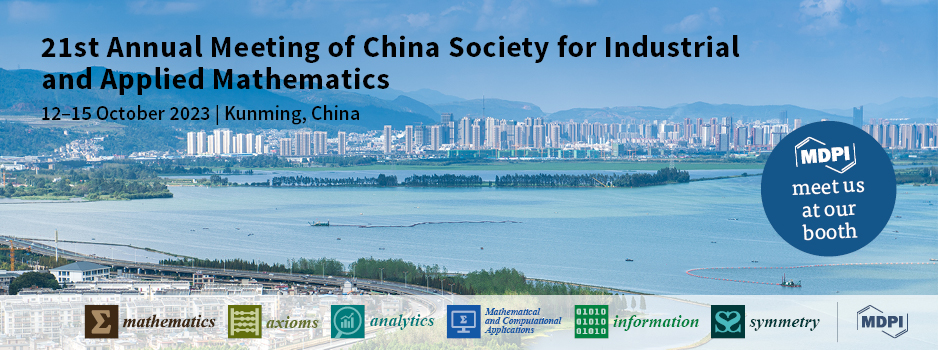
MDPI will be attending the 21st Annual Meeting of China Society for Industrial and Applied Mathematics, which will be held from 12 to 15 October 2023 in Kunming, China.
The conference aims to facilitate the exchange of the latest academic advancements in various research areas of industrial and applied mathematics, as well as the presentation of industry application results. It strives to foster extensive academic discussions and exchanges, focused on key and challenging problems that require urgent solutions in the industry. The conference program includes invited presentations, thematic seminars, and forums. Additionally, there will be a general meeting of members, a general meeting of directors, and an executive directors' meeting.
The 21st Annual Meeting of China Society for Industrial and Applied Mathematics serves as a significant gathering for its members, providing an excellent platform for communication among applied mathematics professionals, students, and enthusiasts.
The following MDPI journals will be represented:
If you are planning to attend this conference, please feel free to stop by our booth and start a conversation with us. Our delegates look forward to meeting you in person and answering any questions that you may have. For more information about the conference, please visit the following website: https://meeting.csiam.org.cn/#/2023/.
6 September 2023
Recap of Awards Granted to Scholars in 2022

MDPI is committed to supporting the academic community, nurturing talent and advancing science. Awards are an important part of the research landscape and play a vital role in helping academics gain recognition, especially young researchers as they embark on new research avenues.
In 2022, our journals presented a total number of 394 Awards, including Travel Awards, Young Investigator Awards, Best PhD Thesis Awards, Best Paper Awards, and Outstanding Reviewer Awards, with several winners announced for some of the awards. The total prize sum amounted to just under 580,000 Swiss francs (CHF), or approximately 650,000 US dollars. Overall, more than 720 scholars were awarded.
The majority of the awards were dedicated to young researchers in relatively early stages of their careers. This encompassed 66 of the afore-mentioned Travel Awards, 60 Young Investigator Awards, supporting research projects and conference attendance, as well as 51 Best PhD Thesis Awards. Additionally, 113 Best Paper Awards were given by our journals. The selection committees were entrusted with identifying the most impactful and novel research and review articles published in their journal within a given year.
MDPI will continue its support and recognition for the academic community moving forward, sponsoring new awards across disciplines. To learn more about all the awardees and their research projects in your field of study, please visit the following pages:
To explore more MDPI awards, please click here.
30 August 2023
MDPI Insights: The CEO’s Letter #3 - Sustainability and Co-opetition

Welcome to the MDPI Insights: The CEO's Letter.
In these monthly letters, I will showcase two key aspects of our work at MDPI: our commitment to empowering researchers and our determination to facilitating open scientific exchange.
Opening Thoughts

Our Commitment to Sustainability
As a pioneer in academic open access publishing since 1996, MDPI has always been dedicated to facilitating scientific exchange across all disciplines. Our approach to open science is guided by principles such as Open Access (OA), Timeliness and Efficiency, Simplicity, High-Quality Service, Flexibility, and a commitment to Sustainability. This commitment involves preserving published papers for the long term and supporting the future of science through partnerships, sponsorships, and awards.
In this edition of the CEO Letter, I will delve into MDPI’s various sustainability initiatives. As a leader in OA publishing, we are able to provide the public with a significant amount of environment-related content at no cost.
MDPI and the Sustainable Development Goals (SDGs)
In 2020, the SDG Publishers Compact was launched to accelerate implementation of the SDGs by promoting content that informs, develops, and inspires action. MDPI joined this initiative in 2021 and subsequently launched the MDPI SDG Hub in 2022, offering free access to recent research within the scope of each of the 17 SDGs. We also support authors from underrepresented communities by waiving publication charges for selected SDG-related papers. Detailed sustainability practices and supported publications are available in the report under each Goal page.
“More than 80% of MDPI articles and reviews published in 2022 relate to the Sustainable Development Goals.” [source: InCites, Accessed on 21.08.2023]
As at August 2023, MDPI boasts 14 journals dedicated to sustainability-related topics. Our first journal in this area, Sustainability, has published over 29,000 articles on the SDGs, accumulating over 240,000 citations (source: InCites, as at 1 January 2023). These journals serve as vital platforms for researchers to share insights and address environmental challenges. In addition:
MDPI journals specializing in sustainability-related topics:
- 2009: Sustainability
- 2012: Resources
- 2013: Climate
- 2014: Environments
- 2016: Recycling
- 2019: Clean Technologies
- 2020: Sustainable Chemistry
- 2021: Wind, Biomass, Conservation, Pollutants, Solar
- 2022: Waste, Microplastics
Read more:
Impactful Research

Highly Cited Articles in Sustainability
In 2022, content published in Sustainability and indexed in Journal Citation Reports (JCR) received nearly 190,000 citations. This highlights the fact that Sustainability publishes highly cited research articles related to environmental sciences and SDG-related topics such as climate action.
We are pleased to share that Sustainability received a 2022 CiteScore of 5.8, marking a 16% increase from the 2021 metric. Specifically, the CiteScore positions Sustainability as follows: Q1 (27 out of 163) in the “Environmental Science (miscellaneous)” category, and Q1 (101 out of 779) in the “Geography Planning and Development” category. For additional journal statistics, please visit here.
“Sustainability received a 2022 CiteScore of 5.8”
While MDPI journals such as Climate and Atmosphere have a distinct focus on atmosphere pollution and its impact on climate processes, journals like Sustainability, Environments, Water, Remote Sensing, and IJERPH publish content related to climate change. These journals have published over 32,300 articles related to SDG 13: Climate Action.
Highly Cited Papers in Sustainability
Below are several highly cited papers published in Sustainability over the past three years. Citation metrics are current as at 15 August 2023.
1. “A Global Assessment: Can Renewable Energy Replace Fossil Fuels by 2050?”Authors: Jerry L. Holechek, Hatim M. E. Geli, Mohammed N. Sawalhah, and Raul Valdez
Sustainability 2022, 14(8), 4792; https://doi.org/10.3390/su14084792
Citations: Crossref (97), Scopus (91), Web of Science (82), Google Scholar (125)
This paper addresses one of the most significant challenges of climate change – achieving Net Zero Carbon by 2050. The meta-analysis suggests that while difficult, this transition is possible through the concerted application of pathways, lifestyle changes, and global cooperation.
2. “Anxiety and the Ecological Crisis: An Analysis of Eco-Anxiety and Climate Anxiety”Author: Panu Pihkala
Sustainability 2020, 12(19), 7836; https://doi.org/10.3390/su12197836
Citations: Crossref (144), Scopus (121), Web of Science (159), Google Scholar (382)
This paper has received substantial media attention, including coverage by The Guardian, BBC, Vice, and CNBC. An interview with Dr. Panu Pihkala, a leading interdisciplinary researcher on the topic, can be found on MDPI’s podcast: Insight Faster, Episode 1.
3. “Impact of Climate Change on Agriculture and Its Mitigation Strategies: A Review”Authors: Gurdeep Singh Malhi, Manpreet Kaur, and Prashant Kaushik
Sustainability 2021, 13(3), 1318; https://doi.org/10.3390/su13031318
Citations: Crossref (207), Scopus (221), Web of Science (186), Google Scholar (355)
This paper reviews literature on climate change, addressing its causes, future projections, impact on agriculture, including plant physiology, growth, productivity, pest infestation, and the economic implications of mitigation strategies.
4. “Impacts of Plastic Pollution on Ecosystem Services, Sustainable Development Goals, and Need to Focus on Circular Economy and Policy Interventions”Authors: Rakesh Kumar, Anurag Verma, Arkajyoti Shome, Rama Sinha, Srishti Sinha, Prakash Kumar Jha, Ritesh Kumar, Pawan Kumar, Shubham, Shreyas Das, Prabhakar Sharma, and P. V. Vara Prasad
Sustainability 2021, 13(17), 9963; https://doi.org/10.3390/su13179963
Citations: Crossref (134), Scopus (136), Web of Science (113), Google Scholar (184)
This review aims to assess the adverse effects of plastic pollution on ecosystems, link the management of plastic with the SDGs, and propose policy measures using transdisciplinary approaches. Empowering communities to reduce plastic use is crucial. Addressing global plastic pollution is a priority.
Sustainability is an international, cross-disciplinary, open access journal that explores environmental, cultural, economic, and social sustainability of human beings. It provides a forward-looking platform for research on sustainability and sustainable development, and is published semi-monthly online by MDPI. Sustainability is affiliated with The Canadian Urban Transit Research & Innovation Consortium (CUTRIC) and The International Council for Research and Innovation in Building and Construction (CIB).
Read more:
- Testimonials: See what our editors and authors say about Sustainability.
Inside MDPI

President of Ireland Authors Editorial in MDPI Journal Sustainability
It’s a very special occasion when the president of a country takes the initiative to write an editorial for a journal. Michael D. Higgins, President of the Republic of Ireland, has contributed his insights to a forthcoming Special Issue in Sustainability:

This Special Issue, focusing on “making sustainable development happen” at grassroots levels, allows for perspectives from, and on, the major world faiths, exploring how challenges have been conceptualised and addressed, in addition to case studies of faith-based sustainability initiatives in practice.
The experience of faith institutions and communities in translating theological and moral commitments to sustainable development into action is now a topic we must examine with urgency; one on which I am so glad this Special Issue focuses.
As President of Ireland, I very much support this Special Issue of Sustainability. It is my great hope that the contents of the papers contained herein will assist in making sustainable development happen at grassroots levels across the world so that we can cooperate together, people of faith and of none, to ensure a just, inclusive and sustainable future for all on our fragile planet.
Read the completed editorial here:
Special Issue “Faith and Sustainable Development: Exploring Practice, Progress and Challenges among Faith Communities and Institutions”: Foreword by the President of Ireland
Author: Michael D. Higgins
Sustainability 2023, 15(12), 9683; https://doi.org/10.3390/su15129683
Coming Together for Science

The World Sustainability Forum 2023
The World Sustainability Forum (WSF) is a biennial MDPI event focused on sustainability. WSF 2023 marks the tenth anniversary of the conference series, taking place on 14 September. For the first time, the event will be hosted as a 24-hour conference across three locations – Singapore, Basel in Switzerland, and Toronto in Canada – alongside virtual streaming.
This unique format allows us to span three time zones, providing live coverage of critical sustainability-related topics throughout the day:
- The Singapore Hub, chaired by Professor Horn Mun Cheah and Associate Professor Renee Tan, will explore “Sustainability for Social and Community Impact”.
- The Basel Hub, chaired by Prof. Dr. Anet Režek Jambrak and Dr. Lela Mélon, will delve into “Sustainability in the industry, and at university and corporate settings”.
- The Toronto Hub, led by Dr. Umberto Berardi, will discuss “The Sustainable Built Environment”.
MDPI Sustainability Foundation: Recognizing Excellence in Sustainability Research
The MDPI Sustainability Foundation supports researchers through two sustainability-focused awards:
- The World Sustainability Award, amounting to USD 100,000, is given to senior researchers.
- The Emerging Sustainability Leader Award, valued at USD 20,000, sponsored by the journal Sustainability, is presented to early-career researchers.
The winners of the Sustainability Foundation will be formally awarded during the WSF2023 on 14 September. Interviews with the award winners and finalists are available below.
2023 World Sustainability Award Winners
Interviews with 2023 Emerging Sustainability Leader Award Finalists
- Dr. Bahareh Kamranzad
- Dr. Youjin Kim
- Dr. Julia Lohmann
As a hybrid event, WSF23 provides scholars with the option to attend in person at one of the conference sites or, for a more sustainable approach, virtually. All sessions will be recorded and archived for future access. Registration is open until 3 September 2023, with in-person and virtual tickets available here.
Read more:
Closing Thoughts
“Co-opetition”: Collaboration Plus Healthy Competition – A Visit to Elsevier
I firmly believe in fostering collaboration and at the same time promoting healthy competition within the academic publishing industry. The market offers ample room for publishers and related companies to provide valuable services and products that enrich the academic community. While MDPI is recognized for its efficient and streamlined processes –thanks to our over 6,000 colleagues, in-house tools, and initiatives that support the author journey – our ethos has always involved learning from and collaborating with other organizations.
MDPI’s Interaction with Elsevier
In January 2023, I had a brief conversation with Judy Verses, President of Global Academic and Government Markets at Elsevier, following her participation in a panel discussion at the Academic Publishers Europe event in Berlin. One of the highlights for me was Judy’s insight into the impact of research, particularly her emphasis on the role of collaboration, including policy and showing the impact of research to influence on funding decisions.
“Such collaborations drive forward-looking strategies to elevate our support for the scholarly community”

Judy and I resumed our discussion in August, when I visited Elsevier's office to review current projects, such as our recent agreement with Science Direct and the continued indexing of MDPI journals in Scopus (indexing database owned by Elsevier). We also explored possible opportunities for the future, including a potential collaboration to expand MDPI’s Scilit data infrastructure. This endeavour aims to aggregate and provide access to scholarly metadata encompassing journal articles, conference papers, books, preprints, and more. While these discussions are ongoing, the underlying principle remains that such collaborations drive forward-looking strategies to elevate our services and support for the scholarly community.
It was great that Judy and I acknowledged the merits of 'co-opetition,' a concept based of the belief that fostering cooperation alongside healthy competition can lead to shared advancements for both individual companies and the industry at large.
‘Fully OA’ Organizations Dedicated to Open Access

MDPI proudly aligns with the ‘Fully OA’ group, a collaborative initiative comprising nine organizations dedicated to Open Access. Our monthly meetings, including an OASPA representative, serve as platforms to share non-confidential information, resources, and projects. These gatherings also facilitate discussions on topics relevant to fully OA organizations. Occasionally, joint actions spring from these interactions, such as collaborative blog posts on pertinent subjects and joint statements, such as a recent response to the House Appropriations Committee.
This display of cooperation among competing entities forms a strategic alliance focused on nurturing the best interests of the OA publishing model.
As I wrap up this third edition of the CEO Letter, I encourage you to seize opportunities for collaboration and contribute to advancing our shared academic culture. As the African proverb has it, “If you want to go fast, go alone; if you want to go far, go together.”
Chief Executive Officer
MDPI AG
9 August 2023
Meet Us at the Twelfth National Conference on Operator Theory and Operator Algebra, 13–16 August 2023, Dalian, China

Conference: The Twelfth National Conference on Operator Theory and Operator Algebra
Date: 13–16 August 2023
Place: Dalian, China
MDPI will be attending the Twelfth National Conference on Operator Theory and Operator Algebra, held in Dalian, China, from 13 to 16 August 2023. The purpose of the conference is to promote academic exchange and cooperation among colleagues in the field of operator theory and operator algebra. During this conference, MDPI will welcome researchers from different backgrounds to visit and to share their latest inspirations with us.
The following MDPI journals will be represented:
If you are attending this conference, please feel free to start a conversation with us. Our delegates look forward to meeting you in person and answering any questions that you may have. For more information about the conference, please visit http://www.otaoa2023.cn/.
2 August 2023
Mathematics | Scope Update
We are pleased to announce the refined scope of the journal Mathematics (ISSN: 2227-7390), aiming to ensure improved clarity and accessibility for our readers.
Mathematics is an international, open access journal which provides an advanced forum for studies related to mathematical sciences. It is devoted exclusively to the publication of research in all areas of pure and applied mathematics.
We welcome high-quality contributions within the scope of our journal and its various fields of scientific activity.
|
Scope (new version):
|
Scope (old version):
|
31 July 2023
MDPI’s 2022 Best PhD Thesis Awards in Computer Science and Mathematics—Winners Announced
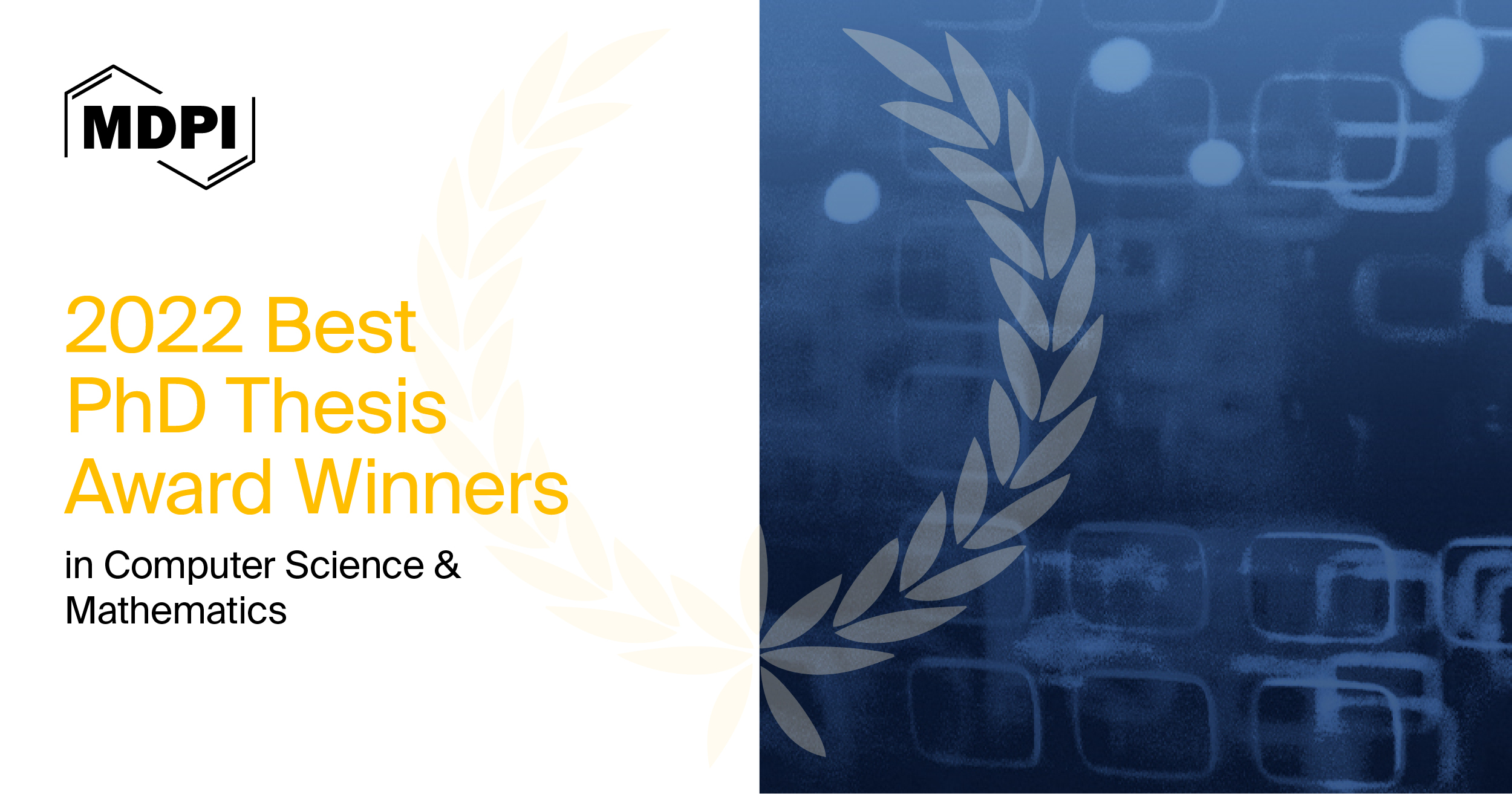
MDPI’s Best PhD Thesis Awards are presented to recognize the young scholars who are judged to have completed the most outstanding PhD thesis in their field of research and to encourage them to continue their outstanding work and further contribution to their field.
We would like to warmly congratulate the winners of the 2022 Best PhD Thesis Awards and wish them success with their future research endeavors.
- “Application of Public Health Informatics to Monitor and Prevent Healthcare Associated Infections and Related Outcomes in Intensive Care Units”
by Giuliana Favara, University of Catania, Italy
- “Dynamical Behaviours of Size Dependant and Functionally Graded Beams via Numerical Solutions”
by Subrat Kumar Jena, National Institute of Technology Rourkela, India
MTI:
- “Understanding the Design of Playful Gustosonic Experiences”
by Yan Wang, Monash University, Australia
- “Integrability of Dynamical Systems: A Geometrical Viewpoint”
by Antonios Mitsopoulos, National and Kapodistrian University of Athens, Greece
About MDPI Awards:
In order to reward the academic community, especially young researchers and enhance communication among scientists, MDPI journals regularly offer various awards to researchers in specific fields. These awards, serving as a source of inspiration and recognition, help raise the influence of talented individuals who have been credited with outstanding achievements and are making a significant contribution to the advancement of their fields.
To explore more MDPI awards, please click here.
31 July 2023
MDPI’s 2022 Young Investigator Awards in Computer Science and Mathematics—Winners Announced
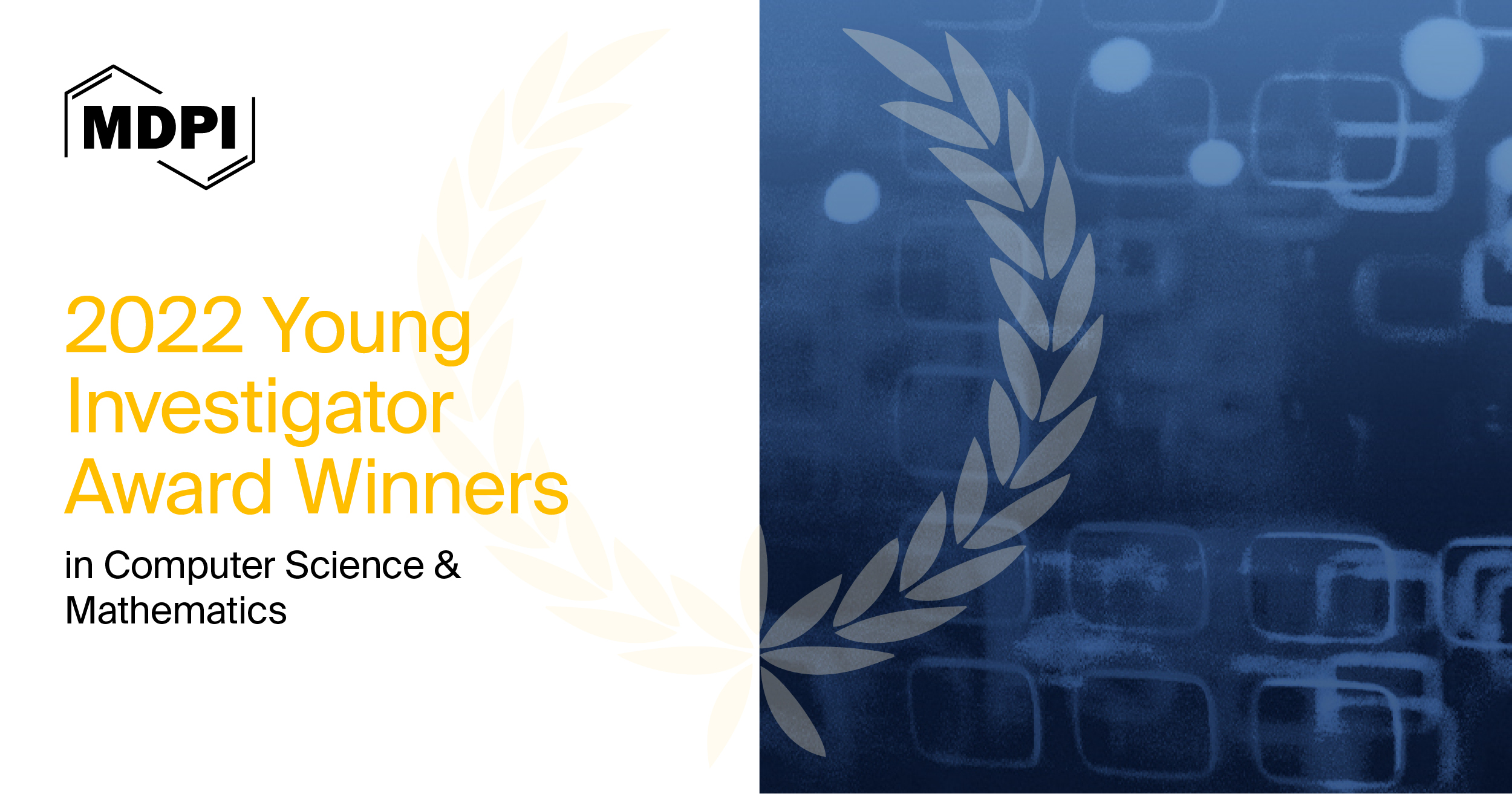
MDPI’s Young Investigator Awards recognize promising junior researchers, acknowledge their contributions, and enhance communication among scientists. We are proud to present the winners for the year 2022 in computer science and mathematics. The winners were selected by the journals’ Award Evaluation Committee.
We warmly congratulate the awarded young investigators for their outstanding contributions.
- S. Ivan Trapasso, University of Genoa, Italy
- Yao Chen, Southeast University, China
About MDPI Awards:
In order to reward the academic community, especially young researchers and enhance communication among scientists, MDPI journals regularly offer various awards to researchers in specific fields. These awards, serving as a source of inspiration and recognition, help raise the influence of talented individuals who have been credited with outstanding achievements and are making a significant contribution to the advancement of their fields.
To explore more MDPI awards, please click here.
31 July 2023
MDPI’s 2022 Outstanding Reviewer Awards in Computer Science and Mathematics—Winners Announced
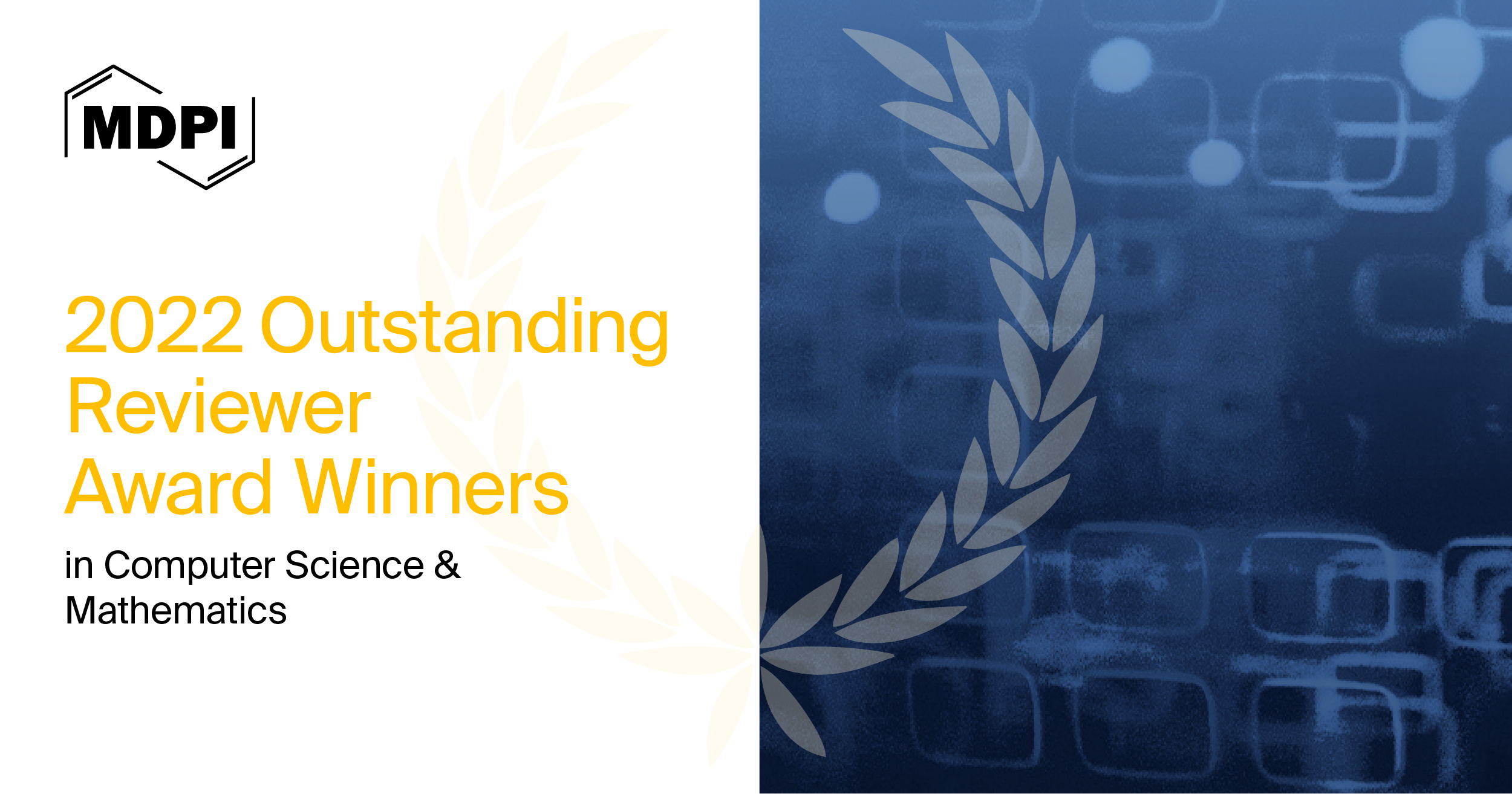
In order to acknowledge our reviewers, who so generously dedicate their time to reviewing papers and demonstrate diligence, professionalism, and timeliness when reviewing manuscripts, MDPI journals regularly offer outstanding reviewer awards to scholars who participate in the peer-review process.
We are proud to recognize the winners for the year 2022 in computer science and mathematics for their outstanding contributions among the extensive competition by presenting them with an Outstanding Reviewer Award.
We would like to take this opportunity to congratulate all the winners on their achievements.
- Stefano Ferilli, University of Bari Aldo Moro, Italy
- Tomasz Hachaj, Pedagogical University of Krakow, Poland
- Roberto Saia, University of Cagliari, Italy
- Nirmalya Thakur, Emory University, USA
- Yustus Eko Oktian, Pusan National University, Republic of Korea
- Douglas O’Shaughnessy, Institut National de la Recherche Scientifique, Canada
- Robertas Damaševičius, Silesian University of Technology, Poland
- Leonardo Rundo, University of Salerno, Italy
- Manuel De La Sen, University of the Basque Country, Spain
- Takeshi Emura, Kurume University, Japan
- Vladica Stojanović, University of Pristina, Serbia
- Weizhong Tian, Shenzhen Technology University, China
- Ferdinando Di Martino, University of Naples Federico II, Italy
- Dumitrescu Catalin, University Politehnica of Bucharest (UPB), Romania
- Gheorghe Sebestyen, Technical University of Cluj-Napoca, Romania
- Lorentz Jäntschi, Babeş-Bolyai University, Romania
- Maria Alessandra Ragusa, Università di Catania, Italy
About MDPI Awards:
In order to reward the academic community, especially young researchers and enhance communication among scientists, MDPI journals regularly offer various awards to researchers in specific fields. These awards, serving as a source of inspiration and recognition, help raise the influence of talented individuals who have been credited with outstanding achievements and are making a significant contribution to the advancement of their fields.
To explore more MDPI awards, please click here.
31 July 2023
MDPI’s 2022 Best Paper Awards in Computer Science and Mathematics—Winners Announced
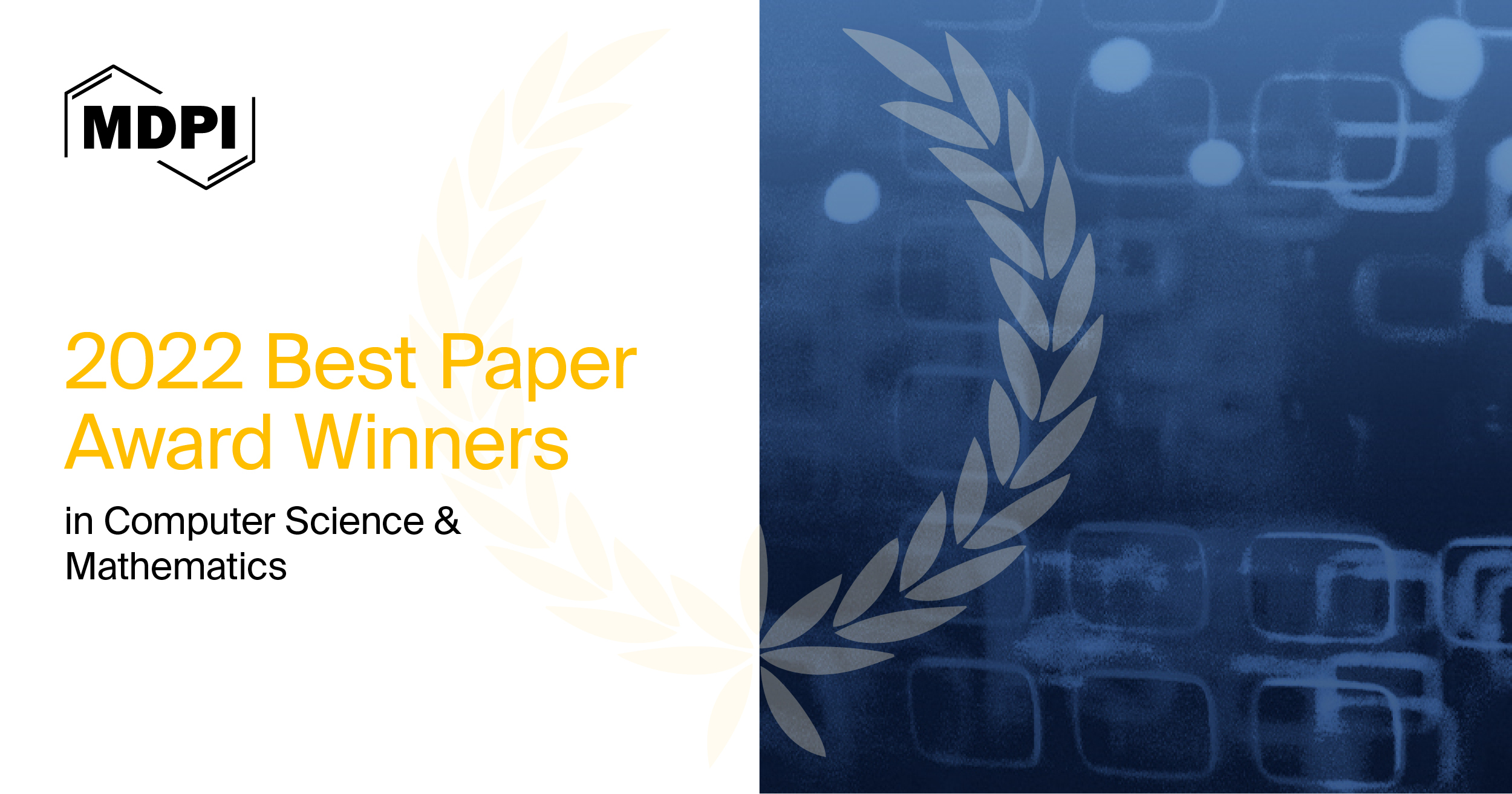
The purpose of our Best Paper Awards is to promote and recognize the most impactful contributions published within MDPI journals.
The editors of each journal carefully selected reviews and research papers through a rigorous judging process based on criteria such as the scientific merit, overall impact, and the quality of presentation of the papers published in the journal.
We are honored to present the winners announced for the year 2022 in computer science and mathematics, who were selected amongst extensive competition, and congratulate the authors for their outstanding scientific publications. MDPI will continue to provide support and recognition to the academic community.
- “An Improved Greedy Heuristic for the Minimum Positive Influence Dominating Set Problem in Social Networks”
by Salim Bouamama and Christian Blum
Algorithms 2021, 14(3), 79; https://doi.org/10.3390/a14030079
- “A New gH-Difference for Multi-Dimensional Convex Sets and Convex Fuzzy Sets”
by Luciano Stefanini and Barnabas Bede
Axioms 2019, 8(2), 48; https://doi.org/10.3390/axioms8020048
- “Initial Value Problem for Nonlinear Fractional Differential Equations with ψ-Caputo Derivative Via Monotone Iterative Technique”
by Choukri Derbazi, Zidane Baitiche, Mouffak Benchohra and Alberto Cabada
Axioms 2020, 9(2), 57; https://doi.org/10.3390/axioms9020057
- “Machine-Learning Methods for Computational Science and Engineering”
by Michael Frank, Dimitris Drikakis and Vassilis Charissis
Computation 2020, 8(1), 15; https://doi.org/10.3390/computation8010015
- “Evaluation of a Near-Wall-Modeled Large Eddy Lattice Boltzmann Method for the Analysis of Complex Flows Relevant to IC Engines”
by Marc Haussmann, Florian Ries, Jonathan B. Jeppener-Haltenhoff, Yongxiang Li, Marius Schmidt, Cooper Welch, Lars Illmann, Benjamin Böhm, Hermann Nirschl, Mathias J. Krause and Amsini Sadiki
Computation 2020, 8(2), 43; https://doi.org/10.3390/computation8020043
- “Recommendations for Integrating a P300-Based Brain–Computer Interface in Virtual Reality Environments for Gaming: An Update”
by Grégoire Cattan, Anton Andreev and Etienne Visinoni
Computers 2020, 9(4), 92; https://doi.org/10.3390/computers9010008
- “Improving Internet of Things (IoT) Security with Software-Defined Networking (SDN)”
by Abdullah Al Hayajneh, Md Zakirul Alam Bhuiyan and Ian McAndrew
Computers 2020, 9(1), 8; https://doi.org/10.3390/computers9010008
Data:
- “Trend Analysis on Adoption of Virtual and Augmented Reality in the Architecture, Engineering, and Construction Industry”
by Noghabaei Mojtaba, Arsalan Heydarian, Vahid Balali and Kevin Han
Data 2020, 5(1), 26; https://doi.org/10.3390/data5010026
- “An Updated Survey of Efficient Hardware Architectures for Accelerating Deep Convolutional Neural Networks”
by Maurizio Capra, Beatrice Bussolino, Alberto Marchisio, Muhammad Shafique, Guido Masera and Maurizio Martina
Future Internet 2020, 12(7), 113, https://doi.org/10.3390/fi12070113
- “Fastai: A Layered API for Deep Learning”
by Jeremy Howard and Sylvain Gugger
Information 2020, 11(2), 108; https://doi.org/10.3390/info11020108
- “From HMI to HMIs: Towards an HMI Framework for Automated Driving”
by Klaus Bengler, Michael Rettenmaier, Nicole Fritz and Alexander Feierle
Information 2020, 11(2), 61; https://doi.org/10.3390/info11020061
- “Explainable Deep Learning Models in Medical Image Analysis”
by Amitojdeep Singh, Sourya Sengupta and Vasudevan Lakshminarayanan
J. Imaging 2020, 6(6), 52; https://doi.org/10.3390/jimaging6060052
- “A Regularity Criterion in Weak Spaces to Boussinesq Equations”
by Ravi P. Agarwal, Sadek Gala and Maria Alessandra Ragusa
Mathematics 2020, 8(6), 920; https://doi.org/10.3390/math8060920
- “Regarding New Wave Patterns of the Newly Extended Nonlinear (2+1)-Dimensional Boussinesq Equation with Fourth Order”
by Juan Luis García Guirao, Haci Mehmet Baskonus and Ajay Kumar
Mathematics 2020, 8(3), 341; https://doi.org/10.3390/math8030341
- “Elephant Herding Optimization: Variants, Hybrids, and Applications”
by Juan Li, Hong Lei, Amir H. Alavi and Gai-Ge Wang
Mathematics 2020, 8(9), 1415; https://doi.org/10.3390/math8091415
- “CLSTM: Deep Feature-Based Speech Emotion Recognition Using the Hierarchical ConvLSTM Network”
by Mustaqeem and Soonil Kwon
Mathematics 2020, 8(12), 2133; https://doi.org/10.3390/math8122133
- “Soft Open Bases and a Novel Construction of Soft Topologies from Bases for Topologies”
by José Carlos R. Alcantud
Mathematics 2020, 8(5), 672; https://doi.org/10.3390/math8050672
- “An Integrated Approach of Best-Worst Method (BWM) and Triangular Fuzzy Sets for Evaluating Driver Behavior Factors Related to Road Safety”
by Sarbast Moslem, Muhammet Gul, Danish Farooq, Erkan Celik, Omid Ghorbanzadeh and Thomas Blaschke
Mathematics 2020, 8(3), 414; https://doi.org/10.3390/math8030414
- “Recognition of Blinks Activity Patterns during Stress Conditions Using CNN and Markovian Analysis”
by Alexandra I. Korda, Giorgos Giannakakis, Errikos Ventouras, Pantelis A. Asvestas, Nikolaos Smyrnis, Kostas Marias and George K. Matsopoulos
Signals 2021, 2(1), 55-71; https://doi.org/10.3390/signals2010006
- “An Educational Guide through the FMP Notebooks for Teaching and Learning Fundamentals of Music Processing”
by Meinard Müller
Signals 2021, 2(2), 245-285; https://doi.org/10.3390/signals2020018
- “On the Remarkable Superconductivity of FeSe and Its Close Cousins”
by Andreas Kreisel, Peter J. Hirschfeld and Brian M. Andersen
Symmetry 2020, 12(9), 1402; https://doi.org/10.3390/sym12091402
- “Bilaterally Symmetrical: To Be or Not to Be?”
by Michael C. Corballis
Symmetry 2020, 12(3), 326; https://doi.org/10.3390/sym12030326
- “Are MCDA Methods Benchmarkable? A Comparative Study of TOPSIS, VIKOR, COPRAS, and PROMETHEE II Methods”
by Wojciech Sałabun, Jarosław Wątróbski and Andrii Shekhovtsov
Symmetry 2020, 12(9), 1549; https://doi.org/10.3390/sym12091549
- “Empirical Consequences of Emergent Mass”
by Craig D. Roberts
Symmetry 2020, 12(9), 1468; https://doi.org/10.3390/sym12091468
About MDPI Awards:
In order to reward the academic community, especially young researchers and enhance communication among scientists, MDPI journals regularly offer various awards to researchers in specific fields. These awards, serving as a source of inspiration and recognition, help raise the influence of talented individuals who have been credited with outstanding achievements and are making a significant contribution to the advancement of their fields.
To explore more MDPI awards, please click here.
27 July 2023
MDPI Insights: The CEO’s Letter #2 - Open Peer-Review and IJERPH

Welcome to the MDPI Insights: The CEO's Letter.
In these monthly letters, I will showcase two key aspects of our work at MDPI: our commitment to empowering researchers and our determination to facilitating open scientific exchange.
Opening Thoughts

Open Peer Review Reports
Continuing the topic of openness from my inaugural monthly CEO letter, in these Opening Thoughts, I highlight the growth and importance of open peer-review reports at MDPI. Open peer reports align with the principles of open science, making the publishing process more transparent and facilitating rigorous peer review.
MDPI journals operate an open peer-review option by default, allowing authors to publish review reports and author responses (often referred to as open reports) together with the published paper. Publishing the reviewer reports and author responses together with the article provides greater transparency and trust for readers, as this allows them to track the editorial decision-making process. Open peer-review also encourages reviewers and editors to provide high-quality comments, as these will be made public if the article is accepted for publication.
Start and Growth of Open Peer Review at MDPI
The MDPI journal Life was a pioneer in offering this opportunity to its authors in 2014. The first MDPI article with peer-review reports openly published was a review by the Nobel Laureate Werner Arber, in which the review reports were published as supplementary material. By 2018, open peer-review was available across all MDPI journals. As such, MDPI authors have embraced the open peer-review model, providing a steady increase in the number of MDPI articles. As of 2023, approximately one-third (34.0%) of MDPI articles were published with open review reports.
As at July 2023, the percentage of MDPI articles published with open peer review has increased to 36.2% of the total papers published in 2023 so far, indicating ongoing growth in adoption.
Open peer review continues to play a critical role in the assessment of the peer-review process in Life. For further insights, please see the recent editorial by Dr. Pabulo Henrique Rampelotto, the former Editor-in-Chief of Life, who spearheaded the implementation of the open peer-review process.
Benefits of Open Peer Review
The benefits of open peer review include increased transparency, trust and constructive feedback. To promote open communication further and increase the robustness of the peer-review process, we encourage reviewers to sign their reports so that their name appears on the review report (this process is referred to as open identity). The default option is for reviewers to remain anonymous; however, by signing the reports, reviewers receive direct credit for their contribution to the peer-review process and show their commitment towards open science.
As the leading open access publisher, MDPI remains committed to promoting open peer-review and encourages authors to choose this approach. Our goal is to provide a rigorous and transparent peer-review process that benefits the scientific community, and we believe that open peer-review is a vital step in fostering openness and collaboration in scientific communication.
Impactful Research

MDPI Papers Cited in the News – IJERPH edition
Every month, our corporate marketing team compiles data from Altmetrics to create a list of MDPI papers that have been cited in the news. This list continues to grow as renowned news outlets regularly reference research published by MDPI in their articles.
During 2022, a total of 111,965 MDPI research papers were mentioned in prominent news outlets such as National Geographic, The Washington Post, Forbes, The Guardian, the BBC, CNN, Time, and Harvard Business Review.
Highly Cited Journal Publications
IJERPH, known for publishing impactful research, received the most news mentions among all MDPI journals in 2022, based on Altmetrics data:
- International Journal of Environmental Research and Public Health: 3509 mentions
- Nutrients: 2698 mentions
- International Journal of Molecular Sciences: 1701 mentions
- Journal of Clinical Medicine: 1131 mentions
- Viruses: 1111 mentions
These numbers show the recognition and impact of the articles published in IJERPH. For a more detailed view of the journal’s most cited and viewed papers, you can visit here. In total, IJERPH has garnered over 28,000 mentions in prominent news outlets, and as at July 2023, an impressive count of over 17,000 papers cited 10 times or more. These figures highlight the impactful contribution of IJERPH publications to the scientific community.
Example of Recent Mentions
During May and June 2023, a noteworthy selection of articles from IJERPH was cited in news articles, including:
The Washington Post: “Bringing nature inside can improve your health. Here’s how to do it.”
IJERPH paper: “Physiological Benefits of Viewing Nature: A Systematic Review of Indoor Experiments”
Harvard Business Review: “How to Take Better Breaks at Work, According to Research”
IJERPH paper: “Canine-Assisted Therapy Improves Well-Being in Nurses”
National Geographic: “Lyme disease is spreading fast—but a vaccine may be on the way”
IJERPH paper: “Range Expansion of Tick Disease Vectors in North America: Implications for Spread of Tick-Borne Disease”
Inside MDPI

MDPI Develops an Artificial Intelligence Tool to Enhance the Peer-Review Process
At MDPI, we believe that rigorous peer-review is the corner-stone of high-quality academic publishing. We are grateful to the scholars who generously dedicate their time to peer-review articles submitted to MDPI journals. Their contributions are invaluable to the advancement of science.
Peer-review is a critical part of the publication process, ensuring that MDPI upholds the highest quality standards for the papers we publish. Every manuscript submitted to our journals undergoes a comprehensive peer-review process conducted by subject-matter experts.
To further enhance our peer-review process, our Data Analytics team has developed an Artificial Intelligence (AI) tool designed to support the selection of reviewers. This proprietary tool utilizes Natural Language Processing (NLP), a specially designed AI language model, to extract information from the title and abstract of submitted papers. It then searches our database for similar manuscripts and suggests potential reviewers based on this analysis. Integrated with MDPI's submission system (SuSy), the AI tool cross-references the suggested candidates with our reviewer database to verify their invitation status and availability.
The goal of this tool is to provide better targeted peer-review invitations, reducing the number of emails sent for each paper and increasing the efficiency of our editorial staff.
In the near future, our Data Analytics team plans to deploy similar AI projects to improve other critical aspects of our services, offering an enhanced experience to our authors and readers.
Click here to learn about MDPI’s review process, including procedures, responsibilities, and benefits.
Read more:
Coming Together for Science
The Future of IJERPH

On 5 July 2023, Prof. Dr. Paul B. Tchounwou, the founding Editor-in-Chief of IJERPH, along with five Section Editors in Chief (Prof. Dr. Germán Vicente-Rodríguez, Prof. Dr. Karl Goodkin, Prof. Dr. William A. Toscano, Prof. Dr. Jimmy T. Efird, and Prof. Dr. William Douglas Evans), gathered in Basel to discuss the future of the journal. The meeting provided an opportunity to address the recent decision by The Web of Science to delist IJERPH due to the journal failing the Content Relevance criterion, and propose best strategies that will ensure high scientific rigor as well as a clear scope and aim of IJERPH, going forward.
While the delisting is disappointing for IJERPH, as well as for our authors, academic editors, and the entire scientific community supporting our journal, we see it as an opportunity to reflect and prepare for the future direction of the journal.
Since its launch in 2004, IJERPH’s vision and mission have evolved to be more complete and comprehensive in engaging scientific communities. In light of this, we will refresh the journal’s aims and scope, ensuring they align with the organic expansion of IJERPH. Additionally, we will restructure the journal sections into broader categories, encouraging collaborative research and transdisciplinary approaches for authors. This is designed to foster collaboration and knowledge exchange among diverse fields, contributing to a holistic understanding of health promotion and disease prevention. We are confident that these next steps will enhance the scientific strength and societal impact of our journal.

Journal Achievements
In addition to the productive discussions, we took the time to celebrate some of the remarkable achievements of IJERPH, which I highlight below:
- Founded by Prof. Dr. Paul B. Tchounwou in 2004
- Indexed in PubMed in 2008
- Received its first Impact Factor in 2012
- Published its 5000th paper in 2017
- Over 60,000 papers published as at June 30, 2023
- 131,628,173 paper views in 2018–2022
- Over 28,000 mentions in prominent news outlets
- 17,000 papers cited 10 times or more as at June 30, 2023
- No.1 journal in the 2022 Google Scholar Metrics in the category of Public Health
- Awarded several editions of Young Investigator Awards, Travel Awards, and Outstanding Reviewer Awards since 2018.
These achievements showcase the journal’s significant contributions to the field and its impact on global health. We are proud of the exceptional work accomplished by the IJERPH team and look forward to building upon this success in the years to come.
Closing Thoughts
MDPI’s Impact in Spain

During the past month, I had the opportunity to visit our new office building in Barcelona, where I met with our local colleagues to discuss the ways we serve the scholarly community, particularly in Spain. The multi-functional office plays a vital role in supporting various business needs, including editorial, design, conference management, data analytics, journal relationship management, publishing partnerships, and collaborations with societies.
Spain holds a significant position in MDPI’s global market, ranking as the fourth-largest contributor to the total number of papers published by MDPI as at July 2023, ranking next to Italy, the USA, and China, with Germany completing the top five.
The Numbers
Out of the 1,680,000 total MDPI articles published as at 25 July, almost 80,000 articles are contributed by Spanish authors, representing nearly 40,000 unique authors affiliated with Spanish institutions. Remarkably, over 6,300 of these authors hold editorial board member (EBM) positions within MDPI journals, with 30 of them serving as Editors-in-Chief (EiCs).
Our commitment to working with institutions is very evident in Spain, where we have successfully established over 40 Institutional Open Access Programs (IOAP) with esteemed institutions such as the University of Barcelona, the Autonomous University of Barcelona, Pompeu Fabra University, the University of Navarre, and Complutense University of Madrid.
Over the past five years, we have successfully organized eight in-person conferences in Barcelona, attracting over 1,150 registrations, with two forthcoming events scheduled for 2024. Barcelona's excellent connectivity to international airports makes it easily accessible to participants from around the world. Its welcoming atmosphere provides us with the perfect environment for knowledge-sharing, networking, and contributing to the local economy.
Our growth and presence in Spain are a true testament to the incredible service we provide to the scholarly community and the relationships we foster through responsive and collaborative communication. We look forward to continuing to support Spanish scholars, providing them a valuable and trusted experience with MDPI, the leader in open access publishing.
Testimonials
I close this letter as I did in the first edition, by sharing testimonials from our stakeholders. Here are a few IJERPH testimonials from a Spanish guest editor and an author:
Guest Editor
“I want to thank the kindness, attention and professionalism of the MDPI team throughout the editorial process of the Special Issue. I believe that it is a very professional and quality editorial process.”
- Professor Víctor Arufe-Giráldez, University of A Coruña
Special Issue in International Journal of Environmental Research and Public Health: Physical Activity in Childhood and Adolescence
Special Issue in International Journal of Environmental Research and Public Health: Physical Education: Present and Future
__
Author
“I want to thank the rigor of the revisions made to the manuscripts to improve their quality, the support to the authors for the editor assignment system they have and the follow-up they carry out, for the speed in answering and in carrying out the entire process of the revision, and for doing all this at an affordable price.”
- Dr. María Paz García-Caro, University of Granada
Article in International Journal of Environmental Research and Public Health: Factors Associated with Suicide Attempts and Suicides in the General Population of Andalusia (Spain)
Chief Executive Officer
MDPI AG
11 July 2023
MDPI’s Newly Launched Journals in June 2023
With the first issue released in June 2023, five new MDPI journals disseminating multi-disciplinary science are due to launch, which will cover the subjects of medicine & pharmacology, biology and physical sciences.
The newly launched journals will be overseen by professional Editorial Board Members and Editors to ensure an accurate and rapid publication, rigorous peer review and broad visibility.
Please feel free to browse and discover more about the new journals below.
| Journal | Founding Editor-in-Chief | Journal topics (selected) |
| Prof. Dr. Jun Ma, Peking University, China| Editorial | view inaugural issue | growth and development; diet and nutrients; school health promotion policies and practices; child health and care; adolescent health and wellbeing | view journal scope | submit an article |
|
| Prof. Dr. Bernd Rehm, Griffith University, Australia | Editorial | view inaugural issue | DNA and gene synthesis; synthetic transcription factors; protein engineering; viral engineering; metabolic engineering | view journal scope | submit an article | |
| Prof. Dr. Varsha Gandhi, University of Texas MD Anderson Cancer Center, USA | Editorial | view inaugural issue | lymphatics; cancers associated with lymphocytes and lymphoblasts; lymphatic tissues; lymphoma; lymphoid leukemia | view journal scope | submit an article | |
| Dr. Bradley Turner, University of Melbourne, Australia | Editorial | view inaugural issue | multiple sclerosis; amyotrophic lateral sclerosis; primary lateral sclerosis; atherosclerosis; systemic sclerosis | view journal scope | submit an article | |
 |
Prof. Dr. Clemens Burda, Case Western Reserve University, USA | Editorial | view inaugural issue | Gamma ray, X-ray, and UV–Vis spectroscopies; NIR/mid-infrared/Raman spectroscopy; microwave and THz spectroscopy; high-resolution gas-phase atomic, molecular, and cluster spectroscopy; MS, NMR, and EPR spectroscopy | view journal scope | submit an article |
We wish to thank everyone who has supported the development of open access publishing. You are welcome to submit an application to the New Journal Committee (newjournal-committee@mdpi.com) if you would like to create more new journals.
5 July 2023
Meet Us at the Chinese Physical Society Fall Meeting 2023, 17–20 August 2023, Yinchuan, China
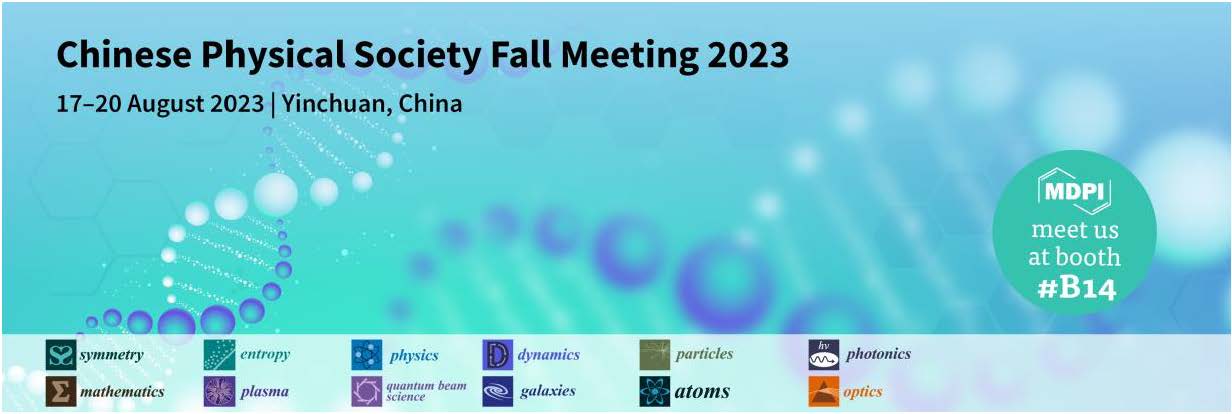
MDPI journals will be attending the Chinese Physical Society Fall Meeting 2023 as exhibitors. This meeting will be held in Yinchuan, China, from 17 to 20 August 2023.
The conference will offer 20 sub-topics, namely: 1. particle physics, field theory and cosmology; 2. nuclear physics and accelerator physics; 3. atomic and molecular physics; 4. light physics; 5. plasma physics; 6. nano and mesoscopic physics; 7. surface and low-dimensional physics; 8. semiconductor physics; 9. strong correlation and superconductivity physics; 10. magnetism; 11. soft condensed matter physics and biophysics; 12. quantum information; 13. computational physics; 14. statistical physics and complex systems; 15. dielectric physics; 16. liquid crystal; 17. ultrafast physics; 18. high energy density physics; 19 topological materials, physics and devices; 20. physics education.
The following MDPI journals will be represented:
- Symmetry;
- Entropy;
- Physics;
- Dynamics;
- Particles;
- Photonics;
- Mathematics;
- Plasma;
- QuBS;
- Galaxies;
- Atoms;
- Optics.
If you are attending this conference, please feel free to start a conversation with us. Our delegates look forward to meeting you in person and answering any questions you may have. For more information about the conference and our booth, please visit the following link: http://meeting.cps-net.org.cn/nxu2023.
3 July 2023
MDPI Insights: The CEO’s Letter #1 - Open Access and Impactful Research

Welcome to the MDPI Insights: The CEO's Letter.
In these monthly letters, I will showcase two key aspects of our work at MDPI: our commitment to empowering researchers and our determination to facilitating open scientific exchange.
Opening Thoughts
The Future is Open, and MDPI is Leading the Way
I strongly believe in a future that embraces openness, where open source, open information, and open access (OA) take center stage. This belief that led me to join MDPI in 2020, and I am honored to have recently been appointed as Chief Executive Officer (CEO). In this capacity, and operating in close liaison with Dr. Lin and MDPI’s senior management, I shall work to build on Dr. Lin’s achievements of the past quarter-century. In this role, I will focus on communication initiatives to promote MDPI's remarkable work and continue to build our company as a trusted leader in OA publishing. For over two decades, MDPI has been at the forefront of reshaping the academic publishing landscape, with OA surpassing subscription-based publishing in 2020. This trajectory is deeply rooted in our history and reflects our unwavering commitment and vision for an open future.
1 Million Published Articles
2023 began with a remarkable achievement for MDPI, as we became the first OA publisher to reach the milestone of 1 million published articles. This represents 2.7 million unique authors who have trusted us with their work, or about a third of all researchers worldwide. As the world's most cited OA publisher, we are proud in sharing these significant milestones.
Our mission remains unchanged: to make science open and accessible to all. We understand the importance of knowledge access, empowering researchers to stay at the forefront of a rapidly changing world. Our diverse range of journals covers a wide spectrum of disciplines, offering cutting-edge insights, trusted tools, and crucial knowledge to address global challenges.
Liberating Science
As the world’s leading OA publisher, MDPI is actively liberating science. We are committed to eliminating the frustrations researchers and the general public face when accessing information, ensuring it is not locked behind paywalls. We firmly believe that everyone has a right to information, and our commitment to open access publishing drives our work.
In this inaugural edition of Insights: The CEO's Letter, I draw inspiration from the upcoming 20th anniversary of the Berlin Declaration on Open Access. Its stated mission reminds us that true impact is achieved when knowledge is widely and readily available to society:
"Our mission of disseminating knowledge is only half complete if the information is not made widely and readily available to society”
Impactful Research

MDPI Publishes Impactful Research: Recognized by Leading Indexing Databases
MDPI journals are indexed in every single top database in the world.
As of June 2023, we have 214 journals indexed within Web of Science, 223 indexed within Scopus, 87 indexed within PubMed and PMC, and 17 indexed within MEDLINE, and these numbers increase every month. We constantly strive to expand the coverage of our journals within leading multi-disciplinary and scope-specific databases, resulting in an incredibly broad range of journals that are indexed within a variety of databases. MDPI has active relationships with approximately 65 well-known databases around the world, and we continue to expand our portfolio every year so that your work can be found, cited, and referenced with ease.
Continued Growth of MDPI Journals
The 2022 Scopus and Web of Science journal citation metrics were officially released in June, and I am pleased to report that 31 MDPI journals received their first CiteScore, taking the total number of journals with a CiteScore to 216. The number of MDPI journals receiving an Impact Factor (IF) also continues to grow with 111 receiving their first, by being covered in the ESCI, bringing our total number of journals with an IF to 208 of which 41 journals received an IF above 4.0. Looking at 2022 CiteScores in the Scopus database, 80% of MDPI journals have a score that ranks them in Q1 or Q2 in at least one subject category.
Publishing impactful science would not be possible without all of our authors, editors and reviewers. Thank you for your contribution and continued support! Together we share the latest scientific insights faster and ensure that your work is accessible to all.
Read more
Inside MDPI

Preprints.org: Clarivate adds the Preprint Citation Index to the Web of Science
At MDPI, we are dedicated to driving the advancement of science. Through our initiative, Preprints.org, researchers can publish their work and gain valuable feedback from the broader research community, ensuring rapid progress in their respective fields. This is particularly crucial during times of health and climate challenges, where timely dissemination of findings is essential.
Increased Visibility for Preprints
I am pleased to share that Clarivate recognizes the significance of preprints and has taken a crucial step to enhance their visibility. Clarivate has added the Preprint Citation Index to the Web of Science, encompassing preprints published not only on Preprints.org but also on other reputable repositories.
Looking ahead, the future of preprints appears promising, bolstered by the recent indexing announcement from the Web of Science. As a result, preprints will receive increased visibility, serving as a valuable resource for staying informed about the latest research developments.
Read more
What are Preprints?
The Pros and Cons of Preprints
Preprints and COVID-19
Preprints—The Future of Open Access Publishing?
Coming Together for Science

The First International Conference on Antioxidants: Sources, Methods, Health Benefits and Industrial Applications
In this edition of ‘Coming Together for Science,’ I am pleased to highlight the First International Conference on Antioxidants organized by our conference team in the beautiful city of Barcelona, Spain. The conference attracted over 130 attendees, who engaged in 42 talks, and 89 poster presentations spread across several sessions.
Working Together
Under the leadership of Prof. Dr. Alessandra Napolitano (Department of Chemical Sciences, University of Naples ‘Federico II’, Naples, Italy) and Prof. Dr. Rosa M. Lamuela Raventos (Department of Nutrition, Food Sciences and Gastronomy, University of Barcelona, Spain) as chairs, and supported by the committee members, 10 invited keynote speakers, poster presenters, and all the attendees, this dedicated group of academics came together to discuss the natural sources, methodologies, health benefits, and industrial applications of antioxidants.
Especially noteworthy is the positive feedback received from attendees, with 94% rating the overall organization of the conference as good or excellent. I particularly love the picture above, capturing the gathering of some of the participants. You can browse through more photos in the event gallery located here.
Managing Events With Sciforum
If you are considering hosting your own academic event, I highly recommend checking out Sciforum, MDPI's event management platform. Sciforum simplifies the entire process, making it easy to host your own event by allowing you to focus on what really matters: Science!
Read more
Closing Thoughts
 Stefan Tochev, Dr. Shu-Kun Lin, Dr. Eric O. Freed, Peter Roth, Wynne Wang, Allison Yang
Stefan Tochev, Dr. Shu-Kun Lin, Dr. Eric O. Freed, Peter Roth, Wynne Wang, Allison Yang
Viruses and Editorial Quality: Acknowledging the Dedication of our Viruses Journal Team
During a June meeting with Dr. Eric O. Freed, the founding and current Editor-in-Chief of our journal Viruses, I was reminded of the exceptional dedication of our editorial board. Meeting with Eric is a pleasure, as he has a strong commitment and clear vision for the journal. Over the course of two days, we gained a deep understanding of the journal’s expectations and focus on strategic growth, editorial board representation, and engagement.
I am pleased to share that Viruses holds a CiteScore of 7.1 (an increase of 7.57% versus the 2021 metric) and an Impact Factor of 4.7. You can view the journal statistics here. Viruses publishes highly cited papers, and is indexed in renowned databases such as Scopus, SCIE (Web of Science), PubMed, and others, and maintains affiliations with prestigious societies. Moreover, the Viruses team has recently announced an exciting upcoming event titled ‘Viruses 2024 – A World of Viruses,’ scheduled to take place in Barcelona, Spain, from 14–16 February 2024.
Testimonials
If you notice my enthusiasm regarding our editorial service, it’s because the surveys and testimonials we receive speak volumes about the experiences of our authors, reviewers, and guest editors who collaborate with MDPI. The purpose of these letters is to highlight the exceptional work that we do and the experiences we create for the scholars – thus, let me end with this testimonial from an author:
“It was a great pleasure to publish in Viruses Special Issue [Emerging Viruses in Aquaculture]. The submission process was easy. Guest editors were very helpful and provided all the guidance and support as needed. The handling of the manuscript by the Editorial Team was very fast, efficient, and professional. The reviewer’s comments were insightful, and the publication processes were remarkably rapid.”
– Ms. Magdalena Stachnik, Państwowy Instytut Weterynaryjny | PIWet
Article in Viruses: Emerging Viral Pathogens in Sturgeon Aquaculture in Poland: Focus on Herpesviruses and Mimivirus Detection
Chief Executive Officer
MDPI AG
28 June 2023
2022 Impact Factors for MDPI Journals
The 2022 citation metrics have been released in the Journal Citation Reports (JCR), and we’re pleased to announce the following results for MDPI journals:

We are thrilled to announce that 90% of our ranked MDPI journals, specifically 86 out of 96 (captured in the table below), are performing above average in Q1 or Q2. This year, Clarivate has expanded its Impact Factor (IF) awards to include journals in the Emerging Sources Citation Index (ESCI) and the Arts and Humanities Citation Index (AHCI), providing greater transparency for the full set of journals indexed in the Web of Science Core Collection. As a result, 111 of MDPI journals have received their first IF in 2023, with 37 journals surpassing an IF of 3.0. In total, 208 MDPI journals have been honored with an IF.
Clarivate explains that by "expanding the coverage but holding to highly selective standards, the [Impact Factor] is now a reliable indicator of trustworthiness, as well as a measure of scholarly impact, at the journal level."
Please visit our blog post where we discuss the release of the latest citation metrics with our Indexing Manager, Dr. Constanze Schelhorn, to find out what's different this time around and how to make use of different metrics available.
| Journal | Impact Factor | Rank Quartile | Category |
| Vaccines | 7.8 | Q1 | Immunology |
| Medicine, Research & Experimental | |||
| Antioxidants | 7.0 | Q1 | Food Science & Technology |
| Biochemistry & Molecular Biology | |||
| Chemistry, Medicinal | |||
| Cells | 6.0 | Q2 | Cell Biology |
| Nutrients | 5.9 | Q1 | Nutrition & Dietetics |
| International Journal of Molecular Sciences | 5.6 | Q1 | Biochemistry & Molecular Biology |
| Q2 | Chemistry, Multidisciplinary | ||
| Journal of Theoretical and Applied Electronic Commerce Research | 5.6 | Q2 | Business |
| Biomolecules | 5.5 | Q1 | Biochemistry & Molecular Biology |
| Biosensors | 5.4 | Q1 | Chemistry, Analytical |
| Instruments & Instrumentation | |||
| Q2 | Nanoscience & Nanotechnology | ||
| Fractal and Fractional | 5.4 | Q1 | Mathematics, Interdisciplinary Applications |
| Marine Drugs | 5.4 | Q1 | Chemistry, Medicinal |
| Pharmacology & Pharmacy | |||
| Pharmaceutics | 5.4 | Q1 | Pharmacology & Pharmacy |
| Nanomaterials | 5.3 | Q1 | Physics, Applied |
| Q2 | Chemistry, Multidisciplinary | ||
| Materials Science, Multidisciplinary | |||
| Nanoscience & Nanotechnology | |||
| Cancers | 5.2 | Q2 | Oncology |
| Foods | 5.2 | Q1 | Food Science & Technology |
| Polymers | 5.0 | Q1 | Polymer Science |
| Remote Sensing | 5.0 | Q1 | Geosciences, Multidisciplinary |
| Q2 | Remote Sensing | ||
| Imaging Science & Photographic Technology | |||
| Environmental Sciences | |||
| Antibiotics | 4.8 | Q1 | Pharmacology & Pharmacy |
| Q2 | Infectious Diseases | ||
| Drones | 4.8 | Q2 | Remote Sensing |
| Journal of Functional Biomaterials | 4.8 | Q2 | Engineering, Biomedical |
| Materials Science, Biomaterials | |||
| Biomedicines | 4.7 | Q1 | Pharmacology & Pharmacy |
| Q2 | Biochemistry & Molecular Biology | ||
| Medicine, Research & Experimental | |||
| Journal of Fungi | 4.7 | Q2 | Mycology |
| Microbiology | |||
| Viruses | 4.7 | Q2 | Virology |
| Bioengineering | 4.6 | Q2 | Engineering, Biomedical |
| Gels | 4.6 | Q1 | Polymer Science |
| Molecules | 4.6 | Q2 | Chemistry, Multidisciplinary |
| Biochemistry & Molecular Biology | |||
| Pharmaceuticals | 4.6 | Q2 | Pharmacology & Pharmacy |
| Chemistry, Medicinal | |||
| Toxics | 4.6 | Q1 | Toxicology |
| Q2 | Environmental Sciences | ||
| Biomimetics | 4.5 | Q1 | Engineering, Multidisciplinary |
| Q2 | Materials Science, Biomaterials | ||
| Microorganisms | 4.5 | Q2 | Microbiology |
| Plants | 4.5 | Q1 | Plant Sciences |
| Biology | 4.2 | Q2 | Biology |
| Chemosensors | 4.2 | Q2 | Instruments & Instrumentation |
| Chemistry, Analytical | |||
| Electrochemistry | |||
| Membranes | 4.2 | Q2 | Engineering, Chemical |
| Materials Science, Multidisciplinary | |||
| Chemistry, Physical | |||
| Polymer Science | |||
| Toxins | 4.2 | Q1 | Toxicology |
| Q2 | Food Science & Technology | ||
| Metabolites | 4.2 | Q2 | Biochemistry & Molecular Biology |
| Batteries | 4.0 | Q2 | Electrochemistry |
| Materials Science, Multidisciplinary | |||
| Q3 | Energy & Fuels | ||
| Catalysts | 3.9 | Q2 | Chemistry, Physical |
| Journal of Clinical Medicine | 3.9 | Q2 | Medicine, General & Internal |
| Land | 3.9 | Q2 | Environmental Studies |
| Sensors | 3.9 | Q2 | Instruments & Instrumentation |
| Chemistry, Analytical | |||
| Engineering, Electrical & Electronic | |||
| Sustainability | 3.9 | Q2 | Environmental Sciences (SCIE) |
| Environmental Studies (SSCI) | |||
| Q3 | Green & Sustainable Science & Technology (SCIE) | ||
| Green & Sustainable Science & Technology (SSCI) | |||
| Buildings | 3.8 | Q2 | Construction & Building Technology |
| Engineering, Civil | |||
| Agronomy | 3.7 | Q1 | Agronomy |
| Q2 | Plant Sciences | ||
| Fermentation | 3.7 | Q2 | Biotechnology & Applied Microbiology |
| Pathogens | 3.7 | Q2 | Microbiology |
| Agriculture | 3.6 | Q1 | Agronomy |
| Diagnostics | 3.6 | Q2 | Medicine, General & Internal |
| Genes | 3.5 | Q2 | Genetics & Heredity |
| Journal of Intelligence | 3.5 | Q2 | Psychology, Multidisciplinary |
| Lubricants | 3.5 | Q2 | Engineering, Mechanical |
| Processes | 3.5 | Q2 | Engineering, Chemical |
| Coatings | 3.4 | Q2 | Materials Science, Coatings & Films |
| Physics, Applied | |||
| Q3 | Materials Science, Multidisciplinary | ||
| ISPRS International Journal of Geo-Information | 3.4 | Q2 | Geography, Physical |
| Q3 | Computer Science, Information Systems | ||
| Remote Sensing | |||
| Materials | 3.4 | Q2 | Metallurgy & Metallurgical Engineering |
| Physics, Applied | |||
| Physics, Condensed Matter | |||
| Q3 | Materials Science, Multidisciplinary | ||
| Chemistry, Physical | |||
| Micromachines | 3.4 | Q2 | Instruments & Instrumentation |
| Physics, Applied | |||
| Chemistry, Analytical | |||
| Q3 | Nanoscience & Nanotechnology | ||
| Water | 3.4 | Q2 | Water Resources |
| Environmental Sciences | |||
| Brain Sciences | 3.3 | Q3 | Neurosciences |
| Energies | 3.2 | Q3 | Energy & Fuels |
| Fire | 3.2 | Q1 | Forestry |
| Q2 | Ecology | ||
| Life | 3.2 | Q2 | Biology |
| Current Issues in Molecular Biology | 3.1 | Q3 | Biochemistry & Molecular Biology |
| Horticulturae | 3.1 | Q1 | Horticulture |
| Animals | 3.0 | Q1 | Agriculture, Dairy & Animal Science |
| Veterinary Sciences | |||
| Insects | 3.0 | Q1 | Entomology |
| Atmosphere | 2.9 | Q3 | Meteorology & Atmospheric Sciences |
| Environmental Sciences | |||
| Electronics | 2.9 | Q2 | Engineering, Electrical & Electronic |
| Physics, Applied | |||
| Q3 | Computer Science, Information Systems | ||
| Forests | 2.9 | Q1 | Forestry |
| Inorganics | 2.9 | Q2 | Chemistry, Inorganic & Nuclear |
| Journal of Marine Science and Engineering | 2.9 | Q1 | Engineering, Marine |
| Q2 | Oceanography | ||
| Engineering, Ocean | |||
| Metals | 2.9 | Q2 | Metallurgy & Metallurgical Engineering |
| Q3 | Materials Science, Multidisciplinary | ||
| Tropical Medicine and Infectious Disease | 2.9 | Q2 | Tropical Medicine |
| Parasitology | |||
| Q3 | Infectious Diseases | ||
| Universe | 2.9 | Q2 | Astronomy & Astrophysics |
| Physics, Particles & Fields | |||
| Healthcare | 2.8 | Q2 | Health Policy & Services (SSCI) |
| Q3 | Health Care Sciences & Services (SCIE) | ||
| Applied Sciences | 2.7 | Q2 | Engineering, Multidisciplinary |
| Physics, Applied | |||
| Q3 | Chemistry, Multidisciplinary | ||
| Materials Science, Multidisciplinary | |||
| Crystals | 2.7 | Q2 | Crystallography |
| Q3 | Materials Science, Multidisciplinary | ||
| Entropy | 2.7 | Q2 | Physics, Multidisciplinary |
| Magnetochemistry | 2.7 | Q2 | Chemistry, Inorganic & Nuclear |
| Q3 | Chemistry, Physical | ||
| Materials Science, Multidisciplinary | |||
| Symmetry | 2.7 | Q2 | Multidisciplinary Sciences |
| Actuators | 2.6 | Q2 | Instruments & Instrumentation |
| Engineering, Mechanical | |||
| Aerospace | 2.6 | Q1 | Engineering, Aerospace |
| Behavioral Sciences | 2.6 | Q2 | Psychology, Multidisciplinary |
| Current Oncology | 2.6 | Q3 | Oncology |
| Machines | 2.6 | Q2 | Engineering, Mechanical |
| Q3 | Engineering, Electrical & Electronic | ||
| Medicina | 2.6 | Q3 | Medicine, General & Internal |
| Separations | 2.6 | Q3 | Chemistry, Analytical |
| Minerals | 2.5 | Q2 | Mining & Mineral Processing |
| Mineralogy | |||
| Geochemistry & Geophysics | |||
| Children | 2.4 | Q2 | Pediatrics |
| Diversity | 2.4 | Q2 | Biodiversity Conservation |
| Q3 | Ecology | ||
| Journal of Cardiovascular Development and Disease | 2.4 | Q3 | Cardiac & Cardiovascular Systems |
| Mathematics | 2.4 | Q1 | Mathematics |
| Photonics | 2.4 | Q3 | Optics |
| Veterinary Sciences | 2.4 | Q1 | Veterinary Sciences |
| Fishes | 2.3 | Q2 | Marine & Freshwater Biology |
| Fisheries | |||
| Axioms | 2.0 | Q2 | Mathematics, Applied |
| Systems | 1.9 | Q2 | Social Sciences, Interdisciplinary |
| Tomography | 1.9 | Q3 | Radiology, Nuclear Medicine & Medical Imaging |
Note: The Journal of Personalized Medicine's Impact Factor was omitted in the original release and will be assigned separately. Please find the data on the journal webpage in due course.
Source: 2022 Journal Impact Factors, Journal Citation Reports TM (Clarivate, 2023)
25 June 2023
Mathematics Webinar | Towards Clifford Algebra, Geometry, and Information Science Foundations of Theoretical Physics, including Social Aspects, 30 June 2023

Welcome message from Prof. Dr. Eckhard Hitzer, the webinar chair:
Following the unification of quaternions and Grassmann algebra in geometric (Clifford) algebra, we take a new approach to grand unification in physics, and present the deep connections among (Anti) de Sitter geometry, complex conformal gravity–Maxwell theory, and grand unification, from a gauge theory of gravity based on complex Clifford algebra Cl(4, C). Among other things, a plausible cancelation mechanism of the cosmological constant is found involving an algebraic constraint between complex vierbein components.
In cybernetics, Clifford algebra provides a projective hyper-complex decomposition pitch, relating technology with formal models restricted to conventional Bott-periodic hyper-complex coordinates that may collapse pseudo-periodic higher-order ultra-hyper-complex constellations reflecting ephemeral entanglements of z-pinched spectral twists provoked by charged shear surface deformation dynamics manifesting orthogonal Fredholm decompositions of fusion plane suspension integrals versus normal bundle derivatives spanning constructible entropy differentials to harvest.
Clifford algebra underlies MiTopos–Spacelogic, giving a recollection, integration, and continuation of extensive research on space–time matter and logic. Additionally, categories of graphs are related to logic, and quivers to geometric categories. First, such connections seem far-fetched, but they become clearer after deeper investigations. Following contemporary developments, categories are employed, and space–time algebra Star of David and its relation to elementary particle physics will be explained.
Date: 30 June 2023; 7:00 a.m. CEST| 1:00 a.m. EDT | 1:00 p.m. CST Asia
Webinar ID: 862 4714 6079
Register now for free!
Program:
| Speaker/Presentation | Time in CEST |
| Prof. Dr. Eckhard Hitzer (Chair) Chair Introduction |
07:00–07:10 a.m. |
| Dr. Carlos Castro (Anti) de Sitter Geometry, Complex Conformal Gravity–Maxwell Theory from a Cl (4, C) Gauge Theory of Gravity |
07:10–07:40 a.m. |
| Dr. Michael Schreiber Prompt Geometric Fusion |
07:40–08:10 a.m. |
| Dr. Bernd Schmeikal MiTopos - Spacelogic 1 |
08:10–08:40 a.m. |
| Q&A Session | 08:40–08:55 a.m. |
| Prof. Dr. Eckhard Hitzer (Chair) Closing of Webinar |
08:55–09:00 a.m. |
After registering, you will receive a confirmation email containing information on how to join the webinar. Registrations with academic institutional email addresses will be prioritized.
Unable to attend? Register anyway and we’ll let you know when the recording is available to watch.
Webinar Chair and Keynote Speakers:
- Prof. Dr. Eckhard Hitzer, College of Liberal Arts, International Christian University, Tokyo, Japan;
- Dr. Carlos Castro, Ronin Institute, Montclair, NJ, USA;
- Dr. Michael Schreiber, Vienna University for Economics and Business, Vienna, Austria;
- Dr. Bernd Schmeikal, Retired Member of Vienna Institute for Social Science Documentation and Methodology (WISDOM), Vienna, Austria.
5 June 2023
Meet Us at the 7th ECCOMAS Young Investigators Conference (YIC 2023), 19–21 June 2023, Porto, Portugal
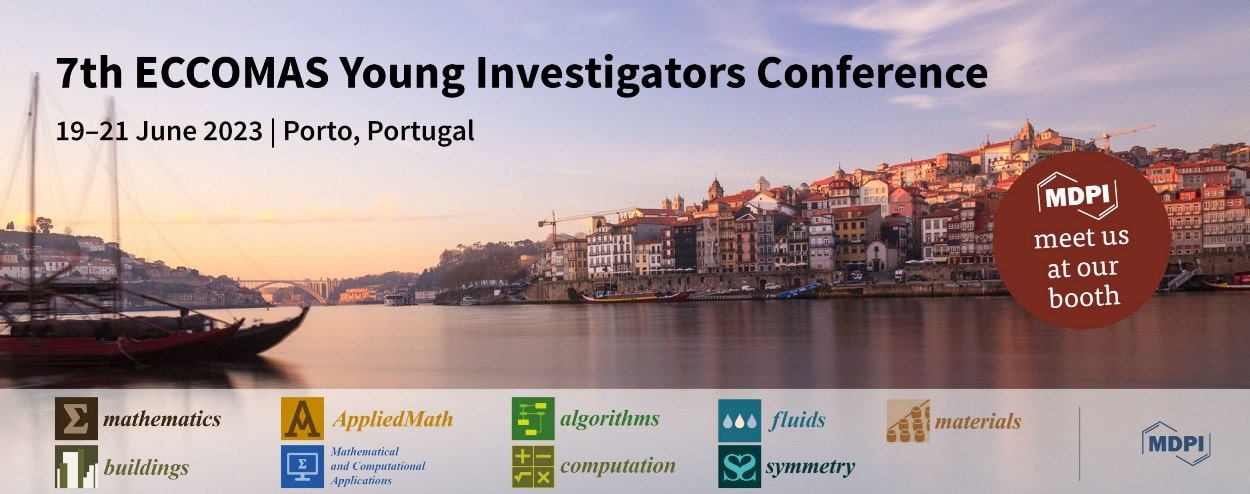
Conference: 7th ECCOMAS Young Investigators Conference (YIC 2023)
Date: 19–21 June 2023
Location: Porto, Portugal
MDPI will be attending YIC 2023 as an exhibitor; we welcome researchers from different backgrounds to visit and share their latest ideas with us.
YIC 2023 is the 7th in the series of international conferences, organized since 2012, with the main purpose of bringing students and young researchers together within a relaxed environment, developing their work in all areas related to computational science and engineering.
The following MDPI journals will be represented:
- Mathematics;
- AppliedMath;
- Algorithms;
- Fluids;
- Materials;
- Buildings;
- MCA;
- Computation;
- Symmetry.
If you are attending this conference, please visit our booth. Our delegates look forward to meeting you in person and answering any questions that you may have. For more information about the conference, please visit the following website: https://paginas.fe.up.pt/~yic2023/.
5 May 2023
Meet Us at the 2023 IEEE International Symposium on Information Theory (ISIT 2023), 25–30 June 2023, Taipei, Taiwan

MDPI will be attending the 2023 IEEE International Symposium on Information Theory (ISIT 2023) in Taipei, Taiwan, which will take place from 25 to 30 June 2023.
ISIT is the premier international conference series dedicated to the advancement of information theory and related areas. It brings together an international community of researchers and practitioners each year to present and discuss new research results and perspectives on future developments relevant to all areas of information theory, including big data analytics, source and channel coding, communication theory and systems, cryptography and security, detection and estimation, emerging applications, networks, network coding, signal processing, and statistical/machine learning.
The following MDPI journals will be represented:
If you are attending this conference, please feel free to stop by our booth. Our delegates look forward to meeting you in person to answer any questions you may have. For more information about the conference, please visit the following link: https://isit2023.org/.
5 May 2023
Mathematics Webinar | Advances of Soft Computing, Held on 12 June 2023

On 12 June 2023, MDPI and the journal Mathematics (ISSN: 2227-7390) organized a webinar Advances of Soft Computing, which was held on 12 June 2023. The webinar focused on soft computing.
The webinar explored various aspects of this interesting topic of Artificial Intelligence, promoting very interesting applications to various scientific fields. It started with a brief introduction from the chair Prof. Dr. Michael Voskoglou about the contents and applications of soft computing. The first speaker, Prof. Dr. Basil Papadopoulos, thoroughly explored the relationship between fuzzy subsethood and fuzzy implications. The next speaker, Prof. Dr. Madhumangal Pal, presented in detail the topic of fuzzy graphs. The last speaker, Dr. Said Broumi, gave an interesting talk about neutrosophic sets, which are generalizations of fuzzy sets introduced by Smarandache in 1995, their extensions, and their applications. The three speakers also answered the various questions raised by the participants in the webinar.
Relevant Special Issues:
“Soft Computing and Uncertainty Learning with Applications”
Guest Editors: Xiaodong Yue, Prof. Dr. Shu Zhao and Prof. Dr. Jie Zhou
Deadline for manuscript submissions: 15 August 2023
“Advances in Genetic Programming and Soft Computing”
Guest Editors: Dr. Marko Ðurasević and Prof. Dr. Domagoj Jakobović
Deadline for manuscript submissions: 31 January 2024
“Advances and Applications of Soft Computing”
Guest Editor: Prof. Dr. Michael Voskoglou
Deadline for manuscript submissions: 6 June 2024
You can watch the recorded webinar at the following link:
Webinar Chair and Keynote Speakers:
- Prof. Dr. Michael Voskoglou, School of Engineering, University of Peloponnese (Ex Graduate Technological Educational Institute of Western Greece), Greece;
- Prof. Dr. Basil Papadopoulos, Department of Civil Engineering, Democritus University of Thrace, Greece;
- Prof. Dr. Madhumangal Pal, Department of Applied Mathematics with Oceanology and Computer Programming, India;
- Dr. Said Broumi, LTI Laboratory, Faculty of Sciences Ben Msik, University Hassan II, Morocco.
19 April 2023
Mathematics | Recruiting Section Editor-in-Chief for Section “Difference and Differential Equations”
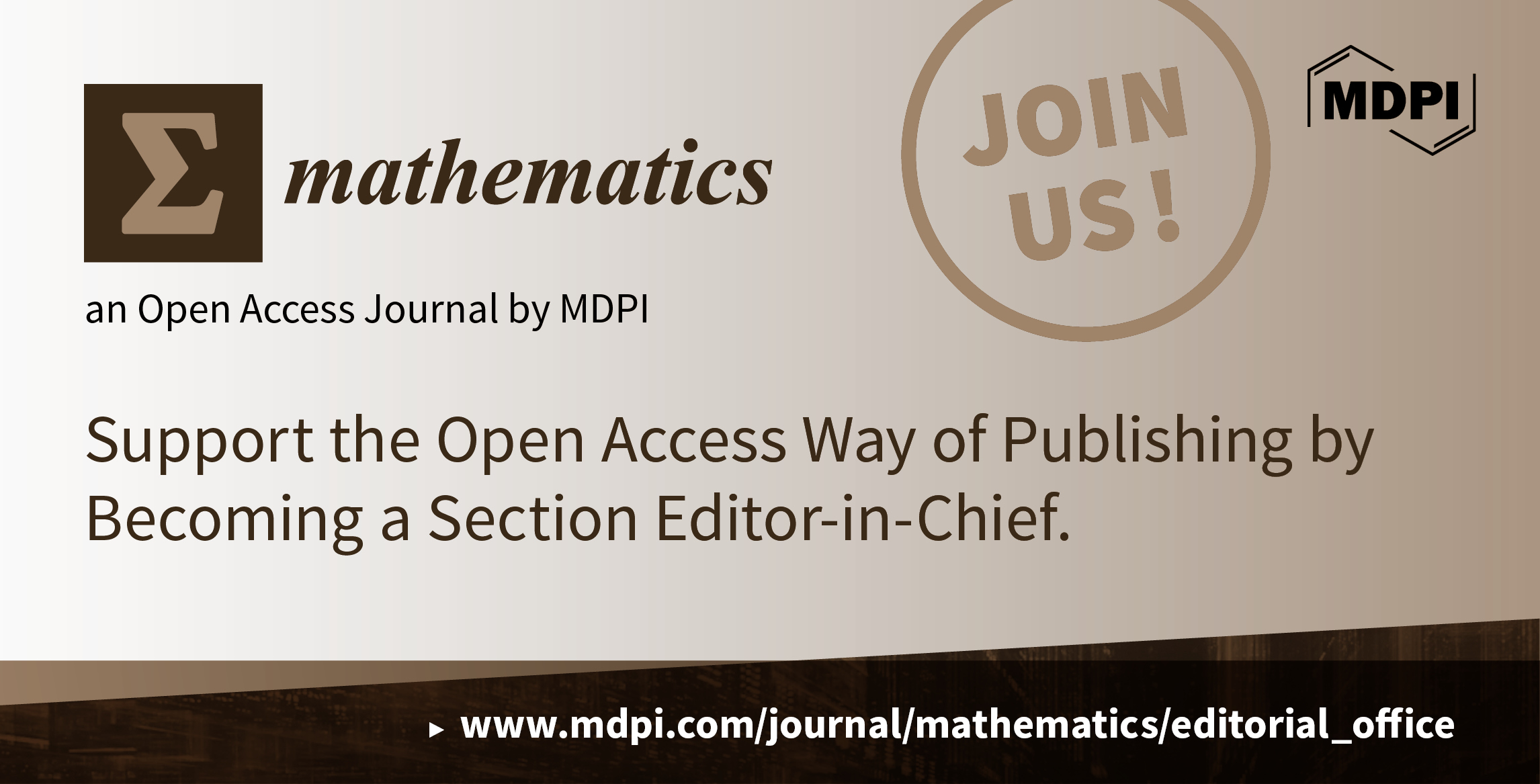
The journal Mathematics (ISSN: 2227-7390) is currently recruiting a Section Editor-in-Chief for the Section “Difference and Differential Equations”.
The Section “Difference and Differential Equations” aims to publish original research papers, perspectives, and review papers on all aspects of this topic. Both qualitative and qualitative theories of ordinary and partial differential equations, along with the existence, multiplicity, and stability of difference equations coupled to dynamic systems are especially welcome.
Further information about the Section may be found via the following link: https://www.mdpi.com/journal/mathematics/sections/difference_differential_equations.
The Section Editor-in-Chief is responsible for the following:
- Defining the aims and scope of the Section;
- Advising on the strategic development of the Section;
- Ensuring that the published content is of high quality;
- Nominating/inviting Guest Editors and optionally providing them with the authority to make final acceptance decisions about submitted articles;
- Nominating/inviting contributors;
- Nominating and leading the Section Editorial Board;
- Promoting the journal at scientific conferences or through other venues;
- Conducting preliminary checks of submissions and making the final decision as to whether a paper can be accepted for publication following peer review and author revisions (when it suits your schedule).
To apply for this position, please contact the Mathematics Editorial Office (mathematics@mdpi.com) with the following two files attached:
- A full academic CV;
- A short cover letter that details your interest and enthusiasm for the position.
Mathematics Editorial Office
24 March 2023
Meet Us at the 13th AIMS Conference on Dynamical Systems, Differential Equations and Applications, 31 May–June 4 2023, Wilmington, NC, USA

Mathematics (ISSN: 2227-7390) be attending the 13th AIMS Conference on Dynamical Systems, Differential Equations and Applications, which will occur from May 31 to June 4 2023 at the University of North Carolina Wilmington, Wilmington, NC, USA. The goals of the meeting include a cross-fertilization of ideas from different application areas and increased communication between the mathematicians who develop dynamical systems techniques and the applied scientists who use them.
The following MDPI journals will be represented:
- Mathematics;
- Axioms;
- Symmetry;
- Fractal Fract;
- Dynamics;
- AppliedMath;
- Computation;
- Systems.
14 March 2023
International Day of Mathematics – Mathematics for Everyone!

Mathematics plays an indispensable role in shaping the world we inhabit, propelling scientific breakthroughs and technological advancements, and fostering social and economic progress. This year's theme, "Mathematics for Everyone", underscores the universal and all-encompassing nature of mathematics, and its potential to positively impact individuals from all walks of life and diverse backgrounds.
We are confident that the prestigious Mathematics subject journals in MDPI, including AppliedMath, Axioms, Computation, Fractal and Fractional, Games, MCA, Stats and Symmetry, will offer ideal communication platforms to enhance scientific collaboration in line with the International Day of Mathematics theme. Let us harness the full potential of these platforms to propel Mathematics to new heights of development and innovation.


|
Axioms A Three-Phase Fundamental Diagram from Three-Dimensional Traffic Data Axioms 2021, 10(1), 17; https://doi.org/10.3390/axioms10010017 |
|
|
Stats An Upper Bound of the Bias of Nadaraya-Watson Kernel Regression under Lipschitz Assumptions Stats 2021, 4(1), 1-17; https://doi.org/10.3390/stats4010001 |
|
|
Games Games 2021, 12(1), 18; https://doi.org/10.3390/g12010018 |

|
Applications of Number Theory to the Sciences and Mathematics Edited by Darin J. Ulness Submisison deadline 30 April 2023 |
Mathematical Models: Methods and Applications Edited by OPhir Nave and Svetlana Bunimovich-Mendrazitsky Submisison deadline 30 April 2023 |

 |
MDPI International Day of Mathematics Webinar 2023 14 Mar 2023, 10:00 (CET) Session 1: 10:00 am–12:00 pm CET Session 2: 14:30 pm–16:30 pm CET Free to register for the two Sessions. Recordings will be available on Sciforum shortly afterwards. |

13 March 2023
MDPI’s Newly Launched Journals in December 2022
As a leading open access publisher, MDPI provides scholars with a high-quality and rich academic exchange platform by continuously expanding into new and exciting research areas.
In December 2022, MDPI launched five new journals, covering multiple subjects such as life sciences, biology, medicine and pharmacology, social sciences and humanities. These new journals are being edited by established scholars across the world.
|
Journal |
Founding Editor-in-Chief |
Journal Topics (Selected) |
|
Prof. Dr. Fabio Gresta, University of Messina, Italy| Editorial | view inaugural issue |
grass/forage/turf production; grassland management; pasture monitoring; grazing and livestock; grass agro-ecosystems| view journal scope | submit an article |
|
|
Prof. Dr. Christos G. Athanassiou, University of Thessaly, Greece| Editorial | view inaugural issue |
pesticides; fungicides; herbicides; fertilizers; soil conditioners| view journal scope | submit an article |
|
|
Prof. Dr. Stephen H. Safe, Texas A&M University, USA| Editorial | view inaugural issue |
receptor structure; receptor function; receptor signaling; receptor expression and regulation; receptor interactions with drugs| view journal scope | submit an article |
|
|
Dr. Jean Jacques Vanden Eynde, University of Mons-UMONS, Belgium| Editorial | view inaugural issue |
drug discovery; medicinal chemistry; preclinical and clinical research; marketed drugs; intellectual property and regulatory affairs| view journal scope | submit an article |
|
|
Prof. Dr. Heather Kanuka, University of Alberta, Canada| Editorial | view inaugural issue |
higher education; tertiary education; policy and practice in higher education; educational leadership in higher education; educational administration and management in higher education| view journal scope | submit an article |
If you are interested in creating more open access journals with us to publish cutting-edge research, please send your journal proposal application to newjournal-committee@mdpi.com.
7 March 2023
Displaying Co-Authors’ Email Addresses on the Webpage of Published Papers
MDPI is pleased to announce that we now display the co-authors’ email addresses in addition to the corresponding author’s email address on the webpage of published papers, protected by Captcha. For more information about this change, please visit the journal’s instructions for authors page.
We believe this change will facilitate academic discussions and advance our cause of open science and research. The corresponding authors are responsible for communicating with their co-authors and indicating in our system (https://susy.mdpi.com/) if co-authors would prefer for their email addresses not to be displayed.
16 February 2023
Increasing Visibility for Preprints.org – Clarivate adds the Preprint Citation Index to the Web of Science

On 9 February 2023, Clarivate, a global leader in providing trusted insights and analytics, added the Preprint Citation Index to the Web of Science platform, streamlining the research process by allowing researchers to locate and link to preprints alongside other trusted content in the database.
The Preprint Citation Index will act as a bridge to connect cutting-edge preprints with peer-reviewed journal articles published within the Web of Science Core Collection. Alerts can be easily set to monitor new research across several repositories and authors will also be able to include preprints on their Web of Science Research Profile to more accurately display their various research outputs.
As of its launch, the Preprint Citation Index will provide nearly two million preprints from various repositories, including MDPI’s own Preprints.org.
MDPI's Preprints Platform – Preprints.org
To advance Open Science and the fast dissemination of research, MDPI offers researchers a free multidisciplinary preprint platform. Preprints.org accepts submissions from all research areas and offers authors high visibility, permanent archiving, article-level Metrics and immediately citable content by assigning a Digital Object Identifier (DOI) to all preprints.
During submission to any MDPI journal, authors have the option to share their research as a preprint. After an initial screening, the manuscript is available online in 48 hours or less. Once online, preprints can be downloaded, shared, commented on, and cited, providing authors maximum visibility.
We invite you to join the ranks of the over 100k researchers using Preprints.org and share your research.
For more information, please visit Preprints.org.
22 December 2022
Special Issue Mentor Program
We are pleased to announce the launch of a new initiative—the MDPI Special Issue Mentor Program.
This program will enable early career researchers (who must hold a Ph.D. in a related field) to experience editing a Special Issue in MDPI journals, under the mentorship of our experienced Editorial Board Members or other experienced scientists. The mentor program will provide an excellent opportunity for early career scientists to gain editorial experience, and to cultivate their ability to edit scientific research.
The mentee’s responsibilities include:
- Proposing a Special Issue title and assisting the mentor in preparing a summary (around 200–400 words) and 3–10 keywords describing the background, importance, and goal of the Issue;
- Writing a brief promotion plan for the Special Issue;
- Preparing a list of scholars who may be interested in the Issue and personally e-mailing invitations on behalf of Guest Editors;
- Writing an editorial for the online Special Issue together with the mentor.
The mentor’s responsibilities include:
- Conducting a final check before the Special Issue is published online;
- Performing editorial control of the Special Issue and quality control of the publications, both of which must be carried out in a timely manner;
- Providing suggestions to younger scholars if they have any doubts or concerns regarding submissions;
- Organizing video calls with young scholars and the Editorial Office regularly to discuss problems and improvement suggestions for the Special Issue;
- Making and submitting decisions regarding submissions with the assistance of mentees.
Certificates and awards:
After the Special Issue closes, the Editorial Office will provide official certificates for all the mentors and early career researchers.
If you are interested in this opportunity, please send your Special Issue proposal to the Editorial Office of a journal you choose, and we will discuss the process (i.e., mentor collaboration, Special Issue topic feasibility analysis, etc.) in further detail. The full list of MDPI journals is as follows: https://www.mdpi.com/about/journals.
In addition to the new Special Issue Mentor Program, we will continue to welcome all Special Issue proposals focusing on hot research topics.
14 December 2022
"Thanks a Million!" – One Million Articles Published in MDPI Journals
MDPI has just become the first open access (OA) publisher to reach the milestone of one million articles published. That is one million articles freely available to all, to circulate and build upon! We are proud to share this special moment with the global scientific community.
This landmark has been reached thanks to the immeasurable support of more than 600,000 expert reviewers, 66,000 editorial board members and 6700 hard-working colleagues across MDPI’s global offices.
Within more than 25 years of publishing, our journals received 2.1 million manuscripts and generated 4.6 million peer review reports to get to one million papers published.
Reaching the milestone of one million articles published reinforces our mission to remove any existing barriers and to make scientific research accessible to all. Since its inception, MDPI’s goal has been to create reliable processes to make science open. This is a path towards facilitating the dissemination of novel insights in scientific communities.
Regular feedback from authors and reviewers shows that our service is greatly appreciated and needed. At the same time, the feedback helps us identify areas for further improvement.
As it stands, a significant share of published research findings remain closed access. More than half of the content published with the most well-known legacy publishers stays behind a paywall, and that is not including articles published in hybrid OA journals, or made available months or years after publication.
A new policy announced by the US administration in August 2022 requires that, as of January 2026, all US federally funded research be made freely and immediately available after publication. While the new policy does not mandate articles be published under an open access license, it is aligned with the open access movement in removing all barriers to research. Similarly, some of the most advanced research institutions in the world intend to have all funded research articles published in open access by 2025.
MDPI is proud to be the leading agent of the transition to open access.
"Thanks a Million" to all the contributors!
8 December 2022
MDPI Sustainability Foundation: New Look and Nominations for the 2023 Sustainability Awards Now Open

We are pleased to announce that the website of the MDPI Sustainability Foundation has been revamped! For the past couple of months, our UX UI team and front-end developers have been working hard to launch the website in time for the opening of the Sustainability Awards nominations.
The website is not the only thing that has had a remodeling. Indeed, the format of the Emerging Sustainability Leader Award (ESLA) has been updated. ESLA is now a competition open to individual researchers or start-ups founded by researchers under the age of 35. Nominee applications will go through 2 rounds of selection until the final 3 are decided. The finalists will then be invited to give pitch presentations during the Award Ceremony to win either first place (10,000 USD) or runner-up (2 x 5000 USD).
The World Sustainability Award, on the other hand, remains the same: a total prize money of 100,000 USD is up for grabs by senior individual researchers or groups of researchers from the international research community.
Nominations for both the World Sustainability Award and the Emerging Sustainability Leader award are now open! Check out our new website for more information on how to nominate.
6 December 2022
Mathematics | Top 10 Cited Papers in 2021 in the Section “Dynamical Systems”
1. “Leveraging Elasticity to Uncover the Role of Rabinowitsch Suspension through a Wavelike Conduit: Consolidated Blood Suspension Application”
by Sara I. Abdelsalam and Abdullah Z. Zaher
Mathematics 2021, 9(16), 2008; https://doi.org/10.3390/math9162008
Full text available online: https://www.mdpi.com/2227-7390/9/16/2008
2. “Bioconvection Reiner-Rivlin Nanofluid Flow between Rotating Circular Plates with Induced Magnetic Effects, Activation Energy and Squeezing Phenomena”
by Muhammad Bilal Arain, Muhammad Mubashir Bhatti, Ahmad Zeeshan and Faris Saeed Alzahrani
Mathematics 2021, 9(17), 2139; https://doi.org/10.3390/math9172139
Full text available online: https://www.mdpi.com/2227-7390/9/17/2139
3. “Double Solutions and Stability Analysis of Micropolar Hybrid Nanofluid with Thermal Radiation Impact on Unsteady Stagnation Point Flow”
by Nur Syazana Anuar and Norfifah Bachok
Mathematics 2021, 9(3), 276; https://doi.org/10.3390/math9030276
Full text available online: https://www.mdpi.com/2227-7390/9/3/276
4. “LMI-Observer-Based Stabilizer for Chaotic Systems in the Existence of a Nonlinear Function and Perturbation”
by Hamede Karami, Saleh Mobayen, Marzieh Lashkari, Farhad Bayat and Arthur Chang
Mathematics 2021, 9(10), 1128; https://doi.org/10.3390/math9101128
Full text available online: https://www.mdpi.com/2227-7390/9/10/1128
5. “Finance for the Environment: A Scientometrics Analysis of Green Finance”
by Rui Cai and Jianluan Guo
Mathematics 2021, 9(13), 1537; https://doi.org/10.3390/math9131537
Full text available online: https://www.mdpi.com/2227-7390/9/13/1537
6. “Hidden Strange Nonchaotic Attractors”
by Marius-F. Danca and Nikolay Kuznetsov
Mathematics 2021, 9(6), 652; https://doi.org/10.3390/math9060652
Full text available online: https://www.mdpi.com/2227-7390/9/6/652
7. “Performance Analysis on the Use of Oscillating Water Column in Barge-Based Floating Offshore Wind Turbines”
by Payam Aboutalebi, Fares M’zoughi, Izaskun Garrido and Aitor J. Garrido
Mathematics 2021, 9(5), 475; https://doi.org/10.3390/math9050475
Full text available online: https://www.mdpi.com/2227-7390/9/5/475
8. “An Optimal Derivative Free Family of Chebyshev–Halley’s Method for Multiple Zeros”
by Ramandeep Behl, Sonia Bhalla, Ángel Alberto Magreñán and Alejandro Moysi
Mathematics 2021, 9(5), 546; https://doi.org/10.3390/math9050546
Full text available online: https://www.mdpi.com/2227-7390/9/5/546
9. “Research on Optimization of Array Honeypot Defense Strategies Based on Evolutionary Game Theory”
by Leyi Shi, Xiran Wang and Huiwen Hou
Mathematics 2021, 9(8), 805; https://doi.org/10.3390/math9080805
Full text available online: https://www.mdpi.com/2227-7390/9/8/805
10. “High-Order Filtered PID Controller Tuning Based on Magnitude Optimum”
by Damir Vrančić and Mikuláš Huba
Mathematics 2021, 9(12), 1340; https://doi.org/10.3390/math9121340
Full text available online: https://www.mdpi.com/2227-7390/9/12/1340
6 December 2022
Mathematics | Top 10 Cited Papers in 2021 in the Section “Difference and Differential Equations”
| 1. “New General Variants of Chebyshev Type Inequalities via Generalized Fractional Integral Operators” by Ahmet Ocak Akdemir, Saad Ihsan Butt, Muhammad Nadeem and Maria Alessandra Ragusa Mathematics 2021, 9(2), 122; https://doi.org/10.3390/math9020122 Full text available online: https://www.mdpi.com/2227-7390/9/2/122 |
| 2. “Analysis of the Time Fractional-Order Coupled Burgers Equations with Non-Singular Kernel Operators” by Noufe H. Aljahdaly, Ravi P. Agarwal, Rasool Shah and Thongchai Botmart Mathematics 2021, 9(18), 2326; https://doi.org/10.3390/math9182326 Full text available online: https://www.mdpi.com/2227-7390/9/18/2326 |
| 3. “A Link between Approximation Theory and Summability Methods via Four-Dimensional Infinite Matrices” by Hari M. Srivastava, Khursheed J. Ansari, Faruk Özger and Zeynep Ödemiş Özger Mathematics 2021, 9(16), 1895; https://doi.org/10.3390/math9161895 Full text available online: https://www.mdpi.com/2227-7390/9/16/1895 |
| 4. “Models for COVID-19 Daily Confirmed Cases in Different Countries” by Hamdy M. Ahmed, Reda A. Elbarkouky, Othman A. M. Omar and Maria Alessandra Ragusa Mathematics 2021, 9(6), 659; https://doi.org/10.3390/math9060659 Full text available online: https://www.mdpi.com/2227-7390/9/6/659 |
| 5. “Fractional System of Korteweg-De Vries Equations via Elzaki Transform” by Wenfeng He, Nana Chen, Ioannis Dassios, Nehad Ali Shah and Jae Dong Chung Mathematics 2021, 9(6), 673; https://doi.org/10.3390/math9060673 Full text available online: https://www.mdpi.com/2227-7390/9/6/673 |
| 6. “Semi-Hyers–Ulam–Rassias Stability of the Convection Partial Differential Equation via Laplace Transform” by Daniela Marian Mathematics 2021, 9(22), 2980; https://doi.org/10.3390/math9222980 Full text available online: https://www.mdpi.com/2227-7390/9/22/2980 |
| 7. “Alikhanov Legendre—Galerkin Spectral Method for the Coupled Nonlinear Time-Space Fractional Ginzburg–Landau Complex System” by Mahmoud A. Zaky, Ahmed S. Hendy and Rob H. De Staelen Mathematics 2021, 9(2), 183; https://doi.org/10.3390/math9020183 Full text available online: https://www.mdpi.com/2227-7390/9/2/183 |
| 8. “A General Family of q-Hypergeometric Polynomials and Associated Generating Functions” by Hari Mohan Srivastava and Sama Arjika Mathematics 2021, 9(11), 1161; https://doi.org/10.3390/math9111161 Full text available online: https://www.mdpi.com/2227-7390/9/11/1161 |
| 9. “On Sharp Oscillation Criteria for General Third-Order Delay Differential Equations” by Irena Jadlovská, George E. Chatzarakis, Jozef Džurina and Said R. Grace Mathematics 2021, 9(14), 1675; https://doi.org/10.3390/math9141675 Full text available online: https://www.mdpi.com/2227-7390/9/14/1675 |
| 10. “Stability of Systems of Fractional-Order Differential Equations with Caputo Derivatives” by Oana Brandibur, Roberto Garrappa and Eva Kaslik Mathematics 2021, 9(8), 914; https://doi.org/10.3390/math9080914 Full text available online: https://www.mdpi.com/2227-7390/9/8/914 |
18 November 2022
Editorial Board Members from Mathematics Featured in Stanford’s List of the World’s Top 2% Scientists
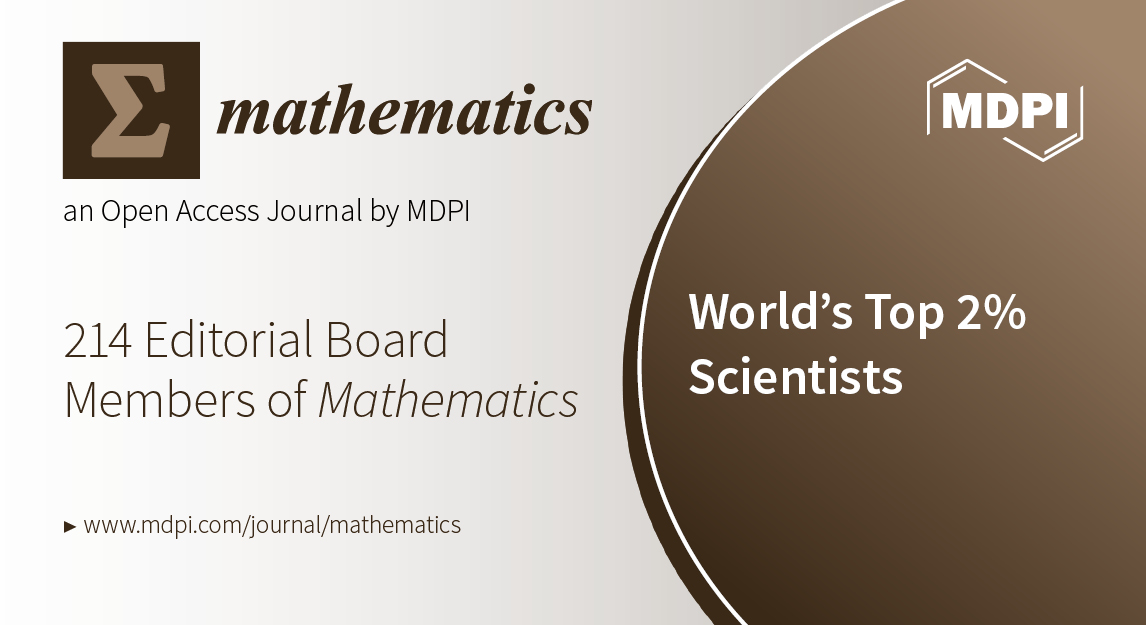
Scientists at Standford have recently published an update of the list of the top 2% most widely cited scientists. The time node of the statistical data of this list is from 1960 to 2022, and it is divided into two lists: "Lifetime Scientific Influence Ranking" and "2022 Annual Scientific Influence Ranking". The "Lifetime Scientific Influence Ranking" counts the comprehensive influence performance of scientists during their careers, and the "2022 Annual Influence Ranking" focuses on highlighting the academic influence of scientists in the previous year. This ranking, considered the most prestigious worldwide, is based on the bibliometric information contained in the Scopus database and includes more than 200,000 researchers from the more than 10 million scientists considered to be active worldwide, with 22 scientific fields and 176 subfields taken into account.
We are pleased to share that 214 Editorial Board Members from MDPI’s Mathematics (ISSN: 2227-7390) were featured in Stanford University World’s Top 2% Scientists list in 2022.
| Adil Bagirov | Ivan Kaygorodov | Przemysław Grzegorzewski |
| Alberto Cabada | Ivan T. Ivanov | Radu Tudor Ionescu |
| Alberto Fernández | Ivanka Stamova | Rami Ahmad El-Nabulsi |
| Alexander Dudin | Ivo Petráš | Ravi P. Agarwal |
| Ali Farajpour | Jacob Biamonte | Richard L. Magin |
| Amir Mosavi | Jakub Nalepa | Richard Linares |
| Andrey Jivkov | James J.H. Liou | Ripon K. Chakrabortty |
| Anthony To Ming Lau | Janusz Brzdęk | Roberto Furfaro |
| Antonio Di Nola | Jaume Giné | Rodica Luca |
| Antonio Elipe | Jesús Alcalá-Fdez | Roland W. Freund |
| Antonio M. Peralta | Jesús Medina | Rosana Rodríguez-López |
| Ben Niu | Jiajun Zhou | Salvador Romaguera |
| Beny Neta | Jiancang Zhuang | Salvatore Sessa |
| Bernard De Baets | Jiangping Hu | Sergei Petrovskii |
| Biao Tang | Jianping Gou | Sergey Dashkovskiy |
| Bo Zhou | Jianquan Lu | Sergio Gómez |
| Boqi Xiao | Jianshe Yu | Shan He |
| Carla M. A. Pinto | Jichun Li | Shaomin Wu |
| Carmen Chicone | Jie Wen | Shihua Zhang |
| Carsten Schneider | Jinfeng Liu | Simeon Reich |
| Changbum Chun | Jinguang Han | Simone Secchi |
| Christopher S. Goodrich | Jinhai Li | Sorana D. Bolboacă |
| Chuangyin Dang | Jinwen Ma | Sotiris K. Ntouyas |
| Chuanzhong Li | John Michael Rassias | Stanisław Migórski |
| Chunqiao Tan | José Antonio Sanz | Stephen S.T. Yau |
| Chunwei Tian | Jose L. Salmeron | Stoytcho Yazadjiev |
| Claes Johnson | Jose Luis Valverde | Tadashi Dohi |
| Congming Li | Julius Kaplunov | Takayuki Hibi |
| Constantin Zopounidis | Junjie Wei | Tianhai Tian |
| Cristina Pignotti | Junlin Hu | Tinh Quoc Bui |
| Dachun Yang | Junseok Kim | Tongxing Li |
| Daniele Mortari | Junyong Zhai | Umberto Morbiducci |
| Danny Barash | Junzo Watada | Vaclav Skala |
| David Allen | Kazufumi Ito | Valentin Goranko |
| Denis Sidorov | Kevin J. Grimm | Valeriu Beiu |
| Didier Felbacq | Krassimir Atanassov | Vasile Lupulescu |
| Dongsheng Yu | Krzysztof Kamil Żur | Vasily Novozhilov |
| Eckhard Hitzer | Lei Ni | Vilém Novák |
| Emilio Turco | Leimin Wang | Vladimir Batagelj |
| Enrico Zio | Levente Kovács | Wei Zhang |
| Ernesto Estrada | Liangxiao Jiang | Weihua Xu |
| Eugene B. Postnikov | Lingfeng Liu | Weimin Han |
| Ezequiel López-Rubio | Linlin Shen | Xiang Li |
| Francesco Aymerich | Lizhong Jiang | Xiangtao Zheng |
| Francesco Topputo | Lokenath Debnath | Xianguo Geng |
| Francisco C. Santos | Lothar Reichel | Xiaobing Feng |
| Francisco Chiclana | Luc Trouche | Xiaofeng Yang |
| Fuyuan Xiao | Lucio Boccardo | Xiaoying Zhuang |
| Gabriel Ciobanu | Luigi Fortuna | Xibei Yang |
| Gaston M. N'Guerekata | Lyle Noakes | Ximeng Liu |
| George A. Anastassiou | Manuel Pastor | Xing He |
| George C. Tsiatas | Marjan Mernik | Xingyuan Wang |
| George E. Chatzarakis | Martin Bohner | Xinsong Yang |
| Giuseppe Pirrò | Massimiliano Ferrara | Xinzhu Meng |
| Guiquan Sun | Matjaz Perc | Yanjie Fu |
| Haitao Li | Mehdi Toloo | Yegao Qu |
| Hari Mohan Srivastava | Michael T. Todinov | Yihong Du |
| Hendrik Richter | Michel Chipot | Yong Hyun Kim |
| Hengjie Zhang | Moo K. Chung | Yongtang Shi |
| Higinio Ramos | Nicu Bizon | Yucai Su |
| Hong Zheng | Nikolay V. Kuznetsov | Zenonas Turskis |
| Hongyu Liu | Nir Sochen | Zhao Kang |
| Huabin Chen | Oleg N. Kirillov | Zhaobin Wang |
| Huawen Liu | Olga I. Vinogradova | Zhaosheng Feng |
| Ichiro Tsuda | Omer San | Zhihua Zhang |
| Ignatios Antoniadis | Palle Jorgensen | Zhijia Zhao |
| Igor Podlubny | Paolo Mercorelli | Zhijie Liu |
| Ioannis Dassios | Pasi Luukka | Zhouchao Wei |
| Ioannis K. Argyros | Patricia J. Y. Wong | Zihua Guo |
| Ioannis K. Chatjigeorgiou | Patrick Siarry | Zongwei Lu |
| Ion Necoara | Peter Baranyi | |
| Irina Perfilieva | Pierre Auger |
The latest Stanford rankings reflect the significant influence and research excellence of the scientists, who are committed to furthering their knowledge for the benefit of the world.
We would like to congratulate our Editorial Board Members on their excellent achievement and thank them for their immense contribution to the scientific progression and development of Mathematics.
8 November 2022
Prof. Dr. Adolfo Ballester-Bolinches Appointed Section Editor-in-Chief of Section "Algebra and Geometry" in Mathematics
We are pleased to announce that Prof. Dr. Adolfo Ballester-Bolinches has been appointed Editor-in-Chief of the Section "Algebra and Geometry" in Mathematics (ISSN: 2227-7390).

Prof. Dr. Adolfo Ballester-Bolinches graduated from the University of Valencia (UV) Summa Cum Laude in Mathematical Sciences (1986), and is currently a university professor in the area of algebra at the Facultat de Matemàtiques de la UV, the university where he has served since 1986. He has taught undergraduate/graduate courses, and doctorate/master's degrees in mathematics.
Prof. Dr. Ballester-Bolinches has participated in research projects financed by national and international public organizations since 1988, and since 2004 he has served as principal investigator/coordinator of coordinated projects. He has published more than 270 scientific articles in prestigious international journals, of which approximately ninety-five percent appear in the "Mathematics" list of the Journal of Citation Reports Science Edition and eighty percent appear in the first and second third of the aforementioned list. Additionally, he has published two books, Classes of finite groups, with L. Ezquerro, Springer (2006), and Products of finite groups, with R. Esteban Romero and M. Asaad, W. De Gruyter (2010), which are basic references in the abstract theory of groups, with the number of citations to date equal to 605 and 378, respectively, using Google Scholar as a source. The number of citations of his publications is, as of today, 4169 with an h-index equal to 29, using Google Scholar as a source. Since 2017, his research work has received 1421 citations and corresponds to an h-index equal to 15 according to the same source. Currently, he is an advisor (referee) of more than 85 scientific journals, member of the editorial committee of 13 journals and reviewer of the Mathematical Reviews and Zentralblatt MATH.
Prof. Dr. Ballester-Bolinches has made numerous visits to several foreign universities within the framework of collaborative projects, in which he has taught various postgraduate courses and carried out research tasks. He was a plenary speaker in many international conferences on group theory and its applications. Now he serves as an advisor to Spanish and foreign project evaluation agencies and has been an evaluator of postgraduate works and doctoral theses at various universities. To date, he has supervised 14 doctoral theses and 9 master's theses/third-year research papers.
The following is a short Q&A with Prof. Dr. Adolfo Ballester-Bolinches, who shared his vision for the Section with us as well as his views on the research area:
1.What appealed to you about the journal that made you want to take the role as its Section Editor-in-Chief?
The main feature of this journal is its interdisciplinarity and its efficiency and speed in publishing articles. This directly affects the impact of these articles and contributes to improving the communication of their results.
2. What is your vision for the Section?
We need to attract quality researchers who publish good articles in this Section. We also must demand in the acceptance of the articles through rigorous selection criteria.
3. What does the future of this field of research look like?
Research in the field of algebra and geometry is an extremely important part of science that is essential for the development of mathematics and its applications in different areas. It is impossible to conceive of a good scientific development without good research in algebra and geometry.
4. What do you think of the development of Open Access in the publishing field?
It is one of the best ways to learn about and disseminate the results of scientific research.
5. What aspects do you focus on when reviewing a manuscript?
The novelty of the results and the techniques used in their development. Its potential impact on the corresponding scientific field.
6. Do you have any suggestions for young researchers in this field?
To work hard to contribute to the development of the area.
We wish Prof. Dr. Ballester-Bolinches every success in his new position, and we look forward to his contributions to the journal.
20 October 2022
Mathematics Webinar | Fractional Calculus and Its Applications, 25 November 2022
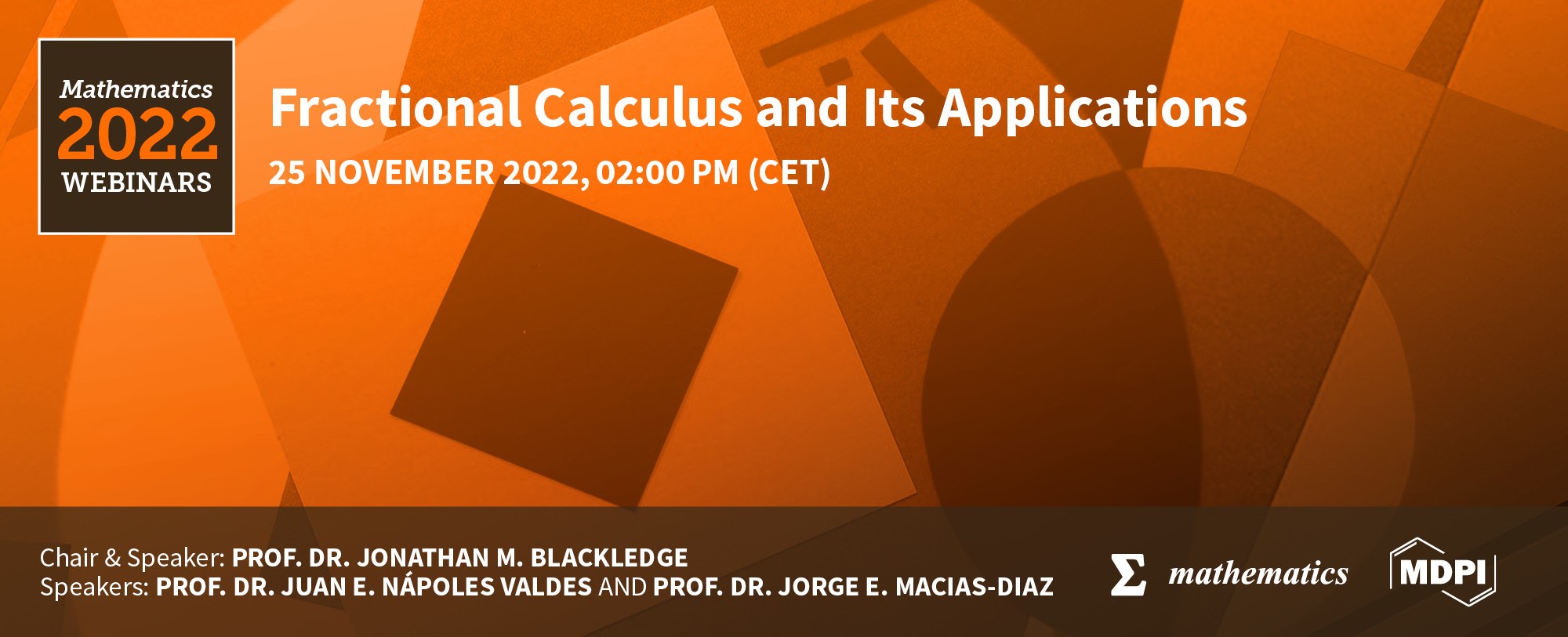
Date: 25 November 2022
Time: 02:00 p.m. (CET)
Webinar ID: 881 3441 2882
Register here:
https://us02web.zoom.us/webinar/register/2516636012244/WN_UMfiT_RKT5ucq1LZ1dfWJw
Participation fee: None
Language: English
Webinar keywords: fractional calculus; history and more recent applications; fractional differential equations; nonlinear dynamics; stochastic fields; analytical and numerical solutions; fractal geometry
Related Special Issues:
- “Abstract Fractional Integro-Differential Equations and Fixed Point Theory with Applications”;
- “Stability Analysis of Fractional Systems-II”;
- “Fractional Differential Equations and Control Problems”;
- “Fractional-Order Systems: Control, Modeling and Applications 2022”;
- “Applications of Fractional Calculus in Option Pricing”;
- “Fractional Calculus in Kinetic Theory”;
- “Fractional Calculus and Mathematical Applications”.
Chair:
|
|
Prof. Dr. Jonathan M. Blackledge SFI Stoke Professor School of Electrical and Electronic Engineering, Technological University Dublin, Ireland |
Speakers:
|
|
Prof. Dr. Juan E. Nápoles Valdes Facultad de Ciencias Exactas y Naturales y Agrimensura (FaCENA), Universidad Nacional del Nordest (UNNE), Argentina; |
|
|
Prof. Dr. Jorge E. Macias-Diaz Department of Mathematics and Didactics of Mathematics, Tallinn University, Estonia; |
28 September 2022
Peer Review Week 2022 – Research Integrity: Creating and Supporting Trust in Research

Peer Review Week began 19 September 2022 under the theme of “Research Integrity: Creating and Supporting Trust in Research”. Through various blog articles, podcast, and webinar, we discussed this crucial subject throughout the week, celebrating the essential role peer review plays in maintaining research quality.
To begin, we held a Webinar on the topic. Professor Peter W. Choate and Dr. Emmanuel Obeng-Gyasi joined Dr. Ioana Craciun, one of MDPI’s scientific officers, for an in-depth discussion.
We invite you to view the event recording:
During the week, the MDPI Blog in a series articles highlighted how good Peer Review safeguards research integrity. The following topics were covered:
- Peer Review Week 2022
- Research Integrity
- What We’ve Learned About Peer Review Reports
- 4 Steps to the Perfect Peer Review Report
- How to Write the Perfect Peer Review Report: An Interview
- Inviting Great Peer Reviewers
In a new edition of Insight Faster, an MDPI podcast, we were delighted to talk to the co-chairs of the Peer Review Week committee, Jayashree Rajagopalan (Senior Manager of Global Community Engagement for CACTUS) and Danielle Padula (Head of Marketing and Community Development at Scholastica) to get their take on this year’s event and its related topics.
You can find the Podcast here.
We hope you enjoy the contents!
20 September 2022
Meet Us at the Conference on Complex Systems (CCS2022), Palma de Mallorca, Spain, 17–21 October 2022
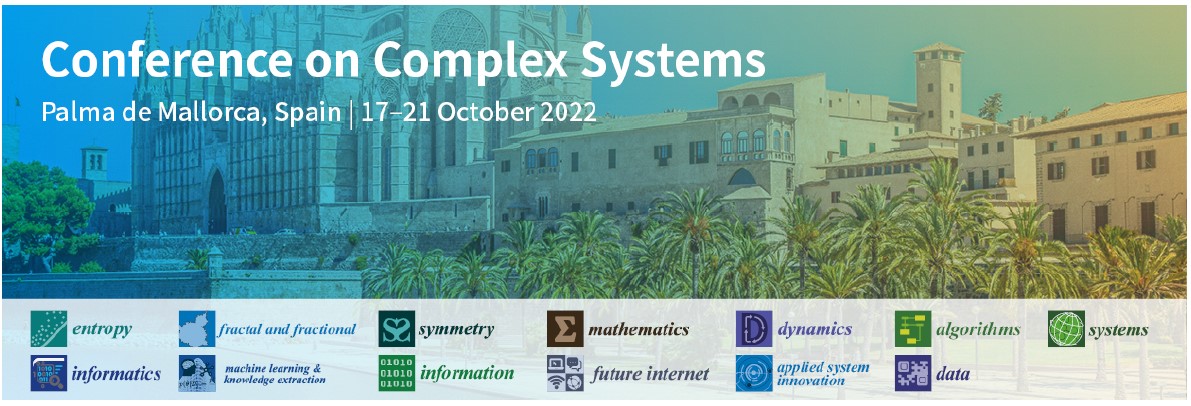
MDPI will be attending the Conference on Complex Systems (CCS2022) in Palma de Mallorca, Spain, which will take place from 17 to 21 October 2022. The CCS is the largest and most important annual meeting of the international complex systems community. It comes under the auspices of the Complex Systems Society. This edition, organized by IFISC, takes place after previous events held in Lyon, Singapore, Thessaloniki, and Cancun.
The following MDPI journals will be represented:
- Entropy;
- Fractal and Fractional;
- Symmetry;
- Mathematics;
- Dynamics;
- Algorithms;
- Systems;
- Informatics;
- MAKE;
- Information;
- Future Internet;
- Applied System Innovation;
- Data.
If you are attending this conference, please feel free to stop by our booth. Our delegates look forward to meeting you in person to answer any questions you may have. For more information about the conference, please visit the following link: https://www.ccs2022.org/.
27 July 2022
Prof. Dr. Massimiliano Ferrara Appointed Section Editor-in-Chief of Section "Financial Mathematics" in Mathematics
We are pleased to announce that Prof. Dr. Massimiliano Ferrara has been appointed Editor-in-Chief of the Section "Financial Mathematics" in Mathematics (ISSN: 2227-7390).

Prof. Dr. Massimiliano Ferrara is a Research Affiliate at ICRIOS – Invernizzi Center for Research on Innovation, Organization, Strategy and Entrepreneurship, Bocconi University, and a full professor of Mathematical Economics at “Mediterranea” University of Reggio Calabria. He was a Vice Rector of strategic planning, development and general affairs, a member of the Academic Senate, Department Chairman (Dept. of Law, Economics and Human Sciences) and a Ph.D. School Head. Currently, he is the President of the Scientific Committee of MEDAlics Research Centre and Scientific Director of DECISIONS Lab at Unirc. He was on the General Counsel of “Fondazione Banco di Napoli”, Vice Rector at University for foreigners “Dante Alighieri” of Reggio Calabria. He was a visiting professor at Harvard University, Cambridge (USA), Western Michigan University (USA), Morgan State University, Baltimora (USA), Northeastern University di Boston (USA), Center for Dynamics of Dresden University of Technology (Germany), and Politechnica University of Bucharest—UPB —(Romania). He is a member of the Mathematical Association of America, of the Indian Academy of Mathematics and a member of the AMASES Scientific Committee (2017-2022). He is the Editor, Co-Editor, Associate Editor and Referee of reputable international scientific journals of economics, pure and applied mathematics. He is the author and co-author of more than 200 papers in peer-reviewed journals and 15 research monographs. His main research interests are mathematical economics, game theory, optimization theory, dynamical systems, epidemic modeling and COVID-19, patterns of growth and sustainable development, applied economics, portfolio management, artificial intelligence, and machine learning.
The following is a short Q&A with Prof. Dr. Massimiliano Ferrara, who shared his vision for the Section “Financial Mathematics" with us, as well as his views on the research area:
1. What appealed to you about the journal that made you want to take the role as its Section Editor-in-Chief?I have previously collaborated with MDPI and joined the Mathematics Editorial Board in 2019. During this time, I was able to observe the increasing quality and the high scientific output of MDPI, focusing on journal metrics and both impactful and reputable performances. I read the Call for Section Editor-in-Chief and I was attracted to this new professional challenge. I was selected, and I wish to thank the MDPI Board for its esteem. I am ready to return this trust with my passion, commitment, and hard and qualified work.
2. What is your vision for the Section?As in every field in which complexity and different kinds of "uncertainty" exist, finance represents a challenge and is a fascinating attractor of arising interests and new frontiers of knowledge. I am sure that in the next two years, we will join a fruitful common path of growth, trying to intercept the new subfield of research born in this specific research context.
3. What does the future of this field of research look like?The future of this area of research has an excellent scientific basis. New research on the so-called FINTECH, with the strategic role played by artificial intelligence, machine and deep learning in making decisions in a disruptive way compared to the past, gives us the opportunity to explore the field of finance with new approaches and tools, presenting scenarios which were unthinkable until a few years ago.
4. What do you think of the development of Open Access in the publishing field?Open access in research is the future. Innovation and knowledge are increasing, along with tools of pure and applied research, particularly in hard science. Artificial intelligence enabled by machine learning and deep learning are assuming a strategic role on this side. In sustaining this deep process of growth, scientific publishing should adopt open access as natural platform for the exchange of information, data, tools and new findings.
5. What aspects do you focus on when reviewing a manuscript?First of all, I try to intercept the scientific message and the real scope of the manuscript after the first reading. This is the basic first step. After this starting point, I study the author’s research profile to try to understand their scientific approach. It is not fundamental where they normally publish—in terms of the journal—but how they publish. During the third step, I begin to technically study the manuscript, following a classic approach.
6. Do you have any suggestions for young researchers in this field?Young researchers should have a real and deep passion for research, not thinking only of metrics with a maniacal propulsion. It is really important to follow one’s own instincts and curiosity when trying to carry out good research. All researchers need to trust their own capacity and the constant presence of their mentor as a guide, offering messages of trust and human support. The rest, and the most fundamental aspect, always comes down to self-confidence.
We warmly welcome Prof. Dr. Massimiliano Ferrara to his role as Section Editor-in-Chief and look forward to his guidance in leading "Financial Mathematics” to more milestones.
25 July 2022
Meet Us at the 5th China Intelligent Optimization and Scheduling Conference, 12–14 August 2022, Taiyuan, China
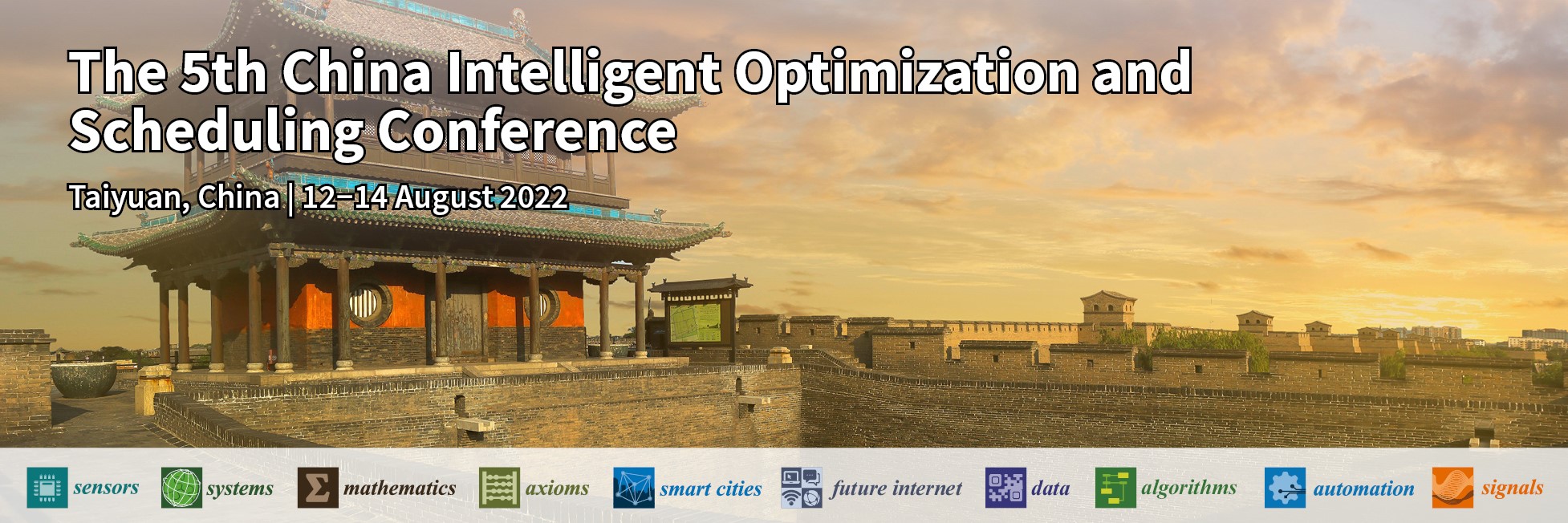
MDPI will be attending the 5th China Intelligent Optimization and Scheduling Conference from 12 to 14 August 2022, in Taiyuan, China.
Themed “Intelligent Optimisation for Scheduling”, the conference will focus on big data, artificial intelligence, simulation optimization, intelligent optimization, scheduling optimization, and other directions through conference presentations, group presentations, wall presentations, enterprise application demonstrations, etc., to carry out cutting-edge theories, methods, technologies, and applications, and will invite famous publishers at home and abroad to introduce journal submissions. The conference will select outstanding academic papers, young scientists, outstanding Ph.D. theses, outstanding M.Sc. theses, innovative application practice projects, etc.
The following MDPI journals will be represented:
- Sensors;
- Systems;
- Mathematics;
- Axioms;
- Smart Cities;
- Future Internet;
- Data;
- Algorithms;
- Automation;
- Signals.
If you are attending this conference, please feel free to start a conversation with us. Our delegates look forward to meeting you in person and answering any questions that you may have.
20 July 2022
Mathematics | 2021 Young Investigator Award—Winner Announced
We are pleased to announce the winner of the Mathematics (ISSN: 2227-7390) 2021 Young Investigator Award, Dr. Marina Murillo-Arcila.

Dr. Marina Murillo-Arcila is currently an associate professor at the Instituto Universitario de Matemática Pura y Aplicada at Universitat Politécnica de Valéncia, Spain. Her research is in the field of the study of abstract evolution equations and linear dynamical systems in infinite dimensions. Contributions to the first line of research on evolution equations emphasize the study of the qualitative properties of linear and nonlinear integrodifferential equations in the context of Banach spaces. Contributions to the research line of linear dynamical systems in infinite dimension focus on the study of properties such as Devaney chaos and other dynamical properties of operators and positive semigroups due to their essential connection with the study of the asymptotic behavior of the solutions of certain partial derivative equations. Additionally, she has been involved in the research collaboration on the application of epidemiological models to describe message dissemination in infrastructure-less and vehicular networks.
Please join us in congratulating Dr. Marina Murillo-Arcila for her outstanding achievements.
We want to thank the award committee for their excellent work in the hard task of selecting a winner from such a large number of excellent candidate profiles and all the nominees from the various fields of study for their participation. We will continue to reward young scientists with the Young Investigator Awards and wish them every success in their careers.
For more information about Mathematics awards, please refer to the following link: https://www.mdpi.com/journal/mathematics/awards.
6 July 2022
MDPI’s 2021 Travel Awards in “Computer Science & Mathematics”—Winners Announced
We are proud to recognize the winners of MDPI’s 2021 Travel Awards in the subject area of “Computer Science & Mathematics” for their outstanding presentations and to present them with the prize.
MDPI journals regularly offer travel awards to encourage talented junior scientists to present their latest research at academic conferences in specific fields, which helps to increase their influence.
The winners mentioned below were carefully selected by the journal editors based on an outline of their research and the work to be presented at an academic conference.
We would like to warmly congratulate the winners of Travel Awards for the year 2021 and wish them the greatest success with their future research endeavors.
MDPI will continue to enhance communication among scientists.
- Umberto Michieli, University of Padova, Italy
- Cameron Kaye, University of Manitoba, Canada
- Alexandra Trujillo, Universidad Nacional del Sur, Argentina
- José María, Autonomous University of Madrid, Spain
- Naser Ojaroudi Parchin, University of Bradford, UK
6 July 2022
MDPI’s 2021 Outstanding Reviewer Awards in “Computer Science and Mathematics”—Winners Announced
In order to acknowledge our reviewers, who so generously dedicate their time to reviewing papers and demonstrate diligence, professionalism, and timeliness when reviewing manuscripts, MDPI journals regularly offer outstanding reviewer awards to scholars who participate in the peer-review process.
We are proud to recognize the winners for the year 2021 in the “Computer Science and Mathematics” for their outstanding contributions among extensive competition by presenting them with an Outstanding Reviewer Award.
We would like to take this opportunity to congratulate all of the winners on their achievement.
MDPI will continue to provide support and recognition to the academic community.
- Maxim A. Dulebenets, SA Florida A&M University-Florida State University, USA
- Artur Jez, University of Wrocław, Poland
- Dmitry Lukyanenko, Lomonosov Moscow State University, Russia
- Juan Ramón Trapero Arenas, Universidad de Castilla-La Mancha, Spain
- Pedro Pablo Garrido Abenza, Universidad Miguel Hernández de Elche, Spain
- Roberto Saia, University of Cagliari, Italy
- Marek Bolanowski, Rzeszow University of Technology, Poland
- Jung Sun Yoo, Hong Kong Polytechnic University, China
- Josemaria Martinezo, University of the Basque Country, Spain
- Maria Alessandra Ragusa, Università di Catania, Italy; DN University, Russia
- Endre Kovács, University of Miskolc, Hungary
- Roman Vavrek, VŠB-Technical University of Ostrava, Czech Republic
- Giacomo Ascione, Università degli Studi di Napoli Federico II, Italy
- Giorgio Sonnino, University in the City of Brussels, Belgium
- Nina Golyandina, St. Petersburg State University, Russia
- Cataldo Guaragnella, Politecnico di Bari, Italy
- Stefan Groote, University of Tartu, Estonia
- José Antonio Oller, Universidad de Murcia, Spain
- Kazuharu Bamba, Fukushima University, Japan
6 July 2022
MDPI’s 2021 Young Investigator Awards in “Computer Science & Mathematics”—Winners Announced
MDPI’s Young Investigator Awards recognize promising junior researchers, acknowledge their contributions, and enhance communication among scientists. We are proud to present the winners for the year 2021 in the “Computer Science & Mathematics”, who were selected by the journals’ editors.
We warmly congratulate the awarded Young Investigators for their outstanding contributions.
MDPI will continue to provide support and recognition to the academic community.
- Marina Murillo Arcila, Universitat Politècnica de València, Spain
- Tanmoy Paul, University of Burdwan, India
6 July 2022
MDPI’s 2021 Best Paper Awards in “Computer Science & Mathematics”—Winners Announced
The purpose of our best paper awards is to promote and recognize the most impactful contributions published within MDPI journals.
The editors of each journal carefully selected reviews and research papers through a rigorous judging process based on the criteria such as scientific merit, overall impact, and quality of the presentation of the papers published in the journal.
We are honored to present the winners in the “Computer Science & Mathematics”, who were selected amongst extensive competition, and congratulate the authors for their outstanding scientific publications.
MDPI will continue to provide support and recognition to the academic community.
- A New gH-Difference for Multi-Dimensional Convex Sets and Convex Fuzzy Sets
By Luciano Stefanini and Barnabas Bede
Axioms 2019, 8(2), 48; doi:10.3390/axioms8020048
- Initial Value Problem for Nonlinear Fractional Differential Equations with ψ-Caputo Derivative via Monotone Iterative Technique
By Choukri Derbazi, Zidane Baitiche, Mouffak Benchohra and Alberto Cabada
Axioms 2020, 9(2), 57; doi:10.3390/axioms9020057
- A review of Machine Learning and IoT in Smart Transportation
By Fotios Zantalis, Grigorios Koulouras, Sotiris Karabetsos and Dionisis Kandris
Future Internet 2019, 11(4), 94; doi:10.3390/fi11040094
- Recognition of Blinks Activity Patterns during Stress Conditions Using CNN and Markovian Analysis
By Alexandra I. Korda, Giorgos Giannakakis, Errikos Ventouras, Pantelis A. Asvestas, Nikolaos Smyrnis, Kostas Marias and George K. Matsopoulos
Signals 2021, 2(1), 55–71; doi:10.3390/signals2010006
- An Educational Guide through the FMP Notebooks for Teaching and Learning Fundamentals of Music Processing
By Meinard Müller
Signals 2021, 2(2), 245–285; doi:10.3390/signals2020018
- Hadronic and Hadron-Like Physics of Dark Matter
By Vitaly Beylin, Maxim Yu. Khlopov, Vladimir Kuksa and Nikolay Volchanskiy
Symmetry 2019, 11(4), 587; doi:10.3390/sym11040587
- Role of Asymmetric Autocatalysis in the Elucidation of Origins of Homochirality of Organic Compounds
By Kenso Soai, Tsuneomi Kawasaki and Arimasa Matsumoto
Symmetry 2019, 11(5), 694; doi:10.3390/sym11050694
- Convenient Asymmetric Synthesis of Fmoc-(S)-6,6,6-Trifluoro-Norleucine
By Haibo Mei, Zizhen Yin, Toshio Miwa, Hiroki Moriwaki, Hidenori Abe, Jianlin Han and Vadim A. Soloshonok
Symmetry 2019, 11(4), 578; doi:10.3390/sym11040578
- CMB Tensions with Low-Redshift H0 and S8 Measurements: Impact of a Redshift-Dependent Type-Ia Supernovae Intrinsic Luminosity
By Matteo Martinelli and Isaac Tutusaus
Symmetry 2019, 11(8), 986; doi:10.3390/sym11080986
28 June 2022
2021 Impact Factors - Released
The 2021 citation metrics have been released in the Journal Citation Reports (JCR), and we’re pleased to announce the following results for MDPI journals:

| Journal | Impact Factor | Rank | Category |
| Antioxidants | 7.675 | Q1 | Food Science & Technology |
| Biochemistry & Molecular Biology | |||
| Chemistry, Medicinal | |||
| Cells | 7.666 | Q2 | Cell Biology |
| Nutrients | 6.706 | Q1 | Nutrition & Dietetics |
| Cancers | 6.575 | Q1 | Oncology |
| Pharmaceutics | 6.525 | Q1 | Pharmacology & Pharmacy |
| International Journal of Molecular Sciences | 6.208 | Q1 | Biochemistry & Molecular Biology |
| Q2 | Chemistry, Multidisciplinary | ||
| Marine Drugs | 6.085 | Q1 | Chemistry, Medicinal |
| Pharmacology & Pharmacy | |||
| Biomolecules | 6.064 | Q2 | Biochemistry & Molecular Biology |
| Batteries * | 5.938 | Q2 | Electrochemistry |
| Energy & Fuels | |||
| Materials Science, Multidisciplinary | |||
| Viruses | 5.818 | Q2 | Virology |
| Biosensors | 5.743 | Q1 | Chemistry, Analytical |
| Instruments & Instrumentation | |||
| Q2 | Nanoscience & Nanotechnology | ||
| Journal of Fungi | 5.724 | Q1 | Mycology |
| Q2 | Microbiology | ||
| Nanomaterials | 5.719 | Q1 | Physics, Applied |
| Q2 | Chemistry, Multidisciplinary | ||
| Materials Science, Multidisciplinary | |||
| Nanoscience & Nanotechnology | |||
| Metabolites | 5.581 | Q2 | Biochemistry & Molecular Biology |
| Foods | 5.561 | Q1 | Food Science & Technology |
| Drones * | 5.532 | Q2 | Remote Sensing |
| Remote Sensing | 5.349 | Q1 | Geosciences, Multidisciplinary |
| Imaging Science & Photographic Technology | |||
| Q2 | Remote Sensing | ||
| Environmental Sciences | |||
| Journal of Theoretical and Applied Electronic Commerce Research | 5.318 | Q2 | Business |
| Antibiotics | 5.222 | Q1 | Pharmacology & Pharmacy |
| Q2 | Infectious Diseases | ||
| Pharmaceuticals | 5.215 | Q1 | Pharmacology & Pharmacy |
| Q2 | Chemistry, Medicinal | ||
| Biology | 5.168 | Q1 | Biology |
| Fermentation | 5.123 | Q2 | Biotechnology & Applied Microbiology |
| Toxins | 5.075 | Q1 | Toxicology |
| Q2 | Food Science & Technology | ||
| Bioengineering * | 5.046 | Q2 | Engineering, Biomedical |
| Polymers | 4.967 | Q1 | Polymer Science |
| Journal of Clinical Medicine | 4.964 | Q2 | Medicine, General & Internal |
| Vaccines | 4.961 | Q2 | Immunology |
| Medicine, Research & Experimental | |||
| Molecules | 4.927 | Q2 | Chemistry, Multidisciplinary |
| Biochemistry & Molecular Biology | |||
| Microorganisms | 4.926 | Q2 | Microbiology |
| Journal of Functional Biomaterials * | 4.901 | Q2 | Engineering, Biomedical |
| Materials Science, Biomaterials | |||
| Biomedicines | 4.757 | Q2 | Medicine, Research & Experimental |
| Pharmacology & Pharmacy | |||
| Biochemistry & Molecular Biology | |||
| Plants | 4.658 | Q1 | Plant Sciences |
| International Journal of Environmental Research and Public Health | 4.614 | Q1 | Public, Environmental & Occupational Health (SSCI) |
| Q2 | Public, Environmental & Occupational Health (SCIE) | ||
| Environmental Sciences (SCIE) | |||
| Membranes | 4.562 | Q1 | Polymer Science |
| Q2 | Engineering, Chemical | ||
| Materials Science, Multidisciplinary | |||
| Chemistry, Physical | |||
| Pathogens | 4.531 | Q2 | Microbiology |
| Catalysts | 4.501 | Q2 | Chemistry, Physical |
| Toxics | 4.472 | Q2 | Toxicology |
| Environmental Sciences | |||
| Gels | 4.432 | Q1 | Polymer Science |
| Journal of Cardiovascular Development and Disease | 4.415 | Q2 | Cardiac & Cardiovascular Systems |
| Chemosensors | 4.229 | Q1 | Instruments & Instrumentation |
| Q2 | Chemistry, Analytical | ||
| Q3 | Electrochemistry | ||
| Genes | 4.141 | Q2 | Genetics & Heredity |
| Diagnostics | 3.992 | Q2 | Medicine, General & Internal |
| Agronomy | 3.949 | Q1 | Agronomy |
| Plant Sciences | |||
| Land | 3.905 | Q2 | Environmental Studies |
| Sustainability | 3.889 | Q2 | Environmental Sciences (SCIE) |
| Environmental Studies (SSCI) | |||
| Q3 | Green & Sustainable Science & Technology (SCIE) | ||
| Q4 | Green & Sustainable Science & Technology (SSCI) | ||
| Sensors | 3.847 | Q2 | Instruments & Instrumentation |
| Chemistry, Analytical | |||
| Engineering, Electrical & Electronic | |||
| Materials | 3.748 | Q1 | Metallurgy & Metallurgical Engineering |
| Q2 | Physics, Applied | ||
| Physics, Condensed Matter | |||
| Q3 | Materials Science, Multidisciplinary | ||
| Chemistry, Physical | |||
| Biomimetics * | 3.743 | Q2 | Engineering, Multidisciplinary |
| Q3 | Materials Science, Biomaterials | ||
| Tropical Medicine and Infectious Disease * | 3.711 | Q1 | Tropical Medicine |
| Q2 | Parasitology | ||
| Q3 | Infectious Diseases | ||
| Lubricants * | 3.584 | Q2 | Engineering, Mechanical |
| Fractal and Fractional | 3.577 | Q1 | Mathematics, Interdisciplinary Applications |
| Water | 3.530 | Q2 | Water Resources |
| Q3 | Environmental Sciences | ||
| Micromachines | 3.523 | Q2 | Instruments & Instrumentation |
| Physics, Applied | |||
| Chemistry, Analytical | |||
| Q3 | Nanoscience & Nanotechnology | ||
| Journal of Personalized Medicine | 3.508 | Q2 | Medicine, General & Internal |
| Health Care Sciences & Services | |||
| Agriculture | 3.408 | Q1 | Agronomy |
| Processes | 3.352 | Q2 | Engineering, Chemical |
| Separations | 3.344 | Q2 | Chemistry, Analytical |
| Magnetochemistry | 3.336 | Q2 | Chemistry, Inorganic & Nuclear |
| Q3 | Chemistry, Physical | ||
| Materials Science, Multidisciplinary | |||
| Brain Sciences | 3.333 | Q3 | Neurosciences |
| Buildings | 3.324 | Q2 | Construction & Building Technology |
| Engineering, Civil | |||
| Forests | 3.282 | Q1 | Forestry |
| Energies | 3.252 | Q3 | Energy & Fuels |
| Life | 3.251 | Q2 | Biology |
| Coatings | 3.236 | Q2 | Materials Science, Coatings & Films |
| Physics, Applied | |||
| Q3 | Materials Science, Multidisciplinary | ||
| Animals | 3.231 | Q1 | Agriculture, Dairy & Animal Science |
| Veterinary Sciences | |||
| Journal of Intelligence * | 3.176 | Q2 | Psychology, Multidisciplinary |
| Fishes | 3.170 | Q1 | Marine & Freshwater Biology |
| Q2 | Fisheries | ||
| Healthcare | 3.160 | Q2 | Health Policy & Services (SSCI) |
| Health Care Sciences & Services (SCIE) | |||
| Inorganics * | 3.149 | Q2 | Chemistry, Inorganic & Nuclear |
| Insects | 3.139 | Q1 | Entomology |
| Atmosphere | 3.110 | Q3 | Meteorology & Atmospheric Sciences |
| Environmental Sciences | |||
| Current Oncology | 3.109 | Q3 | Oncology |
| ISPRS International Journal of Geo-Information | 3.099 | Q2 | Geography, Physical |
| Q3 | Computer Science, Information Systems | ||
| Remote Sensing | |||
| Diversity | 3.029 | Q2 | Biodiversity Conservation |
| Ecology | |||
| Tomography | 3.000 | Q3 | Radiology, Nuclear Medicine & Medical Imaging |
| Current Issues in Molecular Biology | 2.976 | Q3 | Biochemistry & Molecular Biology |
| Medicina | 2.948 | Q3 | Medicine, General & Internal |
| Symmetry | 2.940 | Q2 | Multidisciplinary Sciences |
| Horticulturae | 2.923 | Q1 | Horticulture |
| Machines | 2.899 | Q2 | Engineering, Mechanical |
| Engineering, Electrical & Electronic | |||
| Systems * | 2.895 | Q2 | Social Sciences, Interdisciplinary |
| Applied Sciences | 2.838 | Q2 | Engineering, Multidisciplinary |
| Physics, Applied | |||
| Q3 | Chemistry, Multidisciplinary | ||
| Materials Science, Multidisciplinary | |||
| Children | 2.835 | Q2 | Pediatrics |
| Minerals | 2.818 | Q2 | Mining & Mineral Processing |
| Mineralogy | |||
| Geochemistry & Geophysics | |||
| Universe | 2.813 | Q2 | Astronomy & Astrophysics |
| Q3 | Physics, Particles & Fields | ||
| Journal of Marine Science and Engineering | 2.744 | Q1 | Engineering, Marine |
| Q2 | Oceanography | ||
| Engineering, Ocean | |||
| Entropy | 2.738 | Q2 | Physics, Multidisciplinary |
| Fire * | 2.726 | Q2 | Forestry |
| Q3 | Ecology | ||
| Metals | 2.695 | Q2 | Metallurgy & Metallurgical Engineering |
| Q3 | Materials Science, Multidisciplinary | ||
| Electronics | 2.690 | Q3 | Engineering, Electrical & Electronic |
| Computer Science, Information Systems | |||
| Physics, Applied | |||
| Crystals | 2.670 | Q2 | Crystallography |
| Q3 | Materials Science, Multidisciplinary | ||
| Aerospace | 2.660 | Q1 | Engineering, Aerospace |
| Mathematics | 2.592 | Q1 | Mathematics |
| Photonics | 2.536 | Q3 | Optics |
| Actuators | 2.523 | Q2 | Instruments & Instrumentation |
| Q3 | Engineering, Mechanical | ||
| Veterinary Sciences | 2.518 | Q2 | Veterinary Sciences |
| Behavioral Sciences * | 2.286 | Q3 | Psychology, Multidisciplinary |
| Axioms * | 1.824 | Q2 | Mathematics, Applied |
For more information on Impact Factors and what it means to index academic journals, please visit our related blog posts.
* Journals given their first Impact Factor in 2022
Source: 2021 Journal Impact Factors, Journal Citation Reports TM (Clarivate, 2022)
10 June 2022
Mathematics Receives Updated CiteScore of 2.9
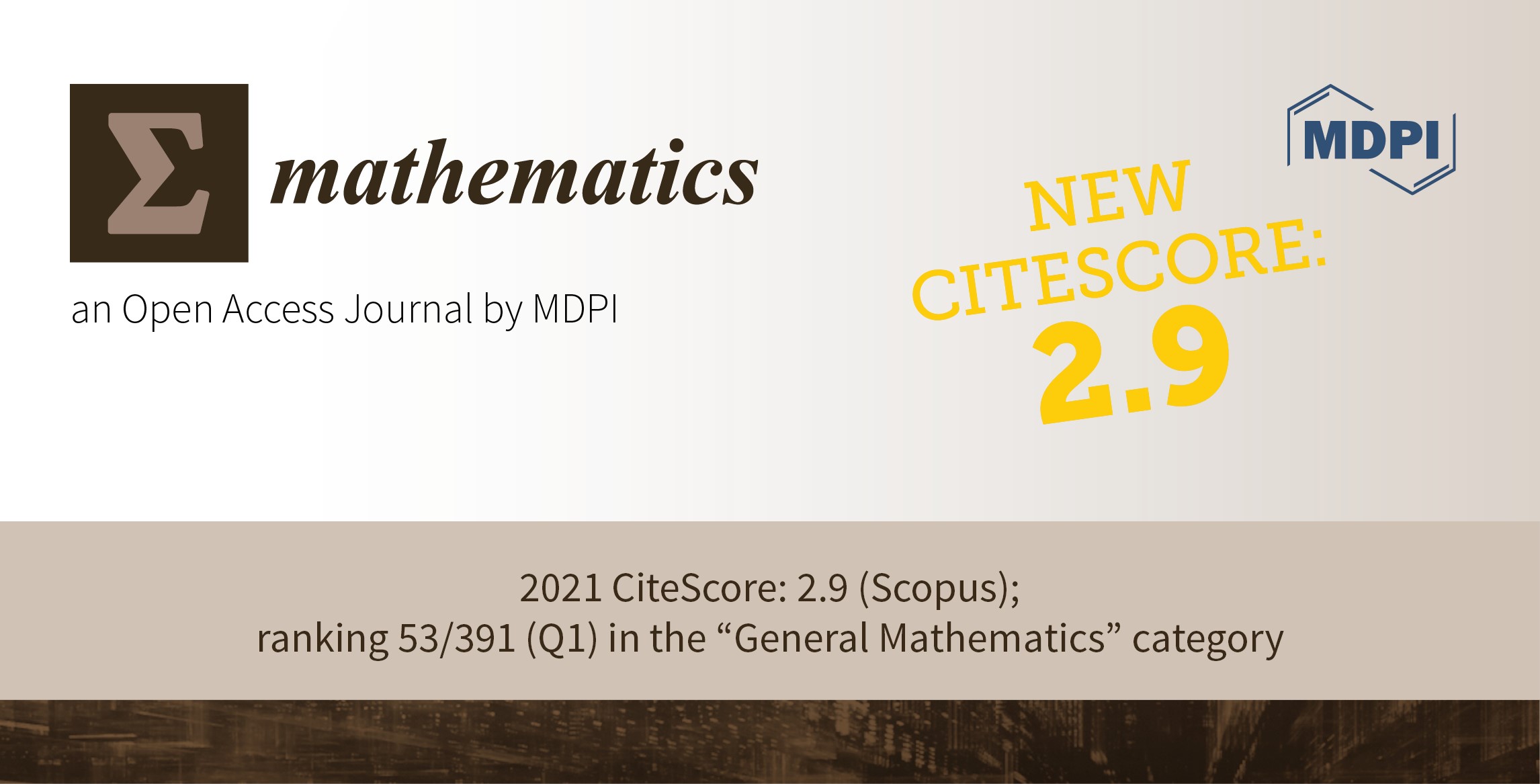
We are pleased to report that the CiteScore of Mathematics (ISSN: 2227-7390) has increased to 2.9 (from 2.2). It now ranks 53/391 (Q1) in "General Mathematics", 34/90 (Q2) in "Computer Science", and 45/115 (Q2) in "Engineering". For full details of the current CiteScore release, please refer to the journal’s Source profile at: https://www.scopus.com/sourceid/21100830702.
We would like to extend our sincerest gratitude to all the authors, editors, and reviewers for their great contributions. We are grateful for their excellent work that has helped us to achieve this milestone for Mathematics!
Read more and submit at https://www.mdpi.com/journal/mathematics.
9 June 2022
2021 CiteScores - Released
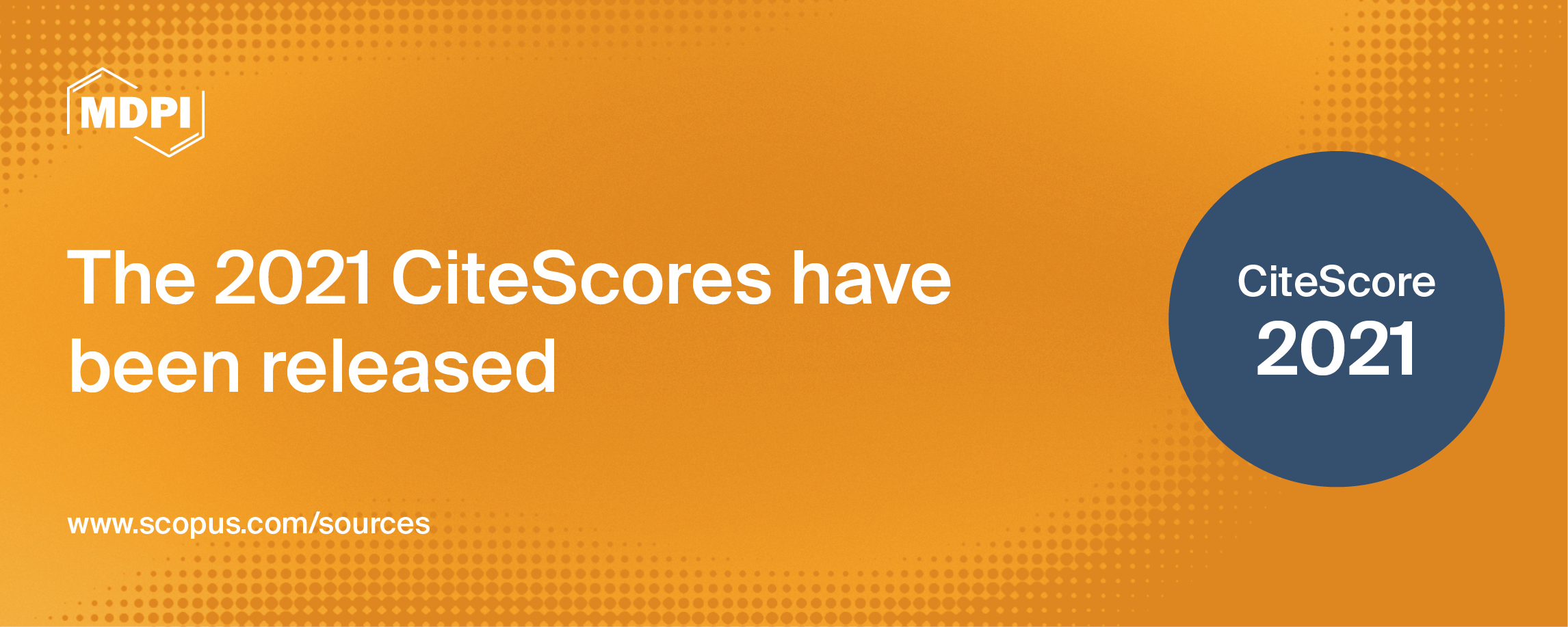
The 2021 citation metrics have been officially released in Scopus!
We are pleased to announce that 182 MDPI journals are included, of which:
● 21 journals received their first CiteScore.
● 85% of journals increased their CiteScore from 2020.
● 155 journals (85%) ranked above average, in at least one category.
The following 65 MDPI journals (36%) ranked among the top 25% of journals, in at least one category:
|
Journal |
CiteScore |
Quartile |
Category |
|
10.1 |
Q1 |
Genetics |
|
|
10.0 |
Q1 |
Biomedical Engineering |
|
|
8.1 |
Q1 |
Pharmacology, Toxicology and Pharmaceutics (miscellaneous) |
|
|
7.9 |
Q1 |
Electrical and Electronic Engineering |
|
|
7.9 |
Q1 |
Nutrition and Dietetics |
|
|
7.4 |
Q1 |
General Earth and Planetary Sciences |
|
|
7.2 |
Q1 |
Computer Science Applications |
|
|
6.9 |
Q1 |
Inorganic Chemistry |
|
|
6.9 |
Q1 |
Computer Networks and Communications |
|
|
6.7 |
Q1 |
General Biochemistry, Genetics and Molecular Biology |
|
|
6.6 |
Q1 |
General Chemical Engineering |
|
|
6.6 |
Q1 |
Health, Toxicology and Mutagenesis |
|
|
6.6 |
Q1 |
Infectious Diseases |
|
|
6.5 |
Q1 |
Food Science |
|
|
6.5 |
Q1 |
Civil and Structural Engineering |
|
|
6.4 |
Q1 |
Nature and Landscape Conservation |
|
|
6.4 |
Q1 |
Instrumentation |
|
|
6.1 |
Q1 |
Management Information Systems |
|
|
5.9 |
Q1 |
Chemistry (miscellaneous) |
|
|
5.7 |
Q1 |
Polymers and Plastics |
|
|
5.6 |
Q1 |
Engineering (miscellaneous) |
|
|
5.5 |
Q1 |
General Environmental Science |
|
|
5.5 |
Q1 |
Urban Studies |
|
|
5.4 |
Q2 |
Computer Networks and Communications |
|
|
5.3 |
Q1 |
Food Science |
|
|
5.3 |
Q1 |
Plant Science |
|
|
5.2 |
Q1 |
Ecology, Evolution, Behavior and Systematics |
|
|
5.2 |
Q1 |
General Engineering |
|
|
Journal of Open Innovation: Technology, Market, and Complexity |
5.1 |
Q1 |
Development |
|
5.0 |
Q1 |
Chemistry (miscellaneous) |
|
|
5.0 |
Q1 |
Control and Optimization |
|
|
5.0 |
Q1 |
Geography, Planning and Development |
|
|
5.0 |
Q1 |
Geography, Planning and Development |
|
|
4.9 |
Q1 |
Forestry |
|
|
4.9 |
Q1 |
Control and Optimization |
|
|
4.9 |
Q1 |
Soil Science |
|
|
4.8 |
Q1 |
General Earth and Planetary Sciences |
|
|
4.8 |
Q1 |
Mechanical Engineering |
|
|
4.8 |
Q1 |
Public Health, Environmental and Occupational Health |
|
|
4.8 |
Q1 |
Geography, Planning and Development |
|
|
International Journal of Environmental Research and Public Health |
4.5 |
Q1 |
Public Health, Environmental and Occupational Health |
|
4.5 |
Q1 |
Physical Therapy, Sports Therapy and Rehabilitation |
|
|
4.4 |
Q1 |
Mathematical Physics |
|
|
4.4 |
Q1 |
General Medicine |
|
|
4.3 |
Q1 |
General Mathematics |
|
|
4.2 |
Q1 |
Surgery |
|
|
4.1 |
Q1 |
Health Professions (miscellaneous) |
|
|
4.1 |
Q1 |
Plant Science |
|
|
4.0 |
Q1 |
General Engineering |
|
|
4.0 |
Q1 |
Forestry |
|
|
4.0 |
Q1 |
Education |
|
|
3.9 |
Q1 |
General Pharmacology, Toxicology and Pharmaceutics |
|
|
3.9 |
Q1 |
Applied Mathematics |
|
|
3.8 |
Q1 |
Development |
|
|
3.8 |
Q1 |
Architecture |
|
|
3.8 |
Q1 |
Metals and Alloys |
|
|
3.5 |
Q1 |
Communication |
|
|
3.4 |
Q1 |
General Social Sciences |
|
|
2.9 |
Q1 |
General Mathematics |
|
|
2.8 |
Q1 |
Analysis |
|
|
2.7 |
Q1 |
General Veterinary |
|
|
2.6 |
Q1 |
Algebra and Number Theory |
|
|
1.8 |
Q1 |
Conservation |
|
|
1.0 |
Q1 |
Religious Studies |
|
|
0.9 |
Q1 |
Philosophy |
Source: 2021 CiteScores™ (Elsevier)
9 June 2022
Recruiting Section Editor-in-Chief for Section “Financial Mathematics” in Mathematics
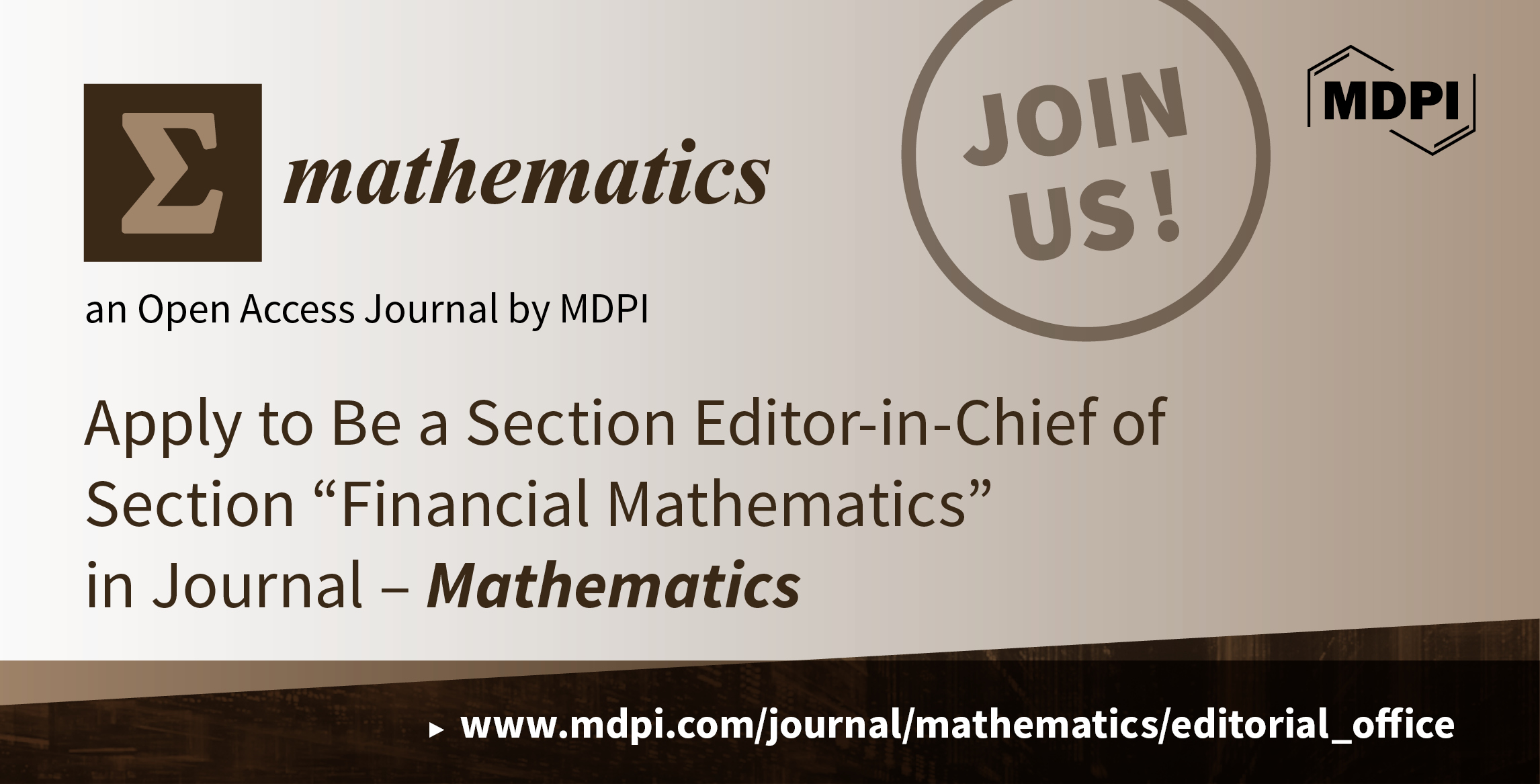
The journal Mathematics (ISSN: 2227-7390) is currently recruiting a Section Editor-in-Chief for the Section “Financial Mathematics”.
The Section “Financial Mathematics” aims to publish original contributions focused on the development and application of novel mathematical methods and solutions for financial problems. It is also dedicated to providing a platform and forum for mathematical scientists who are interested in the mathematical aspects of finance, as well as financial economists who are interested in rigorous treatments of scientific computational problems related to practice.
Further information about the Section may be found via the following link: https://www.mdpi.com/journal/mathematics/sections/financial_mathematics.
The Section Editor-in-Chief is responsible for the following:
- Defining the aims and scope of the Section;
- Advising on the strategic development of the Section;
- Ensuring that the published content is of high quality;
- Nominating/inviting Guest Editors and optionally providing them with the authority to make final acceptance decisions about submitted articles;
- Nominating/inviting contributors;
- Nominating and leading the Section Editorial Board;
- Promoting the journal at scientific conferences or through other venues;
- Conducting preliminary checks of submissions and making the final decision as to whether a paper can be accepted for publication following peer review and author revisions (when it suits your schedule).
To apply for this position, please contact the Mathematics Editorial Office (mathematics@mdpi.com) with the following two files attached:
- A full academic CV;
- A short cover letter that details your interest and enthusiasm for the position.
9 June 2022
Mathematics | Top Cited Papers 2020–2021
“A New Fuzzy MARCOS Method for Road Traffic Risk Analysis”
Miomir Stanković et al.
Mathematics 2020, 8(3), 457; https://doi.org/10.3390/math8030457
“Numerical Investigation on the Swimming of Gyrotactic Microorganisms in Nanofluids through Porous Medium over a Stretched Surface”
Anwar Shahid et al.
Mathematics 2020, 8(3), 380; https://doi.org/10.3390/math8030380
“A Regularity Criterion in Weak Spaces to Boussinesq Equations”
Ravi P. Agarwal et al.
Mathematics 2020, 8(6), 920; https://doi.org/10.3390/math8060920
“Predicting Hard Rock Pillar Stability Using GBDT, XGBoost, and LightGBM Algorithms”
Weizhang Liang et al.
Mathematics 2020, 8(5), 765; https://doi.org/10.3390/math8050765
“Deep Hybrid Model Based on EMD with Classification by Frequency Characteristics for Long-Term Air Quality Prediction”
Xue-Bo Jin et al.
Mathematics 2020, 8(2), 214; https://doi.org/10.3390/math8020214
“New General Variants of Chebyshev Type Inequalities via Generalized Fractional Integral Operators”
Ahmet Ocak Akdemir et al.
Mathematics 2021, 9(2), 122; https://doi.org/10.3390/math9020122
“A Compromised Decision-Making Approach to Third-Party Logistics Selection in Sustainable Supply Chain Using Fuzzy AHP and Fuzzy VIKOR Methods”
Chia-Nan Wang et al.
Mathematics 2021, 9(8), 886; https://doi.org/10.3390/math9080886
“General Fractional Integrals and Derivatives with the Sonine Kernels”
Yuri Luchko
Mathematics 2021, 9(6), 594; https://doi.org/10.3390/math9060594
“Design of Constrained Robust Controller for Active Suspension of In-Wheel-Drive Electric Vehicles”
Xianjian Jin et al.
Mathematics 2021, 9(3), 249; https://doi.org/10.3390/math9030249
“Models for COVID-19 Daily Confirmed Cases in Different Countries”
Hamdy M. Ahmed et al.
Mathematics 2021, 9(6), 659; https://doi.org/10.3390/math9060659
11 May 2022
Prof. Dr. Paolo Mercorelli Appointed Section Editor-in-Chief of the Section “Engineering Mathematics” in Mathematics
We are pleased to announce that Prof. Dr. Paolo Mercorelli has been appointed Editor-in-Chief of the Section “Engineering Mathematics” in Mathematics (ISSN: 2227-7390).
Prof. Dr. Paolo Mercorelli received an M.S. (Laurea) in electronic engineering from the University of Florence, Florence, Italy, in 1992 and a Ph.D. in systems engineering from the Alma Mater Studiorum University of Bologna, Bologna, Italy, in 1998. In 1997, he spent one year as a Visiting Researcher in the Department of Mechanical and Environmental Engineering, University of California, Santa Barbara, USA. He participated in the Marie Curie Actions research fellowship program sponsored by the European Commission in 1998, during which he spent his time at ABB (Asea Brown Boveri) Corporate Research, Heidelberg. Thanks to this scholarship, from 1998 to 2001, he was a Postdoctoral Researcher with ABB (Asea Brown Boveri) Corporate Research, Heidelberg, Germany. From 2002 to 2005, he was a Senior Researcher with the Institute of Automation and Informatics, Wernigerode, Germany, where he was the Leader of the Control Group. From 2005 to 2011, he was an Associate Professor of process informatics at the Ostfalia University of Applied Sciences, Wolfsburg, Germany. In 2011, he was a Visiting Professor at Villanova University, Philadelphia, USA.
He has been a Distinguished Full Professor (Chair) of Control and Drive Systems at the Institute of Product and Process Innovation, Leuphana University of Lueneburg, Lueneburg, Germany, since 2012. His current research interests include mechatronics, signal processing, wavelets, model predictive control, sliding mode control, sensorless control, Kalman filters, knock control, lambda control, and robotics.
In the winter semester of the 2017/2018 academic year, he worked at the Institute of Automatic Control of Lodz University of Technology (Poland) under a Distinguished International Visiting Professor Fellowship. In 2018, he was a Visiting Scientist Fellowship at the Czech Academy of Science of Prague (Czech Republic) with the Institute of Information Theory and Automation (UTIA). As of 2019, he has been working as a lecturer and Visiting Professor at the Ph.D. Schools of the University of Miskolc (Hungary) and University of Craiova (Romania). During the summer semester of 2020, he began working as a lecturer for USAC (University Studies Abroad Consortium), giving online lectures for different American Universities each semester: Nevada University Reno and Las Vegas, Arkansas University and Wright State University. Prof. Dr. Paolo Mercorelli is within the top 2% of scientists in Control Systems in accordance with Elsevier Search Data for the years 2019, 2020, and 2021.
The following is a short Q&A with Prof. Dr. Paolo Mercorelli, who shared his vision for the journal with us as well as his views on the research area:
1. What appealed to you about the journal that made you want to take the role as its Section Editor-in-Chief?
It is my honor and pleasure to accept this task with its important mission for different reasons. I think that the field of engineering mathematics has an important purpose in our society—not only in terms of developing new and more human technologies but also in terms of education. As a professor, first of all, I am an educator, and, thus, as Editor-in-Chief of the “Engineering Mathematics” Section of this journal, I would like to emphasize possible future applications that are strongly rooted in mathematical background. This approach will benefit students more directly. It is my wish to emphasize the submission of papers that include a background on their topics, even if brief. The idea is to attract readers, students, and lecturers who can profit from the content of our articles.
More than the aforementioned, I would like to clarify and apply some ethical aspects, as I did in other fields of my life and other occasions throughout my life. I spent ten years living in the Christian community of Opera Madonnina del Grappa in Florence, Italy, sharing this period of my studies assisting children. I also spent one year of my life driving a lorry throughout Albania helping Mother Teresa. It is important for me in this mission as Editor-in-Chief to provide the message of peace in a different way than I have in the past but with the same significance. Under my direction, we will only review papers in which the corresponding authors declare that their results have not come from military applications. If the paper is accepted for publication, the authors must acknowledge that they wish, as I do, that the readers do not apply this knowledge to any form of military application: either military offense or defense. Peace depends on the contributions of each of us. Each war originates from injustices that are carried out by guilty people. In the same way, it is also true that none of us are innocent if we do not contribute to the creation of peace in some way. In some sense, all of us are guilty people because we are not able to leave the categories of war in order to assume the categories of peace. Each war tells us about ourselves. In fact, almost all technological advancements of our era come from war-like technologies, including the internet, for instance. This particular historical period is pressed by oppression, where violence is mixed with our mediocrity, and our response must not be to be scared but to care. Additionally, we must trust in our intelligence to turn the science and, in particular, our intellectual energy of engineering mathematics from potentially bellicose perspectives into serving peace:
Si vis pacem, para pacem! (“If you want peace, prepare for peace!”)
2. What is your vision for the Section?
I see an interesting future for this field and an extremely important mission for this Section. In fact, engineering mathematics develops a mathematical structure in which not strictly mathematical subjects can be examined. Engineering mathematics encompasses a wide range of mathematical methods and shows the practical application of mathematical theories.
Mathematical methods are becoming increasingly important for solving engineering problems. Anyone who studies engineering mathematics today learns how mathematical methods can be used to further develop technology. Algorithms, which can be used to simulate technical processes, play an important role here. Simulation is an essential tool for the development of new products. With its diverse sub-areas, from analysis to optimization, mathematics creates the basis for the further development of numerical methods. In my vision, the “Engineering Mathematics” Section should make space for the techniques and connections that belong to this fascinating science, which will result in new findings that will influence our everyday lives again and again. With this Section, I intend to create an important worldwide platform for research, development, and application in the fields of mathematically oriented sciences—from the development of new algorithms and their implementation on a computer, to prove their functionality. By combining mathematical training with the knowledge of application problems from engineering, a potential reader of our Section can find inspiration to solve current problems and then work with engineering teams to develop the technologies of tomorrow. Our society has set the goal of developing itself into the most dynamic knowledge-based economy, with more and higher qualified jobs and a larger need for social justice. Engineering mathematics can make significant contributions to this goal, and although the role of mathematicians is widely recognized, there is still much room for improvement in the research. In particular, more attention should be paid to mathematical modeling, simulation, optimization, and scientific computing. This applies to both industry and life sciences. In the life sciences, for example, mathematics is used to plan operations and to better understand biological, physiological, social, and more complex systemic processes.
3. What does the future of this field of research look like?
In this sense, this field of research offers tremendous potential in the context of algorithms. The insights mentioned above are needed to optimize the algorithms that are the basis of all artificial intelligence and the direct product of our field. The quality of these algorithms determines an organization's leadership and develops the trust of users. We have to trust computers and robots. I think that better results do not necessarily come from better intellect, nor do they necessarily come from better computing power—they might just as well come from a better process with human finalities. Additionally, for this, people and machines should interact with as much trust as possible. The society of the future is condemned to trust, so we have to trust algorithms.
I would like to summarise with the mantra: “Think mathematically, act algorithmically!”
Moreover, in this controversial historical period, heavy with injustice and oppression, the field of engineering mathematics and its Section in this journal can provide an important contribution in terms of trust and in terms of believing.
In fact, as I introduced above, this is connected, never more so than it is today, with a higher and more important level of trust and belief in the form of a rational integral humanism in which engineering mathematics contributes to peace: Si vis pacem, para pacem!
We warmly welcome Prof. Dr. Paolo Mercorelli to his role as Section Editor-in-Chief and look forward to his guidance in leading “Engineering Mathematics” to more milestones.
10 May 2022
Mathematics | Recruiting Section Editor-in-Chief for Section “Financial Mathematics”
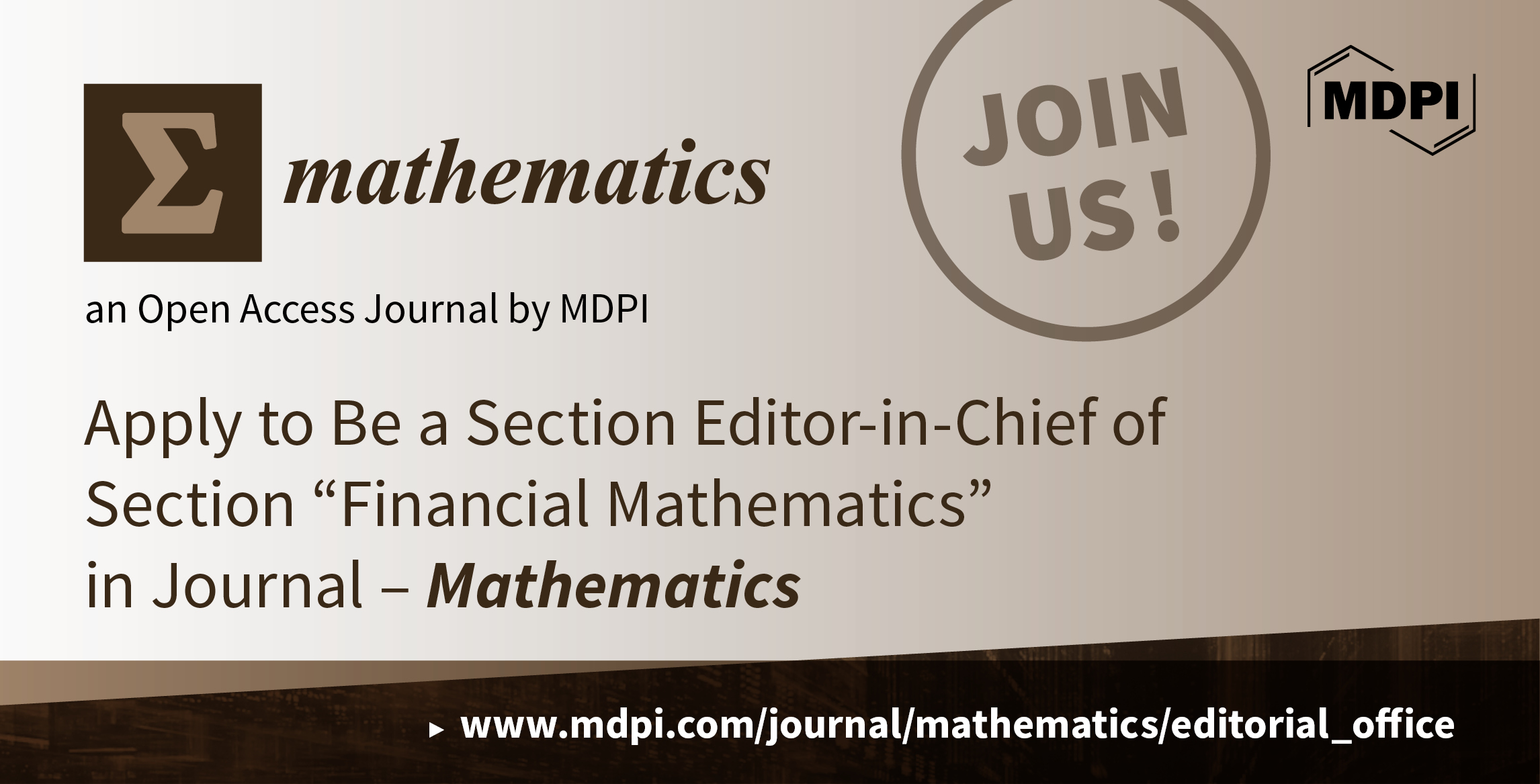
The journal Mathematics (ISSN: 2227-7390) is currently recruiting a Section Editor-in-Chief for the Section “Financial Mathematics”.
The Section “Financial Mathematics” aims to publish original contributions focused on the development and application of novel mathematical methods and solutions for financial problems. It is also dedicated to providing a platform and forum for mathematical scientists who are interested in the mathematical aspects of finance, as well as financial economists who are interested in rigorous treatments of scientific computational problems related to practice. Further information about the Section may be found via the following link: https://www.mdpi.com/journal/mathematics/sections/financial_mathematics.
The Section Editor-in-Chief is responsible for the following:
- Defining the aims and scope of the Section;
- Advising on the strategic development of the Section;
- Ensuring that the published content is of high quality;
- Nominating/inviting Guest Editors and optionally providing them with the authority to make final acceptance decisions about submitted articles;
- Nominating/inviting contributors;
- Nominating and leading the Section Editorial Board;
- Promoting the journal at scientific conferences or through other venues;
- Conducting preliminary checks of submissions and making the final decision as to whether a paper can be accepted for publication following peer review and author revisions (when it suits your schedule).
To apply for this position, please contact the Mathematics Editorial Office (mathematics@mdpi.com) with the following two files attached:
- A full academic CV;
- A short cover letter that details your interest and enthusiasm for the position.
Mathematics Editorial Office
26 April 2022
Recruiting Topical Advisory Panel Members for Mathematics
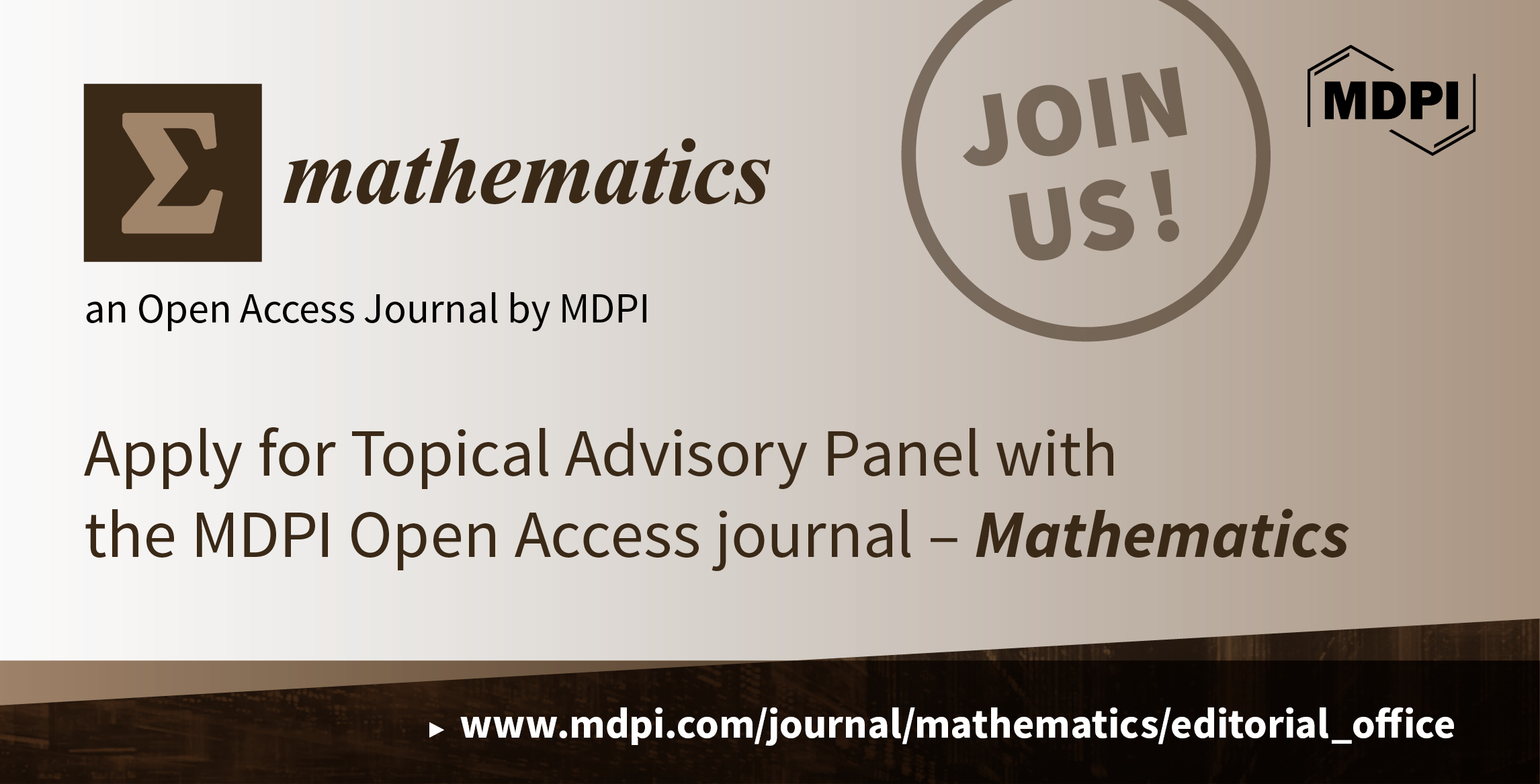
We are currently recruiting Topical Advisory Panel Members. The main responsibility of the Topical Advisory Panel is to provide regular support to Guest Editors and Section Board Members. Each year the members’ performance is evaluated, and outstanding members will be promoted to the Editorial Board by the journal's Editor-in-Chief. You can check the detailed Topical Advisory Panel responsibilities at the following link: https://www.mdpi.com/editors#Supporting_Editor_Responsibilities.
Mathematics (ISSN 2227-7390) is a peer-reviewed and open access journal that provides an advanced forum for studies related to mathematics, and is published semimonthly online by MDPI. The European Society for Fuzzy Logic and Technology (EUSFLAT) and International Society for the Study of Information (IS4SI) are affiliated with Mathematics. The aims and scope of the journal can be found at the following link: https://www.mdpi.com/journal/mathematics/about.
To qualify as a Topical Advisory Panel Member, applicants are required to:
- Have expertise and experience in a field related to the journal;
- Be within approximately 10 years of receiving a Ph.D.;
- Have at least six published papers in the last 5 years as a first author or corresponding author;
- Currently hold an independent research position in academia or at a government institute.
If you are interested in this position, please apply here, or send an email to mathematics@mdpi.com with your academic CV.
We look forward to hearing from you.
Mathematics Editorial Office
17 March 2022
Mathematics 2021 Outstanding Reviewer Award—Winners Announced
The editorial team of Mathematics (ISSN: 2227-7390) is pleased to announce the winners of the 2021 Outstanding Reviewer Award:
|
|
Name: Prof. Dr. Maria Alessandra Ragusa Affiliations: 1. Dipartimento di Matematica e Informatica, Università di Catania, Viale Andrea Doria 6, 95125 Catania, Italy 2. RUDN University, 6 Miklukho-Maklay St, 117198 Moscow, Russia Research Interests: nonlinear analysis; mathematical models in applied sciences; partial differential equations; environmental applications of mathematical methods |
|
|
Name: Dr. Endre Kovács Affiliation: Institute of Physics and Electrical Engineering, University of Miskolc, Miskolc 3515, Hungary Research Interests: numerical simulation; parabolic partial differential equations; ordinary differential equations; heat conduction; numerical methods; diffusion |
|
|
Name: Dr. Giacomo Ascione Affiliation: Dipartimento di Matematica e Applicazioni “Renato Caccioppoli”, Università degli Studi di Napoli Federico II, I-80126 Naples, Italy Research Interests: generalized fractional calculus; Lévy process; Bernstein function; subordinator; nonlocal abstract Cauchy problems; subordinated Brownian motion |
|
|
Name: Prof. Dr. Giorgio Sonnino Affiliation: Department of Theoretical Physics and Mathematics, University in the City of Brussels, 1050 Bruxelles, Belgium Research Interests: thermodynamics of irreversible processes; entropy information theory; thermodynamic field theories; metric geometry in thermodynamics; non-linear dynamics; hydrodynamic fluctuations; transport processes in tokamak plasmas |
|
|
Name: Dr. Roman Vavrek Affiliation: Department of Public Economics, Faculty of Economics, VŠB-Technical University of Ostrava, 70200 Ostrava, Czech Republic Research Interests: multicriteria decision-making methods; efficiency evaluation |
25 February 2022
Prof. Dr. Francisco Chiclana Appointed Editor-in-Chief of Mathematics
We are pleased to announce that Prof. Dr. Francisco Chiclana has been appointed Editor-in-Chief of Mathematics (ISSN 2227-7390).

Prof. Dr. Francisco Chiclana received his B.Sc. in mathematics from the University of Granada (UoG, Spain) in June 1989. He was awarded a young researcher scholarship to work in the Department of Statistics and Operational Research at the UoG for the academic year 1989–1990. In July 1990, he took the Spanish public examination to become part of the government civil service as a secondary school teacher. He worked full time as a Mathematics secondary school teacher from September 1990 until July 2003. In 1996, he enrolled as a part-time student in the Doctoral Training Program of the Department of Computer Science and Artificial Intelligence (UoG) and, on 24th March 2000, he was awarded a Ph.D. in Mathematics (Distinction Cum Laude), which the UoG recognized, on 27th November 2002, with the Outstanding Award for a Ph.D. in Mathematics for the academic year 1999/2000.
Prof. Dr. Francisco Chiclana joined De Montfort University (DMU, UK) in August 2003 as a Senior Lecturer. In August 2006, he became a Principal Lecturer, and in October 2007 he was awarded the title of Reader in Computational Intelligence. On 29th May 2012, he has conferred the title of Professor of Computational Intelligence and Decision Making at DMU. During the period 2015–2018, Prof. Dr. Chiclana was an Honorary Professor in the Department of Mathematics at the University of Leicester (UoL, UK), and since 2018, he has been a Visiting Scholar at the Department of Computer Science and Artificial Intelligence (UoG).
Prof. Dr. Francisco Chiclana has been recognized by Clarivate Analytics as a Highly Cited Researcher in Computer Sciences (2018, 2019, 2020, 2021).
The following is a short Q&A with Prof. Dr. Francisco Chiclana who shared his vision for the journal with us as well as his views on the research area:
- What appealed to you about the journal that made you want to take the role as its Editor-in-Chief?
This was a role I still have not had had the full experience. Therefore, it appealed to me because it would mean that I would be able to complete the research journey from the starting point of the inception of research ideas, their scientific development and presentation in the form of a research manuscript, to its final submission and publication for my research peers to share/use in their own research through the different stage roles managing research: research student, research author, research reviewer, research journal Editorial Board Member/associate editor/section Editor-in-Chief/Editor-in-Chief.
- What is your vision for the journal?
My vision of the journal Mathematics is to maintain high standards of publication to attract the dissemination of quality research findings on the field of mathematics and close related fields of research that continuously influence and impact mathematicians and scientists in developing new products and services that ultimately enhance society, environment, and quality of life.
- What does the future of this field of research look like?
Mathematics pervades all aspects of life, with many research fields depending heavily on it. Thus, the future of this field of research has no end in sight and the days will come when current science fiction ideas will be realized in one way or other thanks to advances based on mathematics.
- What do you think of the development of Open Access in the publishing field?
The rapid development of the Internet has made possible the development of Open Access in the publishing field as we know it now. Open Access format of publishing research is here to stay, with many countries currently requesting their funded research to be disseminated in this form. Obviously, new future ways of communication could impact how Open Access develops. I only hope that the future development of Open Access provides equal opportunities to all researchers to disseminate their research findings and to help them achieve their full potential as researchers.
We warmly welcome Prof. Dr. Francisco Chiclana in taking up his role as Editor-in-Chief and look forward to his leadership which will help Mathematics to achieve many milestones.
24 December 2021
Welcoming New Members to the Editorial Board of Mathematics
It is our pleasure to welcome the following 13 recognized researchers, who recently joined the Editorial Board of Mathematics (ISSN: 2227-7390).
Name: Dr. Jesús Martín Vaquero
Affiliation: Department of Applied Mathematics, Institute of Fundamental Physics and Mathematics, Universidad de Salamanca, 37008 Salamanca, Spain
Interests: the development of Runge–Kutta methods for solving nonlinear PDEs; approximation theory and mathematical education based on projects and competencies
Name: Prof. Dr. Lixin Shen
Affiliation: Department of Mathematics, Syracuse University, Syracuse, NY 13244, USA
Interests: applied and computational harmonic analysis; optimization; mathematical imaging processing
Name: Prof. Dr. Maria Isabel Berenguer
Affiliation: Department of Applied Mathematics, University of Granada, 18071 Granada, Spain
Interests: applied mathematics; numerical analysis; fixed point theory; inverse problems; functional analysis
Name: Prof. Dr. Alberto Lastra
Affiliation: Departamento de Física y Matemáticas, Universidad de Alcalá, Ctra. Madrid-Barcelona, Km. 33,600, Facultad de Ciencias, 28805 Alcalá de Henares, Madrid, Spain
Interests: partial differential equations; q-differential equations; formal solutions; summability
Name: Prof. Dr. Florin Leon
Affiliation: Faculty of Automatic Control and Computer Engineering, "Gheorghe Asachi" Technical University of Iași,700050 Iași, Romania
Interests: artificial intelligence; machine learning; multiagent systems; software design
Name: Prof. Dr. Max-Olivier Hongler
Affiliation: School of Engineering (STI), Ecole Polytechnique Fédérale de Lausanne (EPFL), CH-1015 Lausanne, Switzerland
Interests: stochastic processes; applied probability; queueing systems; multi-agents systems; mean field games
Name: Prof. Dr. Rade Vignjevic
Affiliation: Structural Integrity Theme/Mechanical and Aerospace Engineering, Brunel University London, Kingston Lane, Uxbridge UB8 3PH, UK
Interests: finite element and meshless methods; material models for metals and composites; impact mechanics; applied mathematics
Name: Prof. Dr. Emmanuel Lorin
Affiliation: School of Mathematics and Statistics, Carleton University, Ottawa, ON K1S 5B6, Canada
Interests: numerical analysis; scientific computing; mathematical modeling in quantum physics and chemistry; laser physics; partial differential equations
Name: Prof. Dr. Nikolaos Samaras
Affiliation: Department of Applied Informatics, School of Information Sciences, University of Macedonia, 156 Egnatia Str., 54636 Thessaloniki, Greece
Interests: complexity of algorithm analysis; algorithmic operations research; constraint programming; scientific computing; machine learning; data mining
Name: Dr. André Nicolet
Affiliation: Institut Fresnel, Aix-Marseille Université, 13013 Marseille, France
Interests: mathematical methods for electromagnetic theory; numerical methods for partial differential equations; computational electromagnetics and photonics
Name: Prof. Dr. Francesca Rapetti
Affiliation: Department of Mathematics, Côte d´Azur University, F-06108 Nice, France
Interests: scientific computing; numerical analysis; finite element analysis
Name: Prof. Dr. Vissarion Papadopoulos
Affiliation: Engineering Simulations Lab, Institute of Structural Analysis and Antiseismic research, National Technical University of Athens, 15780 Zografou, Greece
Interests: computational mechanics; nonlinear finite elements; stochastic finite elements; high performance computing; data driven methods
Name: Prof. Dr. Efstratios Tzirtzilakis
Affiliation: Fluid Mechanics Laboratory, Department of Mechanical Engineering, University of the Peloponnese, 1 M. Aleksandrou Str, Koukouli, 263 34 Patras, Greece
Interests: computational fluid mechanics; biomagnetic fluid dynamics; applied mathematics; ferrohydrodynamics; magnetohydrodynamics
We look forward to their contributions to the journal.
21 December 2021
Mathematics 2021 Young Investigator Award—Application Deadline Extended
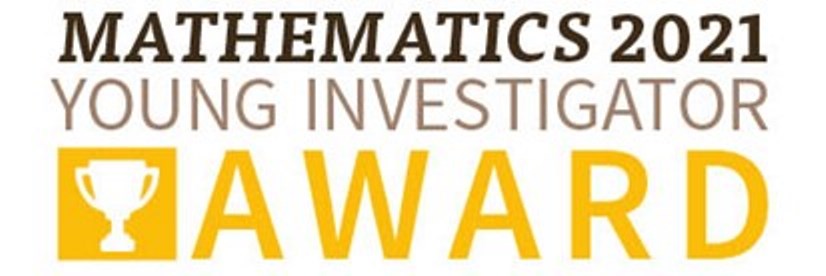
We are pleased to announce that Mathematics (ISSN: 2227-7390) is now inviting nominations for the Mathematics 2021 Young Investigator Award. This prize will be given to one young investigator in recognition of their excellence in the field of mathematics. All nominations will be assessed by an Award Committee of Mathematics.
Prizes for Winners:
- CHF 2000 (Swiss Francs);
- Option to publish one paper free of charge in Mathematics after peer review before the end of 2022;
- An engraved plaque.
Nomination Deadline:
- 30 April 2022
Candidates Are Required to:
- Hold a Ph.D. degree and be below 35 years of age prior to 31 December 2020;
- Have ground-breaking research and a significant contribution to the advancement of mathematics;
- Be nominated by senior researchers, research directors, or department heads.
List of Documents for Nomination:
- Detailed Curriculum Vitae including an updated publication list and a list of the researcher’s own research grants;
- Birth certificate or other proof of age;
- Scanned copy of doctorate certificate;
- Signed nomination letters from two established senior scientists.
If you or anyone you know are qualified for the Award, do not miss the chance to apply.
Find more details and apply for the Award at:
22 November 2021
722 MDPI Editorial Board Members Receiving "2021 Highly Cited Researchers" Distinction
It is our great honor to congratulate the Editorial Board Members and Editors in MDPI's journals who have been distinguished as 2021 Highly Cited Researchers by Clarivate, according to Web of Science data. We herewith express our gratitude for the immense impact the named researchers continue to make on scientific progress and on our journals' development.
Clarivate's annual list of Highly Cited ResearchersTM identifies the most highly cited scientists for the past decade. Their impactful papers are among the top 1 per cent in the citation distribution of one or more of 22 fields analyzed in the "Essential Science Indicators", distinguishing them as hugely influential among their peers.
| Abate, Antonio Abatzoglou, John T. Abbaszadeh, Mostafa Acharya, U. Rajendra Acharya, Viral V. Agarwal, Ravi P. Ahn, Myung-Ju Airoldi, Laura Ali, Imran Allakhverdiev, Suleyman I. Aluko, Rotimi E. Anasori, Babak Andersson, Dan I. Andes, David Anker, Stefan D. Apergis, Nicholas Ariga, Katsuhiko Arqub, Omar Abu Aschner, Michael Assaraf, Yehuda G. Astruc, Didier Atala, Anthony Atanasov, Atanas G. Atangana, Abdon Bahram, Mohammad Bakris, George L. Balandin, Alexander A. Baleanu, Dumitru Balsamo, Gianpaolo Bando, Yoshio Banks, William A. Bansal-Travers, Maansi Barba, Francisco J. Barros, Lillian Basit, Abdul W. Baskonus, Haci Mehmet Bassetti, Matteo Battino, Maurizio Bell, Jordana T. Bellomo, Nicola Benediktsson, Jon Atli Benelli, Giovanni Benjakul, Soottawat Bhatnagar, Amit Biddle, Stuart J. H. Biondi, Antonio Biondi-Zoccai, Giuseppe Bjarnsholt, Thomas Blaabjerg, Frede Blaschke, Thomas Blay, Jean-Yves Blumwald, Eduardo Blunt, John W. Boffetta, Paolo Bogers, Marcel Bonomo, Robert A. Bowman, David M.J.S. Boyer, Cyrille Brestic, Marian Brevik, Eric C. Buhalis, Dimitrios Burdick, Jason A. Byrd, John C. Cabeza, Luisa F. Cai, Xingjuan Cai, Jianchao Calhoun, Vince D. Calin, George Cao, Jinde Cao, Guozhong Carvalho, Andre F. Castellanos-Gomez, Andres Cerqueira, Miguel Ângelo Parente Ribeiro Chang, Jo-Shu Chang, Chih-Hao Chastin, Sebastien Chau, Kwok-wing Chemat, Farid Chen, Xiaobo Chen, YangQuan Chen, Jianmin Chen, Chaoji Chen, Min Chen, Qi Chen, Jun Chen, Xi Chen, Peng Chen, Yulin Chen, Bo Chen, Chen Chen, Zhi-Gang Chen, Wei-Hsin Chen, Gang Chen, Yongsheng Chen, Xiang Chen, Yimin Chen, Runsheng Chen, Lidong Chen, Shaowei Chen, Qian Chen, Yu Chen, Shuangming Chiclana, Francisco Cho, Sun Young Choi, Wonyong Chowdhary, Anuradha Choyke, Peter L. Cichocki, Andrzej Corella, Dolores Corma, Avelino Cortes, Javier Cortes, Jorge Costanza, Robert Crommie, Michael F. Cui, Yi Cui, Haiying Cui, Qinghua Cummings, Kenneth Michael Dai, Shifeng Dai, Sheng Daiber, Andreas Davis, Steven J. Dawson, Ted M. de la Fuente-Nunez, Cesar Decker, Eric Andrew Dekel, Avishai Demaria, Marco Deng, Yong Deng, Xiangzheng DePinho, Ronald A. Desneux, Nicolas Dimopoulos, Meletios-Athanasios Ding, Aijun Dionysiou, Dionysios D. Dokmeci, Mehmet Remzi Dolgui, Alexandre Dong, Fan Dou, Shi Xue Dou, Letian Du, Qian Du, Bo Dube, Shanta Rishi Dufresne, Alain Dummer, Reinhard Dupont, Didier Edwards, David Elaissari, Abdelhamid Elhoseny, Mohamed Ellahi, Rahmat Ellis, Erle C. ElMasry, Gamal Esteller, Manel Estévez, Mario Fabbro, Doriano Facchetti, Antonio Fan, Zhanxi Fang, Chuanglin Fasano, Alessio Fečkan, Michal Felser, Claudia Feng, Liangzhu Fensholt, Rasmus Ferdinandy, Péter Fernandez-Lafuente, Roberto Ferreira, Isabel C. F. R. Filippi, Massimo Fisher, Helen Fortino, Giancarlo Fosso Wamba, Samuel Franceschi, Claudio Fujita, Hamido Fujita, Masayuki Gai, Francesco Gaisford, Simon Galanakis, Charis M. Galluzzi, Lorenzo Galvano, Fabio Gan, Ren-You Gan, Lihua Gandomi, Amir H. Gao, Bin Gao, Feng Gao, Minrui Gao, Huijun Gao, Wei Gao, Huile Garbe, Claus Garcia, Hermenegildo Gasbarrini, Antonio Gasco, Laura Gautret, Philippe Geng, Yong Gerdts, Gunnar Geschwind, Daniel H. Ghadimi, Noradin Ghaffari, Roozbeh Ghamisi, Pedram Giampieri, Francesca Glick, Bernard R. Gnant, Michael Goel, Ajay Gogotsi, Yury Goldewijk, Kees Klein Gong, Jinlong Gong, Yongji Govindan, Kannan Granato, Daniel Grancini, Giulia Green, Douglas R. Grosso, Giuseppe Gu, Ke Guan, Cao Guastella, Adam J. Guerrero, Josep M. Gui, Guan Guizani, Mohsen Guo, Zaiping Gupta, Rangan Gutzmer, Ralf Haase, Dagmar Habibi-Yangjeh, Aziz Hagemann, Stefan Hagger, Martin Hamblin, Michael R. Hammoudeh, Shawkat Han, Heesup Hanes, Justin Harrison, Roy M. Hartung, Hans-Peter Hasanuzzaman, Mirza He, Jr-Hau He, Hongwen He, Jiaqing He, Debiao Henseler, Jörg Herrera, Francisco Herrera-Viedma, Enrique Hetz, Claudio Ho Kim, Jung Holmes, Elaine Hossain, Ekram Hsueh, Po-Ren Hu, Xiaosong Hu, Wenbin Huang, Jianping Huang, Hongwei Huang, Yu Huang, Jianying Huang, Peng Huang, Baibiao Huang, Shaoming Hubacek, Klaus |
Iqbal, Hafiz M. N. |
Saad, Fred |
The full list of 2021 Highly Cited Researchers can be accessed at the following webpage in the Web of ScienceTM https://recognition.webofscience.com/awards/highly-cited/2021/.
--- Highly Cited Researchers (HCR) is a Clarivate product.
16 November 2021
Topical Advisory Panel Established to Support Editorial Board
Academic editors play a crucial role in leading our journals and ensuring that each article undergoes a robust and timely peer-review. With the launch of Topics this year and addition of Topic Editors to our family of academic editors, we decided it would be a good time to restructure our academic boards, thus providing more clarity and support for each role. MDPI is pleased to announce the launch of a new position—Topical Advisory Panel Member, that will replace the previous position of Topics Board Member. The Topical Advisory Panel will be comprised of early career researchers eager to gain experience in editorial work.
The main responsibility of the new members of the Topical Advisory Panel is to regularly provide support to Guest Editors, Topic Editors, and Section Board Members. The responsibilities of the Topical Advisory Panel are available here: https://www.mdpi.com/editors.
Each year, the members’ performances are evaluated, and outstanding members are promoted to the Editorial Board by the Editor-in-Chief.
To qualify as a Topical Advisory Panel Member, applicants must:
- Have expertise and experience in the field related to the journal;
- Have received a Ph.D. in the last 10 years, approximately;
- Have at least 6-8 published papers in the last 5 years as first author or corresponding author;
- Currently hold an independent research position in academia or a government institute.
If you are interested in this role, please contact the editorial office by email.
We look forward to hearing from you soon.
25 October 2021
Open Access Week 2021 | It Matters How We Open Knowledge: Building Structural Equity, 25–31 October

Founded in 1996, MDPI was one of the first fully Open Access publisher. Over 25 years MDPI has grown to become the largest Open Access publisher globally, publishing over 160,000 articles across more than 350 journals in 2020. At the core, MDPI was founded in response to a pressing need of fast publication and inclusion. The scholar was set at the centre of the publication process for the first time. Acting as a service provider, rather than a product provider, MDPI exists to help scientists achive their objective to disseminate research results. At MDPI, we believe scientists deserve a better service from the publishing world.
The International Open Access Week (Open Access Week), founded by the SPARC (the Scholarly Publishing and Academic Resources Coalition) Alliance and student partners in 2008, has been successfully running for 13 years. As an advocate and pioneer of open access publishing, MDPI actively responds to the call of International Open Access Week. This year’s theme of “It Matters How We Open Knowledge: Building Structural Equity” highlights the Recommendation’s call for equitable participation from all authors and readers.
For the last 25 years, MDPI has been committed to disseminating open research. Here is a video showing MDPI’s Commitment to Equity, Inclusion and Diversity for More than 25 Years.
International Open Access Week is an important opportunity to catalyze new conversations, create connections across and between communities that can facilitate this co-design, and advance progress in the building of more equitable foundations for opening knowledge—discussions and actions that need to be continued, year in and year out. MDPI has always aimed to provide professional and efficient publishing services to scholars around the world.
Our mission is to make scientific research accessible to everyone; this year, we interview and hold discussions with open science ambassadors on how to build an equal and inclusive environment for open science. Academic editors help us collaborate with more institutions to advocate for open access ideas.
Besides this, our scientific community is a key driver of our success and MDPI’s remarkable growth. Despite the pandemic, we have prepared online conferences and workshops to gather scholars from different communities.
The Basel Sustainable Publishing online forum provides an equal opportunity for stakeholders and researchers from multi-cultural environments to exchange ideas and eliminate barriers to participation.
Conference date: 25 October 2021, online
Conference website: https://bspf2021.sciforum.net/
Main topics: MDPI discusses the current dilemma of open access science from various perspectives such as governments, libraries, and publishers, and related measures on how to change the status quo of discrimination from a global perspective.
We aim to support equality, inclusion, diversity, and accessibility in scholarly communications. We collaborate with universities and key laboratories and have scholarly communications with researchers, teachers, and students on open access workshops.

- 25 October 2021
Energies journal and Institute of Mechanics, Chinese Academy of Sciences
- 28 October 2021
Machines journal and State Key Laboratory of Traction Power, Southwest Jiaotong University
- 29 October 2021
Processes journal and Beijing Institute of Technology
- 29 October 2021
Coatings journal and Wuhan University of Technology
MDPI is committed to providing open access and high-quality publishing services for scholars and promoting rapid dissemination of academic achievements. We hope to promote the practices and policies of open access publishing and diversify the dissemination of academic achievements.
5 October 2021
Nobel Prize in Physics 2021 Jointly Awarded to Three Scientists for Shedding Light on Anthropogenic Climate Change and Other Complex Phenomena
The Nobel Prize in Physics 2021 was awarded to Syukuro Manabe, Klaus Hasselmann and Giorgio Parisi. One half of the prize was awarded jointly to Professor Manabe and Professor Hasselmann for the physical modelling of Earth’s climate, quantifying variability and reliably predicting global warming, according to the Nobel Prize committee, while the other half of the prize went to Professor Parisi for the discovery of the interplay of disorder and fluctuations in physical systems from atomic to planetary scales. The three physicists contributed to the understanding of chaotic and apparently random phenomena.
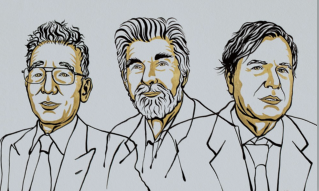
Manabe, Hasselmann, Parisi (from left to right) © Nobel Media
"The discoveries being recognised this year demonstrate that our knowledge about the climate rests on a solid scientific foundation, based on a rigorous analysis of observations. This year’s Laureates have all contributed to us gaining deeper insight into the properties and evolution of complex physical systems", said Thors Hans Hansson, chair of the Nobel Committee for Physics.
Manabe and Hasselman laid the foundations for the climate models used by scientists today. They were among the first to distinguish between climate phenomena on the one hand and random occurrences of the weather on the other hand, and to assess the impact of human activities on the climate from the beginning of the 20th century.
Parisi's novel studies involved identifying hidden patterns in disordered complex materials called spin glasses, a special type of metal alloy in which iron atoms, for example, are randomly mixed into a grid of copper atoms. He constructed a mathematical description of the apparently random behavior of spins. His findings not only impacted physics, but also mathematics, biology, neuroscience and machine learning, because these felds include problems which are related to so-called geometrical frustration.
We send our congratulations to the Nobel Laureates, especially to Giorgio Parisi, who was a one-time author in Entropy (with Juan J. Ruiz-Lorenzo et al.): “Spin Glasses in a Field Show a Phase Transition Varying the Distance among Real Replicas (and How to Exploit It to Find the Critical Line in a Field)”.
23 September 2021
2020 MDPI Top Reviewer Award—Winners Announced

Rigorous peer-review is the cornerstone of high-quality academic publishing. Over 369,916 scholars served as reviewers for MDPI journals in 2020. We are extremely appreciative of all those who made a contribution to the editorial process in this capacity. At the beginning of every year, journal editorial offices publish a list of all reviewers’ names to express our gratitude. In addition, this year, the MDPI Top Reviewer Award was announced, to recognize the very best reviewers for their expertise and dedication, and their high-quality, and timely review reports. We are pleased to announce the following winners of the 2020 MDPI Top Reviewer Award:
- Adriana Burlea-Schiopoiu;
- Alban Kuriqi;
- Álvaro González-Vila;
- Alessandro Alaimo;
- Alexey Beskopylny;
- Alexander Yu Churyumov;
- Alberto Fernández-Isabel;
- Andrea Mastinu;
- Antonios N. Papadopoulos;
- Anton Rassõlkin;
- Antonio Humberto Hamad Minervino;
- Arkadiusz Matwijczuk;
- Artur Słomka;
- Baojie He;
- Bartłomiej Potaniec;
- Bojan Đurin;
- Camilo Arturo Rodriguez Diaz;
- Carmelo Maria Musarella;
- Chiachung Chen;
- Chiman Kwan;
- Cristian Busu;
- Danil Pimenov;
- Dan-Cristian Dabija;
- Delfín Ortega-Sánchez;
- Demetrio Antonio Zema;
- Denis Butusov;
- Elena Lucchi;
- Gaurab Dutta;
- Livia Anastasiu;
- M. R. Safaei.
For more information about how to become a reviewer of MDPI journals, please see: www.mdpi.com/reviewers.
22 September 2021
MDPI Joins SDG Publishers Compact

UN's 17 Sustainable Development Goals (SDGs) are the blueprint to achieve a better and more sustainable future for all. In 2020 the SDG Publishers Compact was launched, aimed to inspire publishers and accelerate progress to achieve the 17 goals by 2030. Members of the programme are committed to support the publication of materials that will promote and inspire actions towards SDGs.
MDPI is an eager advocate of SDGs and has already been supporting the programme by creating Special Issues and publishing a series of books on SDGs prior to joining the Compact in 2021. MDPI's Sustainability Foundation initiated the World Sustainability Awards in 2016. We fully support UN's goals to promote sustainable actions that make the world a better place for all and, as part of its commitment, we will focus our actions on SDG10: Reduced Inequalities whilst promoting all 17 SDGs. For more details, please visit the programme’s website: https://www.un.org/sustainabledevelopment/sdg-publishers-compact/.
Joining this initiative was a unanimous decision. MDPI has in its core values the dissemination of science for all, breaking the wall between research access and under-represented members of the scientific community and the general population. To support this initiative further and continue to support under-represented scientists, MDPI will take a series of actions that will be announced once ready.
The first action MDPI takes is to nominate Dr. Liliane Auwerter as the coordinator of the programme. Dr. Auwerter studied Environmental Process Technology (UTFPR, Brazil), obtained her MSc degree in Water and Environmental Engineering (University of Surrey, UK) and in 2020 completed her PhD in self-healing low-friction materials for water transport (Imperial College London, UK), always focusing on diverse scientific projects that would potentially bring sustainability to industrial processes. As a student in Brazil, she engaged in volunteering activities focused on environmental education and took part in the Millennial Development Goals meetings held at the university.
For more information, please contact:
Dr. Liliane Auwerter
Scientific Officer
liliane.auwerter@mdpi.com
7 August 2021
Mathematics Webinar | Partial Differential Equations with Nonnegative Characteristic Form, 20 October 2021
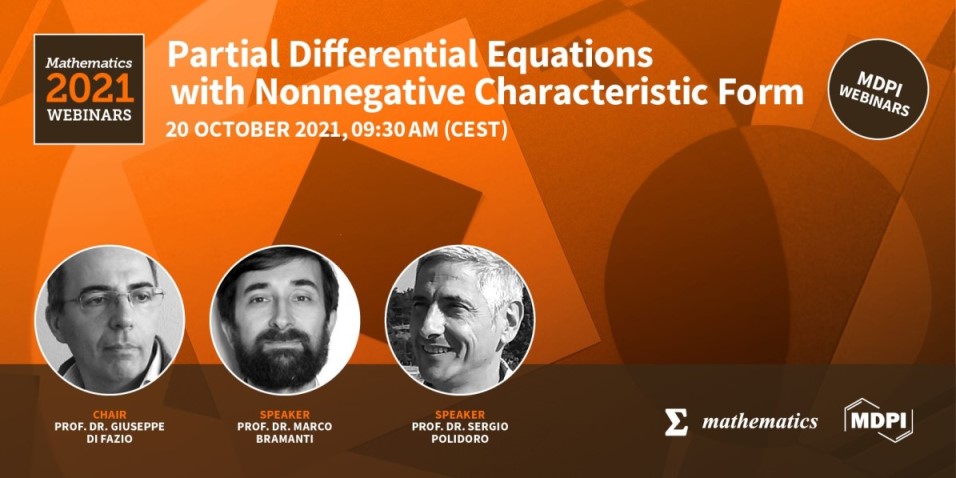
Second order partial differential equations (PDEs) with nonnegative characteristic form appear to be ubiquitous in mathematics, e.g., in differential geometry, stochastic theory, and in many applications of mathematics, e.g., kinetic theory and finance. Important special cases of such operators are those satisfying Hormander's condition. They enjoy regularity properties related to the suitable geometric structure of the underlying space. The more we know about geometric structures, the better for regularity results, bounds, and asymptotic estimates. The goal of the webinar is to show recent results and advances in the field of PDEs. We believe that the mathematical community will benefit from the webinar.
Date: 20 October 2021
Time: 9:30 am CEST | 3:30 am EDT | 3:30 pm CST Asia
Webinar ID: 897 5522 0962
Webinar website: https://mathematics-1.sciforum.net/
Register for free here:
Program
|
Speaker/Presentation |
Time in CEST |
|
Prof. Dr. Giuseppe Di Fazio Heat Kernel Gaussian Estimates and Harnack Inequality in the Euclidean Setting |
9:30 - 9:50 am |
|
Prof. Dr. Marco Bramanti Heat Kernels for Sum of Squares of Homogeneous Hörmander Vector Fields |
9:50 - 10:35 am |
|
Question Time |
10:35 - 10:40 am |
|
Prof. Dr. Sergio Polidoro Asymptotic Estimates for Hörmander's Operators with Drift |
10:40 - 11:25 am |
|
Question Time |
11:25 - 11:30 am |
|
Closing of Webinar |
11:30 am |
Chair
|
|
Prof. Dr. Giuseppe Di Fazio Department of Mathematics and Computer Sciences, University of Catania, Italy |
Invited Speakers
|
|
Prof. Dr. Marco Bramanti Department of Mathematics, Polytechnic University of Milan, Italy |
|
|
Prof. Dr. Sergio Polidoro Department of Physics, Informatics and Mathematics, University of Modena and Reggio Emilia, Italy |
For any questions about the webinar, please send an email to: mathematics.webinar@mdpi.com.
3 August 2021
Announcement on Japanese Consumption Tax (JCT)
This serves to announce to our valued authors based in Japan that value-added tax, or consumption tax will now be imposed on article processing fees and other service fees for all papers submitted, or resubmitted (assigned new paper IDs), effective from 15 August 2021. The change is in accordance with the Japanese "Act for Partial Revision of the Income Tax Act and Other Acts" (Act No. 9 of 2015), which includes a revision of consumption taxation on cross-border supplies of services such as digital content distribution.
For additional information from the National Tax Agency please see here ("Cross-border supplies of electronic services").
Contact: Setsuko Nishihara, MDPI Tokyo
30 June 2021
2020 Impact Factors - Released
The 2020 citation metrics have been officially released in the Journal Citation Reports (JCR)!
We are pleased to announce that 85 MDPI journals are included, of which:
- 10 journals received their first impact factor
- 96% of journals increased their impact factor from 2019
- 32 journals (38%) ranked among the top 25% of journals, in at least one category
| Journal | Impact Factor | Rank | Category |
| Cancers | 6.639 | Q1 | • Oncology |
| Cells | 6.600 | Q2 | • Cell Biology |
| Pharmaceutics | 6.321 | Q1 | • Pharmacology & Pharmacy |
| Antioxidants | 6.313 | Q1 | • Food Science & Technology |
| • Biochemistry & Molecular Biology | |||
| • Chemistry, Medicinal | |||
| Biomedicines | 6.081 | Q1 | • Medicine, Research & Experimental |
| • Pharmacology & Pharmacy | |||
| • Biochemistry & Molecular Biology | |||
| International Journal of Molecular Sciences | 5.924 | Q1 | • Biochemistry & Molecular Biology |
| Q2 | • Chemistry, Multidisciplinary | ||
| Pharmaceuticals | 5.863 | Q1 | • Pharmacology & Pharmacy |
| • Chemistry, Medicinal | |||
| Journal of Fungi | 5.816 | Q1 | • Mycology |
| • Microbiology | |||
| Nutrients | 5.719 | Q1 | • Nutrition & Dietetics |
| Biosensors | 5.519 | Q1 | • Chemistry, Analytical |
| • Instruments & Instrumentation | |||
| Q2 | • Nanoscience & Nanotechnology | ||
| Marine Drugs | 5.118 | Q1 | • Chemistry, Medicinal |
| • Pharmacology & Pharmacy | |||
| Biology | 5.079 | Q1 | • Biology |
| Nanomaterials | 5.076 | Q1 | • Physics, Applied |
| Q2 | • Chemistry, Multidisciplinary | ||
| • Materials Science, Multidisciplinary | |||
| • Nanoscience & Nanotechnology | |||
| Viruses | 5.048 | Q2 | • Virology |
| Journal of Personalized Medicine | 4.945 | Q1 | • Medicine, General & Internal |
| • Health Care Sciences & Services | |||
| Metabolites | 4.932 | Q2 | • Biochemistry & Molecular Biology |
| Biomolecules | 4.879 | Q2 | • Biochemistry & Molecular Biology |
| Remote Sensing | 4.848 | Q1 | • Geosciences, Multidisciplinary |
| Q2 | • Remote Sensing | ||
| • Imaging Science & Photographic Technology | |||
| • Environmental Sciences | |||
| Gels * | 4.702 | Q1 | • Polymer Science |
| Antibiotics | 4.639 | Q2 | • Infectious Diseases |
| • Pharmacology & Pharmacy | |||
| Toxins | 4.546 | Q1 | • Toxicology |
| • Food Science & Technology | |||
| Vaccines | 4.422 | Q2 | • Immunology |
| • Medicine, Research & Experimental | |||
| Molecules | 4.412 | Q2 | • Chemistry, Multidisciplinary |
| • Biochemistry & Molecular Biology | |||
| Foods | 4.350 | Q2 | • Food Science & Technology |
| Polymers | 4.329 | Q1 | • Polymer Science |
| Journal of Clinical Medicine | 4.242 | Q1 | • Medicine, General & Internal |
| Toxics | 4.146 | Q2 | • Toxicology |
| • Environmental Sciences | |||
| Catalysts | 4.146 | Q2 | • Chemistry, Physical |
| Microorganisms | 4.128 | Q2 | • Microbiology |
| Membranes | 4.106 | Q1 | • Polymer Science |
| Q2 | • Engineering, Chemical | ||
| • Materials Science, Multidisciplinary | |||
| • Chemistry, Physical | |||
| Genes | 4.096 | Q2 | • Genetics & Heredity |
| Fermentation * | 3.975 | Q2 | • Biotechnology & Applied Microbiology |
| Journal of Cardiovascular Development and Disease * | 3.948 | Q2 | • Cardiac & Cardiovascular Systems |
| Plants | 3.935 | Q1 | • Plant Sciences |
| Life | 3.817 | Q2 | • Biology |
| Diagnostics | 3.706 | Q2 | • Medicine, General & Internal |
| Current Oncology | 3.677 | Q3 | • Oncology |
| Materials | 3.623 | Q1 | • Metallurgy & Metallurgical Engineering |
| Q2 | • Materials Science, Multidisciplinary | ||
| • Chemistry, Physical | |||
| • Physics, Applied | |||
| • Physics, Condensed Matter | |||
| Sensors | 3.576 | Q1 | • Instruments & Instrumentation |
| Q2 | • Chemistry, Analytical | ||
| • Engineering, Electrical & Electronic | |||
| Pathogens | 3.492 | Q2 | • Microbiology |
| Agronomy | 3.417 | Q1 | • Agronomy |
| • Plant Sciences | |||
| Chemosensors | 3.398 | Q2 | • Instruments & Instrumentation |
| • Chemistry, Analytical | |||
| Q3 | • Electrochemistry | ||
| Land | 3.398 | Q2 | • Environmental Studies |
| Brain Sciences | 3.394 | Q3 | • Neurosciences |
| International Journal of Environmental Research and Public Health | 3.390 | Q1 | • Public, Environmental & Occupational Health (SSCI) |
| Q2 | • Public, Environmental & Occupational Health (SCIE) | ||
| • Environmental Sciences (SCIE) | |||
| Tomography | 3.358 | Q2 | • Radiology, Nuclear Medicine & Medical Imaging |
| Fractal and Fractional * | 3.313 | Q1 | • Mathematics, Interdisciplinary Applications |
| Sustainability | 3.251 | Q2 | • Environmental Sciences (SCIE) |
| • Environmental Studies (SSCI) | |||
| Q3 | • Green & Sustainable Science & Technology (SCIE) | ||
| • Green & Sustainable Science & Technology (SSCI) | |||
| Water | 3.103 | Q2 | • Water Resources |
| • Environmental Sciences | |||
| Journal of Theoretical and Applied Electronic Commerce Research | 3.049 | Q3 | • Business |
| Energies | 3.004 | Q3 | • Energy & Fuels |
| Agriculture | 2.925 | Q1 | • Agronomy |
| ISPRS International Journal of Geo-Information | 2.899 | Q2 | • Geography, Physical |
| • Computer Science, Information Systems | |||
| Q3 | • Remote Sensing | ||
| Micromachines | 2.891 | Q2 | • Instruments & Instrumentation |
| • Physics, Applied | |||
| Q3 | • Chemistry, Analytical | ||
| • Nanoscience & Nanotechnology | |||
| Coatings | 2.881 | Q2 | • Materials Science, Coatings & Films |
| • Physics, Applied | |||
| Q3 | • Materials Science, Multidisciplinary | ||
| Children | 2.863 | Q2 | • Pediatrics |
| Processes | 2.847 | Q3 | • Engineering, Chemical |
| Separations | 2.777 | Q3 | • Chemistry, Analytical |
| Insects | 2.769 | Q1 | • Entomology |
| Animals | 2.752 | Q1 | • Agriculture, Dairy & Animal Science |
| • Veterinary Sciences | |||
| Symmetry | 2.713 | Q2 | • Multidisciplinary Sciences |
| Atmosphere | 2.686 | Q3 | • Meteorology & Atmospheric Sciences |
| • Environmental Sciences | |||
| Applied Sciences | 2.679 | Q2 | • Engineering, Multidisciplinary |
| • Physics, Applied | |||
| Q3 | • Chemistry, Multidisciplinary | ||
| • Materials Science, Multidisciplinary | |||
| Photonics | 2.676 | Q2 | • Optics |
| Buildings * | 2.648 | Q2 | • Construction & Building Technology |
| • Engineering, Civil | |||
| Healthcare | 2.645 | Q2 | • Health Policy & Services (SSCI) |
| Q3 | • Health Care Sciences & Services (SCIE) | ||
| Minerals | 2.644 | Q2 | • Mining & Mineral Processing |
| • Mineralogy | |||
| • Geochemistry & Geophysics | |||
| Forests | 2.634 | Q1 | • Forestry |
| Crystals | 2.589 | Q2 | • Crystallography |
| Q3 | • Materials Science, Multidisciplinary | ||
| Entropy | 2.524 | Q2 | • Physics, Multidisciplinary |
| Diversity | 2.465 | Q2 | • Biodiversity Conservation |
| Q3 | • Ecology | ||
| Journal of Marine Science and Engineering | 2.458 | Q2 | • Oceanography |
| • Engineering, Marine | |||
| • Engineering, Ocean | |||
| Medicina | 2.430 | Q2 | • Medicine, General & Internal |
| Machines * | 2.428 | Q2 | • Engineering, Mechanical |
| Q3 | • Engineering, Electrical & Electronic | ||
| Electronics | 2.397 | Q3 | • Engineering, Electrical & Electronic |
| • Computer Science, Information Systems | |||
| • Physics, Applied | |||
| Fishes * | 2.385 | Q2 | • Fisheries |
| • Marine & Freshwater Biology | |||
| Metals | 2.351 | Q2 | • Metallurgy & Metallurgical Engineering |
| Q3 | • Materials Science, Multidisciplinary | ||
| Horticulturae * | 2.331 | Q1 | • Horticulture |
| Veterinary Sciences * | 2.304 | Q1 | • Veterinary Sciences |
| Universe | 2.278 | Q3 | • Physics, Particles & Fields |
| • Astronomy & Astrophysics | |||
| Mathematics | 2.258 | Q1 | • Mathematics |
| Magnetochemistry | 2.193 | Q3 | • Chemistry, Inorganic & Nuclear |
| • Chemistry, Physical | |||
| • Materials Science, Multidisciplinary | |||
| Current Issues in Molecular Biology | 2.081 | Q4 | • Biochemistry & Molecular Biology |
| Actuators | 1.994 | Q3 | • Instruments & Instrumentation |
| • Engineering, Mechanical | |||
| Aerospace * | 1.659 | Q2 | • Engineering, Aerospace |
* Journals given their first Impact Factor in 2021
Source: 2020 Journal Impact Factors, Journal Citation Reports ® (Clarivate, 2021)
30 June 2021
Mathematics Receives Updated CiteScore of 2.2
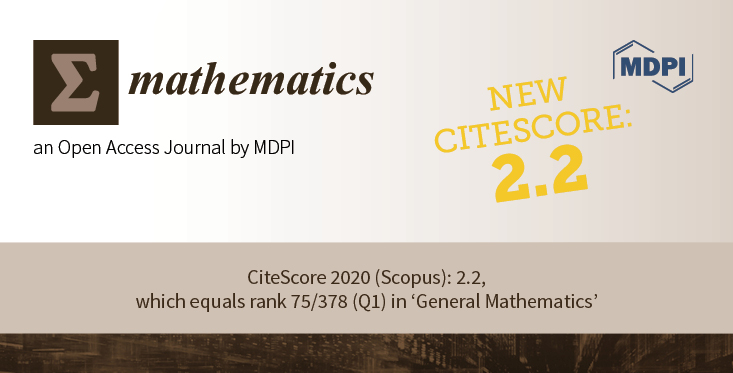
We are pleased to report that the CiteScore of Mathematics has increased to 2.2 (from 1.4). It now ranks: 75/378 (Q1) in "General Mathematics", 28/69 (Q2) in "Computer Science", and 33/77 (Q2) in "Engineering". For full details of the current CiteScore release, please refer to the Source page (https://www.scopus.com/sourceid/21100830702).
We would like to extend our sincerest gratitude to all the authors, editors, and reviewers for their great contributions. We are grateful for their excellent work that has helped us to obtain this achievement for Mathematics!
Read more and submit at https://www.mdpi.com/journal/mathematics.
29 April 2021
Prof. Dr. Daniele Mortari Appointed Section Editor-in-Chief of “Functional Interpolation” in Mathematics
We are pleased to announce that, as of 13th January 2021, Prof. Dr. Daniele Mortari has been appointed as the Editorial-in-Chief for the new Section “Functional Interpolation” of Mathematics.
Dr. Daniele Mortari is a Professor of Aerospace Engineering at Texas A&M University. In addition, he has taught at the School of Aerospace Engineering of Rome’s University and at Electronic Engineering of Perugia’s University, both in Italy. He received his doctorate degree in Nuclear Engineering from University of Rome “La Sapienza”, in 1982. He has published more than 350 papers, holds a U.S. patent, and has been widely recognized for his work, including receiving the Best Paper Award from AAS/AIAA, three NASA Awards, the 2003 Spacecraft Technology Center Award, the 2007 IEEE Judith A. Resnik Award, and the 2016 AAS Dirk Brouwer Award. He is a Member of the International Academy of Astronautics, IEEE and AAS Fellow, an AIAA Associate Fellow, an Honorary Member of the IEEE-AESS Space System Technical Panel, and a former IEEE Distinguish Speaker.
We warmly welcome Prof. Dr. Daniele Mortari in taking up his role as Section Editor-in-Chief, and we look forward to him leading Mathematics to achieving many more milestones.
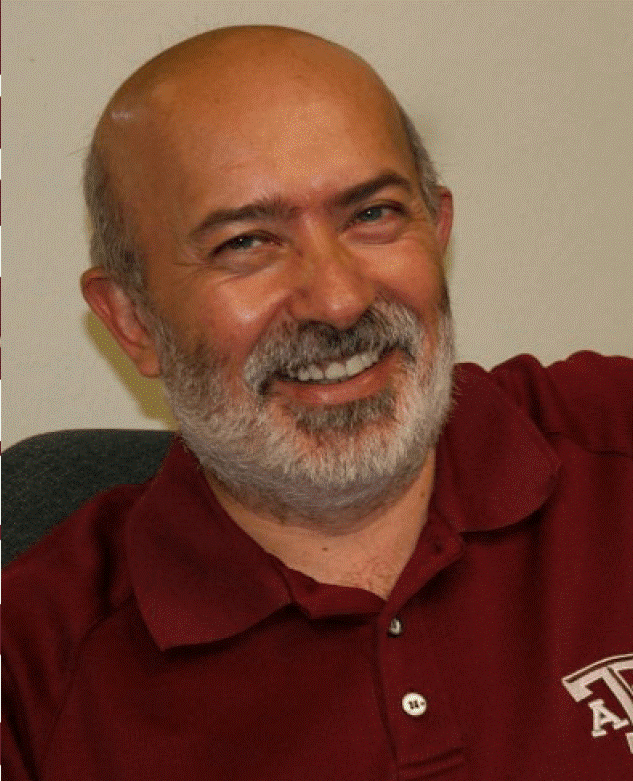 |
Name: Dr. Daniele Mortari E-mail: mortari@tamu.edu Affiliation: Aerospace Engineering, Texas A&M University Research Interest: spacecraft attitude and position estimation; satellite constellation design; sensor data processing; various topics in linear algebra and numerical algorithms Homepage: https://mortari.tamu.edu/ |
28 April 2021
Book Builder—Compile a Customized E-Book from Your Favorite MDPI Open Access Content
MDPI Books recently released Book Builder, a new online tool to conveniently arrange, design and produce an eBook from any content published in MDPI journals. Book Builder offers two functions: on the one hand (1) Selections, available to every registered user of MDPI; on the other hand (2) Special Issue Reprints, which can be used exclusively by Guest Editors of Special Issues.
Selections
In just a matter of a few clicks, all users are now able to assemble books from MDPI articles and receive instantaneous feedback in the form of a fully produced and compiled book (PDF), which can be downloaded or ordered as print copy. Selections can include any paper published with MDPI, picking and combining content from different journals and special issues.
This way, the user may for example choose to compile an ebook focusing around a particular topic, or assemble articles from a group of others.
We invite you to make yourself familiar with the new tool! The Book Builder can be found here: https://www.mdpi.com/books/book_builder.
Special Issue Reprints
The Book Builder allows Guest Editors of MDPI journals to create a reprint from a successfully completed Special Issue or Topical Collection in book format. If you are a Guest Editor for an MDPI journal, you can use the new tool to create an PDF document which includes all articles published in the Special Issue as well as a book cover and table of contents.
For Special Issues containing a minimum of 5 articles, the Guest Editor can request its publication on the MDPI Book platform. Published reprints are assigned an ISBN and DOI.
In addition to the PDF copy of the Reprint Book, as a token of our gratitude, MDPI offers every Guest Editor one (1) complimentary print copy (via print-on-demand). All contributors benefit from a discount on orders of any additional print copies, to share with colleagues or libraries or others.
In line with our organization's values, MDPI Books publishes all content in open access, promoting the exchange of ideas and knowledge in a globalized world. MDPI Books encompasses all the benefits of open access—high availability and visibility, as well as wide and rapid dissemination. MDPI Books are distributed under the terms and conditions of the Creative Commons Attribution License, meaning as an author you retain the copyright for your work. In addition, with MDPI Books you can complement the digital version of your work with a high-quality printed counterpart.
If you are interested in editing a book volume or series, or have a monograph manuscript to be considered for publication, please submit your proposal online and look at our Information for Authors.
Contact: Laura Wagner, MDPI Books Manager (email)
15 April 2021
MDPI Celebrates Company Milestone With 25th Anniversary Page
"We exist to help scientists achieve their own objectives"

In June of this year, MDPI will celebrate the 25th anniversary of its foundation. To mark this significant milestone, we have created a 25th Anniversary page on our website that evokes the development of our company over the past quarter-century.
MDPI has been a pioneer of Open Access publishing ever since the concept was first created.
In a wide-ranging interview, our CEO Delia Mihaila reflects on the company’s 25th anniversary and its contribution to the world of scientific publishing.
Delia considers how MDPI has evolved since starting life in 1996 as a visionary ‘project’ run out of an apartment in Basel, Switzerland, by Dr. Shu-Kun Lin. A chemist who was passionate about the long-term preservation of rare chemical sample, Dr. Lin was determined to help scholars publish their findings as quickly as possible and make their research results available to as wide a readership as possible worldwide. That determination remains unchanged 25 years later.
Today, MDPI is an international organization with over 4,000 employees based on three continents and in ten countries, and ranks among the world's top four academic publishers.
MDPI's mission is to accelerate access to new scientific research, delivering insight faster for researchers worldwide. Read more here about the company's remarkable success story and what the Open Access publishing model can offer the global scientific community.
10 March 2021
Journal Selector: Helping to Find the Right MDPI Journal for Your Article
At MDPI, we strive to make your online publication process seamless and efficient. To achieve this, our team is continuously developing tools and features to make the user experience useful and convenient.
As the number of academic papers continues to grow, so does the need to analyze and work with them on a large scale. This prompted us to design a new feature aimed at helping researchers find journals that are relevant to their publication by matching their abstract topic. In this regard, we designed a similarity model that automatically identifies the most suitable academic journals for your paper.
We are pleased to introduce Journal Selector, a new feature that measures similarity in academic contexts. By simply entering the title and/or abstract into our Journal Selector, the author will see a list of the most related scientific journals published by MDPI. This method helps authors select the correct journals for their papers, highlighting the time of publication and citability.
The methodology is known as representation learning, where words are represented as vectors in hyperspace. Representation helps us differentiate between different concepts within articles, and in turn, helps us identify similarities between them.
We used an advanced machine learning model to better capture the semantic meanings of words. This helps the algorithm make better predictions by leveraging scientific text representation. In turn, this ensures high precision, helping authors decide which journal they should submit their paper to.
The goal is to support authors to publish their work in the most suitable journal for their research, as fast as possible, accelerating their career progress.
Contact: Andrea Perlato, Head of Data Analytics, MDPI (email)
24 December 2020
Mathematics Has Become a Semimonthly Publication
We are pleased to announce that Mathematics will become a semimonthly publication on 1 January, 2021. Semimonthly publication allows papers to be indexed in Web of Science and other indexing databases on a semimonthly basis, rather than on a one month period, and so they become searchable and are citable earlier. We would also like to acknowledge the many valuable publications from our authors and the important contributions of our dedicated reviewers.
15 December 2020
MDPI adopts C4DISC principles to improve diversity and inclusion in scholarly communications
MDPI is proud to adopt the principles of the Coalition for Diversity & Inclusion in Scholarly Communications (C4DISC) to support building equity, inclusion, diversity, and accessibility in scholarly communications.
The C4DISC represents organizations and individuals working in scholarly communications and is focused on addressing issues of diversity and inclusion within the publishing industry.
MDPI’s Managing Editors encourage the Editors-in-Chief and Associate Editors to appoint diverse expert Editorial Boards. This is also reflective in our multi-national and inclusive workplace. We are proud to create equal opportunities without regard to gender, ethnicity, geographic location, sexual orientation, age, disability, political beliefs, religion, or socio-economic status. There is no place for discrimination in our workplace and editors of MDPI journals are to uphold these principles in high regard.
Representatives from C4DISC meet monthly, and have started to implement initiatives to shed light and improve on the lack of diversity in scholarly communications. Some of the initiatives include developing a joint statement of principles; conducting market research; providing training resources, best practices, toolkits, and documentation for our collective memberships; and establishing outreach programs, curricula, events, and publications.
The Coalition is committed to:
- eliminating barriers to participation, extending equitable opportunities across all stakeholders, and ensuring that our practices and policies promote equitable treatment and do not allow, condone, or result in discrimination;
- creating and maintaining an environment that respects diverse traditions, heritages, and experiences;
- promoting diversity in all staff, volunteers, and audiences, including full participation in programs, policy formulation, and decision-making;
- raising awareness about career opportunities in our industries to groups who are currently underrepresented in the workforce;
- supporting our members in achieving diversity and inclusion within their organizations.
14 December 2020
Article Layout and Templates Revised for Future Volumes
At MDPI we have slightly revised the layout for articles to be published in the 2021 Volume, starting at the end of December 2020. As of today, the article templates available for download on ‘Instructions for Authors’ pages have been updated.
The most noticeable change can be found on the first page of the article, where a left-hand column has been created to include the following front matter elements: (i) the recommended citation style for the article, (ii) the publishing history, (iii) as well as the Creative Commons Attribution license used (iv) a standard note regarding affiliations. At the same time, the extra spacing on the left means the authors’ affiliations are now more clearly set apart than before. Other front matter key elements such as journal logo, article type, article title, authors, abstract and keywords remain unchanged.
The blank column on the left runs through all pages in an article; as a result, the main text is slightly more condensed, which improve reader friendliness for smaller screens. Small figures/tables are aligned on the left with standard indenture, while large figures/tables are centered and covering the full width of the page. The revised layout was applied in the article pictured below, to serve as an example:

1) Information is displayed in the left information bar.

2) In the main text, there is a blank column on the left.

3) Small tables/figures are aligned on the left, large tables/figures are centered.
11 December 2020
2020 "Highly Cited Researchers" on MDPI Journal's Editorial Boards
We are pleased to acknowledge that many academic editors who have made an impact on MDPI journals as editorial board members, editors-in-chief, or section editors, are recognized as 2020 Highly Cited Researchers by Clarivate.
Highly Cited Researchers highlights the top 1% of researchers, by citations, in one or more of the 22 fields used in Clarivate Analytics Essential Science Indicators. We offer our congratulations to 279 academic editors of MDPI journals who were recognized as the most influential scholars in their fields in 2020.
Adams, Dave Agarwal, Ravi P. Ahn, Choon Ki Ahn, Myung-Ju Albrecht, Randy A. Andersson, Dan I. Anker, Stefan D. Apergis, Nicholas Ariga, Katsuhiko Artaxo, Paulo Balsamo, Gianpaolo Barba, Francisco J. Benediktsson, Jon Atli Benelli, Giovanni Bhatnagar, Amit Bialystok, Ellen Blaabjerg, Frede Blay, Jean-Yves Bogers, Marcel Bolton, Declan J. Boyer, Cyrille Brocca, Luca Bruix, Jordi Buhalis, Dimitrios Burdick, Jason A. Byrd, John C. Cabeza, Luisa F. Cabrerizo-Lorite, Francisco Javier Cai, Jianchao Calhoun, Vince D. Cantu, Robert C. Cerqueira, Miguel Chang, Jo-Shu Chau, Kwok-wing Chemat, Farid Chen, Jianmin Chen, Jun Chen, Min Chen, Shaowei Chen, Wei Chen, Wei-Hsin Chen, Xiaofeng Chen, Yangkang Chen, Zhi-Gang Chiclana, Francisco Corella, Dolores Cortes, Javier Cortes, Jorge Cummings, Kenneth Michael Dai, Shifeng Decker, Eric A. DePinho, Ronald A. Dimopoulos, Meletios-Athanasios Dincer, Ibrahim Du, Yihong Dupont, Didier Edwards, David Ellahi, Rahmat Ellis, Erle C. ElMasry, Gamal Esteller, Manel Estruch, Ramón Fang, Chuanglin Fasano, Alessio Fernandez-Lafuente, Roberto Ferreira, Isabel Fortino, Giancarlo Galluzzi, Lorenzo Galvano, Fabio Gandomi, Amir H. Gandomi, Amir H. Gao, Bin Gao, Feng Gao, Wei Garbe, Claus García, Hermenegildo Geschwind, Daniel H. Giampieri, Francesca Giralt, Sergio A. Glanz, Karen Goldewijk, Kees Klein Gössling, Stefan Govindan, Kannan Granato, Daniel Grosso, Giuseppe Grosso, Giuseppe Guerrero, Josep M. Haase, Dagmar Hagger, Martin S. Hamblin, Michael R. Han, Heesup Jankovic, Joseph Janotti, Anderson |
Jiang, Hai-Long Kalaji, Hazem M. Kalantar-Zadeh, Kourosh Kaner, Richard B. Karimi, Hamid Reza Kataoka, Kazunori Keesstra, Saskia Kepp, Oliver Kerminen, Veli-Matti Keyzers, Robert A. Khademhosseini, Ali Khan, Nafees A. Kim, Ki-Hyun Klemeš, Jiří Jaromír Klenk, Hans-Peter Konopleva, Marina Y. Krammer, Florian Krebs, Frederik C. Kroemer, Guido Kudo, Masatoshi Kurths, Juergen Kurzrock, Razelle Kuznetsov, Nikolay V. Kyrpides, Nikos C. La Vecchia, Carlo Lai, Yuekun Lam, James Lancellotti, Patrizio Lee, Sangmoon Leung, Victor C. M. Li, Jinghong Li, Yurui Lindahl, José M. Merigó Lip, Gregory Y. H. Loh, Xian Jun Long, Hualou Lund, Henrik Luo, Jingshan Luque, Rafael Lyons, Timothy W. Ma, Jun Ma, Wen-Xiu Ma, Yanming Maeda, Keisuke Makarova, Kira Mantovani, Alberto Martín-Belloso, Olga Martinoia, Enrico Marzband, Mousa Masclaux-Daubresse, Celine Masson, Patrick Mateos, María Victoria Mathiesen, Brian Vad Matyjaszewski, Krzysztof McArthur, Grant A. McCauley, Darren Medlock, Jolyon M. Melero, Ignacio Mezzetti, Bruno Miroshnichenko, Andrey E. Moran, Daniel Mueller, Lukas A. Mueller-Roeber, Bernd Naushad, Mu Nemeroff, Charles B. Nieto, Juan J. O'Donnell, Colm Ogino, Shuji Olabi, Abdul-Ghani O'Regan, Donal Orsini, Nicola Oswald, Isabelle P. Ozcan, Aydogan Pahl-Wostl, Claudia Pang, Huan Payne, James E. Peng, Shushi Perc, Matjaz Perez-Alvarez, Jose Angel Piquero, Alex R. Ploss, Alexander Postolache, Mihai Pradhan, Biswajeet Prinsep, Michele R. Qian, Dong Qu, Xiaogang Reiter, Russel J. Riahi, Keywan Richter, Andreas Rignot, Eric Robert, Caroline Ros, Emilio Rosell, Rafael |
Rosen, Marc A. |
The full list of 2020 Highly Cited Researchers can be accessed on https://recognition.webofsciencegroup.com/awards/highly-cited/2020/
--- Highly Cited Researchers (HCR) is a Clarivate product.
30 September 2020
Newly Added Editors
It is our pleasure to welcome Prof. Ulf Meißner (University of Bonn, Germany), Prof. Anthony Harriman (Newcastle University, UK), Dr. Maria José Alves (University of Porto, Portugal), and various other prominent academics as new Editorial Board Members of Symmetry.
31 August 2020
Call for Special Issue Proposal for Mathematics
As an international and peer-reviewed open access journal, Mathematics (ISSN 2227-7390, IF = 1.747) is an advanced forum for studies related to mathematics. It is devoted exclusively to the publication of high-quality reviews, regular research papers, and short communications in all areas of pure and applied mathematics. The Mathematics Editorial Team is pleased to announce this Open Call for Special Issue Proposals, which gives a group of authors the possibility to work on an interconnected set of papers on an innovative topic. We would like to solicit high-quality proposals that will be evaluated in a competitive procedure on a rolling basis throughout the year.
Proposals for a Special Issue should have a well-articulated unifying topic and reflect, at an international level, the best work in a particular research area, either a mature area or an important emerging area, in which future investigations may be boosted by the publication of a set of excellent papers. Hence, an international group of Guest Editors and a few high-quality planned papers are always encouraged in the proposals.
Please take into account that proposals for Special Issues should be sent by 31 December, 2020 to the Editorial Office (mathematics@mdpi.com), who will forward them to the Editors of Mathematics for evaluation.
Information to be provided in a proposal
- A 300–500-word summary to rationally explain the significance, novelty, technical advancement, and adherence to the scope of the journal of the proposed topic;
- A few keywords on the topic;
- A plan for obtaining quality papers or a list of at least three planned papers;
- A brief resume of the proposed Guest Editors together with their information (title, name, email, affiliation, personal website, keywords of interests);
- A proposed submission deadline (we normally run a Special Issue for 6–8 months).
Guest Editor(s)’ Role
Once the proposal is accepted, the GE will circulate the Call for Papers for the Special Issue and invite submissions.
Each submission will undergo a formal peer review process, after which we will ask the GE, the Editor in Chief, or a suitable Editorial Board Member to decide whether the paper is acceptable for publication in Mathematics.
If 10 or more papers are published in this Special Issue, we can make a Special Issue book and send a hard copy to each Guest Editor.
Editorial Office’s Role
The Editorial Office will take care of setting up the Special Issue website, arranging for promotional material; assisting with invitations to contribute papers; and taking care of administrative tasks associated with peer review, including inviting reviewers, collating reports, contacting authors, and professional production before publication.
Please do not hesitate to contact the Editorial Office for further details and clarifications.
We look forward to receiving your creative proposals.
Mathematics Editorial Office
9 July 2020
Open Access Agreement Between Jisc Collections and MDPI
We are delighted to announce the establishment of our Open Access agreement with Jisc Collections, which will allow UK institutions to benefit from access to article processing charge (APC) discounts and streamlined payment workflows.
All institutions participating in the agreement will also gain access to the MDPI online submission system where they can find full article metadata and pricing information for easy identification and additional transparency.
Eligible authors affiliated with the participating institutions are prompted to choose the corresponding Institutional Open Access Program (IOAP) when they submit an article via our online submission system.
About Jisc
Jisc's vision is for the UK to be the most digitally advanced education and research nation in the world. At its heart is the super-fast national research and education network, Janet, with built-in cyber security protection. Jisc also provides technology solutions for its members (colleges, universities and research centres) and customers (public sector bodies), helps members save time and money by negotiating sector-wide deals and provides advice and practical assistance on digital technology. Jisc is funded by the UK higher and further education and research funding bodies and member institutions.
For more information, contact helen.dobson@jisc.ac.uk.
About MDPI
MDPI is a publisher of fully peer-reviewed, Open Access journals with a focus on thorough and rapid editorial processing. Its aim is to ensure that high-quality research is verified and made available to the research community as quickly as possible. MDPI stands at the forefront of the Open Access movement, having launched its first online journal Molecules in 1996. Today, MDPI is a leader in Open Access publishing with over 250 journals across all research disciplines, and all content published under a Creative Commons Attribution License (CC BY).
For any questions about this agreement, please contact the MDPI IOAP team at ioap@mdpi.com.
2 July 2020
Mathematics Receives Updated Impact Factor of 1.747 for 2019
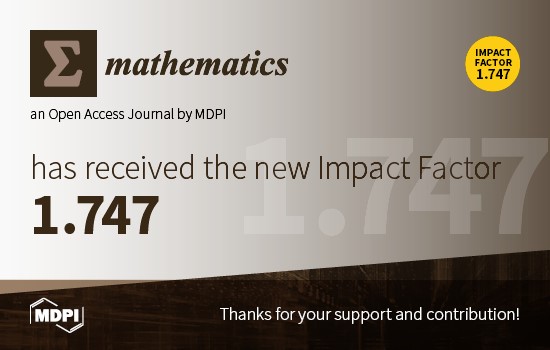
We hope that you and your loved ones remain safe and well during the coronavirus pandemic.
We are pleased to inform you that Mathematics received an updated journal Impact Factor of 1.747 in the recent release of the Journal Citation Reports®. Mathematics now ranks 28/325 (Q1 and top 10%) in the Mathematics category. For more detailed information, please visit https://www.mdpi.com/journal/mathematics/stats.
29 June 2020
Updated Impact Factors Released in the Journal Citation Reports (Clarivate)
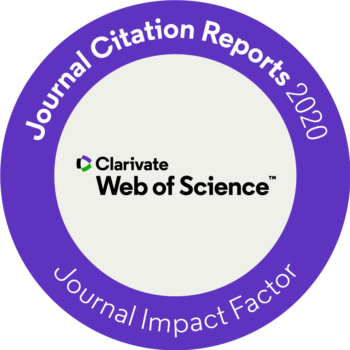
The updated citation metrics have been released in the Journal Citation Reports (JCR), published by Clarivate. The recent release of the JCR includes seventy-one MDPI titles. Out of these, 18 titles are newcomers, receiving a first Journal Impact Factor which is based on citation activity in 2019: Actuators, Agriculture, Biology, Biomedicines, Biosensors, Chemosensors, Children, Healthcare, Journal of Fungi, Journal of Personalized Medicine (JPM), Land, Life, Magnetochemistry, Membranes, Pharmaceuticals, Photonics, Separations and Toxics.
- Out of the previously listed journals, a total of 72 percent boast an increased Impact Factor.
- 25 journals are ranked among the top 25% of journals in at least one of the categories they are ranked for.
- Articles published in 2019 in MDPI journals account for approximately 17 percent of of articles published in gold Open Access journals covered in the Science Citation Index Expanded (SCIE) and Social Sciences Citation Index (SSCI).
First Impact Factors
| Journal | Impact Factor | Rank | Category | Details |
| Actuators | 1.957 | 31/64 (Q2) | • Instruments & Instrumentation | Link |
| Agriculture | 2.072 | 25/91 (Q2) | • Agronomy | Link |
| Biology | 3.796 | 19/93 (Q1) | • Biology | Link |
| Biomedicines | 4.717 | 30/138 (Q1) 36/270 (Q1) |
• Medicine, Research & Experimental • Pharmacology & Pharmacy |
Link |
| Biosensors | 3.240 | 24/86 (Q2) | • Chemistry, Analytical | Link |
| Chemosensors | 3.108 | 16/64 (Q1) 27/86 (Q2) 13/27 (Q2) |
• Instruments & Instrumentation • Chemistry, Analytical • Electrochemistry |
Link |
| Children | 2.078 | 50/128 (Q2) | • Pediatrics | Link |
| Healthcare | 1.916 | 62/102 (Q3) 45/87 (Q3) |
• Health Care Sciences & Services (SCIE) • Health Policy & Services (SSCI) |
Link |
| Journal of Fungi | 4.621 | 5/29 (Q1) 31/135 (Q1) |
• Mycology • Microbiology |
Link |
| Journal of Personalized Medicine | 4.433 | 24/165 (Q1) 10/102 (Q1) |
• Medicine, General & Internal • Health Care Sciences & Services |
Link |
| Land | 2.429 | 58/123 (Q2) | • Environmental Studies (SSCI) | Link |
| Life | 2.991 | 26/93 (Q2) 109/267 (Q2) |
• Biology • Microbiology |
Link |
| Magnetochemistry | 1.947 | 22/45 (Q2) 109/159 (Q3) 201/314 (Q3) |
• Chemistry, Inorganic & Nuclear • Chemistry, Physical • Materials Science, Multidisciplinary |
Link |
| Membranes | 3.094 | 53/143 (Q2) 129/314 (Q2) 23/89 (Q2) |
• Engineering, Chemical • Materials Science, Multidisciplinary • Polymer Science |
Link |
| Pharmaceuticals | 4.286 | 49/270 (Q1) | • Pharmacology & Pharmacy | Link |
| Photonics | 2.140 | 48/97 (Q2) | • Optics | Link |
| Separations | 1.900 | 53/86 (Q3) | • Chemistry, Analytical | Link |
| Toxics | 3.271 | 32/92 (Q2) 92/265 (Q2) |
• Toxicology • Environmental Sciences |
Link |
Updated Impact Factors
| Journal | Impact Factor | Rank | Category | Details |
| Agronomy | 2.603 | 18/91 (Q1) 65/234 (Q2) |
• Agronomy • Plant Sciences |
Link |
| Animals | 2.323 | 10/63 (Q1) 14/142 (Q1) |
• Agriculture, Dairy & Animal Science • Veterinary Sciences |
Link |
| Antibiotics | 3.893 | 23/93 (Q1) 64/270 (Q1) |
• Infectious Diseases • Pharmacology & Pharmacy |
Link |
| Antioxidants | 5.014 | 10/139 (Q1) 56/297 (Q1) 7/61 (Q1) |
• Food Science & Technology • Biochemistry & Molecular Biology • Chemistry, Medicinal |
Link |
| Applied Sciences | 2.474 | 161/314 (Q3) 32/91 (Q2) 88/177 (Q2) 62/154 (Q2) |
• Materials Science, Multidisciplinary • Engineering, Multidisciplinary • Chemistry, Multidisciplinary • Physics, Applied |
Link |
| Atmosphere | 2.397 | 48/93 (Q3) | • Meteorology & Atmospheric Sciences | Link |
| Biomolecules | 4.082 | 98/297 (Q2) | • Biochemistry & Molecular Biology | Link |
| Brain Sciences | 3.332 | 113/271 (Q2) | • Neurosciences | Link |
| Cancers | 6.126 | 37/244 (Q1) | • Oncology | Link |
| Catalysts | 3.520 | 65/159 (Q2) | • Chemistry, Physical | Link |
| Cells | 4.366 | 70/195 (Q2) | • Cell Biology | Link |
| Coatings | 2.436 | 10/21 (Q2) | • Materials Science, Coatings & Films | Link |
| Crystals | 2.404 | 10/26 (Q2) 165/314 (Q3) |
• Crystallography • Materials Science, Multidisciplinary |
Link |
| Diagnostics | 3.110 | 39/165 (Q1) | • Medicine, General & Internal | Link |
| Diversity | 1.402 | 119/168 (Q3) | • Ecology | Link |
| Electronics | 2.412 | 125/266 (Q2) | • Engineering, Electrical & Electronic | Link |
| Energies | 2.702 | 63/112 (Q3) | • Energy & Fuels | Link |
| Entropy | 2.494 | 33/85 (Q2) | • Physics, Multidisciplinary | Link |
| Foods | 4.092 | 27/139 (Q1) | • Food Science & Technology | Link |
| Forests | 2.221 | 17/68 (Q1) | • Forestry | Link |
| Genes | 3.759 | 53/177 (Q2) | • Genetics & Heredity | Link |
| Insects | 2.220 | 18/101 (Q1) | • Entomology | Link |
| International Journal of Environmental Research and Public Health (IJERPH) | 2.849 | 58/193 (Q2) 32/170 (Q1) 105/265 (Q2) |
• Public, Environmental & Occupational Health (SCIE) • Public, Environmental & Occupational Health (SSCI) • Environmental Sciences (SCIE) |
Link |
| International Journal of Molecular Sciences (IJMS) | 4.556 | 74/297 (Q1) 48/177 (Q2) |
• Biochemistry & Molecular Biology • Chemistry, Multidisciplinary |
Link |
| ISPRS International Journal of Geo-Information (IJGI) | 2.239 | 31/50 (Q3) 18/30 (Q3) |
• Geography, Physical • Remote Sensing |
Link |
| Journal of Clinical Medicine | 3.303 | 36/165 (Q1) | • Medicine, General & Internal | Link |
| Journal of Marine Science and Engineering | 2.033 | 31/66 (Q2) | • Oceanography | Link |
| Marine Drugs | 4.073 | 16/61 (Q2) | • Chemistry, Medicinal | Link |
| Materials | 3.057 | 132/314 (Q2) | • Materials Science, Multidisciplinary | Link |
| Mathematics | 1.747 | 28/324 (Q1) | • Mathematics | Link |
| Medicina | 1.205 | 107/165 (Q3) | • Medicine, General & Internal | Link |
| Metabolites | 4.097 | 95/297 (Q2) | • Biochemistry & Molecular Biology | Link |
| Metals | 2.117 | 18/79 (Q1) 185/314 (Q3) |
• Metallurgy & Metallurgical Engineering • Materials Science, Multidisciplinary |
Link |
| Micromachines | 2.523 | 56/92 (Q3) 23/64 (Q2) |
• Nanoscience & Nanotechnology • Instruments & Instrumentation |
Link |
| Microorganisms | 4.152 | 37/135 (Q2) | • Microbiology | Link |
| Minerals | 2.380 | 6/21 (Q2) 11/30 (Q2) |
• Mining & Mineral Processing • Mineralogy |
Link |
| Molecules | 3.267 | 70/177 (Q2) 141/297 (Q2) |
• Chemistry, Multidisciplinary • Biochemistry & Molecular Biology |
Link |
| Nanomaterials | 4.324 | 89/314 (Q2) 42/103 (Q2) |
• Materials Science, Multidisciplinary • Nanoscience & Nanotechnology |
Link |
| Nutrients | 4.546 | 17/89 (Q1) | • Nutrition & Dietetics | Link |
| Pathogens | 3.018 | 65/135 (Q2) | • Microbiology | Link |
| Pharmaceutics | 4.421 | 44/270 (Q1) | • Pharmacology & Pharmacy | Link |
| Plants | 2.762 | 58/234 (Q1) | • Plant Sciences | Link |
| Polymers | 3.426 | 16/89 (Q1) | • Polymer Science | Link |
| Processes | 2.753 | 59/143 (Q2) | • Engineering, Chemical | Link |
| Remote Sensing | 4.509 | 9/30 (Q2) | • Remote Sensing | Link |
| Sensors | 3.275 | 22/86 (Q2) 77/266 (Q2) 15/64 (Q1) |
• Chemistry, Analytical • Engineering, Electrical & Electronic • Instruments & Instrumentation |
Link |
| Sustainability | 2.576 | 120/265 (Q2) 26/41 (Q3) 53/123 (Q2) 6/8 (Q3) |
• Environmental Sciences (SCIE) • Green & Sustainable Science & Technology (SCIE) • Environmental Studies (SSCI) • Green & Sustainable Science & Technology (SSCI) |
Link |
| Symmetry | 2.645 | 29/71 (Q2) | • Multidisciplinary Sciences | Link |
| Toxins | 3.531 | 21/92 (Q1) 34/139 (Q1) |
• Toxicology • Food Science & Technology |
Link |
| Universe | 1.752 | 18/29 (Q3) 42/68 (Q3) |
• Physics, Particles & Fields • Astronomy & Astrophysics |
Link |
| Vaccines | 4.086 | 57/158 (Q2) 50/138 (Q2) |
• Immunology • Medicine, Research & Experimental |
Link |
| Viruses | 3.816 | 12/37 (Q2) | • Virology | Link |
| Water | 2.544 | 31/94 (Q2) | • Water Resources | Link |
Source: Clarivate 2020, InCites Journal Citation Reports®.
24 June 2020
Mathematics 2021 Best Paper Award—Now Open
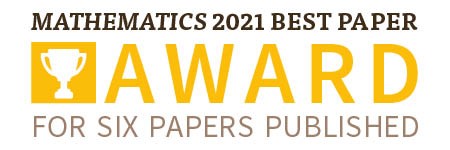
The Mathematics 2021 Best Paper Award is now open. A total of six winners will be selected from all research articles and reviews published in Mathematics in 2019 according to their citations in 2020 as well as their originality. The winners will be announced after a final decision is made, following review and voting by the Mathematics Best Paper Award Committee.
The six winners (each corresponding author) will receive a certificate and an offer to publish a paper free of charge in Mathematics, subject to the standard peer review procedure. In addition, each winner will receive a prize based on the award class:
- First Prize (one paper): 500 CHF
- Second Prize (two papers): 300 CHF
- Third Prize (three papers): 200 CHF
The winner will be announced by 31 March 2021 on the journal website.
10 June 2020
Mathematics 2020 Young Investigator Award—Winner Announcement
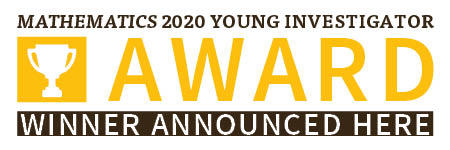
We are pleased to announce that the winner of the 2020 Mathematics Young Investigator Award is Dr. Ángel Alberto Magreñán Ruiz.
Dr. Magreñán is currently a Graduate Teaching Assistant at the Department of Mathematics and Computation at the University of La Rioja, Spain. He has provided salient contributions to applied mathematics and mathematics education. Major contributions distinguishing him include the following: (1) local and semilocal convergence of iterative methods with and without memory, enlarging the problems (such us chemical problems, differential equation problems, or modeling problems) that can be solved using these iterative methods. (2) Dr. Magreñán has also studied the dynamical properties of different iterative methods, including real dynamics and a tool to study real dynamics or complex dynamics with two parameters, which has been used by many authors. (3) Dr. Magreñán is productive and influential in the fields of applied mathematics and mathematics education. Please join us in congratulating Dr. Magreñán on receiving this award and for his outstanding achievements.
As the awardee, Dr. Magreñán will receive an honorarium of 2000 CHF and an engraved plaque.
We would like to thank all the nominators from various fields of study for their participation and all the Award Committee Members for their evaluation of the many excellent nominations.
13 May 2020
COVID-19 Academic Resources Center

Since 1996, MDPI has been committed to supporting the research community by providing the latest research freely available and making relevant and useful research available as quickly as possible. The world is current experiencing a pandemic of COVID-19, and researchers are working extremely hard to understand it and find a cure.
The values MDPI holds strongly are particularly important at the moment, and we will continue to publish relevant, peer-reviewed research as quickly as possible in open access format. This means that it will immediately be available for researchers, health professionals, and the general public to read, distribute, and reuse. We believe that scientific advancements will be crucial to overcoming this pandemic, and will do everything we can to support researchers working looking for solutions.
COVID-19 Academic Resources Center contains a variety of information related to COVID-19 available from MDPI, including journal articles, special issues, and preprints, among others.
For more information, please visit: https://www.mdpi.com/covid-19
20 April 2020
Mathematics Outstanding Reviewer Award Winners 2019
The Mathematics Editorial Board and Editorial Team would like to gratefully acknowledge the time and energy committed by our reviewers in checking manuscripts submitted to the journal. It is due to their efforts that the high quality of the journal and quick submission-to-publication process have been maintained. The median time from submission to first decision is 21 days and the median time to publication is 40 days.
The following referees have been selected by the Editor-in-Chief of Mathematics, Prof. Dr. José A. Tenreiro Machado, to receive Mathematics 2019 Outstanding Reviewer Awards for the quantity, timeliness, and quality of their reviews in 2019. Each of them will receive 500 CHF, an offer to publish a Feature Paper free of charge in Mathematics, and a certificate to recognize their outstanding work:
Prof. Denis Butusov
Petersburg State Electrotechnical University, Russia
Dr. João Cabral
University of Azores, Portugal
Dr. Moreno Concezzi
Roma Tre University, Italy
Mathematics (ISSN 2227-7390) is a peer-reviewed open access journal that provides an advanced forum for studies related to mathematics, and is published monthly online by MDPI AG, Basel, Switzerland. The journal is covered by leading indexing services, including Science Citation Index Expanded (Web of Science) and Scopus. Coverage starts from 2016, Volume 4. For further details, please refer to:
9 April 2020
Free Open Platforms to Support Academics During the COVID-19 Pandemic

As a leading Open Access publisher, MDPI is committed to fostering open scientific exchange in all forms across all disciplines. Due to the outbreak of COVID-19, many researchers have to stay at home and many academic conferences have been cancelled or postponed. In light of these changes, MDPI has adopted numerous initiatives that may help accelerate scientific exchange and provide support to the academics during this period.
Scholarly Community—Encyclopedia
Encyclopedia is an online reference created and curated by active scholars. It aims to highlight the latest research results as well as providing benchmark information for researchers and the general public interested in accurate and advanced knowledge on specific topics.
Comprehensive and Free Literature Database—Scilit
Scilit is a comprehensive, free database for scientists that uses a new method to collate data and index scientific material. Our crawlers extract the latest data from CrossRef and PubMed on a daily basis. This means that newly published articles are immediately added to Scilit.
Display Academic Achievements—SciProfiles
SciProfiles is an innovative social network for researchers and scholars that is developed by MDPI. In line with our broad mission, the purpose of SciProfiles is to accelerate discovery and innovation by facilitating immediate access to research results and providing opportunities for academic networking.
Organize and Participate in Conferences Online—Sciforum
Sciforum is an event planning platform that supports open science by offering the opportunity to host and participate in academic conferences. It provides an environment for scholarly exchange, discussion of topics of current interest, building of networks, and establishing collaborations.
Post Early Versions of Research Outputs—Preprints
Preprints is a platform dedicated to making early versions of research outputs permanently available and citable. We post original research articles and comprehensive reviews, and papers can be updated by authors at any time. Content on Preprints is not peer-reviewed, and feedback can be received from readers.
***
MDPI remains committed to open science and open data and has signed a statement, along with more than thirty scholarly publishers, showing our intention to facilitate sharing of new research findings as early on as possible. The initiative sees publishers collectively removing barriers to new research, in the face of a global healthcare crisis.
30 March 2020
Best Paper Award 2018-Winners News Announcement
Dear Authors,
I am pleased to announce the winners of the 2018 Best Paper Award. Six research articles were selected for this award. All papers published in 2018 in Mathematics were considered for the award. An Evaluation Committee considered the originality and significance of the papers as well as the citations and downloads in 2019 in determining the winners.
The first prize article is:
Numerical Solution of Fractional Differential Equations: A Survey and a Software Tutorial by Roberto Garrappa.
The second prize articles are:
Numerical solution of Multi-Term Fractional Differential Equations Using the Matrix Mittag--Leffler Functions by Marina Popolizio;
Data Driven Economic Model Predictive Control by Prashant Mhaskar and Masoud Kheradmandi;
The third prize articles are:
Computation of Probability Associated with Anderson-Darling Statistic by Sorana Bolboacă and Lorentz Jäntschi;
Approximate dynamic Programming Based Control of Proppant Concentration in Hydraulic Fracturing by Joseph Kwon, Prashanth Siddhamshetty and Harwinder Singh Sidhu;
Recurrent Neural Network-Based Model Predictive Control for Continuous Pharmaceutical Manufacturing by Xiaonan Wang, Jiali Li, Ewan Chee, and Wee Chin Wong;
Congratulations to the authors on these six outstanding papers!
Prof. José A. Tenreiro Machado
Editor-in-Chief
25 March 2020
MDPI Comment on the COVID-19 Virus
The world is currently suffering from a global pandemic of the corona virus COVID-19. MDPI expresses its sympathies for all of those affected by the virus and stands in solidarity with medical staff and researchers treating patients and searching for scientific solutions.
MDPI has previously published papers covering corona viruses in addition to new papers on the current outbreak, see all papers here. In particular, Viruses has published a number of Special Issues and papers on the topic (see here, here, and here) as well as a forthcoming Special Issue.
Alongside journal articles, MDPI has been a strong supporter of preprints, which are increasingly being used to rapidly disseminate the latest research, and we run the preprint server Preprints.org. Our database of research articles, Scilit, is free to use and covers all publishers including preprint servers. New papers are often in search results within hours of publication and users can set up alerts for new papers.
Our main priority during this period has been the health and safety of staff, and we continue to allow staff to work at home and closely monitor the situation in all locations in which we work. Despite the restrictions, we continue to provide a full publication service and, by close collaboration with our editorial boards and making use our in-house teams, ensure that there are no unnecessary delays in publishing vital research. Fast and open publication has always been at the core of MDPI values and is now more important than ever.
We hope that a solution to the current situation will emerge soon. In the meantime, we will do our best to continue communicating vital research in all fields.
18 March 2020
MDPI Co-Signed Position Statement on Transformative Agreements
The advantages of the open access model of scientific publishing are being increasingly recognized in the scientific community. It allows new scientific evidence to be accessed from the moment of publication for free by anyone around the globe, boosting the impact of new research. In response, many funders, libraries and universities have been adopting new principles to accelerate the transition to open access.
Recently, “transformative agreements” have been negotiated between traditional publishers and various institutions. While increasing the number of open access papers, these agreements lack binding commitments to a full transition to open access, their conditions vary across different regions, and access is still limited for many users.
MDPI is a co-signatory of the recent position statement raising concerns about potential downsides of transformative agreements and how they may delay a full transition to open access. The statement highlights that these models “risk perpetuating current limitations on access, transparency and market competitiveness, while simultaneously facilitating excessive charges on the public purse”.
As a pioneering open access journal publisher, MDPI is the first to promote the importance of science being made available to everyone. Our peer-reviewed journals, covering diverse academic disciplines, are fully accessible to the public free of charge under a Creative Commons Attribution License (CC BY). This is why, along with other open access publishers, MDPI is a proud signatory of the position paper and is committed to contributing to the replacement of weak transitional agreements with “agreements with publishers that are already fully committed to open science and who offer full, immediate and transparent Open Access”.
Read the position paper here
16 March 2020
Encyclopedia Outstanding Contributor Awards 2020 - Open for Application
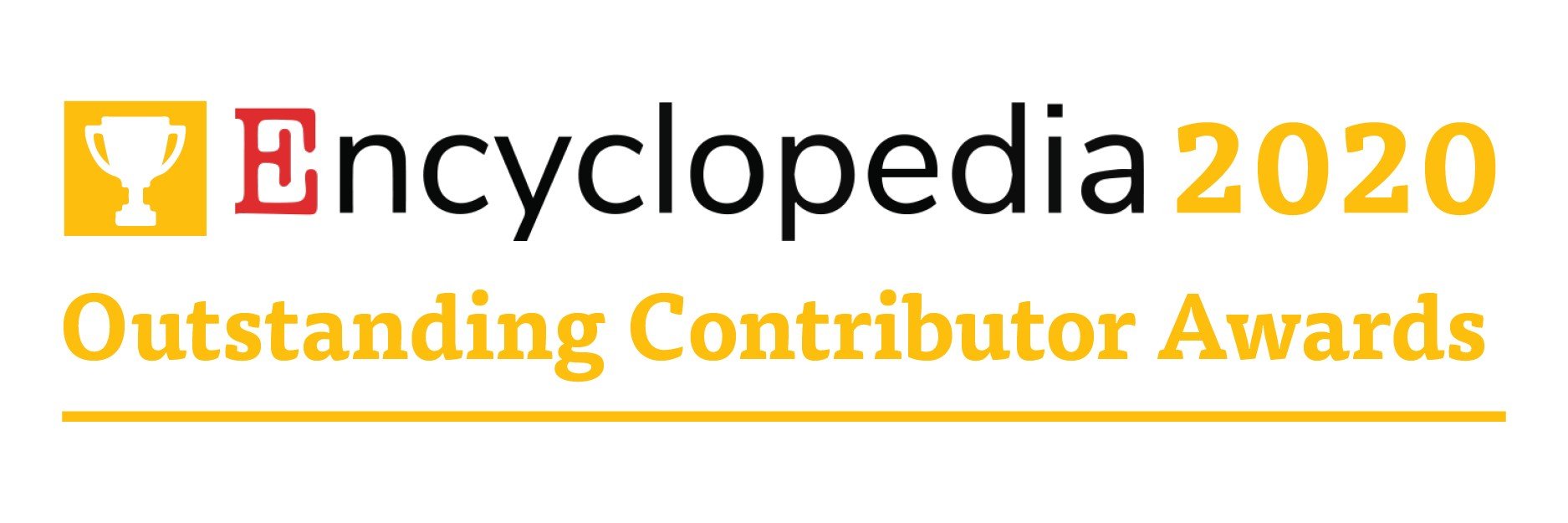
We are pleased to announce that Encyclopedia will be awarding five Outstanding Contributor Awards for researchers in 2020. The nominations and applications will be assessed by an Evaluation Committee consisting of senior scholars from the Encyclopedia Editorial Board.
Prize for Winners
- An official certificate;
- A cash award of 500 CHF or an MDPI discount voucher of 800 CHF.
Application Deadline
31 December, 2020 (Please send your application email with a list of all entries you contributed to our office before the deadline: office@encyclopedia.pub)
Candidate Requirements
- Have a Ph.D. degree;
- Have more than three qualified entries published in Encyclopedia in 2020.
Evaluation Standards
- Number of entries published in Encyclopedia in 2020;
- Quality of entries online (including length, figure quality, and novelty);
- Impact of entries (including the number of likes, discussion contents, views, and downloads).
If you are a researcher and have not yet contribute entries to Encyclopedia, please do not miss this chance to highlight your research results.
17 February 2020
Mathematics Travel Award Winners 2020 Selected
Dear Colleagues,
For the Mathematics Travel Awards 2020, together with a scientific evaluation committee of experts, we selected the following exceptional applicants as the winners of the Mathematics Travel Awards 2020:
- Quanling Deng, a postdoctoral research fellow at Curtin University
- Ioannis Dassios, a postdoctoral research fellow at University College Dublin
Both of them will be granted 800 CHF respectively for attending an academic conference of their choosing in 2020.
I would like to congratulate Quanling Deng and Ioannis Dassios on behalf of the Evaluation Committee and the Mathematics editorial team, and thank all candidates for their most interesting applications!
Prof. José A. Tenreiro Machado
Mathematics Editor-in-Chief
11 December 2019
Recruiting Editors for Mathematics
Mathematics is recruiting Editorial Board members for the following twelve sections:
- Engineering Mathematics
- Theoretical and Mathematical Ecology
- Mathematics and Computer Science
- Network Science
- Dynamical Systems
- Computational Mathematics
- Fuzzy Set Theory
- Difference and Differential Equations
- Financial Mathematics
- Mathematical Physics
- Algebraic Geometry
- Probability and Statistics Theory
These 12 sections are now expanding their Editorial Board to cover areas that are less well-represented by the current team. If you are interested in this position or know of potential candidates to recommend, please contact us by 30 June 2020.
Mathematics (ISSN 2227-7390, https://www.mdpi.com/journal/mathematics) is a well-established, fully Open Access journal which provides an advanced forum for studies related to mathematical sciences. The journal received its first Impact Factor of 1.105 this year whilst also being indexed in many other important databases (for example Scopus). It is currently ranked in the first quartile (Q1) in its JCR-category. More details on the Editorial Board of Mathematics are available at: https://www.mdpi.com/journal/mathematics/editors.As a member of the Editorial Board, you would have one or more of the following duties:
- to make decisions as to whether a manuscript can be accepted or not based on the reports we collect;
- to guest-edit a Special Issue on a topic related to your research interests when it is convenient for you;
- to promote Mathematics and increase its visibility at related academic conferences.
To apply or request further information, please contact the Mathematics Editorial Office (mathematics@mdpi.com).
11 October 2019
Introducing SciProfiles, an Academic Social Network
MDPI is pleased to announce the release of SciProfiles, its social network platform for researchers and scholars.
The purpose of SciProfiles is aligned with MDPI’s broad mission to accelerate discovery and innovation by facilitating immediate access to research results and to serve scholars and communities by providing opportunities for academic networking.
SciProfiles also ambitions to serve as a sustainable, transparent and community-driven research evaluation system aligned with the DORA principles (https://sfdora.org/). Through their scientific profiles, academics can highlight their contribution to research communities, and measure their impact on their field, beyond publication numbers and impact factors. SciProfiles is currently a beta version and will enrich to give researchers the possibility to highlight all of their contributions to science and their scientific communities as authors, reviewers, editors, conference organizers, conference panelists, conference keynote speakers, or even as lecturers or student mentors at their University.
The classic components of popular community social networks, including follower/following, classical metrics, endorsements and recommendations (https://www.mdpi.com/about/announcements/1690), comments (https://www.mdpi.com/about/announcements/1397) are or will be very soon highlighted in SciProfiles as open science contributions.
To help increase the impact and visibility of articles and their authors to an appropriate audience, the platform offers a NewsFeed that includes recommendations of relevant content based on interests, publication history, saved searches or colleagues’ recommendations.
SciProfiles’ avatars are now being integrated on several MDPI platforms, meaning that you will directly access researchers’ profiles from any of the MDPI platforms:
MDPI's journal publishing website: www.mdpi.com
MDPI's conference hosting and management website: www.sciforum.net
MDPI's pre-print website : www.preprints.org
MDPI's knowledge sharing website : www.encyclopedia.pub
MDPI's books store: www.mdpi.com/books
MDPI's literature database : www.scilit.net
SciProfiles aims to serve scientific communities at large. It can be embedded into third-party websites and also welcomes integration of data from third-parties.
Dr. Shu-Kun Lin: https://sciprofiles.com/profile/2
Dr. Franck Vazquez: https://sciprofiles.com/profile/FranckVazquez
Dr. Martyn Rittman: https://sciprofiles.com/profile/martynrittman
2 October 2019
Winners of the 2019 MDPI Writing Prize
We are delighted to announce the winners of the 2019 MDPI Writing Prize. Entrants were asked to write on the theme "Judging research: How should research and researchers be evaluated and rewarded?" We received a large number of excellent essays from PhD students and postdocs, and the process of shortlisting and choosing winners was not an easy one. The winners demonstrated excellent writing skills alongside interesting and thought-provoking ideas.
As last year, we will begin the process of collating all entries into a book that will be available in open access format. Alongside promoting good writing skills, we see the prize as a way to promote the voices of early career researchers within broader debates and policy discussions.
Congratulations to all of the participants and especially the winners. The winners are:
1st Prize (500 CHF):
Albin Nilsson (National Centre for Nuclear Research, Warsaw, Poland)
[Read here]
2nd Prize (250 CHF):
Qi Zhang (Shandong University, Jinan, China)
[Read here]
Igor Ogashawara (Indiana University, Indianapolis, US)
[Read here]
3rd Prize (100 CHF):
Margaret Sivapragasam (Universiti Teknologi Petronas, Perak, Malaysia)
[Read here]
Arvind Sharma (The University of Queensland, Gatton, Australia)
[Read here]
Jose Flores-Guerrero (University Medical Center Groningen, Groningen, The Netherlands)
[Read here]
The MDPI Writing Prize is an annual award supported by MDPI Author Services, which provides services including language editing, reformatting, plagiarism checks, and image editing.
20 September 2019
MDPI Now Gives Scholars the Possibility to Endorse and Recommend Articles

MDPI is pleased to announce the release of a new functionality giving the possibility for researchers and scholars to endorse, and formally recommend articles to their colleagues.
MDPI was an early signatory of the San Francisco Declaration on Research Assessment (https://sfdora.org/read/) which calls for improvement in how quality and impact of scholarly research outputs are evaluated, especially in moving beyond journal-based citation metrics (journal Impact Factor, Scopus Citescore, etc.).
MDPI supports the establishment of article-level impact metrics, including citations, views, downloads, and Altmetric scores. These measures serve as an impact indicator for research articles on a case–by-case basis, assessing paper on its own merit. However, these metrics are also subjective and can give a biased picture of the article impact: they do not directly reflect the quality or the intrinsic scientific value of the article.
In our view, community engagement with publications based on community-driven metrics can help to overcome this limitation. We have therefore launched an option for scholars to endorse articles, indicating their own assessment of its content and making a recommendation to their community. This follows our implementation of the open source Hypothesis commenting tool, which has been available for all articles published by MDPI for over a year (https://www.mdpi.com/about/announcements/1397). Both endorsement and commenting are available for all previously published and forthcoming MDPI articles.
In addition to potentially serving as a sustainable solution to article assessment, endorsements will help scientific communities to identify the most relevant articles, independently of the journal in which it was published.
The code for the endorsing functionality, which relies on DOIs and ORCIDs, will be made available on GitHub with an open source license.
Dr. Shu-Kun Lin, President and Founder
Dr. Franck Vazquez, Chief Scientific Officer
Dr. Martyn Rittman, Publishing Director
11 September 2019
Create an Entry in Encyclopedia to Get a 100 CHF Voucher in Publishing in MDPI Journals
Encyclopedia is a free online reference created and curated by active scholars. It aims to highlight the latest research results as well as provide a comprehensive record of scientific development. If you have any suggestions or questions, please feel free to contact us via office@encyclopedia.pub.

10 September 2019
Professor J. A. Tenreiro Machado Appointed Editor-in-Chief of Mathematics
We are pleased to announce that, starting from 1st September 2019, the editorial leadership of Mathematics has been taken over by Professor J. A. Tenreiro Machado, who is a Full Professor in the Department of Electrical Engineering, Institute of Engineering, Polytechnic Institute of Porto, Porto, Portugal.

Professor J. A. Tenreiro Machado graduated with ‘Licenciatura’ (1980), Ph.D. (1989) and ‘Habilitation’ (1995), in Electrical and Computer Engineering at the University of Porto. During 1980–1998, he worked at the Department of Electrical and Computer Engineering of the University of Porto. Since 1998, he has been working at the Institute of Engineering, Polytechnic Institute of Porto, Department of Electrical Engineering. His research focuses on complex systems, nonlinear dynamics, fractional calculus, modeling, entropy, control, and evolutionary computing, as well as genomics. Prof. J. A. Tenreiro Machado is a member of the Editorial boards of several international journals, guest editor of Special Issues, and has about 1000 publications in journals, conferences, and books.
He will work closely with over 100 Editorial Board Members from across the globe. We are confident that under his leadership the journal will continue as a highly respected journal in the field.
We would like to take the opportunity to express our sincere gratitude to the previous Editor-in-Chief, Prof. Dr. Lokenath Debnath, for his invaluable contributions to the journal.
14 August 2019
Highly Cited Papers—Mathematics (I)
We're presenting herewith a selection of original research articles published in our mathematical science journals. Enjoy the read!
Time-Space Fractional Coupled Generalized Zakharov-Kuznetsov Equations Set for Rossby Solitary Waves in Two-Layer Fluids
Fu, L.; Chen, Y.; Yang, H. Mathematics 2019, 7, 41. View article page.
An Iterative Algorithm for Solving Generalized Variational Inequalities and Fixed Points Problems
Yao, Y.; Postolache, M.; Yao, J.-C. Mathematics 2019, 7, 61. View article page.
Published in the special issue Fixed Point, Optimization, and Applications.
Energy of Pythagorean Fuzzy Graphs with Applications
Akram, M.; Naz, S. Energy of Pythagorean Fuzzy
Graphs with Applications. Mathematics 2018, 6, 136. View article page.
Methods for Multiple Attribute Decision Making with Interval-Valued Pythagorean Fuzzy Information
Li, Z.; Wei, G.; Gao, H. Methods for Multiple Attribute Decision Making with Interval-Valued Pythagorean Fuzzy Information. Mathematics 2018, 6, 228. View article page.
Numerical Solution of Fractional Differential Equations: A Survey and a Software Tutorial
Garrappa, R. Mathematics 2018, 6, 16. View article page.
Published in the special issue Fractional Calculus: Theory and Applications.
Neutrosophic Positive Implicative N -Ideals in BCK-Algebras
Jun, Y.B.; Smarandache, F.; Song, S.-Z.; Khan, M. Axioms 2018, 7, 3. View article page.
Line Integral Solution of Differential Problems
Brugnano, L.; Iavernaro, F. Axioms 2018, 7, 36. View article page.
Non-Gaussian Distributions to Random Walk in the Context of Memory Kernels
Dos Santos, M.A.F. Fractal Fract 2018, 2, 20. View article page.
Fractional Derivatives with the Power-Law and the Mittag–Leffler Kernel Applied to the Nonlinear Baggs–Freedman Model
Gómez-Aguilar, J.F.; Atangana, A. Fractal Fract 2018, 2, 10. View article page.
Using the Maximum Entropy Principle to Combine Simulations and Solution Experiments
Cesari, A.; Reißer, S.; Bussi, G. Computation 2018, 6, 15. View article page.
6 August 2019
Preprints Reaches 10,000 Posted Articles Milestone
We are pleased to announce that Preprints has passed the milestone of 10,000 posted preprints. We are delighted to have reached this after just over three years of operation. Our congratulations and thanks go to our authors and advisory board who have supported growth of the platform and been crucial to its operation.
You can find further details at https://www.preprints.org/announcement/show/37.
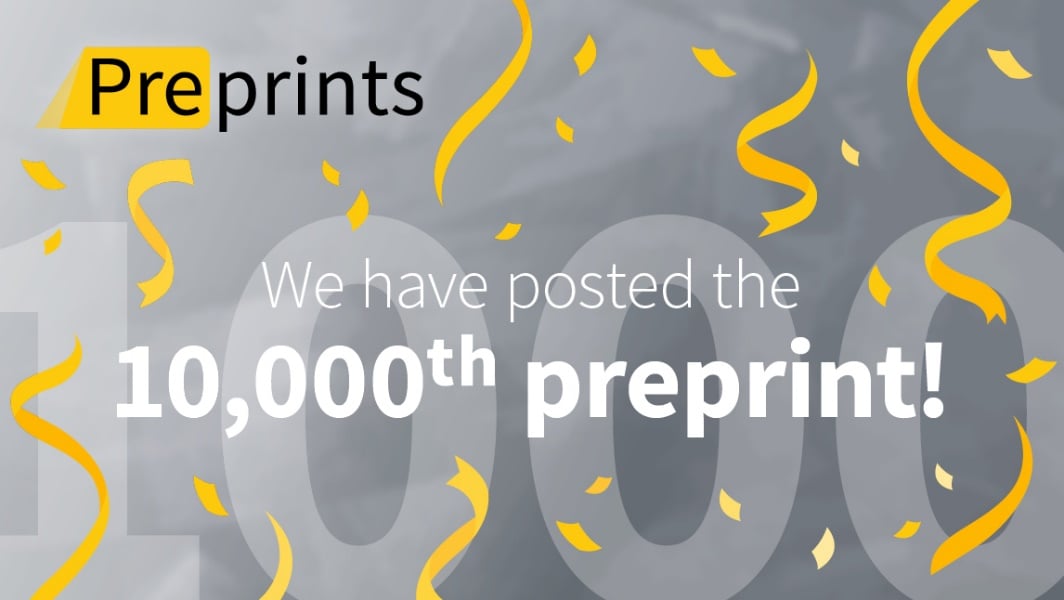
2 August 2019
DeepGreen Partnering with Publishers and Universities in Distributing Open Access Content to Institutional Repositories
Last week, the DeepGreen initiative in Germany started into an advanced test phase with the publishing partners S. Karger AG, SAGE Publishing, MDPI, Frontiers and De Gruyter, as well as 27 universities from all over Germany, from Hamburg University of Applied Sciences to University of Konstanz.
DeepGreen aims at lowering the barriers for open access publishing by automatically delivering metadata and full text publications from participating publishers to authorized repositories at German universities.
In preparation for a later live operation, the advanced test phase serves to gain experience with extensive data deliveries from publishers and also handling different repository software (including OPUS4, DSpace, EPrints, MyCoRe). DeepGreen thereby acts as a sophisticated platform, receiving articles published by authors affiliated with German universities and depositing these articles to respective university repositories, based on the affiliation metadata. For more information about DeepGreen: https://deepgreen.kobv.de
Karger AG has been a close cooperation partner of the DeepGreen consortium since 2016. S. Karger has more than 80 subscription-based and around 20 open access journals covering a wide spectrum in health science. DeepGreen will assign S. Karger articles to authorized institutions on the legal basis of German alliance and national licenses.
SAGE Publishing was founded by Sara Miller McCune in 1965 to support the dissemination of usable knowledge and educate a global community. SAGE publishes more than 1,000 journals and over 600 new books each year, spanning a wide range of subject areas. Our growing selection of library products includes archives, data, case studies and video. SAGE remains majority owned by our founder and after her lifetime will become owned by a charitable trust that secures the company’s continued independence. Principal offices are located in Los Angeles, London, New Delhi, Singapore, Washington DC and Melbourne. SAGE Publishing has been a close cooperation partner of DeepGreen since 2016.
MDPI is a scientific open access publisher and has been a partner of DeepGreen since 2017. MDPI comprises 205 peer-reviewed journals of various disciplines. All articles are published under a CC-BY license and are freely available without embargo period.
Frontiers is a scientific open access publisher with 61 journals of over 600 academic disciplines. All articles are peer-reviewed and published freely available under CC-BY license.
De Gruyter is an academic publisher with more than 700 subscription-based and open access journals of 29 disciplines. Articles provided by De Gruyter will be assigned to institutions with German alliance and national licenses.
There is promising communication with other publishers.
DeepGreen is funded by the German Research Foundation (DFG) and the consortium comprises six institutions: the Cooperative Library Network Berlin-Brandenburg, Bavarian State Library, Bavarian Library Network, University Library of the Technische Universität Berlin, University Library of Erlangen-Nuremberg and the Helmholtz Open Science Coordination Office at the GFZ German Research Centre for Geosciences.
If you would like to know in more detail which institutions take part in the advanced test phase of DeepGreen, you can find more information here.
17 July 2019
First Basel Sustainable Publishing Forum
The University of Basel and the MDPI Sustainability Foundation are organizing the First Basel Sustainable Publishing Forum on 9th September 2019.
The aim of this event is to provide background and perspectives on Plan S to Learned Societies, which have to make well-informed decisions to transition their journals to Open Access (OA).
The BSPF will bring together several representatives of Learned societies, Plan S architects as well as representatives from various publishers and publishing platforms. After getting the big picture from cOAlition S, panel discussions will allow to better understand the diverse challenges that Learned societies are facing to transition their journals to OA as well as to identify sustainable, implementable and scalable solutions for successful Open Access transition.
For program details and registration, please follow the link below:
https://sciforum.net/conference/SustainableSolutionsToOpenAccess
20 June 2019
Mathematics Receives First Journal Impact Factor of 1.105
The editors are pleased to inform that Mathematics has received a first Impact Factor of 1.105, as published in the 2018 Edition of the Journal Citation Reports®, released just now. Mathematics ranks 75th out of 313 (Q1) titles in the 'MATHEMATICS' category.
Thank you to the authors, editorial board members and reviewers for their contribution in achieving this milestone for Mathematics.
31 May 2019
First-Timers: MDPI Journals Receiving a First CiteScore™ in Scopus
In addition to MDPI journals who received updated CiteScores for 2018, the titles listed below were added in Scopus recently and therefore received a first CiteScore in May 2019, based on last year's citation activity in the database.
For almost all of the newly added MDPI titles, their CiteScore ranks in the upper 50% of the distribution (Q1 or Q2) in at least one of the research areas. The following titles rank in the top 25% cited journals based on CiteScore: Actuators; Biomedicines; Coatings; Cosmetics; Fermentation; Journal of Fungi; Journal of Open Innovation: Technology, Market, and Complexity; Nanomaterials; and Publications.
To access the full data for MDPI journals, please see here. More data can also be found in SJR Scimago Journal & Country Rank.
New CiteScore for MDPI Journals
| Journal | Rank (Quartile) |
Category | Link | CiteScore 2018 | SNIP 2018 |
| Actuators | 9/92 (Q1) 60/232 (Q2) |
• Control and Optimization • Control and Systems Engineering |
Link | 2.80 | 1.542 |
| Atmosphere | 26/71 (Q2) | • Environmental Science (miscellaneous) | Link | 2.27 | 0.855 |
| Atoms | 36/69 (Q3) 105/173 (Q3) 239/397 (Q3) |
• Nuclear and High Energy Physics • Atomic and Molecular Physics, and Optics • Condensed Matter Physics |
Link | 1.20 | 0.707 |
| Axioms | 25/91 (Q2) 26/78 (Q2) 11/27 (Q2) 55/135 (Q2) 35/58 (Q3) |
• Algebra and Number Theory • Geometry and Topology • Logic • Analysis • Mathematical Physics |
Link | 0.99 | 0.670 |
| Bioengineering | 42/139 (Q2) | • Bioengineering | Link | 3.14 | - |
| Biomedicines | 40/189 (Q1) 47/206 (Q1) |
• General Biochemistry, Genetics and Molecular Biology • Medicine (miscellaneous) |
Link | 3.33 | 0.908 |
| Chemosensors | 34/110 (Q2) 50/160 (Q2) |
• Analytical Chemistry • Physical and Theoretical Chemistry |
Link | 2.77 | 0.770 |
| Climate | 53/109 (Q2) | • Atmospheric Science | Link | 1.95 | 0.864 |
| Coatings | 27/116 (Q1) 63/271 (Q1) 15/53 (Q2) |
• Surfaces, Coatings and Films • Materials Chemistry • Surfaces and Interfaces |
Link | 2.42 | 1.186 |
| Computation | 74/204 (Q2) 171/460 (Q2) 58/118 (Q2) 127/259 (Q3) |
• General Computer Science • Applied Mathematics • Theoretical Computer Science • Modeling and Simulation |
Link | 1.40 | 0.552 |
| Computers | 128/274 (Q2) 52/89 (Q3) |
• Computer Networks and Communications • Human-Computer Interaction |
Link | 1.59 | - |
| Cosmetics | 92/390 (Q1) 38/128 (Q2) 67/164 (Q2) 11/23 (Q2) 23/30 (Q4) |
• Surgery • Dermatology • Pharmaceutical Science • Chemical Engineering (miscellaneous) • Aging |
Link | 1.81 | 1.689 |
| Econometrics | 339/595 (Q3) | • Economics and Econometrics | Link | 0.82 | - |
| Fermentation | 91/404 (Q1) 76/273 (Q2) 10/24 (Q2) |
• Plant Science • Food Science • Biochemistry, Genetics and Molecular Biology (miscellaneous) |
Link | 2.24 | - |
| Fibers | 86/288 (Q2) 34/103 (Q2) 118/352 (Q2) 49/83 (Q3) |
• Civil and Structural Engineering • Ceramics and Composites • Mechanics of Materials • Biomaterials |
Link | 2.01 | 0.889 |
| Galaxies | 46/76 (Q3) | • Astronomy and Astrophysics | Link | 1.08 | 0.308 |
| High-Throughput | 181/257 (Q3) 153/205 (Q4) 108/139 (Q4) 340/407 (Q4) |
• Biotechnology • Biomedical Engineering • Bioengineering • Biochemistry |
Link | 0.88 | 0.295 |
| Inorganics | 35/69 (Q3) | • Inorganic Chemistry | Link | 1.90 | 0.474 |
| International Journal of Neonatal Screening | 138/277 (Q3) 3/5 (Q3) 95/166 (Q3) |
• Pediatrics, Perinatology and Child Health • Immunology and Microbiology (miscellaneous) • Obstetrics and Gynecology |
Link | 1.07 | 0.240 |
| Journal of Developmental Biology | 39/76 (Q3) 224/375 (Q3) 164/265 (Q3) |
• Developmental Biology • Molecular Biology • Cell Biology |
Link | 2.36 | 0.813 |
| Journal of Functional Biomaterials | 11/83 (Q1) 26/205 (Q1) |
• Biomaterials • Biomedical Engineering |
Link | 5.10 | 2.234 |
| Journal of Fungi | 90/591 (Q1) 62/404 (Q1) |
• Ecology, Evolution, Behavior and Systematics • Plant Science |
Link | 2.84 | 0.982 |
| Journal of Imaging | 291/661 (Q2) 136/272 (Q3) 36/70 (Q3) 40/75 (Q3) |
• Electrical and Electronic Engineering • Radiology, Nuclear Medicine and Imaging • Computer Graphics and Computer-Aided Design • Computer Vision and Pattern Recognition |
Link | 1.47 | - |
| Journal of Marine Science and Engineering | 30/92 (Q2) 105/288 (Q2) 77/203 (Q2) |
• Ocean Engineering • Civil and Structural Engineering • Water Science and Technology |
Link | 1.76 | 0.955 |
| Journal of Open Innovation: Technology, Market, and Complexity | 4/202 (Q1) 27/1111 (Q1) 9/214 (Q1) |
• General Economics, Econometrics and Finance • Sociology and Political Science • Development |
Link | 4.26 | 2.138 |
| Journal of Sensor and Actuator Networks | 13/92 (Q1) 27/123 (Q1) 70/274 (Q2) |
• Control and Optimization • Instrumentation • Computer Networks and Communications |
Link | 2.58 | 1.036 |
| Lubricants | 182/579 (Q2) 42/116 (Q2) |
• Mechanical Engineering • Surfaces, Coatings and Films |
Link | 1.87 | 1.321 |
| Machines | 104/323 (Q2) 33/92 (Q2) 214/579 (Q2) 21/53 (Q2) 262/661 (Q2) 109/232 (Q2) |
• Industrial and Manufacturing Engineering • Control and Optimization • Mechanical Engineering • Computer Science (miscellaneous) • Electrical and Electronic Engineering • Control and Systems Engineering |
Link | 1.63 | 0.769 |
| Mathematics | 86/339 (Q2) | • General Mathematics | Link | 1.04 | 0.739 |
| Nanomaterials | 29/272 (Q1) 66/439 (Q1) |
• General Chemical Engineering • General Materials Science |
Link | 4.21 | 1.112 |
| Processes | 9/23 (Q2) 25/59 (Q2) 68/139 (Q2) |
• Chemical Engineering (miscellaneous) • Process Chemistry and Technology • Bioengineering |
Link | 2.05 | 1.049 |
| Proteomes | 54/115 (Q2) 23/46 (Q2) 213/407 (Q3) 229/375 (Q3) |
• Clinical Biochemistry • Structural Biology • Biochemistry • Molecular Biology |
Link | 2.32 | 0.445 |
| Publications | 11/66 (Q1) 51/312 (Q1) 83/351 (Q1) 233/569 (Q2) |
• Media Technology • Communication • Business and International Management • Computer Science Applications |
Link | 1.96 | 1.068 |
| Robotics | 234/579 (Q2) 38/92 (Q2) |
• Mechanical Engineering • Control and Optimization |
Link | 1.53 | 0.722 |
| Toxics | 32/117 (Q2) 3/8 (Q2) 40/114 (Q2) |
• Health, Toxicology and Mutagenesis • Chemical Health and Safety • Toxicology |
Link | 2.84 | 0.896 |
20 May 2019
Mathematics Reaches 1000 Article Milestone
Our sincere thanks go to the editors of Mathematics, Prof. Dr. Lokenath Debnath and Prof. Dr. Indranil SenGupta, as well as the numerous guest editors of its Special Issues, who ensure the continued significance of the journal.
29 April 2019
Meet Us at the ELECTRIMACS 2019 in Salerno, Italy, 21–23 May 2019
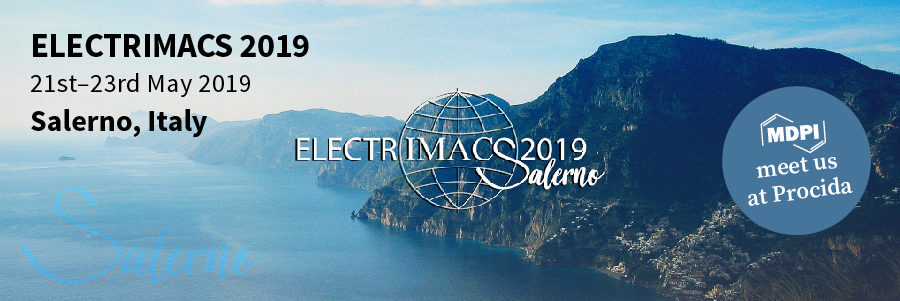
MDPI will be attending the ELECTRIMACS 2019, to be held in Salerno, Italy, 21 23 May 2019.
ELECTRIMACS 2019 - The 13th international conference of the IMACS TC1 Committee - is an international conference on theory and application of modelling, simulation, analysis, design optimization, identification and diagnostics in electrical power engineering.
The following MDPI journals will be represented:
If you are also attending this conference, please feel free to stop by our booth (Booth #Procida). Our delegates look forward to meeting you in person to answer any questions you may have. For more information about the conference, please visit: http://www.electrimacs2019.unisa.it/
20 March 2019
Fostering Open Access Publishing Worldwide: New IOAP Participants in February and March 2019
We are pleased to welcome more universities from Poland, Italy, Germany, Brazil and other parts of the world to MDPI's Institutional Open Access Program (IOAP). A warm welcome to the institutions listed below, who have joined the Program in February and March this year.
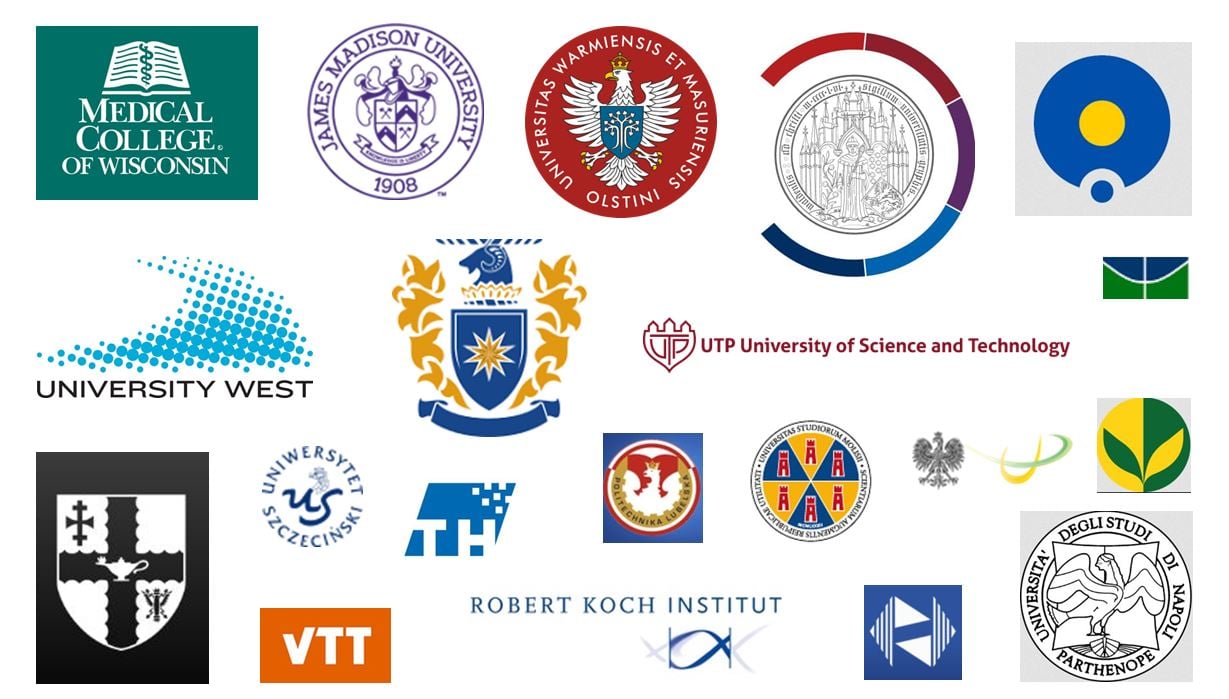
Authors affiliated with these institutions can now enjoy a discount on the APC for papers accepted for publication in any MDPI journal. If you would like to learn more about our program, please visit: https://www.mdpi.com/about/ioap or email us at ioap@mdpi.com.
5 March 2019
MDPI Joins Jisc’s Publications Router Service
We are delighted to announce our participation in Jisc’s Publication Router project, as of March 2019.
Publications Router is a Jisc service that automatically sends notifications about research articles to institutions' systems such as their repositories or CRISs, since May 2015. Through this agreement, MDPI will provide Jisc with daily feeds and information regarding published articles, which will be gathered by their system and delivered to institutions also registered to this service. Nearly all of our articles are published within 15 days of acceptance, so institutions will receive them quite promptly.
The feed will include the full text of the published version of record, with no embargo, so the articles can be exposed immediately for public view. They are accompanied by rich metadata, including confirmation of the immediate CC BY licence, minimising the need for any manual intervention or checking.
For more information about Publications Router, you may contact Jisc’s central helpdesk at help@jisc.ac.uk. For any queries about MDPI’s institutional agreements and collaborations, you may get in touch with MDPI’s Institutional Engagement team at ioap@mdpi.com, which would be very happy to hear from further UK institutions.
1 February 2019
2018 MDPI Top Reviewer Award—Winners Announced
Rigorous peer-review is the cornerstone of high quality academic publishing. Over 97,000 scholars served as reviewers for MDPI journals in 2018. We are extremely appreciative of all those who made a contribution to the editorial process in this capacity. At the beginning of every year, journal editorial offices publish a list all reviewers’ names to express our gratitude. In addition, this year the “MDPI Top Reviewer Awards” are announced, to recognize the very best reviewers for their expertise, dedication, high quality, and timely review reports. We are pleased to announce the following winners of the 2018 MDPI Top Reviewer Awards:
- Ali Behnood
- Andrea Pezzuolo
- Angela Gorgoglione
- Anna D'Auria
- Antonio D'Andrea
- Azhar Abbas
- Bogdan Zagajewski
- Chunhui Chen
- Dominika Głąbska
- Dominika Guzek
- Dragan Pamucar
- Francisco J. G. Silva
- Frank Li
- Gianluca Serafini
- Gyorgy Szekely
- Haozhi Pan
- Helvi Heinonen-Tanski
- José Manuel Gómez-Soberón
- Kathy Lewis
- Klara Kosova
- Luis N. López De Lacalle
- M. Z. Naser
- Malwina Tytła
- Masoume Amirkhani
- Matteo Ghidelli
- Moretti Laura
- Petra Schneider
- Roberto Cerchione
- Spyros Papaefthymiou
- Ştefan Cristian Gherghina
24 January 2019
JAMS Journals: A Low-Cost Publishing Platform
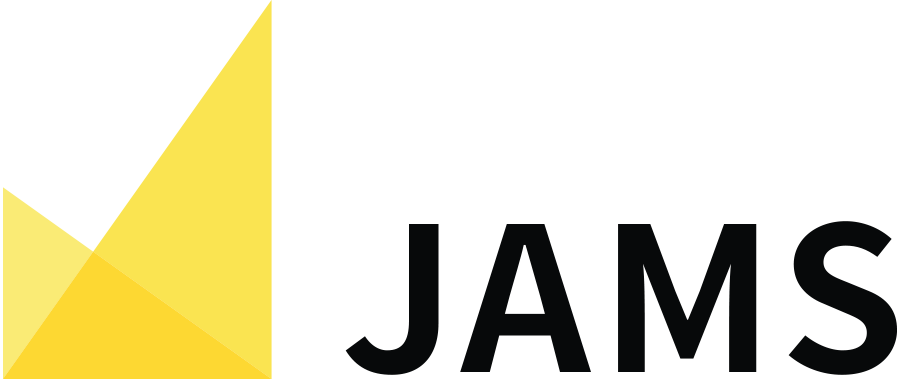
Since 2010, MDPI has run its own online submission system. More recently, we have made the software, with accompanying publishing services, available to other publishers as JAMS (Journal and Article Management System). We are now delighted to announce the launch of JAMS Journals, a standardized platform for operating open access journals at low cost.
JAMS Journals provides a comprehensive service, including a shared submission website, journal websites hosted at a URL provided by the publisher, and a full production service. There is a small setup fee and the cost for each published paper is just a few hundred Swiss francs.
The platform demonstrates that running an open access journal can be straightforward and affordable. The JAMS Journals platform is suitable for
- small publishers or groups of scholars looking to launch their own journal;
- existing publishers or societies seeking to explore open access options;
- publishers looking to convert an existing subscription journal to open access.
JAMS journals launches with two journals from Canadian-based publisher Etcetera Publications:
- Canadian Journal of Pesticides & Pest Management (http://www.cjppm.ca)
- Nanotechnology in Agriculture, Food & Environment (http://www.nanoafe.ca)
Dr AJ Al-Rajab (President of Etcetera Publications) comments:
“In the past few months, we were working on our project to launch new open access scientific journals in the field of agricultural and environmental sciences. We decided to go with JAMS for this venture because of the high quality of their services, reasonable prices, professionalism and easy communication. Our portfolio is expected to grow rapidly during 2019 to include more titles covering different areas in agriculture and environment. MDPI earned already our complete satisfaction and we are looking for a long term cooperation.”
Alongside the new platform, we continue to provide flexible, tailored journal management solutions for existing publishers. For any questions or to request a quotation, contact Dr. Constanze Schelhorn (constanze.schelhorn@mdpi.com).
24 January 2019
Popularity of Preprints Continues to Grow

2018 was a great year for preprints, with increasing numbers of authors looking to make their papers available online before peer review. Along with other preprint servers, our platform Preprints.org saw an increase in the uptake from authors, and more than double the number of announced papers compared to 2017. In fact, we recently passed two important milestones: 8000 preprints online and 30,000 authors.
We believe that the whole research community has the opportunity to benefit from work being available online as early as possible. We thank and congratulate our authors for supporting us to make this goal a reality.
In 2019, we will be looking carefully at how to provide better value for authors, maintain efficiency while growing in size, and make sure we remain well-connected with the research community.
If you want to participate, you can consider screening preprints or joining our advisory board. And, of course, posting your own work.
9 January 2019
Open Access Agreement between the Austrian Academic Library Consortium (KEMÖ), the Austrian Science Fund (FWF), and MDPI

We are delighted to announce the establishment of our national Open Access agreement with the Austrian Academic Library Consortium (KEMÖ) and the Austrian Science Fund (FWF). Through this national agreement, the Austrian institutions listed below as well as FWF will cover the Article Processing Charges (APC) of manuscripts published by eligible corresponding or funded authors in MDPI journals as long as central funds are available.
All participating institutions have gained access to the MDPI online submission system where they can find full article metadata and pricing information as well as Funder and Grant ID details for easy identification and additional transparency. At the same time eligible authors are benefited from an APC discount which comes at no cost for the institutions.
Eligible corresponding authors affiliated with the participating institutions are prompted to choose the corresponding Institutional Open Access Program (IOAP) when they submit an article via our online submission system. The program will be selected automatically if authors submit their papers using their institutional email address. To claim their discount, FWF funded authors should choose the particular funder and add their Grant ID upon online submission of their manuscript. The institutions will then crosscheck the information and confirm the APC funding.
Eligible authors that have their APC covered by their institution or funder are advised to include the following sentence in their acknowledgments: "Open Access Funding by the [name of the institution/funder]".
The full text of the agreement is openly available online at: http://doi.org/10.5281/zenodo.2536007
For any questions about the agreement, please contact the KEMÖ Consortium at emedien@obvsg.at, FWF at Katharina.Rieck@fwf.ac.at, or the MDPI IOAP team at ioap@mdpi.com.
The Austrian institutions participating in this agreement are:
- Austrian Science Fund (FWF)
- University for Continuing Education Krems
- University of Applied Sciences BFI Vienna
- University of Applied Sciences Upper Austria
- University of Applied Sciences Technikum Wien
- Vorarlberg University of Applied Sciences
- International Institute for Applied Systems Analysis (IIASA)
- Institute of Science and Technology Austria
- MCI Management Center Innsbruck
- University of Graz
- University of Linz
- University of Salzburg
- Graz University of Technology
- TU Wien
- University of Veterinary Medicine Vienna
- University of Vienna
This is our first collective agreement with a national library consortium, while the individual institutions around the world participating in our IOAP are now more than 500 - see details here: https://www.mdpi.com/about/ioap. We would be mostly interested in discussing about possible collaborations with other consortia, funders, and institutions in our mutual efforts to accelerate Open Access.
2 January 2019
Encyclopedia—the Scholarly Community Encyclopedia

We are pleased to announce the new platform Encyclopedia, which is an online reference created and curated by active scholars. It aims to highlight the latest research results as well as providing benchmark information for researchers and the general public interested in accurate and advanced knowledge on specific topics.
We encourage authors of review articles to quote and adapt the content of their published papers to create Encyclopedia entries. You can create completely new entries on topics in which you have knowledge and expertise. There is no limit on the topics or research fields. All of science and the humanities are included. Each entry will be published directly after submission.
We also have prepared a DOI application function in Encyclopedia. Once a DOI application is approved, the entry website will announce the DOI number and a pdf version with DOI information will be automatically created.
We look forward to your contributions and hope you will make use of this service. Find more about the service at: https://encyclopedia.pub/
30 October 2018
Institutional Open Access Agreement between Bill and Melinda Gates Foundation and MDPI
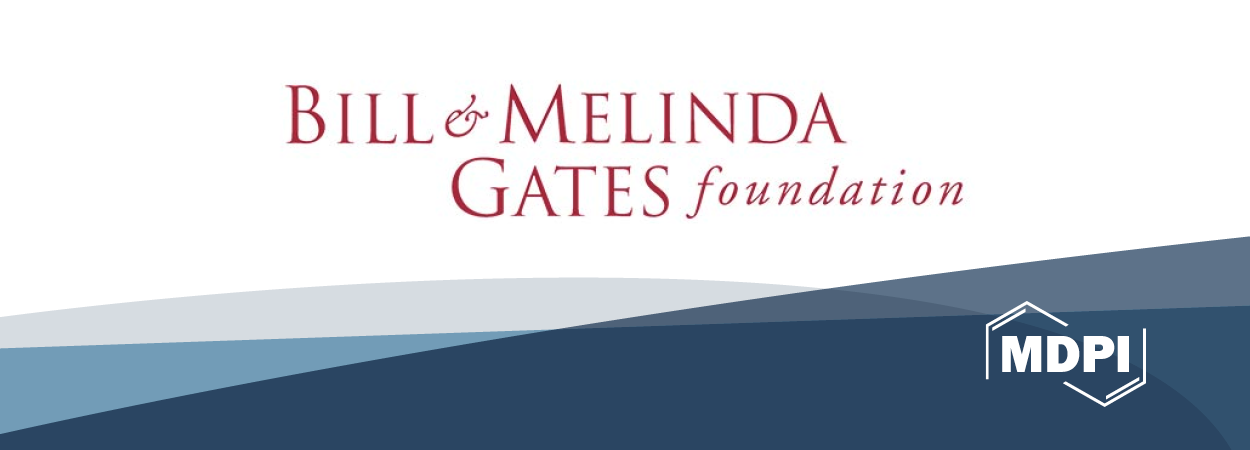
We are delighted to announce that the Bill and Melinda Gates Foundation (BMGF) is now a participant of our Institutional Open Access Program (IOAP). Authors funded by the BMGF can enjoy discounts on the APC, while the funder covers the costs of eligible articles centrally. BMGF also has access to the MDPI online submission system where they can find full article metadata and pricing information as well as Grant ID details for easy identification and additional transparency.
We hope that funded authors find the programme beneficial and we are happy to offer our IOAP to other funders that need a streamlined workflow of compliance checking and APC coverage.
To claim their discount, BMGF funded authors should choose the particular funder and add their Grant ID upon online submission of their manuscript.
For any questions about the BMGF agreement, please contact the funder at support@chronos-oa.com or the MDPI IOAP team at ioap@mdpi.com.
2 October 2018
MDPI Welcomes Plan S
Recently, it was announced that a group of European funders supported 10 principles that will help to expand open access, known as Plan S. MDPI warmly welcomes this move as a step towards achieving more open and accessible communication of research across all disciplines. Some aspects remain to be clarified, however the details given so far match the aims and values that MDPI has held over the past two decades.

We believe that open access publishers should be active participants in discussions around Plan S, particularly regarding potential new business models and practical aspects of implementation. MDPI supports APCs as a transparent unit of payment for article publishing, however we are committed to exploring other measures and recently signed the Jussieu Call. Sustainability is a key value for MDPI, and future funding models should have at their heart the sustainability of knowledge and research dissemination. Plan S provides an opportunity for funders and publishers to directly discuss funding of open access journals in ways that are beneficial to all parties involved.
30 August 2018
MDPI establishes Open Access agreement with Qatar National Library

We are happy to announce the establishment of an Open Access (OA) agreement with Qatar National Library (QNL). QNL is committed to supporting and helping Qatar authors publish OA at no cost. Through this national agreement, QNL will cover the Article Processing Charges (APC) of manuscripts published by Qatar-based corresponding authors in MDPI journals.
Eligible corresponding authors affiliated with Qatar research centers and universities are prompted to choose QNL as part of our Institutional Open Access Program (IOAP) when they submit an article via our online submission system. The program will be selected automatically if authors submit their papers using their institutional email and/or a computer registered with the institution’s IP range. QNL will then crosscheck the information and confirm the APC funding.
Qatar authors that have their APC covered by QNL are advised to include the following sentence in their acknowledgments: "The publication of this article was funded by Qatar National Library".
For more information, please visit Open Access at QNL or email the QNL Open Access team at openaccess@qnl.qa.
27 August 2018
Mathematics, Metabolites and Pathogens Accepted for Inclusion in the Science Citation Index Expanded (SCIE) in Web of Science
We are pleased to inform the journals Mathematics (ISSN 2227-7390), Metabolites (ISSN 2218-1989) and Pathogens (ISSN 2076-0817) have been accepted for inclusion in the Science Citation Index Expanded (SCIE) in the Web of Science Core Collection. These journals are due to receive first Journal Impact Factors in the June 2019 release of the Journal Citation Reports.



The Science Citation Index Expanded (SCIE), Web of ScienceTM, BIOSIS Previews and Current Contents are Clarivate Analytics products.
31 May 2018
2017 CiteScore™ Metrics Released
The 2017 CiteScore™ data is available now, based on citation data in the Scopus® database. The current CiteScore reflects citation activity in 2017 for articles published in 2014‒2016. Please note that the list below includes journals assigned a CiteScore in this year’s release. For a full list of journals indexed in Scopus, please see our journal list.
Thirteen of our journals received a CiteScore which is in the top 10% of the distribution in at least one of the categories (marked with * in the table below), while a further 32 journals exhibit scores that are in the first quartile of the respective categories.
To access the full data for MDPI journals, please see here. More data can also be found in SJR Scimago Journal & Country Rank.
Unlike CiteScores and the widely used Journal Impact Factors, the Source Normalized Impact per Paper (SNIP) metrics are normalized in order to correct for differences in citation practices between scientific fields. Therefore, the SNIP allows direct comparison between journals specialized in different fields.
According to 2017 data, MDPI publishes six journals with an average citation impact, or SNIP, in excess of 1.500. These journals are Biomolecules, Cancers, Journal of Clinical Medicine (JCM), Marine Drugs, Remote Sensing and Sensors (see the last column in the table below).
CiteScore Data for MDPI Journals
| Journal | Rank (Quartile) |
Category | Link | CiteScore 2017 | 2016 |
2015 |
SNIP 2017 |
| Aerospace | 43/116 (Q2) | • Aerospace Engineering | Link | 1.23 | - | - | 1.152 |
| Agriculture | 69/309 (Q1) 91/398 (Q1) 78/255 (Q2) |
• Agronomy and Crop Science • Plant Science • Food Science |
Link | 1.93 | - | - | 1.133 |
| Agronomy | 46/309 (Q1) | • Agronomy and Crop Science | Link | 2.38 | - | - | 1.115 |
| Algorithms | 22/46 (Q2) 61/125 (Q2) 60/107 (Q3) 64/114 (Q3) |
• Numerical Analysis • Computational Mathematics • Computational Theory and Mathematics • Theoretical Computer Science |
Link | 1.03 | 1.15 | 1.07 | 0.749 |
| Animals | 12/154 (Q1) * 48/367 (Q1) |
• General Veterinary • Animal Science and Zoology |
Link | 2.02 | 1.46 | 1.66 | 1.099 |
| Antibiotics | 6/68 (Q1) * 62/263 (Q1) 55/230 (Q1) 31/108 (Q2) 47/134 (Q2) 139/398 (Q2) |
• General Pharmacology, Toxicology and Pharmaceutics • Infectious Diseases • Pharmacology (medical) • Microbiology (medical) • Microbiology • Biochemistry |
Link | 2.85 | 1.65 | - | 0.975 |
| Antibodies | 43/143 (Q2) 61/164 (Q2) 85/189 (Q2) |
• Drug Discovery • Immunology and Allergy • Immunology |
Link | 2.85 | - | - | 0.844 |
| Antioxidants | 23/119 (Q1) 35/169 (Q2) 100/398 (Q2) 119/367 (Q2) 102/264 (Q2) |
• Clinical Biochemistry • Physiology • Biochemistry • Molecular Biology • Cell Biology |
Link | 3.42 | - | - | 1.361 |
| Applied Sciences | 48/270 (Q1) 15/66 (Q1) 31/116 (Q2) 18/53 (Q2) 151/434 (Q2) 186/535 (Q2) |
• General Engineering • Fluid Flow and Transfer Processes • Instrumentation • Process Chemistry and Technology • General Materials Science • Computer Science Applications |
Link | 1.90 | - | - | 0.801 |
| Biology | 12/177 (Q1)* 32/186 (Q1) 10/40 (Q1) |
• General Agricultural and Biological Sciences • General Biochemistry, Genetics and Molecular Biology • General Immunology and Microbiology |
Link | 3.48 | 3.02 | 2.78 | 0.961 |
| Biomolecules | 31/398 (Q1) * 41/367 (Q1) |
• Biochemistry • Molecular Biology |
Link | 5.72 | 1.67 | 3.08 | 1.542 |
| Biosensors | 20/119 (Q1) | • Clinical Biochemistry | Link | 3.59 | 2.83 | 2.37 | 1.122 |
| Brain Sciences | 47/111 (Q2) | • General Neuroscience | Link | 2.56 | - | - | 0.695 |
| Cancers | 26/323 (Q1) * 23/191 (Q1) |
• Oncology • Cancer Research |
Link | 5.82 | 5.02 | 4.07 | 1.567 |
| Catalysts | 32/151 (Q1) 21/46 (Q2) |
• Physical and Theoretical Chemistry • Catalysis |
Link | 3.23 | 3.44 | 3.45 | 0.954 |
| Crystals | 76/272 (Q2) 140/434 (Q2) 127/398 (Q2) 26/64 (Q2) |
• General Chemical Engineering • General Materials Science • Condensed Matter Physics • Inorganic Chemistry |
Link | 1.97 | 1.89 | 1.47 | 0.745 |
| Diagnostics | 49/119 (Q2) | • Clinical Biochemistry | Link | 2.43 | - | - | 0.788 |
| Diversity | 30/124 (Q1) 14/52 (Q2) 83/306 (Q2) 11/29 (Q2) |
• Nature and Landscape Conservation • Agricultural and Biological Sciences (miscellaneous) • Ecology • Ecological Modelling |
Link | 2.15 | 2.03 | 1.96 | 1.300 |
| Electronics | 109/644 (Q1) 26/148 (Q1) 42/224 (Q1) 50/259 (Q1) 23/96 (Q1) |
• Electrical and Electronic Engineering • Hardware and Architecture • Control and Systems Engineering • Computer Networks and Communications • Signal Processing |
Link | 2.97 | - | - | 1.227 |
| Energies | 6/73 (Q1) * 31/192 (Q1) 103/644 (Q1) 4/16 (Q1) 47/140 (Q2) |
• Control and Optimization • Energy Engineering and Power Technology • Electrical and Electronic Engineering • Energy (miscellaneous) • Renewable Energy, Sustainability and the Environment |
Link | 3.11 | 2.50 | 2.87 | 1.340 |
| Entropy | 35/202 (Q1) | • General Physics and Astronomy | Link | 2.41 | 1.87 | 1.99 | 1.189 |
| Forests | 17/129 (Q1) | • Forestry | Link | 2.31 | 2.06 | 1.76 | 0.990 |
| Future Internet | 132/259 (Q3) | • Computer Networks and Communications | Link | 1.25 | - | - | - |
| Games | 132/187 (Q3) 78/110 (Q3) 305/418 (Q3) |
• Statistics and Probability • Statistics, Probability and Uncertainty • Applied Mathematics |
Link | 0.61 | 0.87 | 0.57 | 1.038 |
| Genes | 21/91 (Q1) 74/311 (Q1) |
• Genetics (clinical) • Genetics |
Link | 3.49 | 3.62 | 3.18 | 0.374 |
| Geosciences | 32/182 (Q1) |
• General Earth and Planetary Sciences | Link | 1.97 | 1.67 | 1.29 | 0.856 |
| Information | 143/251 (Q3) | • Information Systems | Link | 1.16 | 0.78 | 0.94 | 1.146 |
| Insects | 27/135 (Q1) | • Insect Science | Link | 1.85 | 1.81 | 1.38 | 0.719 |
| International Journal of Environmental Research and Public Health (IJERPH) | 80/478 (Q1) 34/106 (Q2) |
• Public Health, Environmental and Occupational Health • Health, Toxicology and Mutagenesis |
Link | 2.41 | 2.38 | 2.42 | 0.931 |
| International Journal of Molecular Sciences (IJMS) | 7/69 (Q1) * 61/535 (Q1) 20/163 (Q1) 9/64 (Q1) 26/151 (Q1) 89/367 (Q2) 17/46 (Q2) |
• Spectroscopy • Computer Science Applications • Organic Chemistry • Inorganic Chemistry • Physical and Theoretical Chemistry • Molecular Biology • Catalysis |
Link | 3.86 | 3.73 | 3.37 | 0.998 |
| ISPRS International Journal of Geo-Information (IJGI) | 79/605 (Q1) 22/82 (Q2) 13/36 (Q2) |
• Geography, Planning and Development • Earth and Planetary Sciences (miscellaneous) • Computers in Earth Sciences |
Link | 2.10 | 1.62 | 1.52 | 1.062 |
| Journal of Clinical Medicine (JCM) | 10/841 (Q1) * | • General Medicine | Link | 7.07 | - | - | 1.535 |
| Journal of Functional Biomaterials (JFB) | 43/199 (Q1) 23/77 (Q2) |
• Biomedical Engineering • Biomaterials |
Link | 3.47 | - | - | 1.344 |
| Journal of Low Po- wer Electronics and Applications (JLPEA) |
301/644 (Q2) | • Electrical and Electronic Engineering | Link | 1.12 | 0.98 | 0.83 | 0.367 |
| Journal of Personalized Medicine (JPM) | 54/189 (Q2) | • Medicine (miscellaneous) | Link | 2.61 | - | - | 0.944 |
| Land | 50/124 (Q2) 129/306 (Q2) 36/65 (Q3) |
• Nature and Landscape Conservation • Ecology • Global and Planetary Change |
Link | 1.44 | - | - | 0.658 |
| Life | 4/94 (Q1) * 70/561 (Q1) 40/186 (Q1) 20/80 (Q2) |
• Palaeontology • Ecology, Evolution, Behavior and Systematics • General Biochemistry, Genetics and Molecular Biology • Space and Planetary Science |
Link | 3.16 | 2.95 | 1.68 | 0.935 |
| Marine Drugs | 17/146 (Q1) | • Drug Discovery | Link | 4.58 | 3.83 | 3.66 | 1.537 |
| Materials | 83/434 (Q1) | • General Materials Science | Link | 3.02 | 3.26 | 3.11 | 1.285 |
| Membranes | 5/18 (Q2) 15/53 (Q2) 4/10 (Q2) |
• Chemical Engineering (miscellaneous) • Process Chemistry and Technology • Filtration and Separation |
Link | 2.69 | 2.19 | 2.95 | 0.880 |
| Metabolites | 47/209 (Q1) 103/398 (Q2) 127/367 (Q2) |
• Endocrinology, Diabetes and Metabolism • Biochemistry • Molecular Biology |
Link | 3.35 | - | - | 0.925 |
| Metals | 155/434 (Q2) | • General Materials Science | Link | 1.87 | - | - | 0.955 |
| Micromachines | 105/554 (Q1) 154/644 (Q1) 64/224 (Q2) |
• Mechanical Engineering • Electrical and Electronic Engineering • Control and Systems Engineering |
Link | 2.31 | 1.83 | 1.78 | 0.987 |
| Minerals | 33/175 (Q1) 45/208 (Q1) |
• Geotechnical Engineering and Engineering Geology • Geology |
Link | 2.21 | 2.13 | 1.77 | 1.149 |
| Molecules | 4/25 (Q1) 25/172 (Q1) 18/104 (Q1) 31/163 (Q1) 30/151 (Q1) 31/146 (Q1) 55/160 (Q2) |
• Chemistry (miscellaneous) • Pharmaceutical Science • Analytical Chemistry • Organic Chemistry • Physical and Theoretical Chemistry • Drug Discovery • Molecular Medicine |
Link | 3.27 | 3.09 | 2.65 | 1.146 |
| Nutrients | 11/255 (Q1) * 9/112 (Q1) * |
• Food Science • Nutrition and Dietetics |
Link | 4.35 | 4.29 | 4.07 | 1.403 |
| Pathogens | 38/263 (Q1) 20/108 (Q1) 9/40 (Q1) 40/164 (Q1) 110/367 (Q2) |
• Infectious Diseases • Microbiology (medical) • General Immunology and Microbiology • Immunology and Allergy • Molecular Biology |
Link | 3.52 | - | - | 1.166 |
| Pharmaceuticals | 14/172 (Q1) * 33/160 (Q1) |
• Pharmaceutical Science • Molecular Medicine |
Link | 4.12 | 4.90 | 3.64 | 1.370 |
| Pharmaceutics | 21/172 (Q1) | • Pharmaceutical Science | Link | 3.68 | 3.83 | 2.68 | 1.092 |
| Photonics | 30/116 (Q1) 80/270 (Q2) 53/160 (Q2) |
• Instrumentation • Radiology Nuclear Medicine and Imaging • Atomic and Molecular Physics, and Optics |
Link | 1.96 | - | - | 0.817 |
| Plants | 73/561 (Q1) 48/389 (Q1) 44/306 (Q1) |
• Ecology, Evolution, Behavior and Systematics • Plant Science • Ecology |
Link | 3.13 | - | - | 0.969 |
| Polymers | 17/142 (Q1) 63/359 (Q1) |
• Polymers and Plastics • General Chemistry |
Link | 3.30 | 3.74 | 3.37 | 1.213 |
| Religions | 26/389 (Q1) * | • Religious Studies | Link | 0.56 | - | - | 0.676 |
| Remote Sensing | 13/182 (Q1) * | • General Earth and Planetary Sciences | Link | 4.03 | 3.56 | 3.76 | 1.559 |
| Resources | 19/142 (Q1) 39/261 (Q1) |
• Nature and Landscape Conservation • Management, Monitoring, Policy and Law |
Link | 2.69 | - | - | 1.387 |
| Scientia Pharmaceutica | 92/172 (Q3) | • Pharmaceutical Science | Link | 0.86 | - | - | 0.513 |
| Sensors | 9/116 (Q1) * 25/160 (Q1) 100/644 (Q1) 19/104 (Q1) 113/398 (Q2) |
• Instrumentation • Atomic and Molecular Physics, and Optics • Electrical and Electronic Engineering • Analytical Chemistry • Biochemistry |
Link | 3.23 | 2.78 | 2.21 | 1.550 |
| Social Sciences | 81/213 (Q2) | • General Social Sciences | Link | 0.60 | - | - | 0.445 |
| Sustainability | 61/605 (Q1) * 55/261 (Q1) 60/140 (Q2) |
• Geography, Planning and Development • Management, Monitoring, Policy and Law • Renewable Energy, Sustainability and the Environment |
Link | 2.37 | 1.96 | 1.78 | 1.030 |
| Symmetry | 44/327 (Q1) 17/45 (Q2) 16/40 (Q2) 14/25 (Q2) |
• General Mathematics • Computer Science (miscellaneous) • Physics and Astronomy (miscellaneous) • Chemistry (miscellaneous) |
Link | 1.32 | 1.12 | 0.95 | 0.802 |
| Toxins | 18/106 (Q1) 21/111 (Q1) |
• Health, Toxicology and Mutagenesis • Toxicology |
Link | 3.32 | 3.34 | 3.76 | 1.136 |
| Vaccines | 5/230 (Q1) * 13/263 (Q1) * 18/302 (Q1) * 11/146 (Q1) * 32/189 (Q1) |
• Pharmacology (medical) • Infectious Diseases • Pharmacology • Drug Discovery • Immunology |
Link | 4.88 | 1.23 | 3.76 | 1.255 |
| Viruses | 29/263 (Q1) 16/68 (Q1) |
• Virology • Infectious Diseases |
Link | 3.88 | 3.60 | 3.74 | 1.130 |
| Water | 66/605 (Q1) 37/191 (Q1) 43/199 (Q1) 193/398 (Q2) |
• Geography, Planning and Development • Water Science and Technology • Aquatic Science • Biochemistry |
Link | 2.29 | 2.05 | 1.96 | 1.007 |
30 April 2018
Winners of the First MDPI Writing Prize
We are pleased to announce the results of the first MDPI Writing Prize. We received a large number of entries from across the globe on the theme of “The Global Benefits of Open Research”. It was a pleasure to read so many original, well-researched and well-presented ideas, and the final choice was not an easy one. We are pleased to announce that the winners are as follows:
1st prize (500 CHF, Swiss knife and certificate)
Edmond Sanganyado, Shantou University, China
2nd prizes (250 CHF, Swiss knife and certificate)
Kamala T. Rajahgopal, Asia e University, Malaysia
Yin Zhixuan, Qingdao University of Technology, China
3rd prizes (100 CHF, Swiss knife and certificate)
Alexandra Ticea, Carol Davila University of Medicine and Pharmacy, Romania
Ankur Sarker, University of Virginia, USA
Daniel Attoye, United Arab Emirates University, UAE
Congratulations to all of them! The winning entries can be downloaded by clicking on the names above. A compilation of all entries will soon be available as an open access book.
The writing prize is sponsored by the MDPI English editing service.
23 March 2018
Check for Updates: A New Function in the Article PDF Version

At MDPI, we always want to keep you up to date. Even for already published articles, some corrections or minor changes may occur. To prevent you from missing any updates, from now on you will be able to access the latest version of any manuscript by clicking on the “check for updates” logo that you can find in the PDF file, even if you have saved the file on your computer.
13 March 2018
MDPI Becoming a Member of UKSG
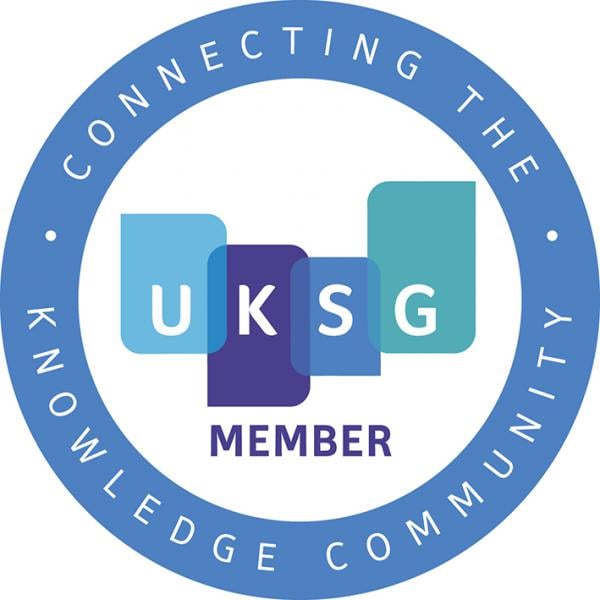
We are proud to announce that MDPI is now a member of UKSG, the UK´s largest scholarly communications community. Through UKSG, different stakeholders share their knowledge and experience in order to improve the knowledge and information environment for researchers. UKSG´s members include universities, publishers, content providers, intermediaries, and other similar organisations. Members participate in discussions and events on issues around scholarly communications.
The UKSG Annual Conference and Exhibition is a flagship initiative from the UKSG and one of the most stimulating events in the scholarly communications calendar. It is held annually and attracts a large number of delegates. More information is available at https://www.uksg.org/events/annualconference
MDPI is delighted to be a part of this active community and we look forward to making our own contribution. We will continue to support organisations and initiatives that boost collaboration and vision within scholarly communication.
More information about UKSG can be found at https://www.uksg.org/. The full membership list is available at: https://www.uksg.org/members.
1 February 2018
MDPI Signed the San Francisco Declaration on Research Assessment (DORA)

The DORA initiative addresses the need for advanced approaches in the evaluation and measurement of the quality of scientific research outputs. It is a worldwide initiative covering all scholarly disciplines. MDPI proudly joins a list of more than 400 organizations around the world which support DORA’s recommendations for improving the way the quality of research results is evaluated.
More info can be found at http://www.ascb.org/dora/
25 January 2018
Meet Us at the ACS National Meeting & Exposition in New Orleans, USA, 18–22 March 2018

We will be attending the 255th ACS National Meeting & Exposition. It is an interdisciplinary forum open to anyone with an interest in Chemistry and the related disciplines. Representatives of the following open access journals will attend:
Agronomy
Applied Sciences
Beverages
Biomimetics
Biosensors
C
Catalysts
ChemEngineering
Chemosensors
Coatings
Energies
Environments
Fibers
Foods
Gels
Inorganics
Journal of Marine Science and Engineering (JMSE)
Lubricants
Materials
Mathematics
Metals
Molecules
Nanomaterials
Polymers
Processes
Resources
Safety
Sensors
Separations
Sustainability
Symmetry
Toxins
Water
If you are also attending this conference, please feel free to stop by our booth (Booth #640). Our delegates look forward to meeting you in person to answer any questions you may have. For more information about the conference, please visit: https://www.acs.org/content/acs/en/meetings/national-meeting.html?sc=home_meetings_170818_mtg_NO18_od
19 December 2017
Announcing the MDPI English Writing Prize
The competition is still open until end of March! Please check out the banner for more details: https://mdpi-res.com/data/english-prize.pdf
15 December 2017
UCL Press Adopts the MDPI Editorial Platform JAMS
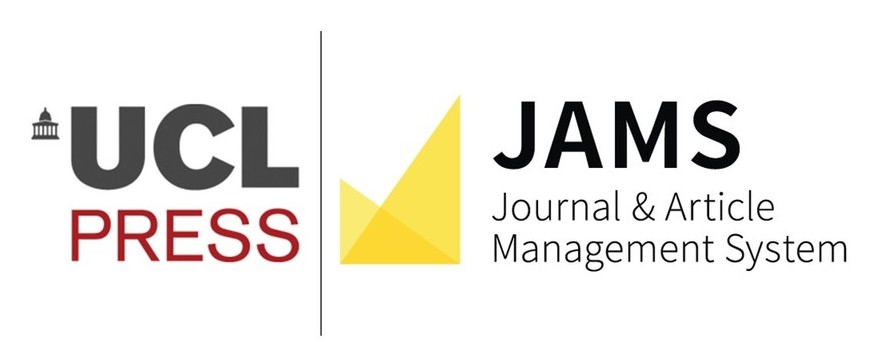
We are delighted to announce that UCL Press has adopted MDPI's Journal Article & Management System, JAMS, including production services. JAMS is a modular, integrated editorial platform for academic publishers. It offers flexibility, ease-of-use, and is a fully integrated solution for the end-to-end management of scholarly journals. JAMS is based on the software used to publish MDPI’s portfolio of journals.
Ian Caswell, UCL Press Journals Manager, says he is "excited to see UCL Press and MDPI partner together to implement the JAMS submission system for all UCL Press journals. The system offered a flexible, efficient and straightforward solution for our processes from author submission to ready for publication. I am grateful for the valuable experience and support MDPI have offered and look forward to developing our programme with an effective submission system in place.” Dr Martyn Rittman, MDPI’s Publishing Services Manager, adds, “We are proud to support one of the UK’s premier university presses in their publishing operation. This is an excellent way for us at MDPI to share our experience and knowledge, and benefit the research community beyond our own journals.”
JAMS combines services that are kept separate for many publishers. The entire editorial process, production and invoicing (e.g. for open access article processing charges) are fully integrated into a single platform. This allows for efficient, fast manuscript processing. For further information about JAMS, see https://www.mdpi.com/publishing_services.
4 December 2017
Join Us at JMM 2018, San Diego, January 10–13, 2018
Symmetry
Algorithms
Computation
Mathematical and Computational Applications (MCA)
Mathematics
Universe
Axioms
If you are also attending this conference, please stop by our booth (Booth #L622). Our delegates look forward to meeting you in person to answer any questions you may have. For more information about the conference, please visit: http://jointmathematicsmeetings.org/jmm.
Conference Address:
San Diego Convention Center
111 West Harbor Drive
San Diego, CA 92101
USA
Marriott Marquis San Diego Marina
333 West Harbor Drive
San Diego, CA 92101
USA

23 November 2017
New Participants in the Institutional Open Access Program (IOAP)
We are pleased to welcome new participants to MDPI's Institutional Open Access Program (IOAP), designed to help institutions manage the transition to the Open Access publishing model. Researchers affiliated with participating universites benefit from a 10% discount on the Article Processing Charges (APC) for any paper published in an MDPI journal, while the participating library or university incurs no basic fee for participating in the program.
The IOAP set of free services, provided by MDPI to institutions that sign up, include:- No fee for participants and no obligation to prolong after the initial 12 months. The participants may withdraw from the programme at any time, and we will also keep it free for the library for as long as they continue in the programme.
- Authors affiliated with the university will receive a 10% discount on the APC.
- The institution is granted free access to the MDPI submission system and can receive free alerts of new submissions to our journals.
- By default, authors from the institution will continue to be invoiced directly unless the institution opts for central billing.
- Auto-archiving of papers into the institutions´ repository as long as it supports SWORD 1.3.
More details about the programme and a list of our current participant institutions can be found at: https://www.mdpi.com/about/ioap
Institutions which are interested to participate may do so online at: https://www.mdpi.com/ioap-form
The following North American universities have signed up to the IOAP program recently:
Connecticut College, USA
Emory University, USA
Florida International University, USA
Johns Hopkins University, USA
Mississippi State University, USA
Northeastern University, USA
Rice University, USA
University of Ontario Institute of Technology, Canada
University of Rhode Island, USA
University of Texas Southwestern Medical Center, USA
University of Toronto, Canada
University of Windsor, Canada
University of Wisconsin–Madison, USA
Wellesley College, USA
West Virginia University, USA
Many prestigious institutions from Europe and Asia have joined as well:
Asia Pacific University of Technology & Innovation, Malaysia
Czech Technical University in Prague, Czech Republic
Gdansk University of Technology, Poland
Martin-Luther-Universität Halle-Wittenberg, Germany
National Chung Hsing University, Taiwan
Newcastle University, UK
Northumbria University, UK
Southwest University, China
Technical University of Crete, Greece
University Malaya, Malaysia
University of Antwerp, Belgium
University of Cyprus, Cyprus
University of Manchester, UK
University of Reading, UK
University of Sussex, UK
University of Warwick, UK
West Pomeranian University of Technology Szczecin, Poland
We offer a warm welcome to the new participants!
10 November 2017
Available Journal Awards at MDPI
In order to reward the academic community, especially young researchers, and enhance communication among scientists, MDPI journals regularly offer various awards to researchers in specific fields, for example, Young Investigator Awards, Travel Awards, Best Paper Awards, and Best Poster Awards, etc. The awardees range from PhD students to junior scientists.
Currently, the following 44 awards given by MDPI journals are accepting applications. Please click on the award title below to check whether you are eligible for it and start the application process.
|
Subject |
Journal |
Award |
Intended Awardee |
|
Biology & Life Sciences |
Animals |
PhD students or postdoctoral researchers |
|
|
Antioxidants |
Postdoctoral researchers or PhD students |
||
|
Biology |
PhD or postdoctoral fellows |
||
|
Forests |
Postdocs or PhD students |
||
|
International Journal of Molecular Sciences (IJMS) |
Ground-breaking contribution in the fields of Molecular Biology, and Molecular Pathology |
||
|
Journal of Fungi (JoF) |
Travel Awards 2018 |
PhD graduate students, and postdoctoral fellows |
|
|
Life |
Travel Award 2018 |
PhD students or postdoctoral fellows |
|
|
Metabolites |
PhD students |
||
|
Pharmaceuticals |
PhD students |
||
|
Toxins |
Postdoctoral fellows |
||
|
Viruses |
Viruses 2018 participants |
||
|
Viruses |
Viruses 2018 participants |
||
|
Water |
2018 Young Investigator Award |
Young investigators |
|
|
Chemistry & Materials Science |
Biomimetics
|
Graduate Student or Postdoctoral Trainee / Research Associate |
|
|
Catalysts |
PhD students |
||
|
Chemosensors |
PhD or postdoctoral fellows |
||
|
Entropy |
Young investigators |
||
|
Fibers |
2018 Travel award |
Postdocs or PhD students |
|
|
Magnetochemistry |
Postdocs |
||
|
Materials |
PhD or postdoctoral fellows |
||
|
Metals |
PhD or postdoctoral fellows |
||
|
Minerals |
PhD or postdoctoral fellows |
||
|
Sensors |
Travel Award 2018 |
PhD or postdoctoral fellows |
|
|
Sensors |
Sensors' reviewers in 2017 |
||
|
Sensors |
Young investigators |
||
|
Technologies |
PhD students |
||
|
Computer Science & Mathematics |
Multimodal Technologies and Interaction (MTI) |
Postdoctoral researchers or PhD students |
|
|
ISPRS International Journal of Geo-Information(IJGI) |
Postdocs |
||
|
Journal of Sensor and Actuator Networks (JSAN) |
Postdoctoral fellows and PhD students |
||
|
Journal of Imaging |
Postdoctoral fellows and PhD students |
||
|
Engineering |
Actuators |
PhD or postdoctoral fellows |
|
|
Remote Sensing |
Authors |
||
|
Machines |
PhD or postdoctoral fellows |
||
|
Micromachines |
PhD or postdoctoral fellows |
||
|
Fluids |
Postdoctoral fellows and PhD students |
||
|
ChemEngineering |
Postdoctoral researchers and PhD students |
||
|
Environmental & Earth Sciences |
Diversity |
Travel Awards 2018 |
Postdoctoral fellows |
|
International Journal of Environmental Research and Public Health (IJERPH) |
Authors who submit from 1 Nov 2017 to 31 Oct 2018 |
||
|
Resources |
Postdocs or PhD students |
||
|
Geosciences |
Postdoctoral fellows and PhD students |
||
|
Physical Sciences & Astronomy |
Galaxies |
Ph.D. students, postdoctoral fellows, or lecturers in cosmology or galaxies physics |
|
|
Applied Science |
Postdocs |
||
|
Medicine & Pharmacology; Public Health & Healthcare |
Journal of Clinical Medicine (JCM) |
PhD or postdoctoral fellows |
|
|
Medicines |
Postdocs |
7 November 2017
MDPI has signed the Jussieu Call for Open Science and Bibliodiversity
The Jussieu Call aims to develop and implement alternative models to meet the aims of open science while promoting bibliodiversity. In particular it wishes to promote new business models for funding open access publication. It was drafted on the Jussieu campus in Paris by a group of French researchers and scientific publishing professionals.
MDPI supports scholarly communities and initiatives that innovate and further promote Open Access publishing. There is a need to explore different frameworks to fund open access in ways that ensure that excessive funds are not diverted from research towards publishing. Many fair funding models already exist, and they can be further developed and extended. These include institutional support, library contributions or subsidies, premium services, participatory funding, etc. For this reason, MDPI has signed up to the Jussieu call and welcomes its aims.
More information can be found at http://jussieucall.org/ (archived here)
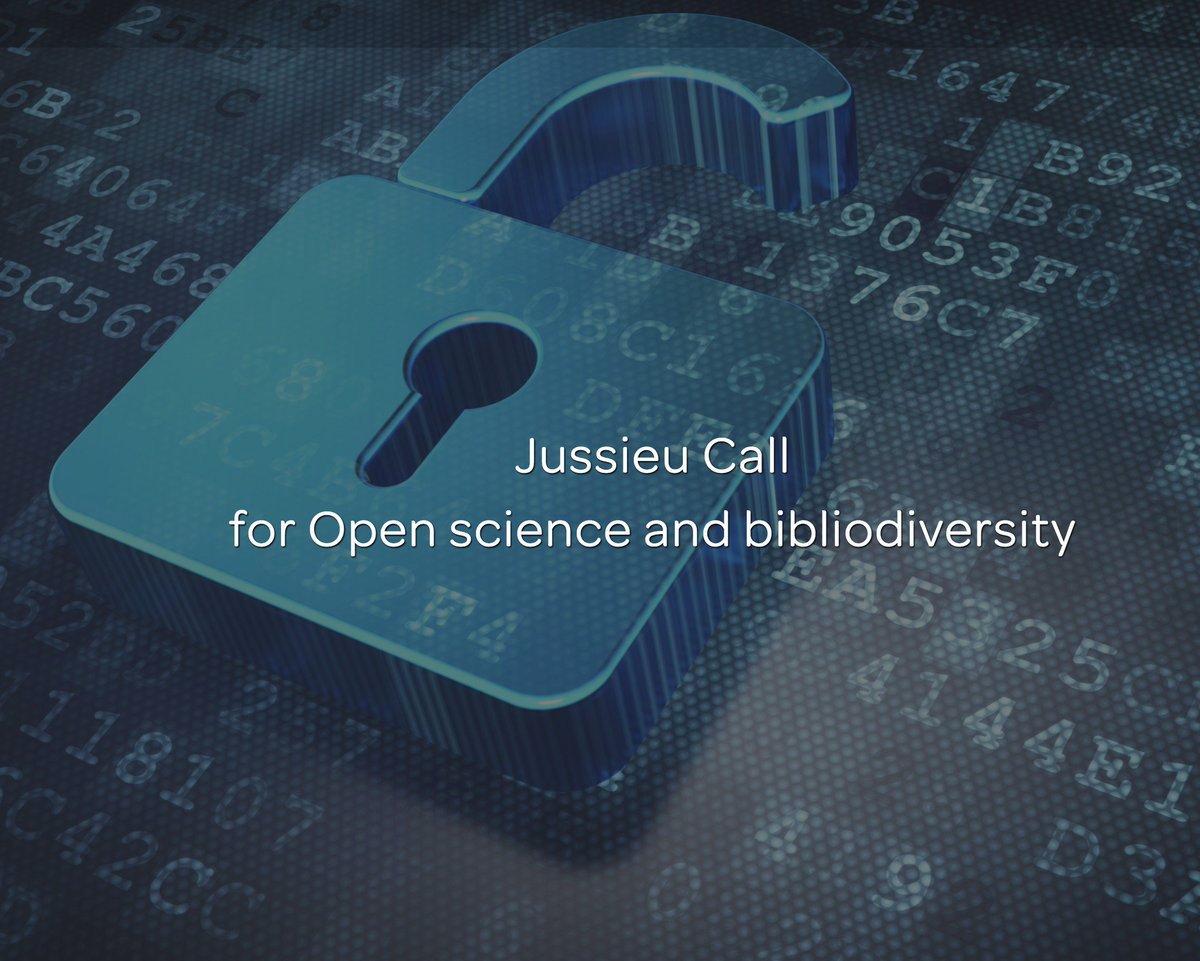
30 October 2017
Meet us at NIPS 2017: Long Beach on December 4–9, 2017
We will be attending the NIPS 2017, an interdisciplinary conference that brings together researchers in all aspects of neural and statistical information processing and computation, and their applications. It will be held at Long Beach on 4-9 December 2017, representing the following MDPI open access journals:
Entropy
Symmetry
Information
Games
Computation
Algorithms
Mathematics
Mathematical and Computational Applications (MCA)
Data
Systems
Robotics
Machines
Big Data and Cognitive Computing (BDCC)
Machine Learning and Knowledge Extraction (MAKE)
If you are also attending this conference, please feel free to stop by our booth (Booth #L102). Our delegates look forward to meeting you in person to answer any questions you may have. For more information about the conference, please visit: https://nips.cc/Conferences/2017.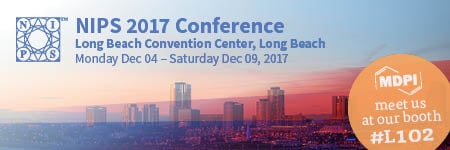
Conference Address
Long Beach Convention & Entertainment Center
300 E Ocean Blvd
Long Beach, CA 90802
USA
6 October 2017
Dr. Franck Vazquez, MDPI CEO, Interviewed by Scholarly Kitchen
The Society for Scholarly Publishing’s popular blog about topics in academic publishing, Scholarly Kitchen, recently interviewed MDPI’s CEO, Dr. Franck Vazquez. He shared some thoughts and information on the past and future of MDPI and open access publishing in general:
“In the long run, we aim to anchor MDPI in research communities. We recently developed and launched the preprint platform Preprints, revamped our free-to-use conference hosting platform Sciforum, and are working on other projects, such as Scilit, our bibliographic database.”
Read the full interview here.
19 September 2017
A Warm Welcome to the New IOAP Participants
We are delighted to have welcomed 24 new participants to our Institutional Open Access Programme (IOAP) since the beginning of September this year. These are University libraries and Research Institutions located around the world; from the USA and Canada to the UK, and from Norway and Spain to Greece. Well respected Universities, such as the University of Denver, the University of Colorado Boulder, and the University of Arizona in the US, have signed up, while their researchers can now benefit from a 10% discount on the Article Processing Charges (APC) for any papers they publish in MDPI journals, at no cost for the library or the University.
We are more than happy to see the Open Access movement growing stronger and wider every day and we appreciate the vital role which librarians, repository managers, and other scholarly communications professionals play in the field. Our communication with and service to this community is, therefore, one of our principal priorities. The IOAP is our way to support academic and scientific Institutions as well as their scholars in managing, administrating, and publishing research in an Open Access world.
The IOAP set of free services, provided by MDPI to institutions that sign up, include:
- No fee for participants and no obligation to prolong after the initial 12 months. The participants may withdraw from the programme at any time, and we will also keep it free for the library for as long as they continue in the programme.
- Authors affiliated with the university will receive a discount on the article processing charge (APC).
- The institution is granted free access to the MDPI submission system and can receive free alerts of new submissions to our journals.
- By default, authors from the institution will continue to be invoiced directly unless the institution opts for central billing.
- Auto-archiving of papers into the institutions´ repository as long as it supports SWORD 1.3.
More details about the programme and a list of our current participant institutions can be found at: https://www.mdpi.com/about/ioap
Institutions which are interested to participate may do so online at: https://www.mdpi.com/ioap-form
The full list of the Institutions that signed up in September is as follows:
- University of Denver, USA
- University of Colorado Boulder, USA
- University of Arizona, USA
- Institute of Metrology of Bosnia and Herzegovina, Bosnia and Herzegovina
- Middlebury College, USA
- Touro College, USA
- University of New Orleans, USA
- University of Leicester, UK
- Indiana University-Purdue University Indianapolis, USA
- University of Strathclyde, UK
- Cranfield University, UK
- Hope College, USA
- Oregon State University, USA
- Drew University, USA
- Swansea University, UK
- University of South Florida, USA
- University of Georgia, USA
- Arizona State University, USA
- University of Southern Mississippi, USA
- Université du Québec à Chicoutimi, Canada
- Grinnell College, USA
- Norwegian University of Science and Technology, Norway
- University of Patras, Greece
- Public University of Navarre, Spain
23 June 2017
Congratulations for Publishing the 100,000th Peer-Reviewed Article
Congratulations to the authors Javier Monroy and Javier Gonzalez-Jimenez from Universidad de Malaga, Spain, Victor Hernandez-Bennets, Han Fan and Achim Lilienthal from Örebro University, Sweden for publishing the 100,000th peer-reviewed article.
The article is published in the Chemical Sensors section of Sensors.
GADEN: A 3D Gas Dispersion Simulator for Mobile Robot Olfaction in Realistic Environments
Evermore pressing environmental concerns have led global actors and decision-makers to search for stricter emission monitoring approaches. As part of novel monitoring systems, robots with gas and environmental sensors are a promising solution. However, validation of such robotic inspectors is expensive, time consuming, and plagued by repeatability issues. In this article, we present GADEN (the short form for Gas Dispersion Simulator for Mobile Robot Olfaction in Realistic Environments), which combines gas dispersion and robotics simulation in a common framework. Developed under the widely used Robot Operating System (ROS), GADEN enables validation of sensing strategies with gas dispersion being simulated using computational fluid dynamics and filament dispersion theory. GADEN allows simulating complex, realistic, 3D environments for reproducible testing of robotic gas sensing algorithms. Through qualitative and quantitative evaluations, we show that GADEN is a versatile and user-friendly evaluation tool and emphasize its enormous potential for the mobile robot olfaction community.
Read the full article here: https://www.mdpi.com/1424-8220/17/7/1479/htm
6 June 2017
CiteScore™ Metrics Released for Scopus Journals
The CiteScore, the new citation metric for journals covered in the Scopus® database, was released on 1 June 2017, reflecting the citation activity in 2016 for articles published during the three previous years. Please note that the list below does not contain all MDPI journals covered in Scopus. For the CiteScore to serve as a reliable metric at least three volumes of articles need to be indexed in Scopus; journals which have not met this criterion have been omitted here.
Ten MDPI journals received a CiteScore which is in the Top 10% of scores in at least one of the categories, while a further 21 journals exhibit scores that are in the first quartile of the respective categories.
CiteScore Data for MDPI Journals
| Journal | Rank | Category | Link | CiteScore 2016 | 2015 |
2014 |
| Algorithms | 44/112 (Q2) 49/111 (Q2) 19/42 (Q2) 52/113 (Q2) |
• Numerical Analysis • Computational Mathematics • Computational Theory and Mathematics • Theoretical Computer Science |
Link | 1.15 | 1.07 | 1.06 |
| Animals | 69/343 (Q1) 21/146 (Q1) |
• Animal Science and Zoology • General Veterinary |
Link | 1.46 | 1.66 | 0.74 |
| Biology | 13/92 (Q1) 34/81 (Q1) 10/75 (Q1) |
• General Agricultural and Biological Sciences • General Biochemistry, Gene- tics and Molecular Biology • General Immunology and Microbiology |
Link | 3.02 | 2.78 | 1.74 |
| Biomolecules | 234/382 (Q3) 260/353 (Q3) |
• Biochemistry • Molecular Biology |
Link | 1.67 | 3.08 | 1.00 |
| Biosensors | 36/118 (Q2) 209/2156 (Q1) |
• Clinical Biochemistry • General Medicine |
Link | 2.83 | 2.37 | 2.04 |
| Cancers | 29/196 (Q1) 27/321 (Q1) |
• Cancer Research • Oncology |
Link | 5.02 | 4.07 | 2.31 |
| Catalysts | 18/44 (Q2) 27/144 (Q1) |
• Catalysis • Physical and Theoretical Chemistry |
Link | 3.44 | 3.45 | 2.17 |
| Crystals | 70/270 (Q2) 25/64 (Q2) 118/398 (Q2) 131/424 (Q2) |
• General Chemical Engineering • Inorganic Chemistry • Condensed Matter Physics • General Materials Science |
Link | 1.89 | 1.47 | 1.03 |
| Diversity | 10/41 (Q1) 9/25 (Q2) 76/291 (Q2) 24/109 (Q1) |
• Agricultural and Biological Sciences (miscellaneous) • Ecological Modelling • Ecology • Nature and Landscape Conservation |
Link | 2.03 | 1.96 | 1.82 |
| Energies | - | - | Link | 2.50 | 2.87 | 2.66 |
| Entropy | 51/198 (Q2) | • General Physics and Astronomy | Link | 1.87 | 1.99 | 1.69 |
| Forests | 17/127 (Q1) | • Forestry | Link | 2.06 | 1.76 | 1.84 |
| Games | 204/398 (Q3) 83/181 (Q2) 48/105 (Q2) |
• Applied Mathematics • Statistics and Probability • Statistics, Probability and Uncertainty |
Link | 0.87 | 0.57 | 0.64 |
| Genes | 62/300 (Q1) 18/90 (Q1) |
• Genetics • Genetics (clinical) |
Link | 3.62 | 3.18 | 1.33 |
| Geosciences | 36/169 (Q1) |
• General Earth and Planetary Sciences | Link | 1.67 | 1.29 | 1.13 |
| Information | 156/237 (Q3) | • Information Systems | Link | 0.78 | 0.94 | 0.74 |
| Insects | 28/131 (Q1) | • Insect Science | Link | 1.81 | 1.38 | 1.23 |
| International Journal of Environmental Research and Public Health (IJERPH) | 67/446 (Q1) 31/102 (Q2) |
• Public Health, Environmental and Occupational Health • Health, Toxicology and Mutagenesis |
Link | 2.38 | 2.42 | 2.47 |
| International Journal of Molecular Sciences (IJMS) | 23/157 (Q1) 8/64 (Q1) 90/353 (Q1) 22/144 (Q1) 16/44 (Q1) 8/62 (Q1) |
• Organic Chemistry • Inorganic Chemistry • Molecular Biology • Physical and Theoretical Chemistry • Catalysis • Spectroscopy |
Link | 3.73 | 3.37 | 3.06 |
| ISPRS International Journal of Geo-Information | 12/29 (Q2) 28/79 (Q2) 96/587 (Q1) |
• Computers in Earth Sciences • Earth and Planetary Sciences (miscellaneous) • Geography, Planning and Development |
Link | 1.62 | 1.52 | - |
| Journal of Low Power Electronic Applications (JLPEA) | 301/645 (Q2) | • Electrical and Electronic Engineering | Link | 0.98 | 0.83 | 0.83 |
| Life | 65/525 (Q1) 36/186 (Q1) 5/92 (Q1) 20/80 (Q2) |
• Ecology, Evolution, Behavior and Systematics • General Biochemistry, Gene- tics and Molecular Biology • Palaeontology • Space and Planetary Science |
Link | 2.95 | 1.68 | 1.20 |
| Marine Drugs | 18/145 (Q1) | • Drug Discovery | Link | 3.83 | 3.66 | 3.59 |
| Materials | 63/424 (Q1) | • General Materials Science | Link | 3.26 | 3.11 | 2.69 |
| Membranes | 103/424 (Q1) | • Materials Science | Link | 2.19 | 2.95 | 2.42 |
| Micromachines | 173/645 (Q2) 69/211 (Q2) 113/526 (Q1) |
• Electrical and Electronic Engineering • Control and Systems Engineering • Mechanical Engineering |
Link | 1.83 | 1.78 | 2.10 |
| Minerals | 45/206 (Q1) 29/167 (Q1) |
• Geology • Geotechnical Engineering and Engineering Geology |
Link | 2.13 | 1.77 | - |
| Molecules | 32/157 (Q1) | • Organic Chemistry | Link | 3.09 | 2.65 | 2.62 |
| Nutrients | 12/247 (Q1) | • Food Science | Link | 4.29 | 4.07 | 3.78 |
| Pharmaceuticals | 8/168 (Q1) 21/158 (Q1) |
• Pharmaceutical Science • Molecular Medicine |
Link | 4.90 | 3.64 | 1.92 |
| Pharmaceutics | 19/168 (Q1) | • Pharmaceutical Science | Link | 3.83 | 2.68 | 2.46 |
| Polymers | 13/138 (Q1) 44/354 (Q1) |
• Polymers and Plastics • General Chemistry |
Link | 3.74 | 3.37 | 4.10 |
| Remote Sensing | 13/169 (Q1) | • General Earth and Planetary Sciences | Link | 3.56 | 3.76 | 3.23 |
| Sensors | 25/96 (Q2) 25/159 (Q1) 124/382 (Q2) 103/645 (Q1) |
• Analytical Chemistry • Atomic and Molecular Physics, and Optics • Biochemistry • Electrical and Electronic Engineering |
Link | 2.78 | 2.21 | 2.40 |
| Sustainability | 49/129 (Q2) 68/587 (Q1) 56/236 (Q1) |
• Renewable Energy, Sustai-nability and the Environment • Geography, Planning and Development • Management, Monitoring, Policy and Law |
Link | 1.96 | 1.78 | 1.52 |
| Symmetry | 17/42 (Q2) 49/111 (Q2) |
• Numerical Analysis • Computational Mathematics |
Link | 1.12 | 0.95 | 1.02 |
| Toxins | 16/102 (Q1) 16/108 (Q1) |
• Health, Toxicology and Mutagenesis • Toxicology |
Link | 3.34 | 3.76 | 2.85 |
| Vaccines | 146/184 (Q4) 151/250 (Q3) 93/145 (Q3) 186/299 (Q3) 130/232 (Q3) |
• Immunology • Infectious Diseases • Drug Discovery • Pharmacology • Pharmacology (medical) |
Link | 1.23 | 3.76 | 2.85 |
| Viruses | 15/68 (Q1) 34/250 (Q1) |
• Virology • Infectious Diseases |
Link | 3.60 | 3.74 | 3.80 |
| Water | 33/184 (Q1) 48/195 (Q1) 62/587 (Q1) 198/382 (Q3) |
• Water Science and Technology • Aquatic Science • Geography, Planning and Development • Biochemistry |
Link | 2.05 | 1.96 | 1.45 |
18 May 2017
Nine Journals Accepted for Inclusion in Scopus
We are pleased to announce that the collection of MDPI journals covered in Scopus keeps expanding.
The following journals have been accepted for inclusion in Scopus this year: Axioms (ISSN 2075-1680), Climate (ISSN 2225-1154), Journal of Marine Science and Engineering (JMSE) (ISSN 2077-1312), Journal of Sensor and Actuator Networks (JSAN) (ISSN 2224-2708), Lubricants (ISSN 2075-4442), Mathematics (ISSN 2227-7390), Microarrays (ISSN 2076-3905), Robotics (ISSN 2218-6581) and Toxics (ISSN 2305-6304). These titles are expected to be included in Scopus towards the end of 2017, starting from articles in the current volume.









Scopus is the largest abstract and citation database of peer-reviewed literature and is published by Elsevier B.V. This means that the research you publish with the journals above will be more visible than ever.
17 May 2017
Three New Institutional Memberships Established
We are pleased to announce that the Goethe University of Frankfurt, the Technical University of Hamburg (TU Hamburg-Harburg), as well as the Humboldt University of Berlin, in Germany, have joined MDPI's institutional membership program: Primary authors from these instititions will benefit from a 10% discount on the article processing charges.
Additional details can be found on our institutional membership page.
4 May 2017
MDPI Supports the Initiative for Open Citations (I4OC)
As an open access publisher, we are keen to support openness and transparency in the research process. Citation data is very important for assessing the value of individual papers and the contribution of researchers. As such, we support the recently launched Initiative for Open Citations (I4OC). The initiative recognizes that citations should be freely available and machine-readable. By doing so, authors gain the maximum benefit from having their work cited.
MDPI now uploads citation data with metadata uploaded to Crossref when registering digital object identifiers (DOIs) for published papers. We are delighted to take this step to support a truly open research environment.
2 May 2017
Publons Peer Review Academy Goes Live
Getting high quality review reports is critical for any journal’s editorial process. At MDPI we have put in place several measures to motivate reviewers and reward them for their work. We are proud of the quality of reviewer reports we receive and grateful for the hours put in by active researchers from across the globe.
Reviewers of MDPI’s largest journals can get recognition via Publons, a website dedicated to rewarding peer reviewers. They have now taken this one step further and launched the Publons Reviewer Academy to help train reviewers to provide useful feedback. Through the academy, researchers can be trained and tutored in various aspects of how to provide structured feedback that will be of genuine help to editors and authors. We support this initiative and recommend it to potential MDPI reviewers, especially early career researchers. See the Publons announcement for further information.
More information on reviewing for MDPI, including how to volunteer as a reviewer, can be found here.
24 April 2017
Two New Institutional Memberships Established
We are pleased to announce that the following universities have joined MDPI's institutional membership program: Trinity University, San Antonio, Texas, USA and the University of New South Wales (UNSW), Sydney, Australia. Primary authors from these instititions will benefit from a 10% discount on the article processing charges.
Additional details can be found on our institutional membership page.
30 March 2017
Credit for Preprints Comments via Publons
Preprints.org is a platform run by MDPI that allows authors to make early versions of manuscripts available before peer review has been completed.
One of the major benefits of putting a preprint online is to get feedback before journal submission. Until now, however, the feedback has been on a voluntary basis. Preprints is delighted to be the first preprint server to collaborate with Publons to acknowledge substantial comments as reviews and give commentators the opportunity to receive credit for their efforts.
When you add a comment to any article, there is a check box to click for it to appear on Publons. If you have already linked your account it will be passed on automatically. If you don't already have a Publons account, you will be contacted soon afterwards with instructions on how to create one.
We appreciate the enthusiasm and cooperation of Publons in this project and expect it to be of great benefit to authors and commenters alike.
20 March 2017
MDPI 2016 Annual Report Released
We are pleased to announce that our annual report for the year 2016 has now been published.
It contains information regarding company and journal performance, conferences and other publishing services that we provided throughout 2016.
To read the report in full or download a copy, please click here.
15 March 2017
Our 100,000th Article Could be Yours!
After the 20th anniversary of MDPI in 2016, we will reach another milestone this year and will publish the 100,000th peer-reviewed article in one of our 170+ open access journals.
We would like you to be part of this great achievement and so are offering to publish the 100,000th accepted paper free of charge.
To be in with a chance, select a journal in one of our 10 scientific subject areas and submit your paper.
Access the live tracker on published articles here.
![]()
3 March 2017
1000 Preprints Online
We are delighted that Preprints now has 1000 papers online since its launch on 3 May 2016.
For more information, see the editorial here.
9 February 2017
Minister and State Secretaries Visit MDPI Office at STP, Belgrade, Serbia
Earlier this week the Science Technology Park in Belgrade, Serbia was visited by Swiss Secretary of State Dr. Mauro Dell’Ambrogio, as well as Serbian Minister of Public Administration and Local Self-Government Ana Brnabic, State Secretary Dr. Vladimir Popovic and Mayor of Belgrade Mr. Siniša Mali.
During the visit to the STP they had a short presentation from MDPI’s CEO Dr. Franck Vazquez and IT Manager Mr. Miloš Čučulović, and further discussed important issues such as Open Access and Open education. Dr. Dell'Ambrogio said he was impressed with the potential for development and ideas for business.
For more information please see:
http://bit.ly/2kpIu7k and http://bit.ly/2kpUQfz
7 February 2017
The 6th World Sustainability Forum: Final Press Release
Basel, 29 January 2017
The 6th World Sustainability Forum #WSF2017SA: African universities critical to achieving the Sustainable Development Goals
Jeffrey and Sonia Sachs win first World Sustainability Award.
Universities need to take the lead in solving the greatest challenges the world faces today, particularly in Africa. They need to do this not only through education – teaching the next generation to think critically and creatively to find sustainable solutions – but also through research that cuts across a range of disciplines. To ensure these solutions are implemented, they need to partner with the private sector and with government.
This was the key message from the 6th World Sustainability Forum (WSF2017), which took place in Cape Town on 27 and 28 January 2017. Sponsored by MDPI and the journal Sustainability under the patronage of the Universities of the Western Cape (UWC), Cape Town (UCT), University of Basel and the National Research Foundation (NRF) of South Africa, the conference was attended by key national and international speakers, including world-leading economist Professor Jeffrey D. Sachs, senior United Nations (UN) advisor and director of the Earth Institute at Columbia University.
The WSF is an annual sustainability conference which addresses research in a range of areas related to sustainable development and sustainability globally. This was the first WSF to take place on the African continent. Discussions at the 2017 conference were driven by the 17 sustainable development goals (SDGs) adopted as part of the 2030 Agenda for Sustainable Development by the UN in September 2015.
Achieving the SDGs “is the moonshot for our generation,” said Sachs. “Like the moonshot [moon landing] of the 1960s, these are tough, bold and achievable objectives.”
“This is a nasty, tough world we live in, and our world agrees on very little. So when 193 governments agree on something, that is important. And when they agree on something as important as sustainable development, that is really something for us to grab hold of – that is a lifeline.”
There was agreement at the WSF that the SDGs are particularly important for Africa, and that African universities in particular have a role to play in achieving them.
Said Professor Tyrone Pretorius, vice-chancellor of UWC: “The quest for sustainable development can only be met through education. Universities today are the oil that fuels the knowledge economy.”
As part of the drive to develop academic capacity to provide the knowledge needed to meet the SDGs, WSF2017 was preceded by the 1st Postgraduate Forum on Sustainability. “A series of workshops for postgraduate education linked to WSF are important, in order to equip postgraduates with the skills necessary to promote sustainability,” said Professor Thandi Mgwebi, director for research at UWC. A second postgraduate forum will take place alongside the WSF2018 in Beijing.
This capacity development is particularly critical to Africa. Said Sachs: “African universities need to do research to find solutions to Africa’s development challenges, because no other university will.”
The UN set a target of achieving the SDGs by 2030: “I regard this as the breakthrough period to end extreme poverty on the continent,” said Sachs, “and for Africa to become one of the most dynamic centres of the world economy.”
It is a critical time for South African universities, said Professor Mamokgethi Phakeng, deputy vice-chancellor for research and internationalisation at UCT: “Higher education is at a crossroads, and there is much polarisation. We need to think carefully about how this sustainable development agenda is owned by all so that it is inclusionary.”
There was also strong emphasis on public–private partnerships – for universities, business and government to work together to achieve the goals.
Said Professor Francis Petersen, deputy vice-chancellor at UCT and vice-chancellor designate at the University of the Free State: “Business sustainability has become critical, because there is increasing demand and complexity of demand on business from the natural, social and economic environment. Sustainability cannot be a standalone issue, divorced from business as usual. Sustainability needs to be embedded into business.”
Environmental crises and climate change was also high on the WSF agenda. In his keynote address, Sachs noted the irreversibility of the climate- and environmental-related challenges.
“If we don’t get our act together, we lose the chance of safety,” he said.
Said Professor Mark New, pro vice-chancellor and director of the African Climate and Development Initiative at UCT: “We have a fundamental challenge in responding to climate change, and we must go further than just putting a plaster on a wound. We need to address the deep structural issues, to move from our current model of development into climate-compatible development.”
“This requires researchers to find the evidence for the correct development pathways to take, and then support the ability of policymakers at all levels to enable the shift to climate-compatible development planning.”
Said Dr. Aldo Stroebel, executive director of international relations and cooperation at the NRF, in closing: “We have seen over the past two days an urgency towards the next step of thinking, that critical type of framework that we all must engage with, not only from an academic perspective, but further up into the policy environment and into rural-based environments where one can clearly see the links and effectiveness of the work.”
World Sustainability Awards
The first World Sustainability Award and the first Emerging Sustainability Leader Awards were presented by Prof. Thandi Mgwebi, Director of Research at UWC, and Dr. Franck Vazquez, CEO of MDPI, during the ceremony on 27 January 2017 as part of the gala dinner of the 6th World Sustainability Forum in South Africa.after day one of proceedings of the 2017 World Sustainability Forum South Africa.
Professor Jeffrey D. Sachs and Dr. Sonia Ehrlich Sachs are the joint recipients of the first World Sustainability Award. Jeffrey Sachs is a world-renowned economist and senior United Nations (UN) advisor and director of the Earth Institute at Columbia University. Sonia Sachs is a paediatrician and public health specialist, and director of the Health Centre at the Centre for Sustainable Development, also at Columbia University.
The joint recipients of the first Emerging Sustainability Leader Award are Dr. Esther Ngumbi and Dr. Xiaosong Hu. Esther Ngumbi is a postdoctoral researcher at Auburn University in Alabama USA and serves as a 2015 Clinton Global University Mentor for agriculture. Xiaosong Hu is a professor at the Chongqing University in China and specialises in automotive control systems and mechanical engineering.
The World Sustainability Award and the Emerging Sustainability Leader Awards are funded to encourage new initiatives and developments in sustainability with the ultimate aim of fostering the transition to sustainable practices and societies.
The World Sustainability Award is funded by the MDPI Sustainability Foundation, and included a monetary prize of USD 100,000 to Jeffrey and Sonia Sachs. The Emerging Sustainability Leader Award is funded by the journal Sustainability, awarded to researchers under 40, and included a monetary prize of USD10,000.
Issued jointly by: UCT Global Strategy and Visibility, Research Office, UWC Communications & Media and MDPI AG
Conference photos are free available at: https://sciforum.net/conference/wsf-6/page/175 Photo credit: Matthias Burkhalter
|
Carla Bernardo |
Luthando Tyhalibongo |
Matthias Burkhalter |
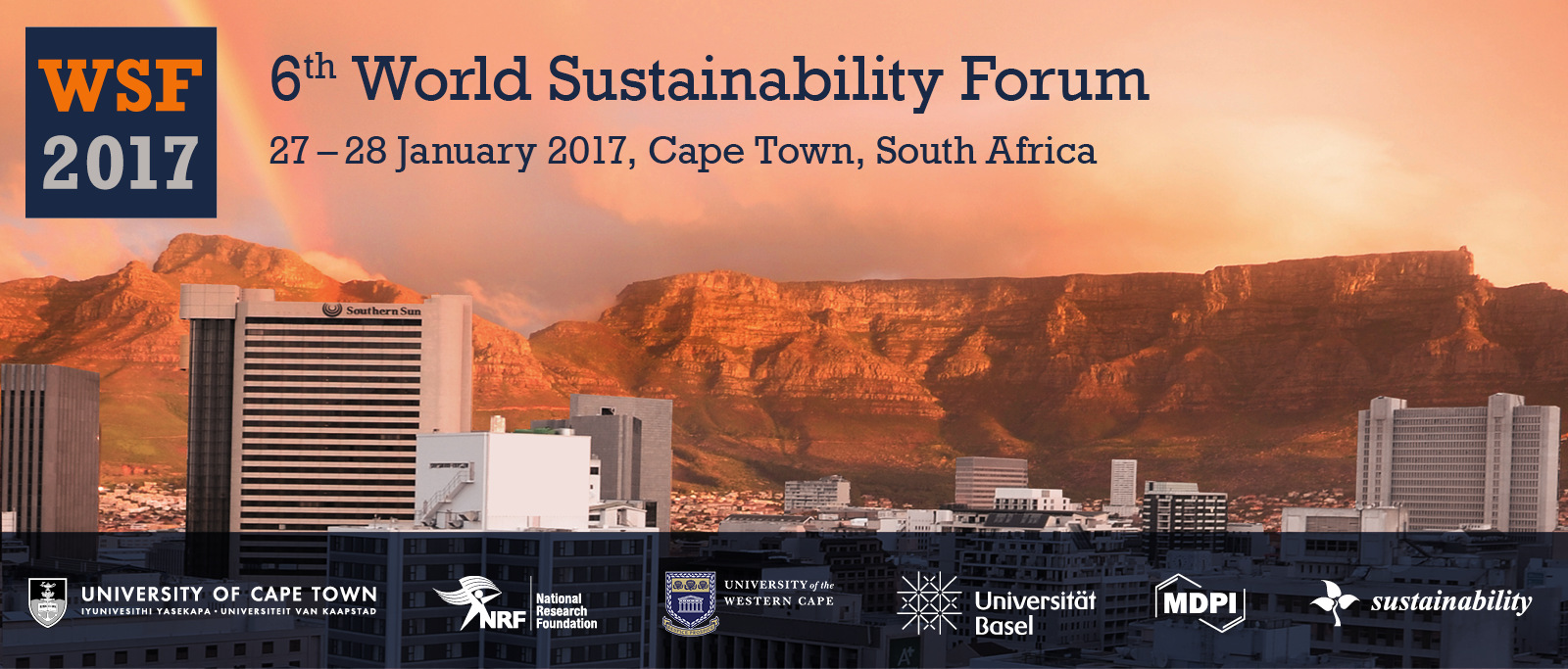
31 January 2017
Three New Institutional Memberships Established
We are pleased to announce that the Chalmers University of Technology, Sweden, the University of Manitoba, Canada and the Technical University of Cartagena, Spain, have joined MDPI's institutional membership program: Primary authors from these institutions will benefit from a 10% discount on the article processing charges.
Additional details can be found on our institutional membership page.
27 January 2017
6th World Sustainability Forum under way in South Africa
The 6th World Sustainability Forum is currently being held at the Cape Sun Hotel until 28 January 2017.
The Forum will showcase the work of internationally renowned researchers and include more than 150 presentations. During the conference dinner, the World Sustainability Award, associated with a US$ 100,000 prize, will be announced, as well as the Emerging Sustainability Leader Award, associated with a US$ 10,000 prize. The prizes are sponsored by the MDPI Sustainability Foundation and Sustainability, an academic open access journal by MDPI.
Here are some pictures from the forum so far:
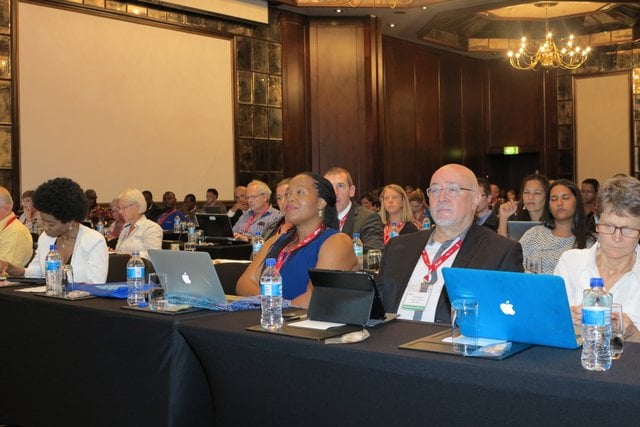
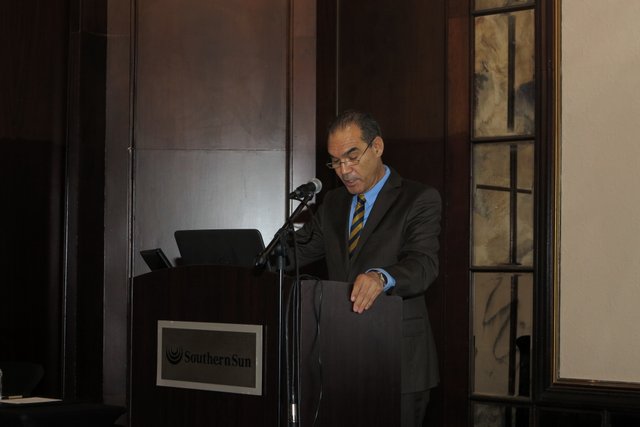
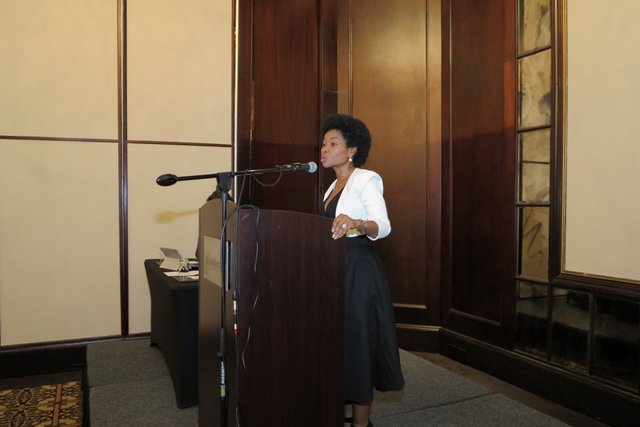
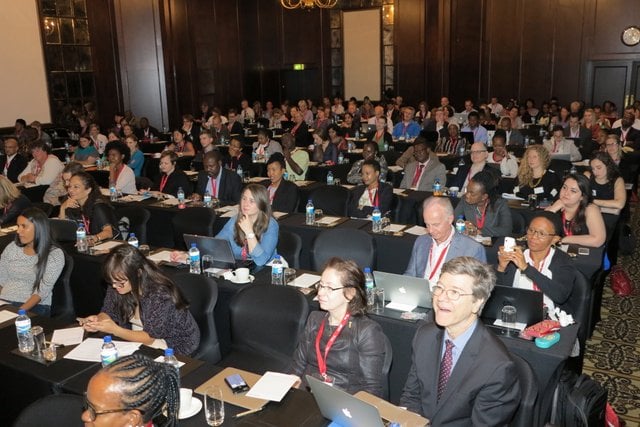
To see the full WSF2017 program and schedule, please see here: https://sciforum.net/conference/wsf-6/page/schedule
19 January 2017
Cape Town to Host the 6th World Sustainability Forum
Cape Town will host the 6th World Sustainability Forum at the Cape Sun Hotel on 27 and 28 January 2017. This prominent event, held for the first time in Africa, will include many illustrious South African and international experts, such as Her Excellency Graça Machel (Sustainable Development Advocate for the United Nations, Mozambique), Joyene Isaacs (HoD Agriculture Western Cape Government), Jeffrey Sachs (Columbia University, USA), Max Bergman (SRaM, University of Basel), Mark New (Pro Vice-Chancellor, University of Cape Town), Frans Swanepoel (FutureAfrica, University of Pretoria) and Francis Petersen (Vice-Chancellor-designate, University of the Free State). The Forum will provide a stage for national and international debates on sustainability in South Africa, the African continent, and about international perspectives on sustainability. It brings together researchers and representatives from government and the business sector to discuss a wide-ranging set of issues associated with sustainability, including food security, water and energy scarcity, mining, poverty reduction, climate change, and urbanisation.
The next few decades will be marked by profound changes in the relationships between global economics, national societies, and the environment. We have entered what some call the Anthropocene, an age in which human activity dominates the climate and the environment. These changes will have numerous consequences on societies around the globe. South Africa and Africa will play a central role, for better or worse, in creating opportunities and risks during these changing times as Africa is profoundly influencing and being influenced by global developments.
The adoption of the 17 United Nations Sustainable Development Goals and the 2030 Agenda for Sustainable Development in September 2015 was accompanied by what insiders considered an optimism they have not experienced in relation to UN resolutions before. The relative efficiency in the drafting, the lack of trenches between East and West, or between North and South, and the unanimity of support of the 193 countries speak volumes. In stark contrast, sustainability seems to go against a changing economic and political tide, where waves of nationalism and protectionism from some of the most powerful countries risk the wellbeing of the rest of the world. The 6th World Sustainability Forum will enable fruitful exchanges, which sensitise South African and international communities to the global urgency and specifics of sustainability.
The Forum will showcase the work of internationally renowned researchers and include more than 150 presentations. During the conference dinner, the World Sustainability Award, associated with a US$ 100 000 prize, will be announced, as well as the Emerging Sustainability Leader Award, associated with a US$ 10 000 prize. The prizes are sponsored by the MDPI Sustainability Foundation and Sustainability, an academic open access journal by MDPI. The World Sustainability Forum is preceded by the Postgraduate Forum on Sustainability, which will introduce more than 100 young scholars from South Africa and the African continent to sustainability research. Both events are organized and sponsored by the University of Cape Town, the University of the Western Cape, the University of Basel, MDPI, and by the National Research Foundation of South Africa.
Contacts:
Scientific Matters: Prof Manfred Max Bergman, Social Research and Methodology Group (SRaM), University of Basel, Switzerland; Email: max.bergman@unibas.ch
Press Accreditation and General Enquiries: Mr Matthias Burkhalter, MDPI AG, Basel, Switzerland; Email: burkhalter@mdpi.com; Tel. +41 61 683 77 34
Follow us on Twitter
#WSF2017SA
6 January 2017
MDPI Supports the OA2020 Initiative
MDPI is now a proud supporter of the OA2020 Initiative.
Open Access 2020 is an international initiative that aims to induce the swift, smooth and scholarly-oriented transformation of today’s scholarly journals from subscription to open access publishing.
MDPI is participating in the upcoming Berlin13 conference in March 2017, where we are contributing to the initiative by aiding in the design of the roadmap which will make OA the default publishing model.
For more information please see here.
5 January 2017
Three New Institutional Memberships Established
We are pleased to announce that the University of Texas at Arlington, USA, the Harbin Institute of Technology, China and TU Darmstadt, Germany, have joined MDPI's institutional membership program: Primary authors from these institutions will benefit from a 10% discount on the article processing charges.
Additional details can be found on our institutional membership page.
22 December 2016
Two New Institutional Memberships Established
We are pleased to announce that the Otto-von-Guericke-Universität Magdeburg, Germany and the University of California, Berkeley, USA, have joined MDPI's institutional membership program: Primary authors from these instititions will benefit from a 10% discount on the article processing charges.
Additional details can be found on our institutional membership page.
19 December 2016
MDPI and Wellcome Trust Compliance
The Wellcome Trust has, for a number of years, required that the results of its funded projects are published in open access format. Recently it announced criteria that publishers must fulfil for publication fees to be paid by the Trust. MDPI is pleased to have been added to the list of compliant publishers.
Only publishers who have confirmed their compliance by 16 December 2016 will be eligible to receive payment of APCs by the Wellcome Trust as of 1 April 2017. For more information on the criteria and a full list of publishers that meet them, see here.
13 December 2016
Meet MDPI at the 2016 AGU Fall Meeting
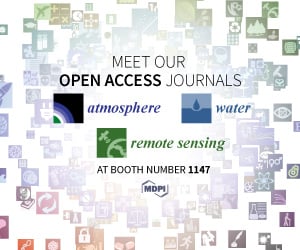 MDPI is currently attending the 2016 AGU Fall Meeting (12–16 December, 2016)
MDPI is currently attending the 2016 AGU Fall Meeting (12–16 December, 2016)
If you are also attending the conference, please feel free to stop by our booth (Booth #1147) and meet the representative editors.
Conference details:
2016 AGU Fall Meeting
12–16 December 2016
Moscone Center
747 Howard St
San Francisco, CA 94103, USA
8 December 2016
Three New Institutional Memberships Established
We are pleased to announce that Purdue University, USA, the Universitat Politécnica de Valencia, Spain and the Queensland University of Technology, Australia, have joined MDPI's institutional membership program: Primary authors from these instititions will benefit from a 10% discount on the article processing charges.
Additional details can be found on our institutional membership page.
16 November 2016
World Sustainability Award - Final Extension
The deadline for the World Sustainability Award has been extended for one last time! You now have one more month to nominate an individual researcher, group or project! The final deadline for nominations will be December 15, 2016.
For full details, please visit here.
11 November 2016
Three New Institutional Memberships Established
We are pleased to announce that the University of Minnesota, USA, the Universidad Politécnica de Madrid, Spain and Shanghai Jiao Tong University, China, have joined MDPI's institutional membership program: Primary authors from these instititions will benefit from a 10% discount on the article processing charges.
Additional details can be found on our institutional membership page.
4 November 2016
MDPI Joins the United Nations Global Compact
MDPI has become a member of the United Nations Global Compact to support corporate sustainability and have committed ourselves to the ten principles associated with the Compact.
Sustainability has always been at the core of MDPI’s values, starting with the collection and preservation of rare chemical samples that started in 1996 and led to the first journal, Molecules. Sustainability has become one of our flagship journals and we have supported and organized several conferences and events based on Sustainability, including the upcoming 6th World Sustainability Forum. As a global enterprise, we see it as our duty to promote responsible practices that will ensure a bright future for our planet. Given this, the choice to join the Global Compact was an easy one and we will do our utmost to fully implement it.
3 November 2016
MDPI Now a Member of SPARC Europe
We are delighted to announce that MDPI has become a member of SPARC Europe, an organization that works for open scholarship in Europe, including support of open access publication.
As one of the few publishers to join SPARC Europe to date, MDPI looks forward to making a contribution that puts open scholarship on a positive and sustainable path. We fully support the goals of open scholarship that allow the largest number of people possible to benefit from work of researchers in all disciplines. We hope that our membership will enable us to work with other stakeholders to find the best possible solution.
2 November 2016
World Sustainability Award Deadline Extension
The deadline for the World Sustainability Award has been extended! You now have until November 15, 2016 to nominate an individual researcher, group or project!
For full details, please visit here.
26 October 2016
Four New Institutional Memberships Established
We are pleased to announce that the Wuppertal Institut, Germany, the University of Girona, Spain and Central South University and Huazhong University of Science and Technology, China, have joined MDPI's institutional membership program: Primary authors from these instititions will benefit from a 10% discount on the article processing charges.
Additional details can be found on our institutional membership page.
24 October 2016
International Open Access Week 2016
Meet us during International Open Access Week 2016! We will be presenting at various locations in Europe and China.
To get involved and for full details see the complete list of events organised by MDPI here.
18 October 2016
Institutional Membership established with Universitat Pompeu Fabra, Spain and Aalto University, Finland
We are pleased to announce that the Universitat Pompeu Fabra, Spain and Aalto University, Finland, have joined MDPI's institutional membership program: Primary authors from these universities will benefit from a 10% discount on the article processing charges.
Additional details can be found on our institutional membership page.
12 October 2016
Institutional Membership Established with Iowa State University and the University of North Texas, USA
We are pleased to announce that the Iowa State University and the University of North Texas, USA, have joined MDPI's institutional membership program: Primary authors from these universities will benefit from a 10% discount on the article processing charges.
Additional details can be found on our institutional membership page.
7 October 2016
MDPI at Open Access Days in Munich, 10-11 October 2016
Meet MDPI during the Open Access Days held from 10-11 October 2016 at Ludwig Maximilian University of Munich, Germany.
The two-day event will feature experts from the open access sector, scientists from all disciplines, publishing representatives and supporters of scientific research and communication from libraries as well as research institutes and funding institutions. Join us!
For more information about the event and to see the program, visit the event webpage.
7 October 2016
Institutional Membership Established with the University of Sevilla and the University of Alicante, Spain
We are pleased to announce that the University of Sevilla and the University of Alicante, Spain have joined MDPI's institutional membership program: Primary authors from these universities will benefit from a 10% discount on the article processing charges.
Additional details can be found on our institutional membership page.
29 September 2016
Institutional Membership Established with the University of Delaware
We are pleased to announce that the University of Delaware, USA, has joined MDPI's institutional membership program: Primary authors from this university will benefit from a 10% discount on the article processing charges.
Additional details can be found on our institutional membership page.
19 September 2016
Peer Review Week 2016
As an open access publisher indebted to the work of our peer reviewers, we are proud to support Peer Review Week 2016. As part of the week's activities and to celebrate this year's theme "Recognition for Review", MDPI will host two webinars that anyone can join.
These webinars will explore the role and value of reviewers and the recognition they receive from a publishers perspective, with examples from MDPI's experience in publishing nearly 80,000 peer reviewed papers, along with evidence from reviewer surveys. It will also touch upon potential changes in how review is carried out and tips for early career researchers who want to be involved in the review process.
Details and links to join can be found below:
Wednesday September 21, 08:00 (CEST)
Friday September 23, 16:00 (CEST)
For more information about all the activites taking place, please visit the Peer Review Week website.
6 September 2016
Institutional Membership established with Kansas State University and Northwestern University, USA
We are pleased to announce that Kansas State University and Northwestern Universty, USE, have joined MDPI's institutional membership program: Primary authors from these universities will benefit from a 10% discount on the article processing charges.
Additional details can be found on our institutional membership page.
5 September 2016
Institutional Membership Established with University College Cork
We are pleased to announce that University College Cork, Ireland, has joined MDPI's institutional membership program: Primary authors from this university will benefit from a 10% discount on the article processing charges.
Additional details can be found on our institutional membership page.
22 August 2016
MDPI New Office Location
We are pleased to announce that MDPI has now moved to a new permanent address:
MDPI AG
St. Alban Anlage 66
CH-4052 Basel
Postfach, CH-4020 Basel
Switzerland
Telephone and fax numbers remain unchanged.
10 August 2016
Institutional Membership established with the University of Texas at Austin, USA, the Wroclaw University of Science and Technology, Poland and the University of Granada and the Compultense University of Madrid, Spain
We are pleased to announce that the following institutions have joined MDPI's institutional membership program in August 2016:
- University of Texas at Austin, USA
- Wroclaw University of Science and Technology, Poland
- University of Granada, Spain
- Compultense University of Madrid, Spain
Authors affiliated with these institutions will benefit from a 10% discount on the article processing charges.
Additional details can be found on our institutional membership page.
18 July 2016
Institutional Membership established with Louisiana State University and Florida State University, USA, Royal College of Surgeons, Ireland, University of Rostock, Germany, AGH University of Science and Technology, Poland and Southeast University, China
We are pleased to announce that the following institutions have joined MDPI's institutional membership program in July 2016:
- Louisiana State University, USA
- Florida State University, USA
- Royal College of Surgeons, Ireland
- University of Rostock, Germany
- AGH University of Science and Technology, Poland
- Southeast University, China
Authors affiliated with these institutions will benefit from a 10% discount on the article processing charges.
Additional details can be found on our institutional membership page.
12 July 2016
MDPI Moving to New Office Location in Basel (Switzerland) in August 2016
As of 20 August 2016, MDPI's new address in Basel will be:
MDPI AG
St. Alban-Anlage 66
CH-4052 Basel
Switzerland
Telephone and fax numbers remain unchanged.
St. Alban-Anlage 66 was built from 1947 to 1948 and initially the home of the "Bühler AG", a book printing business.
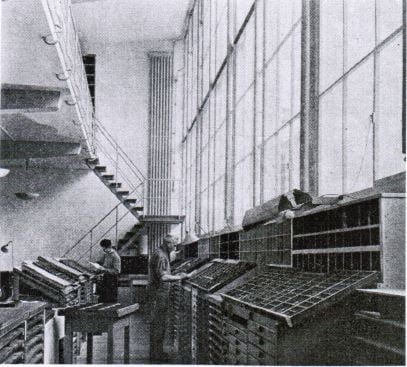
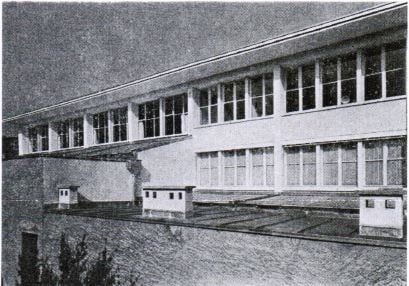
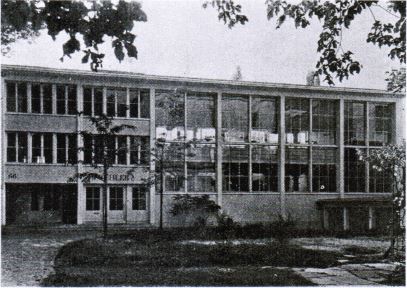
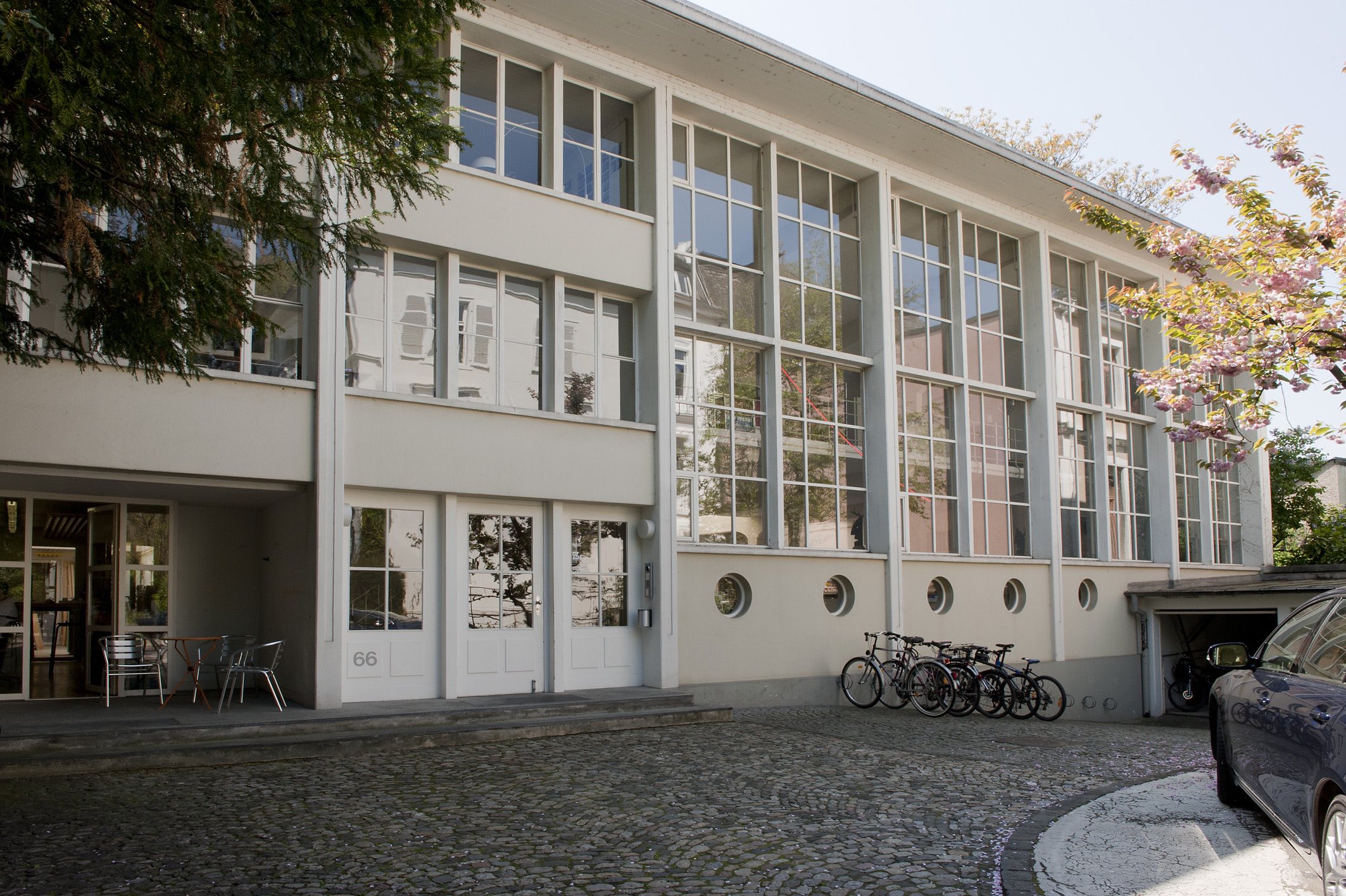
For more information about this building, see: https://www.mdpi.com/about/headquarters
21 June 2016
"Behind the Scenes of Academic Publishing—A Publisher's Perspective" - MDPI's Lecture at the University of Basel
From the 15-16 September, 2016, MDPI will run a course on Academic Publishing at the University of Basel.
In this two day workshop, MDPI will look in detail at the role performed by academic journal publishers and how they interact with academics. Ethical dimensions, what happens when problems occur and how the publisher coordinates all aspects of the submission process will also be covered.
For more detailed information about the program, trainers and registration please visit the course webpage.
14 June 2016
2015 Impact Factors Released
We are pleased to report the 2015 Journal Impact Factors in the latest Journal Citation Reports® Science Edition, published by Thomson Reuters in June 2016. Twenty out of 25 journals have seen an increase in their Impact Factor and two journals (Crystals and IJGI) received a first Impact Factor. Coatings was recently added to SCIE and will receive its first Impact Factor in next year’s JCR.
Updated Impact Factors for Journals in the Science Citation Index Expanded (SCIE)
| Journal | 2015 Impact Factor | Details | Category Rank |
| Applied Sciences | 1.726 | Link | 83/163 (Q3) in ‘Chemistry, Multidisciplinary’; 129/271 (Q2) in ‘Materials Science, Multidisciplinary’; 64/145 (Q2) in ‘Physics, Applied’ |
| Atmosphere | 1.221 | Link | 66/84 (Q4) in ‘Meteorology & Atmospheric Sciences’ |
| Catalysts | 2.964 | Link | 53/144 (Q2) in ‘Chemistry, Physical’ |
| Energies | 2.077 | Link | 43/88 (Q2) in ‘Energy & Fuels’ |
| Entropy | 1.743 | Link | 25/79 (Q2) in ‘Physics, Multidisciplinary’ |
| Forests | 1.583 | Link | 19/66 (Q2) in ‘Forestry’ |
| Genes | 3.242 | Link | 60/165 (Q2) in ‘Genetics & Heredity’ |
| International Journal of Environmental Research and Public Health (IJERPH) | 2.035 | Link | 101/225 (Q2) in ‘Environmental Sciences’ |
| International Journal of Molecular Sciences (IJMS) | 3.257 | Link | 110/289 (Q2) in ‘Biochemistry & Molecular Biology’; 51/163 (Q2) in ‘Chemistry, Multidisciplinary’ |
| Marine Drugs | 3.345 | Link | 13/59 (Q1) in ‘Chemistry, Medicinal’ |
| Materials | 2.728 | Link | 63/271 (Q1) in ‘Materials Science, Multidisciplinary’ |
| Metals | 1.574 | Link | 18/73 (Q1) in ‘Metallurgy & Metallurgical Engineering’; 145/271 (Q3) in ‘Materials Science, Multidisciplinary’ |
| Micromachines | 1.295 | Link | 30/56 (Q3) in ‘Instruments & Instrumentation’ 63/83 (Q4) in ‘Nanoscience & Nanotechnology’ |
| Minerals | 1.468 | Link | 9/21 (Q2) in ‘Mining & Mineral Processing; 14/29 (Q2) in ‘Mineralogy’ |
| Molecules | 2.465 | Link | 24/59 (Q2) in ‘Chemistry, Organic’ |
| Nanomaterials | 2.690 | Link | 64/271 (Q1) in ‘Materials Science, Multidisciplinary’; 36/83 (Q2) in ‘Nanoscience & Nanotechnology’ |
| Nutrients | 3.759 | Link | 16/78 (Q1) in ‘Nutrition & Dietetics’ |
| Polymers | 2.944 | Link | 20/85 (Q1) in ‘Polymer Science’ |
| Remote Sensing | 3.036 | Link | 5/28 (Q1) in ‘Remote Sensing’ |
| Sensors | 2.033 | Link | 36/75 (Q2) in ‘Chemistry, Analytical’; 16/27 (Q3) in ‘Electrochemistry’; 12/56 (Q1) in ‘Instruments & Instrumentation’ |
| Sustainability | 1.343 | Link | 146/225 (Q3) in ‘Environmental Sciences’; 22/29 (Q4) in ‘Green & Sustainable Science & Technology’ |
| Symmetry | 0.841 | Link | 31/63 (Q2) in ‘Multidisciplinary Sciences’ |
| Toxins | 3.571 | Link | 16/89 (Q1) in ‘Toxicology’ |
| Viruses | 3.042 | Link | 14/33 (Q2) in ‘Virology’ |
| Water | 1.687 | Link | 33/85 (Q2) in ‘Water Resources’ |
Journals with First Impact Factors
| Journal | 2015 Impact Factor | Details | Category Rank |
| Crystals | 2.075 | Link | 13/26 (Q2) in ‘Crystallography’ |
| ISPRS International Journal of Geo-Information | 0.651 | Link | 45/49 (Q4) in ‘Geography, Physical’; 26/28 (Q4) in ‘Remote Sensing’. |
26 May 2016
Institutional Membership established with University of Bremen, Germany, Koç University, Turkey, IIASA, Austria and Jilin University and Kunming Institute of Botany, CAS, China
We are pleased to announce that the following institutions have joined MDPI's institutional membership program in May 2016:
- Unversity of Bremen, Germany
- Koç University, Turkey
- International Institute for Applied Systems Analysis (IIASA), Austria
- Jilin University, China
- Kunming Institute of Botany, Chinese Academy of Sciences, China
Authors affiliated with these institutions will benefit from a 10% discount on the article processing charges.
Additional details can be found on our institutional membership page.
23 May 2016
Institutional Membership Established with the KTH Royal Institute of Technology, Sweden and the South China University of Technology, Beijing University of Technology and Southern Medical University, China
We are pleased to announce that the following institutions have joined MDPI's institutional membership program in April and May 2016:
- KTH Royal Institute of Technology, Sweden
- South China University of Technology, China
- Beijing University of Technology, China
- Southern Medical University, China
Authors affiliated with these institutions will benefit from a 10% discount on the article processing charges.
Additional details can be found on our institutional membership page.
26 April 2016
New Section on www.mdpi.com - Latest Books
You may have noticed a new section that is now visible on our home page. This section is called "Latest Books" and showcases recent publications from MDPI Books, our book publishing service.
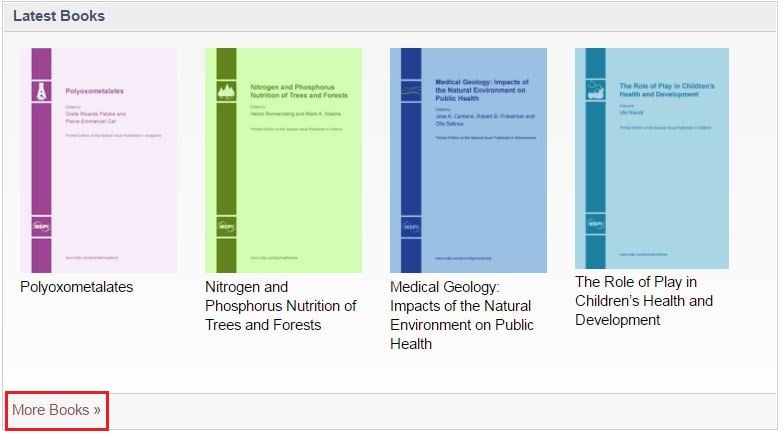
By clicking on the hyperlink "More Books" you will be taken to the MDPI Books Home Page. There you will find more information about the service, as well as the "Recent Publications" list.
Clicking on any of the book images in this list will take you to detailed information about that book (shown below). Here you can also download a PDF version of the book, or order a hardcover printed copy.
For further information about the MDPI Books service, please visit the webpage or contact books@mdpi.com.
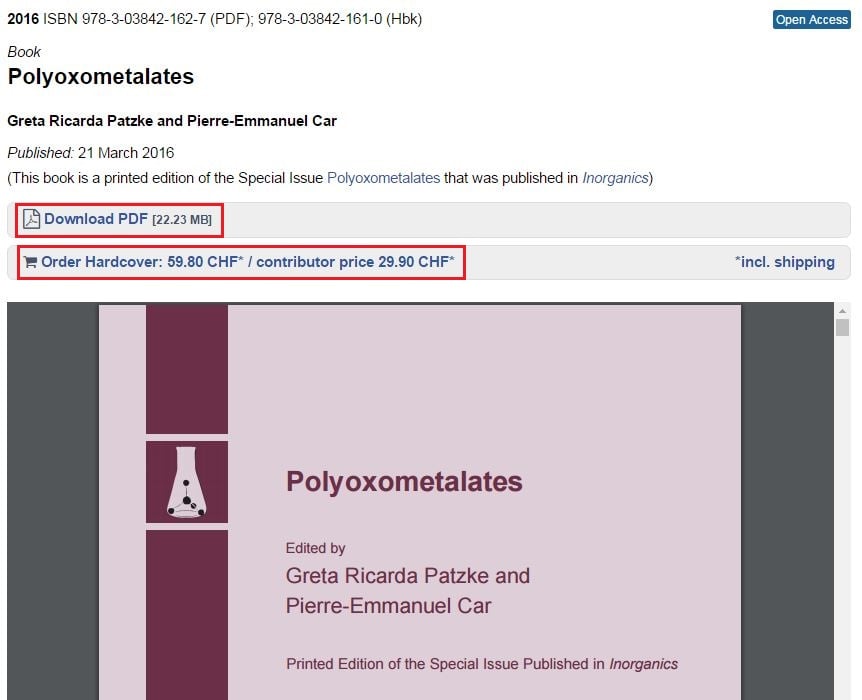
31 March 2016
Axioms, Behavioral Sciences, Photonics, Separations and Toxics added to the Emerging Sources Citation Index in Web of Science
We are pleased to announce that the journals Axioms, Behavioral Sciences, Photonics, Separations and Toxics were recently accepted for inclusion in the newly launched Emerging Sources Citation Index (ESCI) in Web of Science.
ESCI serves to highlight promising journals which are still under consideration for the Science Citation Index Expanded (SCIE) or the Social Sciences Citation Index (SSCI).
The Emerging Sources Citation Index (ESCI), Science Citation Index Expanded (SCIE), Social Sciences Citation Index
(SSCI), and Web of Science™ (WoS) are Thomson Reuters products.
30 March 2016
Institutional Membership established with the University of Winchester, UK, Silesian University of Technology, Poland and Beijing Jiaotong University and Zhejiang University, China
We are pleased to announce that the University of Winchester, UK, the Silesian University of Technology, Poland and Beijing Jiaotong University and Zhejiang University, China, have joined our Institutional Membership program. Primary authors from these universities will benefit from a 10% discount on article processing charges.
Additional details can be found on our institutional membership page.
24 March 2016
New Editorial Office in Barcelona, Spain
We are excited to announce the opening of our new editorial office in Barcelona, Spain. The launch team is led by a Senior Editor and comprises further staff holding doctoral degrees with several years of research experience. The new editorial team will help us to get closer to European research communities and progress Sciforum, the platform to support the scientific community via conference hosting and other functions. They will also help spread the word about Open Access and meet academics at scientific events.
We are in the process of hiring more doctoral and masters graduates to join the editorial team and welcome applications via jobs@mdpi.com. For contact details about the office, see our contact page.

22 February 2016
Membership Established with the Max Planck Society
We are pleased to announce that the Max Planck Digital Library (MPDL) has signed an agreement with MDPI to support authors associated with the Max Planck Society (Max-Planck-Gesellschaft). As of 22 February 2016, corresponding authors will receive full funding from the MPDL for articles published in MDPI journals, with a 10% discount applied to the Article Processing Charges. Additional details can be found at our institutional membership page.
Founded in 1948, The Max Planck Society is one of Germany’s leading research organizations, and is currently made up of 83 institutes conducting basic research in natural sciences, life sciences, social sciences and humanities. 18 Nobel laureates have emerged from its ranks of scientists and the society has more than 15,000 publications in scientific journals each year.
5 February 2016
Institutional Membership Extension: Wageningen University, CSIC, University of Zürich, ETH Zürich, University of Tübingen and Osnabrück University
We are pleased to announce that Wageningen University, the Netherlands, the Spanish National Research Council (CSIC), Spain, the University of Zürich and ETH Zürich, Switzerland, and the University of Tübingen and Osnabrück University, Germany, have not only renewed their institutional memberships with MDPI after two years of successful cooperation, but have also increased the reduction of the article processing charges (APCs) for affiliated authors to 25%.
Additional details can be found on our institutional membership page.
5 February 2016
Institutional Membership established with Brock University, Canada and the University of Pisa, Italy
We are pleased to announce that Brock University, Cananda, and the University of Pisa, Italy, have joined MDPI's institutional membership program: Primary authors from these universities will benefit from a 10% discount on the article processing charges as of 01 February 2016.
Additional details can be found on our institutional membership page.
25 January 2016
MDPI Sponsors diss:kurs with the University of Basel
MDPI is pleased to announce its newly established sponsorship of diss:kurs, an event coordinated by the University of Basel to support their doctorate program. For more information about the event and how to register, please visit the diss:kurs webpage.
7 January 2016
New Institutional Memberships Established with Tsinghua University, the Chinese Society of Micro-Nano Technology, Ruhr University Bochum and the University of Ulm
We are pleased to announce that the following institutions have joined MDPI's institutional membership program as of 1 January 2016:
- Tsinghua University, China
- Chinese Society of Micro-Nano Technology (CSMNT)
- Ruhr University Bochum, Germany
- University of Ulm, Germany
Authors affiliated with these institutions will benefit from a 10% discount on the article processing charges.
Additional details can be found on our institutional membership page.
5 January 2016
Safety, Fermentation, C-Journal of Carbon Research, Magnetochemistry, Batteries and Horticulturae Released Their First Issue in December 2015
We are pleased to announce that MDPI's open access journals Safety, Journal of Imaging, Fermentation, C-Journal of Carbon Research, Magnetochemistry, Batteries and Horticulturae released their first issue at the end of December 2015.
17 December 2015
Institutional Membership Extension: University of Bern, Switzerland
We are pleased to announce that the University of Bern, Switzerland has not only renewed their institutional membership with MDPI after two years of successful cooperation, but also increased the reduction of the article processing charges (APCs) for affiliated authors to 25%.
17 December 2015
Institutional Membership with the University of Ulm and Helmholtz Zentrum Munich
We are pleased to announce that University of Ulm, Germany and Helmholtz Zentrum Munich, Germany has joined MDPI's institutional membership program:
Primary authors from the University of Ulm and Helmholtz Zentrum Munich will benefit from a 10% discount on the article processing charges as of 1 January 2016. Additional details can be found on our institutional membership page.
9 December 2015
Membership Established with the Virginia Polytechnic Institute and State University (Virginia Tech)
We are pleased to announce that Virginia Tech has joined MDPI's institutional membership program. Authors from Virginia Tech will benefit from a 10% discount on the article processing charges as of 1 December 2015. Additional details can be found on our institutional membership page.
1 December 2015
Membership Established with the Technical University of Denmark and the University of North Florida
We are pleased to announce that the following universities have joined MDPI's institutional membership program:
- Technical University of Denmark (as of 1 November 2015)
- University of North Florida, USA (as of 15 November 2015)
Primary authors from the Technical University of Denmark and the University of North Florida will benefit from a 10% discount on the article processing charges.
Additional details can be found on our institutional membership page.
16 November 2015
Emerging Sources Citation Index (ESCI) Launched in Web of Science™
The Emerging Sources Citation Index (ESCI) has been launched by Thomson Reuters as a new index in Web of Science™ alongside the established Science Citation Index Expanded (SCIE) and Social Sciences Citation Index (SSCI). Web of Science™ thereby continues to reflect the growing importance of Open Access scholarly literature as nearly half of the newly incorporated journals are Open Access journals.
We are pleased to announce that 32 journals published by MDPI were selected for inclusion in the Emerging Sources Citation Index (ESCI). Articles published after 1 January 2015 now appear in ESCI and Web of Science™. This will bring higher visibility to the published research, while they will continue to be under evaluation for SCIE or SSCI.
The following MDPI journals are covered by ESCI:
| Journal Title |
Established | About the Journal |
| Algorithms | 2008 | Link |
| Agriculture | 2011 | Link |
| Agronomy | 2011 | Link |
| Biomolecules | 2011 | Link |
| Brain Sciences | 2011 | Link |
| Diagnostics | 2011 | Link |
| Membranes | 2011 | Link |
| Metabolites | 2011 | Link |
| Antibiotics | 2012 | Link |
| Antibodies | 2012 | Link |
| Antioxidants | 2012 | Link |
| Arts | 2012 | Link |
| Computers | 2012 | Link |
| Electronics | 2012 | Link |
| Foods | 2012 | Link |
| Journal of Clinical Medicine | 2012 | Link |
| Pathogens | 2012 | Link |
| Plants | 2012 | Link |
| Atoms | 2013 | Link |
| Chemosensors | 2013 | Link |
| Climate | 2013 | Link |
| Computation | 2013 | Link |
| Economies | 2013 | Link |
| Fibers | 2013 | Link |
| International Journal of Financial Studies | 2013 | Link |
| Journal of Developmental Biology | 2013 | Link |
| Mathematics | 2013 | Link |
| Processes | 2013 | Link |
| Publications | 2013 | Link |
| Risks | 2013 | Link |
| Systems | 2013 | Link |
| Vaccines | 2013 | Link |
The Emerging Sources Citation Index (ESCI), Science Citation Index Expanded (SCIE), Social Sciences Citation Index (SSCI), and Web of Science™ (WoS) are Thomson Reuters products.
2 October 2015
Membership Established with the University of Freiburg and the University of Regensburg
We are pleased to announce that the following universities have joined MDPI's institutional membership program:
University of Freiburg, Germany
University of Regensburg, Germany
Primary authors from the University of Freiburg and the University of Regensburg will benefit from a 10% discount on the article processing charges as of 1 October 2015 and 1 November 2015.
Additional details can be found on our institutional membership page.
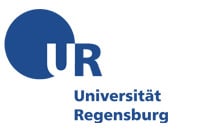




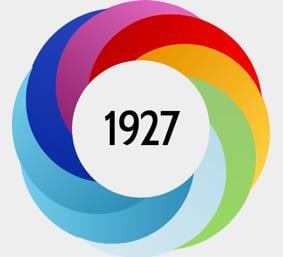
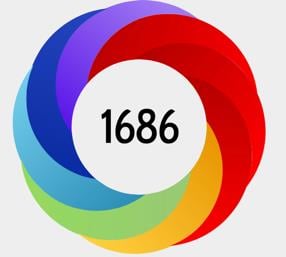
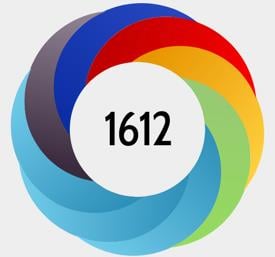
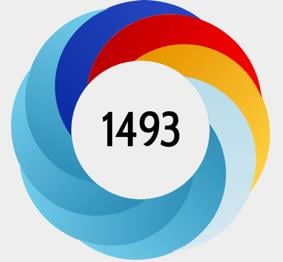
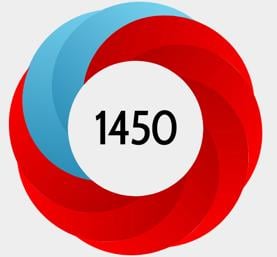
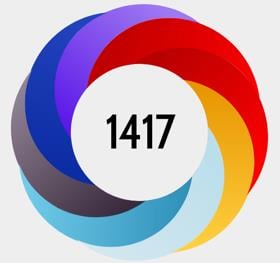
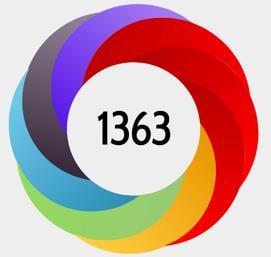
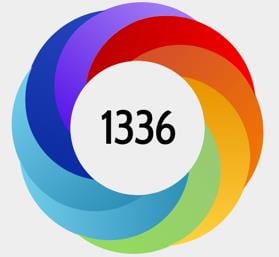
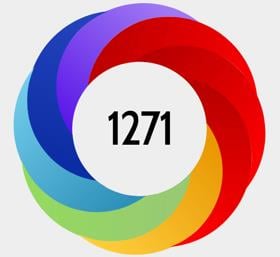
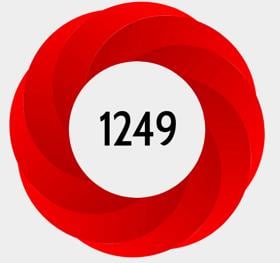










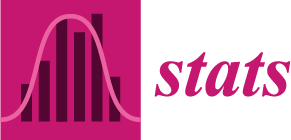

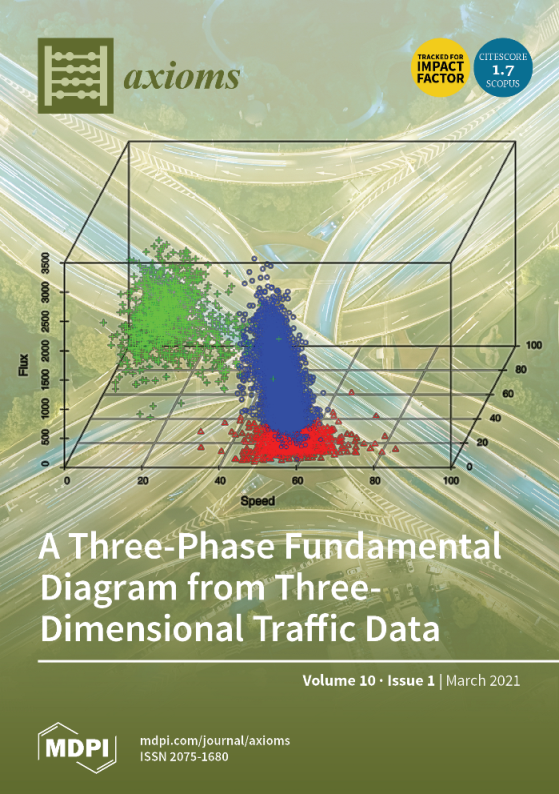
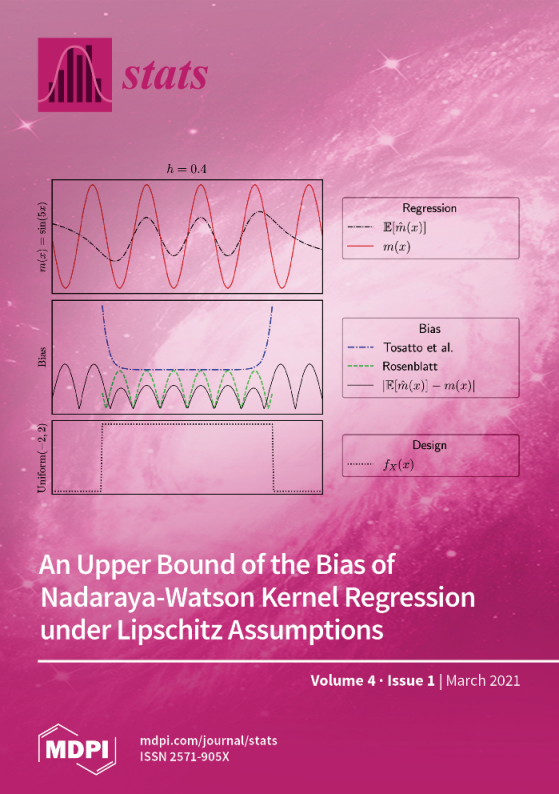
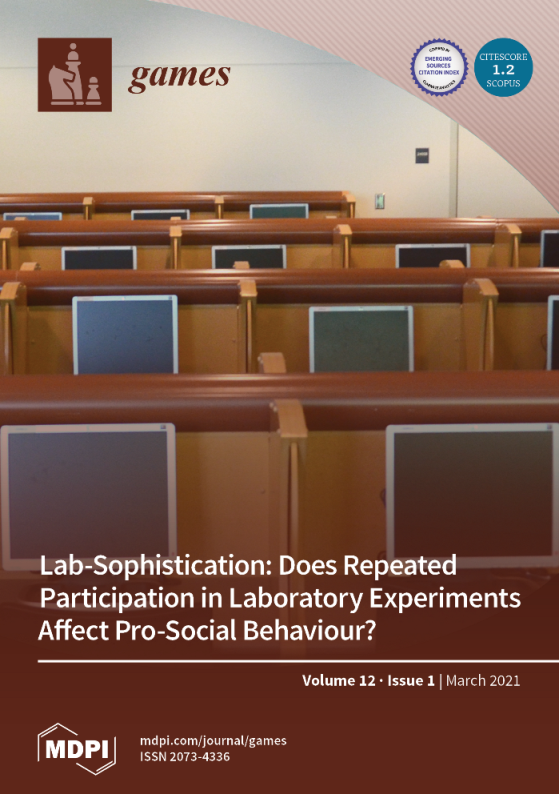

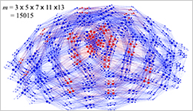
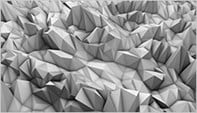
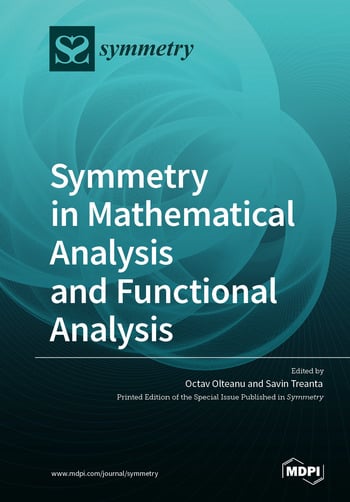
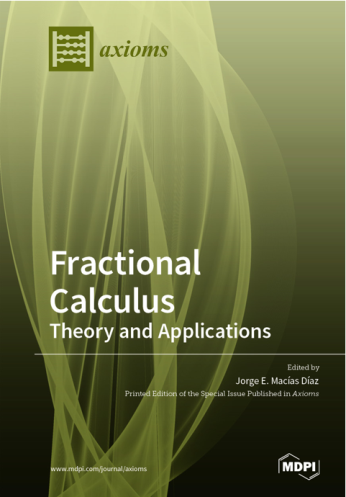
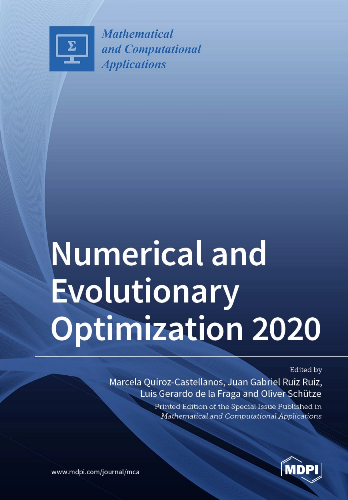








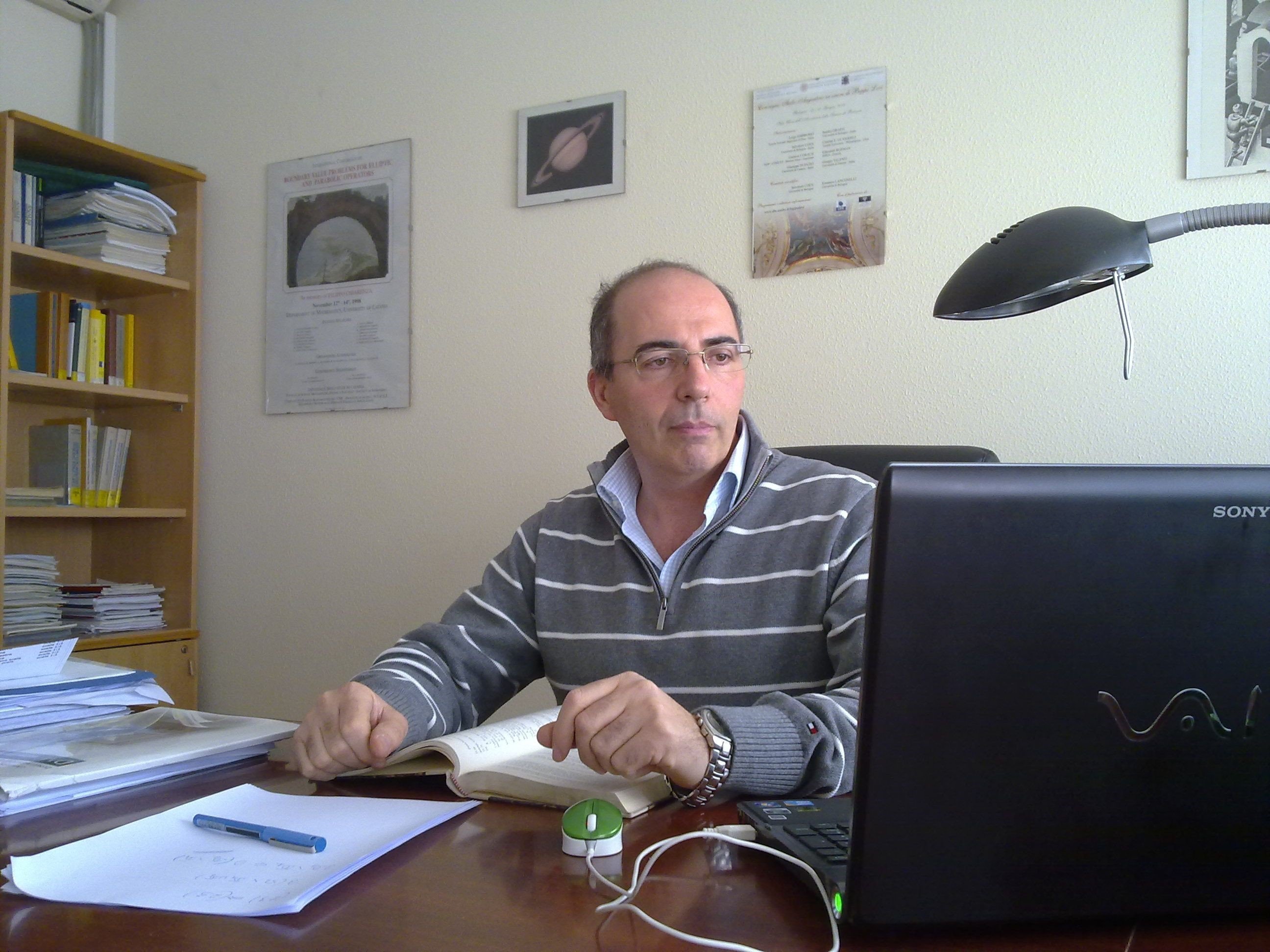




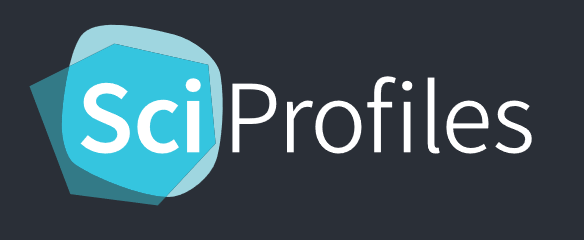

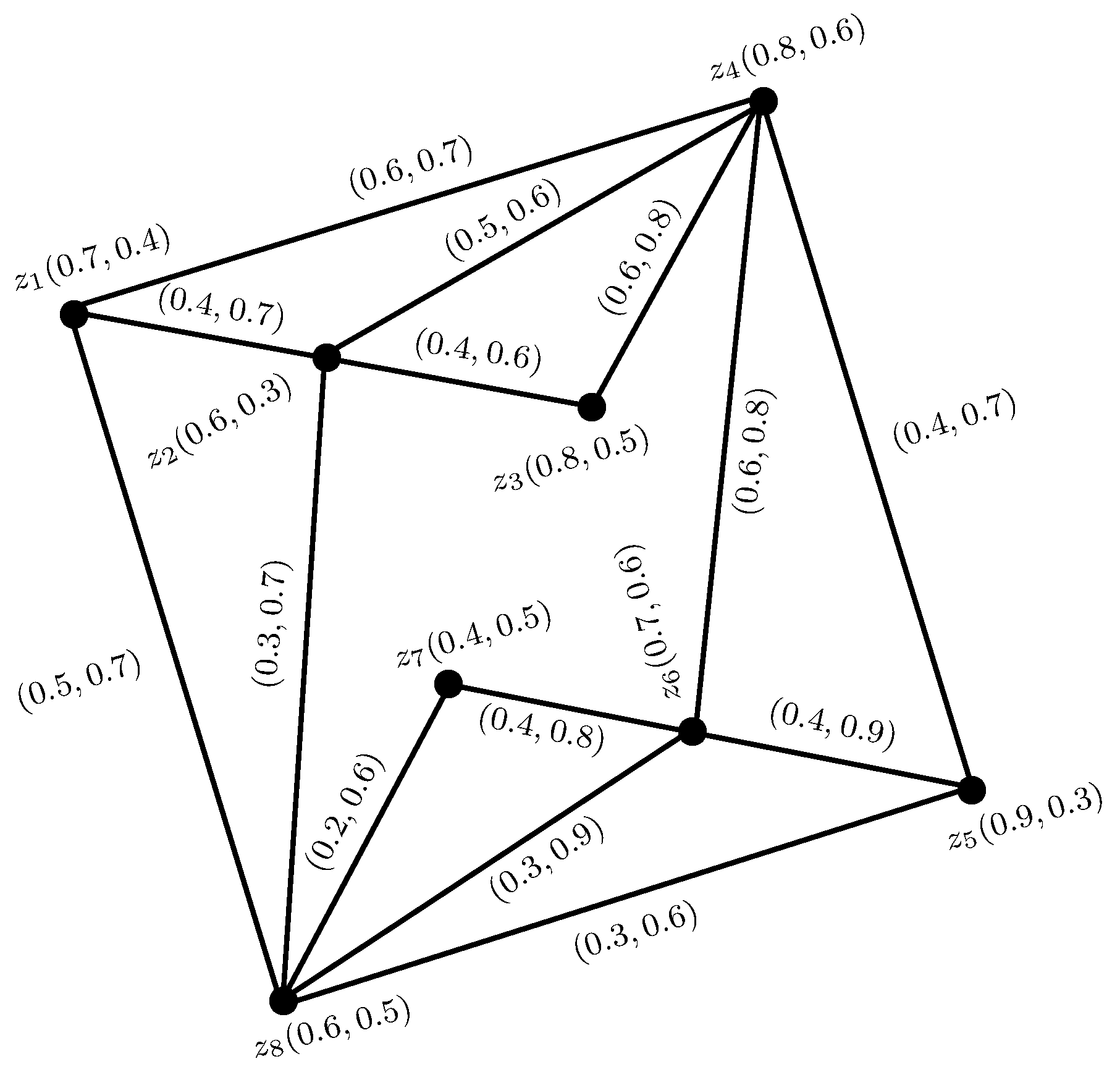
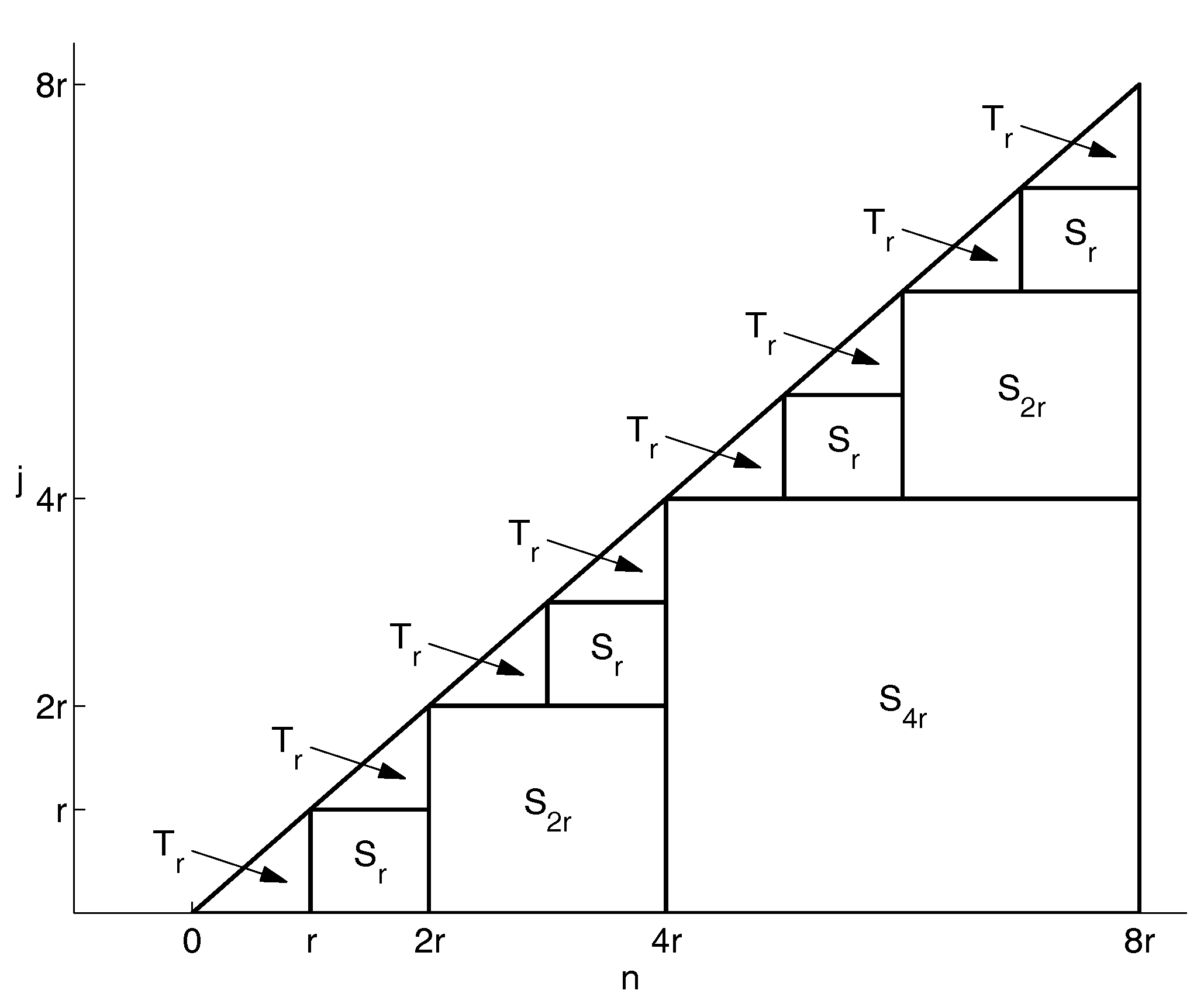


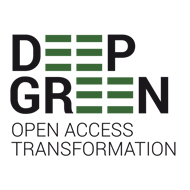

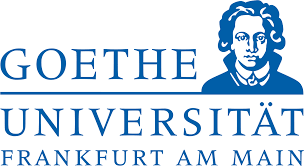
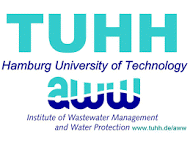




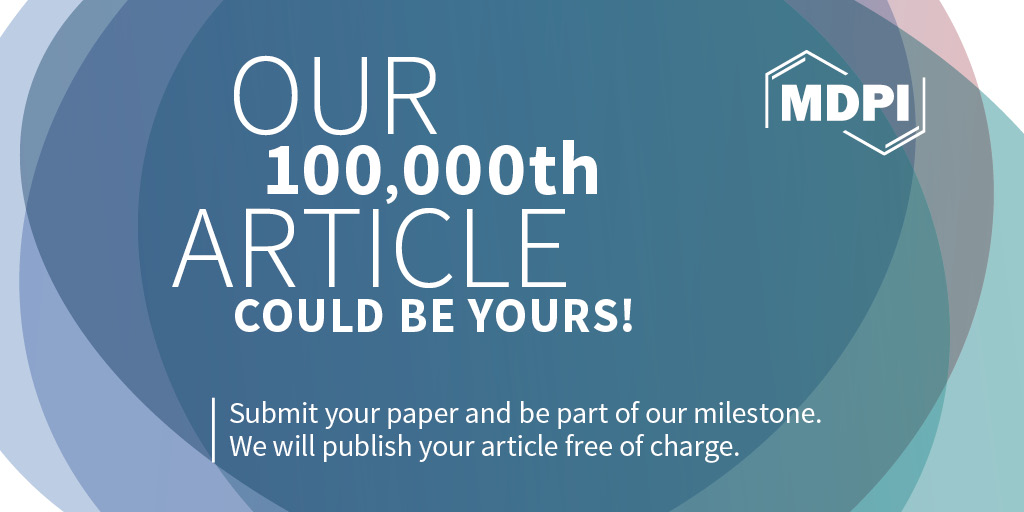

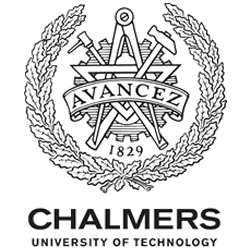
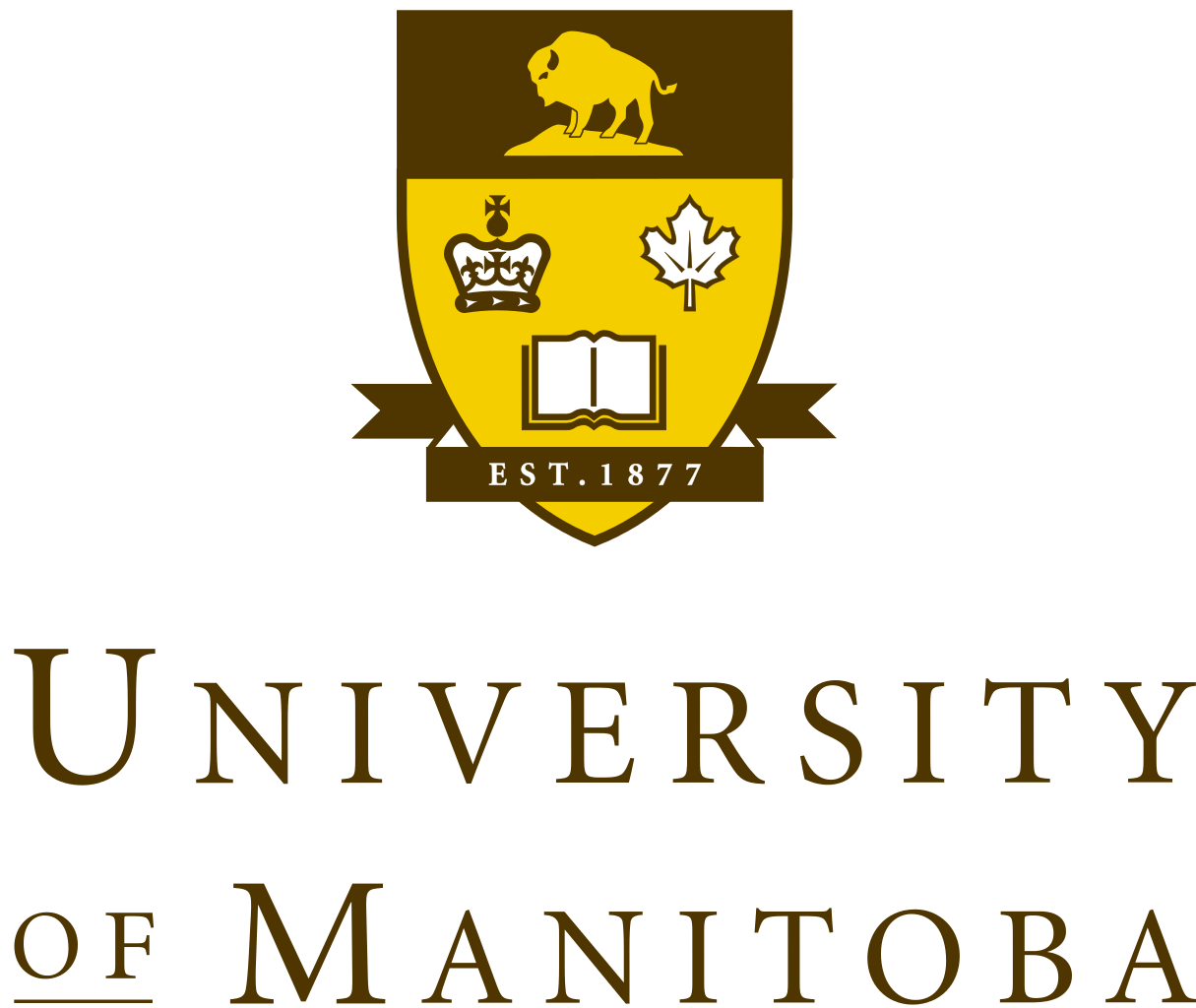
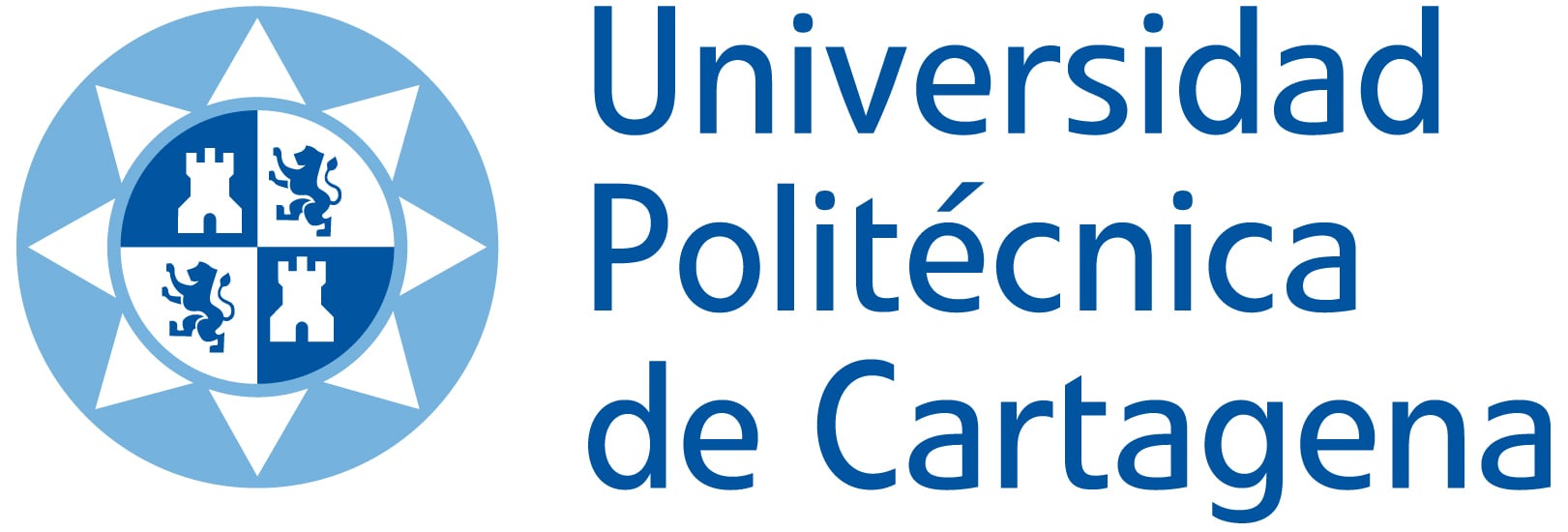
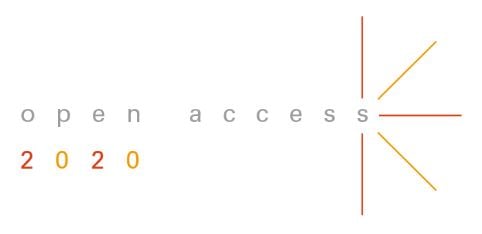



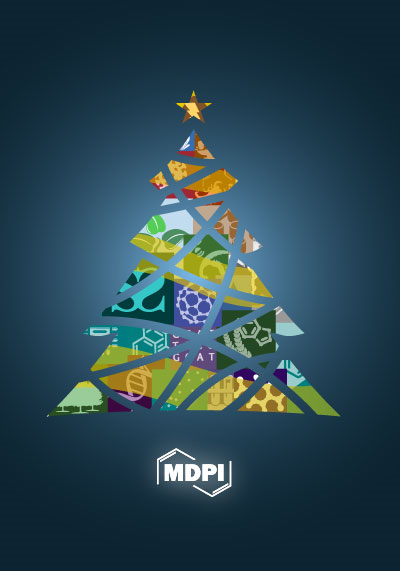


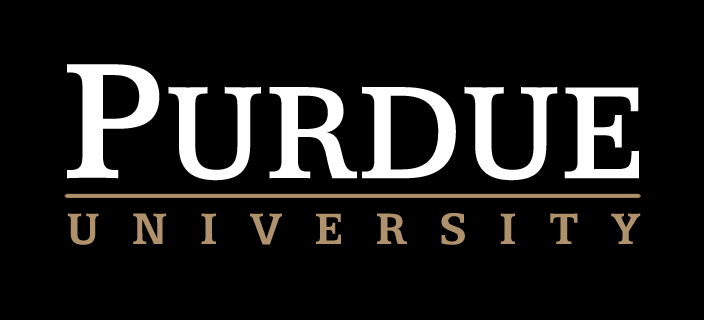


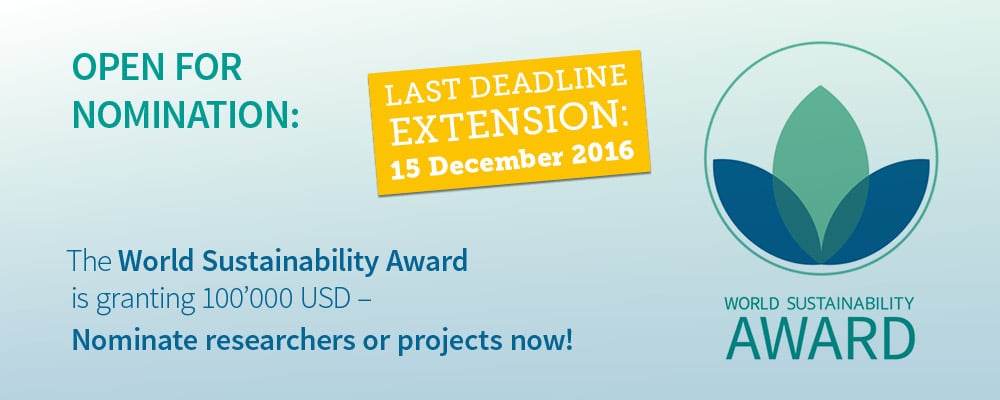



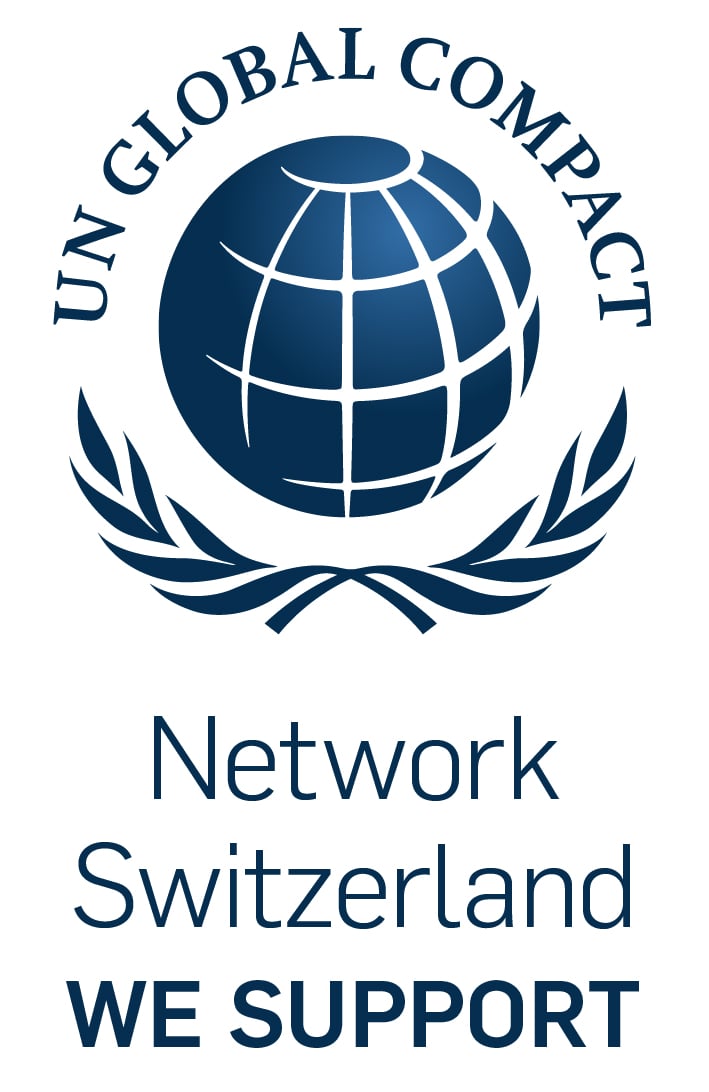
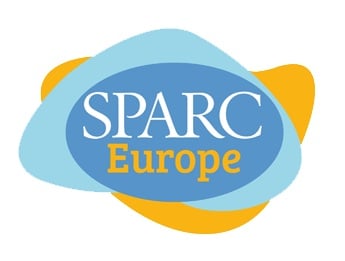
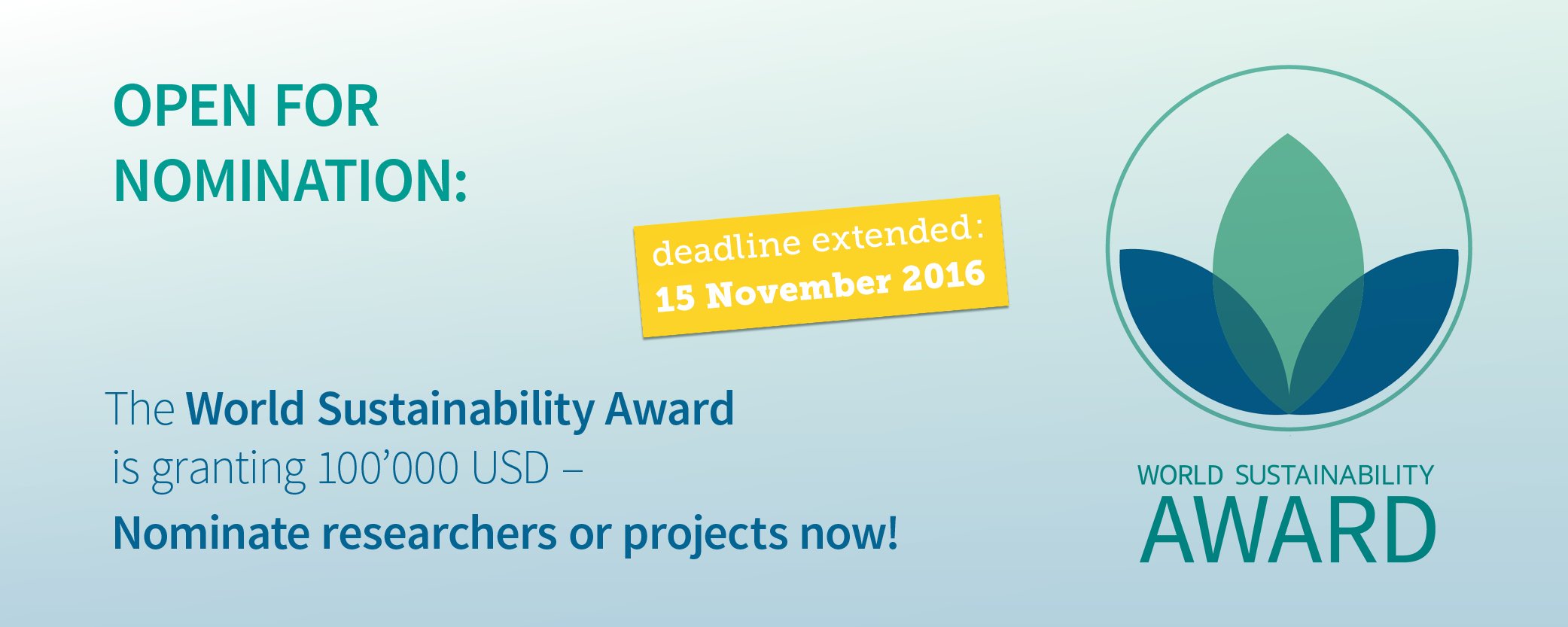 .
.